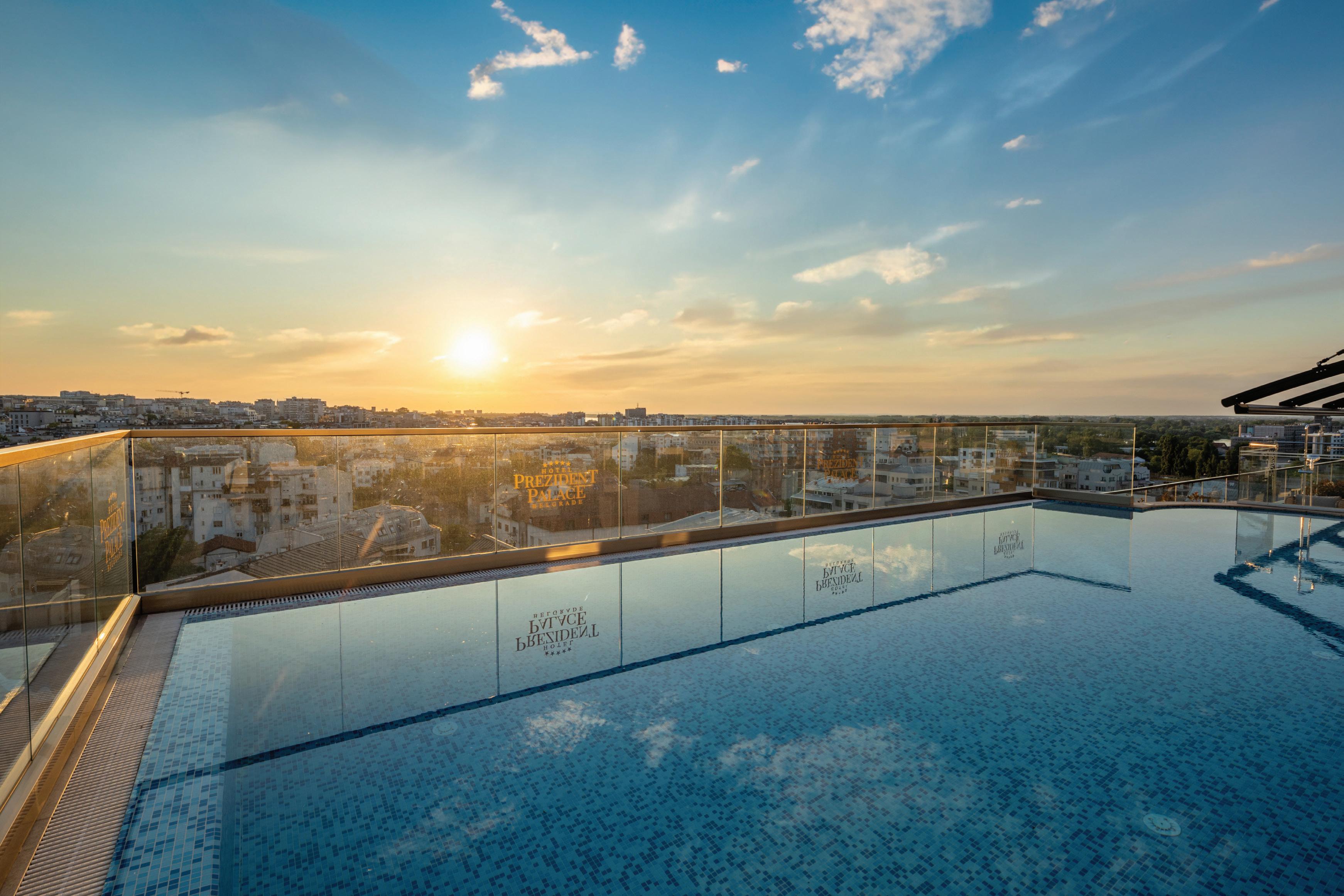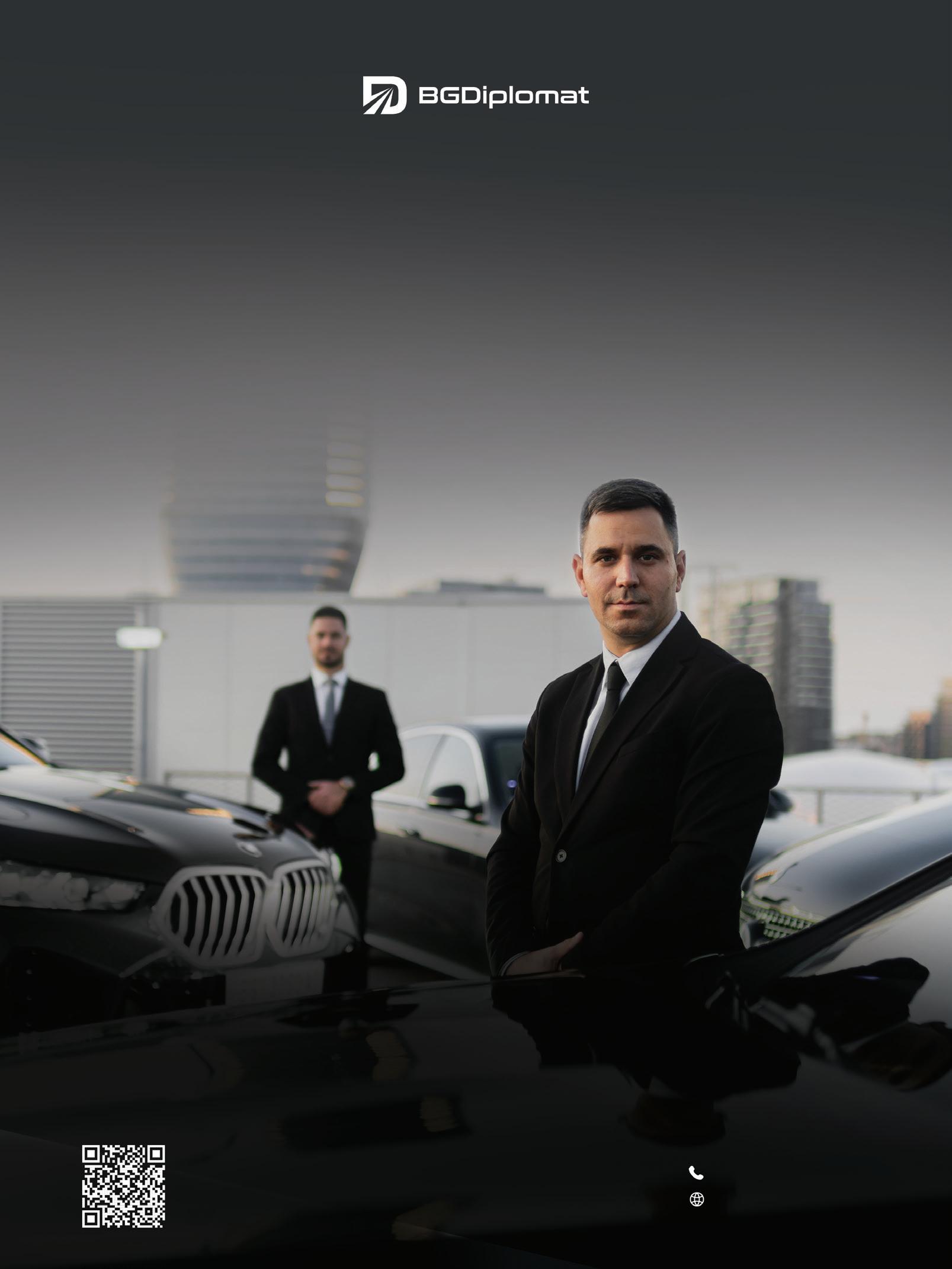
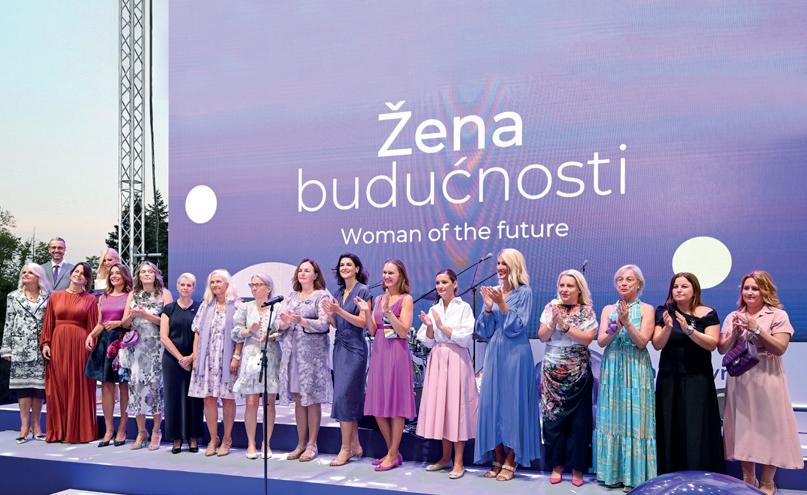
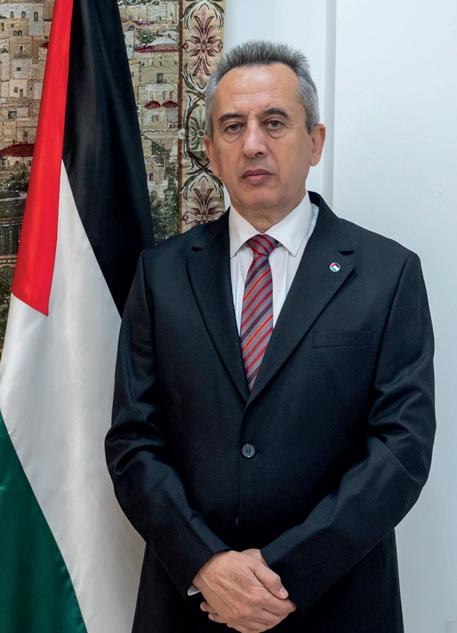
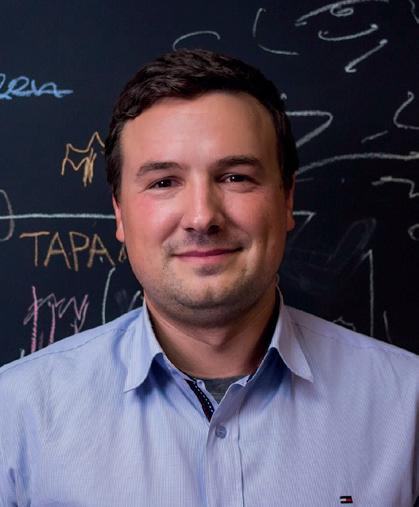
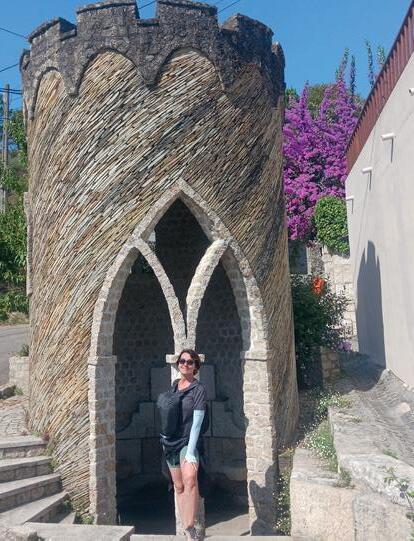
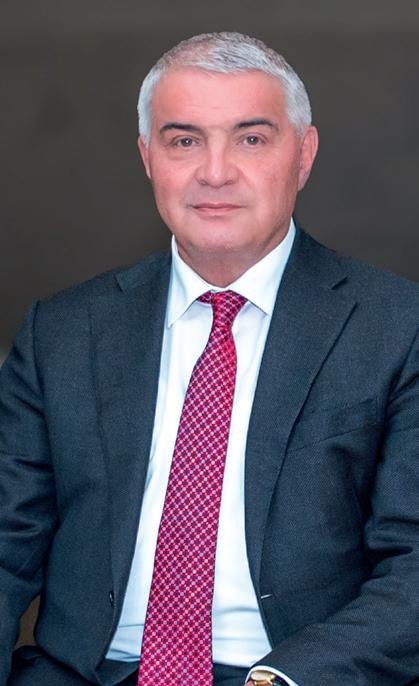
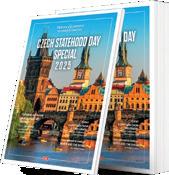
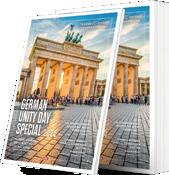
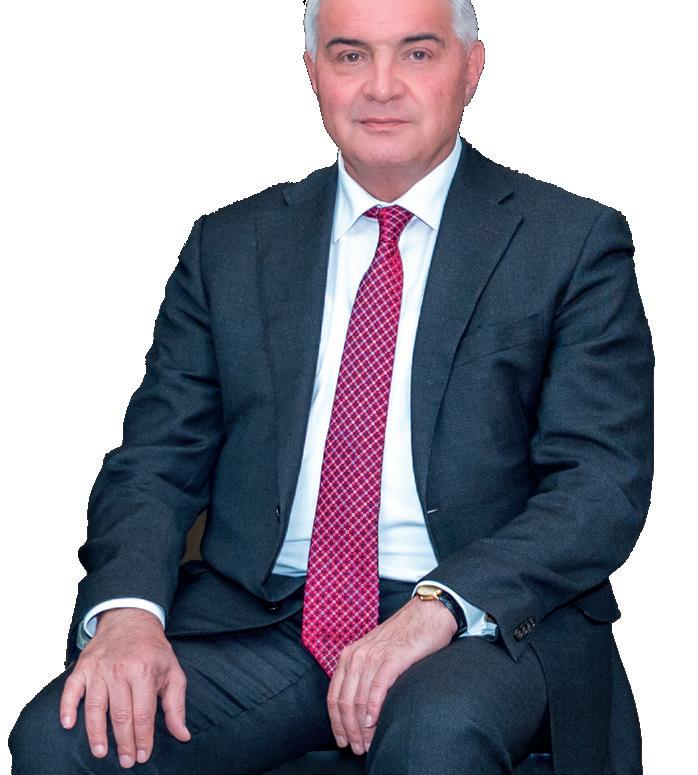
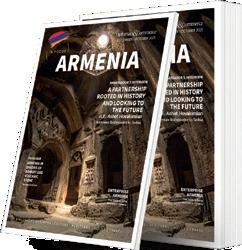
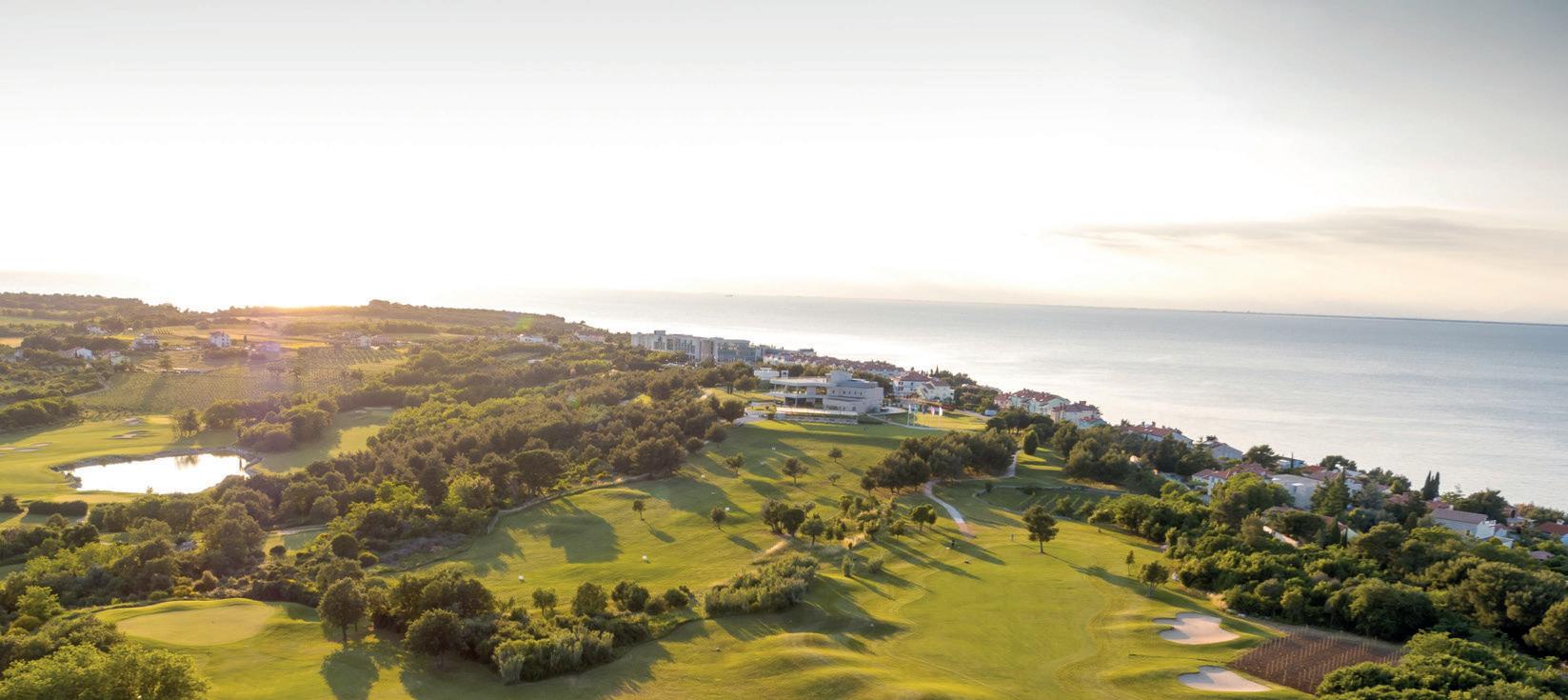
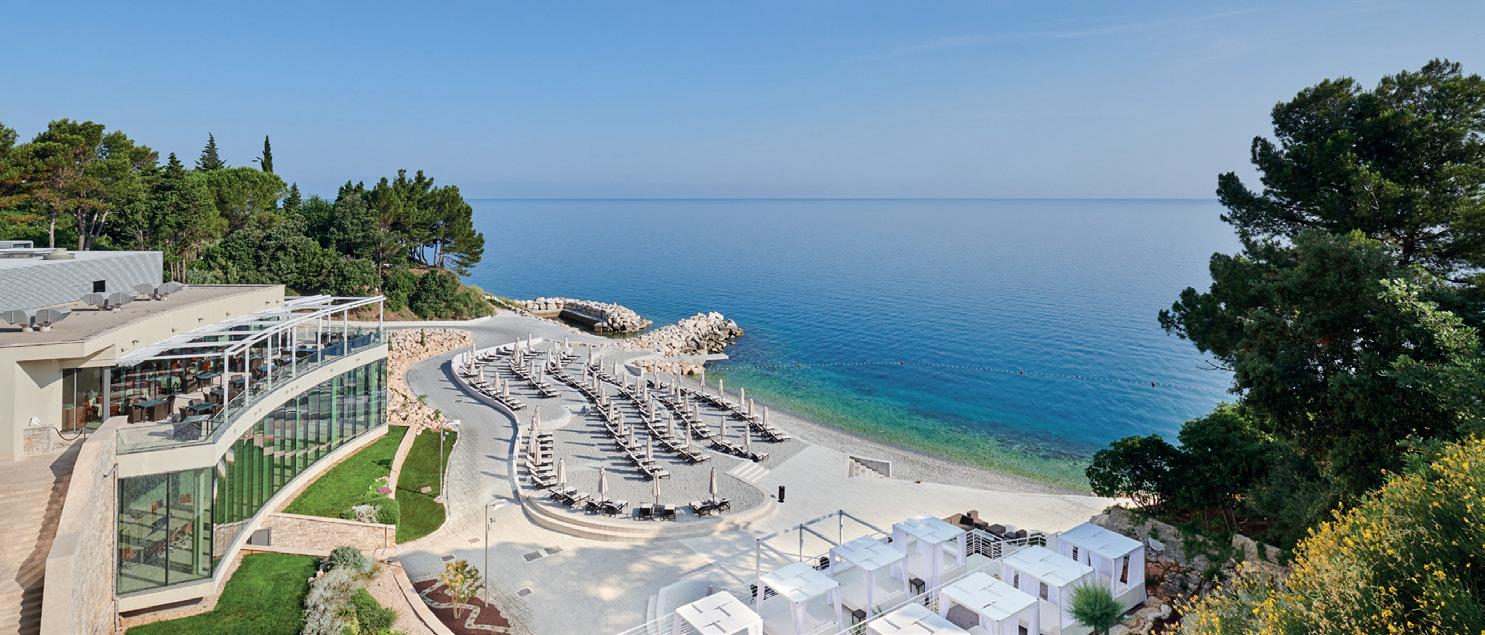













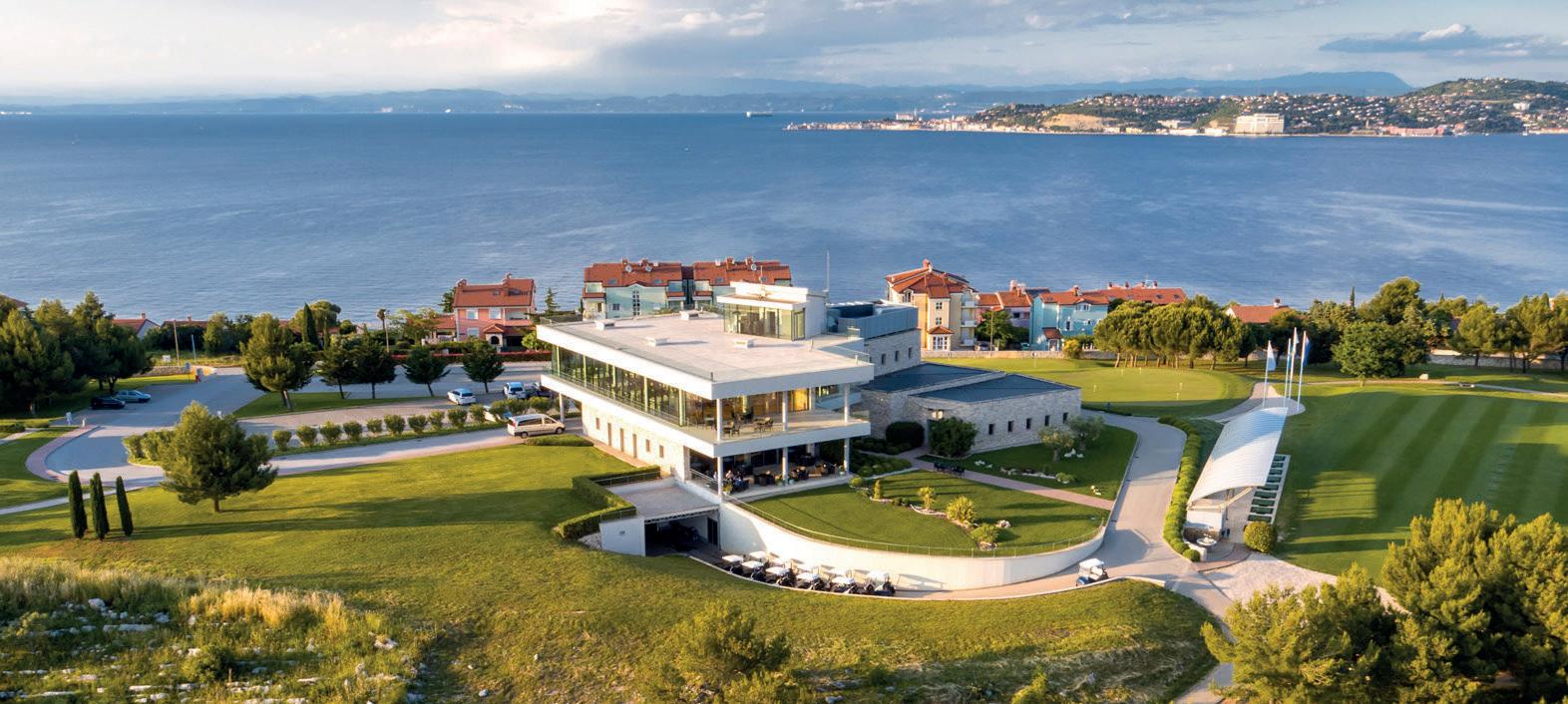
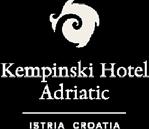
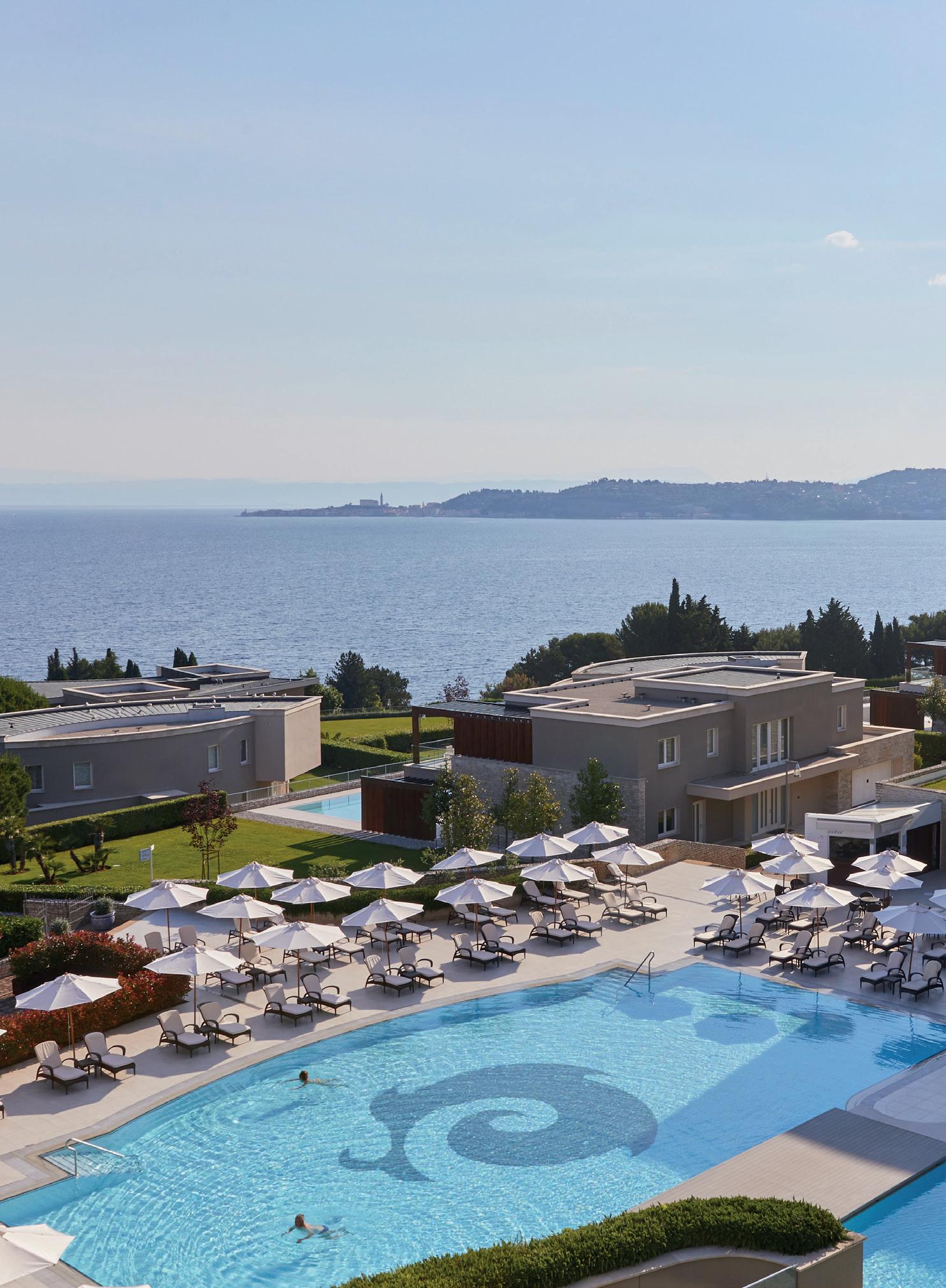
Get to know the true essence of Adriatic comfort, surrounded by olive trees and vineyards overlooking the great blue Adriatic Sea. Visit Kempinski Hotel Adriatic in Istria, the first Croatian 5-star golf & spa resort.
+385 52 707 010 RESERVATION.ADRIATIC@KEMPINSKI.COM KEMPINSKI. COM/ISTRIA

September/October 2025
FOLLOW US TO STAY UPDATED
Subscription
Director ROBERT ČOBAN robert.coban@color.rs
Director ROBERT ČOBAN robert.coban@color.rs
Editor in chief
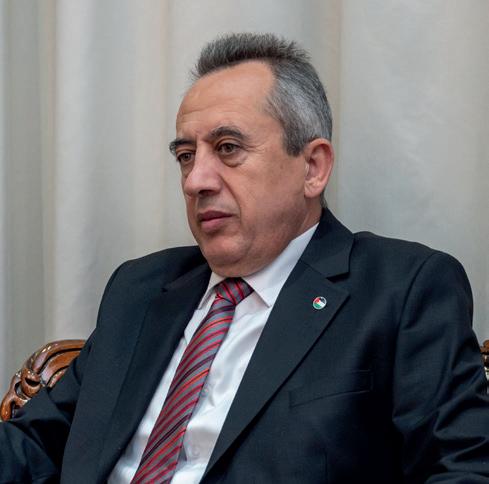
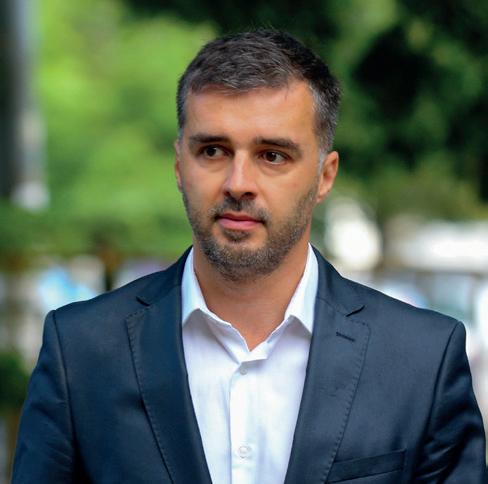
DRAGAN NIKOLIĆ dragan.nikolic@color.rs
Editor in chief DRAGAN NIKOLIĆ dragan.nikolic@color.rs
Journalists MIJAT KONTIĆ ŽIKICA MILOŠEVIĆ
Journalists MIJAT KONTIĆ ŽIKICA MILOŠEVIĆ
Advertising DRAGAN NIKOLIĆ dragan.nikolic@color.rs
Advertising DRAGAN NIKOLIĆ dragan.nikolic@color.rs
DRAGAN VUČEVIĆ dragan.vucevic@color.rs
DRAGAN VUČEVIĆ dragan.vucevic@color.rs marketing@color.rs
marketing@color.rs
6
AMBASSADOR’S INTERVIEW JUSTICE IS NOT A GESTURE, IT’S A DUTY H.E. MOHAMMED AL NAMURA Ambassador of Palestine to Serbia
22
FEATURED INTERVIEW THE BOOMERANG OF CHAOS SAVO MANOJLOVIĆ
Kreni-promeni Movement
Photos GORAN ZLATKOVIĆ
SANJA KNEŽEVIĆ
Photos GORAN ZLATKOVIĆ NEBOJŠA BABIĆ MILOŠ NADAŽDIN STEFAN ĐAKOVIĆ
DRAGAN KUJUNDŽIĆ
KHARIM NSENGIYUMVA JAKOV SIMOVIĆ
MARIJA PIROŠKI
NADJI HAMADOU ANTON WELT SHUTTERSTOCK
SHUTTERSTOCK
translation COLOR MEDIA EVENTS
translation COLOR MEDIA EVENTS
Prepress VLADIMIR DUDAŠ c e n t r o b i r o
Prepress VLADIMIR DUDAŠ c e n t r o b i r o
contributors
contributors ROBERT ČOBAN DUŠKA JOVANIĆ LJILJANA VUJIĆ VIKTOR LAZIĆ
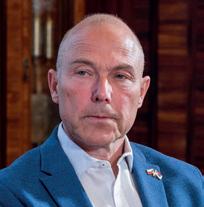
ROBERT ČOBAN LIDIJA ĆULIBRK
54 DIPLOMACY IN DIALOGUE WE GROW
H.E. JAN BONDY Ambassador of the Czech Republic to Serbia
SPECIAL EDITION

Print COLOR PRINT Novi Sad
BIROGRAF COMP D.O.O. Zemun, Atanasija Pulje 22
37 SPECIAL GERMAN UNITY DAY
• The Ambassador’s speech: H.E. Anke Konrad
Distribution PRETPLATA D.O.O. office@pretplata.rs +381 11 314 99 21
Distribution PRETPLATA D.O.O. office@pretplata.rs
COLOR MEDIA EVENTS
COLOR MEDIA EVENTS
Published by: Color Media Events d.o.o.
• German Unity Day reception
• Corporate Interview: Suzana Dubajić, Kärcher Serbia
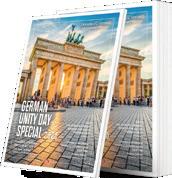
53 SPECIAL CZECH STATEHOOD DAY
58 DAN BROWN IN PRAGUE DEATH AND THE RIDER by Robert Čoban
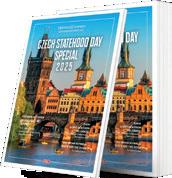
Featured countries in this edition: AFRIKA / ARMENIA / AUSTRALIA / BOSNIA AND HERZEGOVINA / CROATIA / CZECHIA / ECUADOR / GREECE / INDONESIA / ISRAEL / ITALIA / GERMANY / MEXICO / NORTH MACEDONIA / PALESTINE / SERBIA / SLOVAKIA / SPAIN / UK / UN / USA
21000 Novi Sad, Serbia Mileve Simić 27 VAT: 113769690 Reg. No: 21922978 Belgrade Office: Bul. Zorana Đinđića 48b 11070 Novi Beograd, Serbia Phone: + 381 63 432 392
Published by: Color Media Events d.o.o. 21000 Novi Sad, Serbia Temerinska 102 VAT: 113769690 Reg. No: 21922978 Belgrade Office: Vlajkovićeva 6 11000 Belgrade, Serbia Phone: + 381 63 432 392
ADVERTISEMENT
CIP – Katalogizacija u publikaciji Biblioteka Matice Srpske, Novi Sad 33 Diplomacy & Commerce / glavni i odgovorni urednik: Dragan Nikolić, 2016, (mart)-.Novi Sad: Color Media Events,
CIP – Katalogizacija u publikaciji Biblioteka Matice Srpske, Novi Sad 33
Diplomacy & Commerce / glavni i odgovorni urednik: Dragan Nikolić, 2016, (mart)-.Novi Sad: Color Media Events, 2016 - , -33cm Mesečno
ISSN 2466-3808 = Diplomacy & Commerce COBISS.SR-ID 303269895
Copyright
Copyright
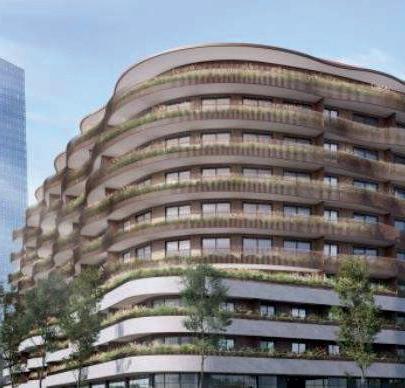
• Location: Novi Beograd
• Number of apartments: 203
• Move in date: July – December 2026
• Apartment price: 3800 – 4700 €/m²
• Parking space: 31 600 - 39 600 €
• Amenities: Reception, professional 24/7 security and facility management, private courtyard, children playground, smart-ready systems, electric vehicle charging, private storage units, apartments with private pool or private garden
When the film Civil War was released in April last year, exploring the idea of a possible civil war in today’s America, it seemed like science fiction. Then came the assassination attempt on Trump, his return to power, the outbreak of racial unrest across the US – and now Kirk’s murder… All of this no longer feels so far-fetched. It seems that the US cannot find itself, a unifying factor, a leader, or a place in the current multipolar world. Frankly, it appears that only China clearly understands its role, while Europe, Russia and the US seem unable to find their bearings on that path.
A diplomat I spoke to last week told me that Serbia reminded him of a national park with a “day-andnight regime of life”, where everything is more or less normal during the day – people go to work, sit in cafés – and when night falls, demonstrations erupt, clashes break out between rival political groups or with the police.
After everything that has happened in Serbia over the past 10 months – the excessive police brutality against protesters, the use of stones, batons, flares, bottles and even pyrotechnics during demonstrations – it is nothing short of a miracle that no one has been killed. That no one’s heart has given out, that no one has fallen and suffered fatal injuries. I fear that if such a thing were to happen, we would slide into a spiral that would make the scenario described at the beginning – even for Serbia – no longer seem so unrealistic.
I hope that in both countries – in America, which I have loved since I began following the media, reading books and comics and watching films, and where my elder daughter is studying; and in Serbia, where I was born, live and work – reason will prevail, and that we will not witness scenes like those from films, or from the near or distant past.
Robert Čoban
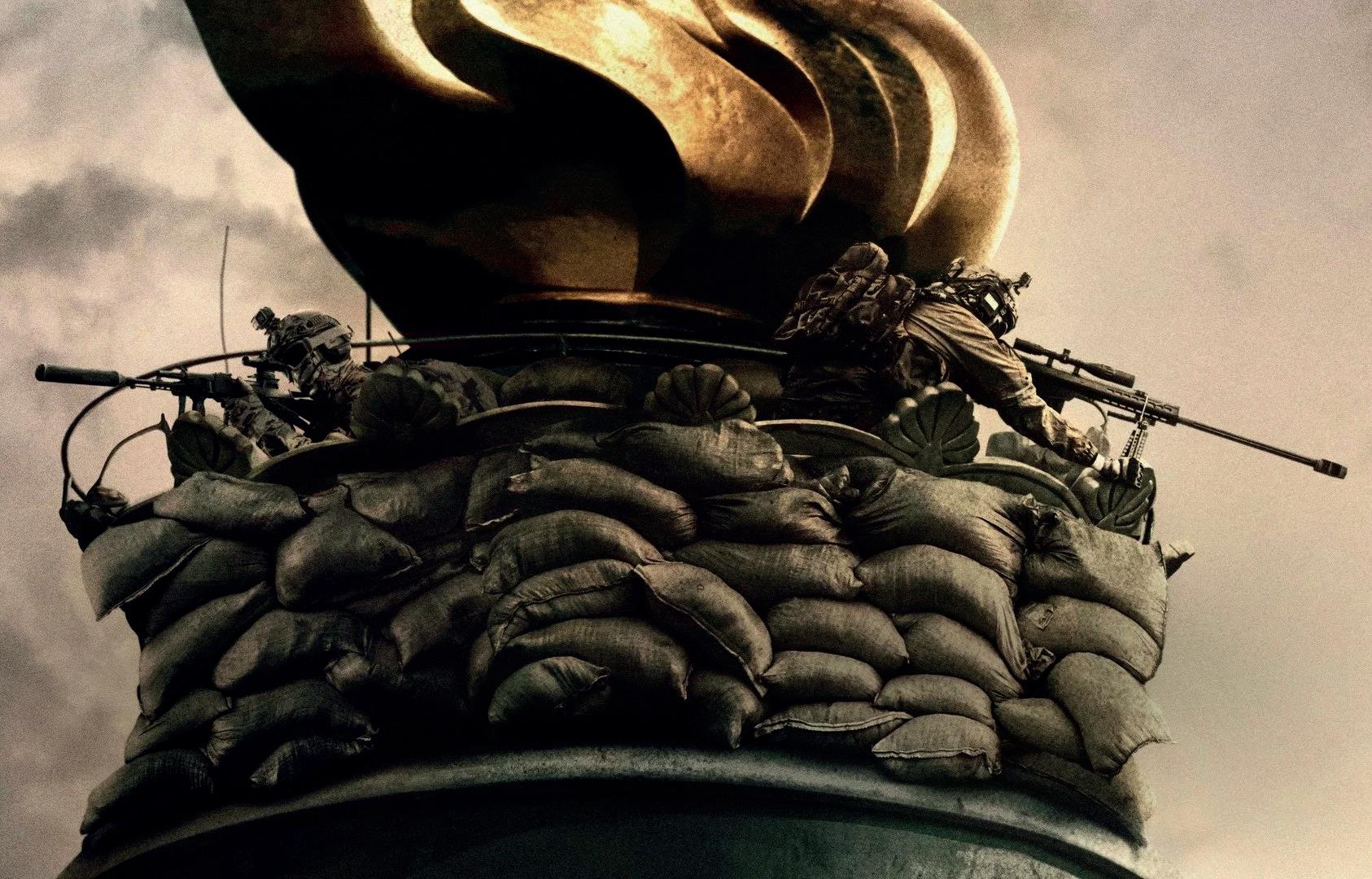
As bombs fall and borders tighten, Ambassador Al Namura calls on the world to uphold international law and human dignity
This interview was first broadcast on Diplomat,thetalkshowproducedby Diplomacy&Commercemagazine and aired on Euronews Serbia.
H.E. MOHAMED AL NAMURA
Ambassador of the State of Palestine to Serbia
While all eyes are on Palestine, the international diplomatic scene is gradually shifting. Today, we speak with Mohamed Al Namura, Ambassador of Palestine to Serbia, about his professional career, cooperation with Serbian institutions, and the evolving global stance on Palestinian statehood, from Brussels to Washington.
To begin, could you tell us about your career prior to your appointment in Serbia? How have your previous experiences shaped your perspective on international relations?
Before coming here, and even to this day, I am a member of the Palestinian National Council, which is the parliament of the PLO, the Palestine Liberation Organisation. I also serve on the committee for parliamentary and foreign political affairs. Additionally, I am a member of the Revolutionary Council of Al-Fatah and its foreign political affairs committee.
Previously, I worked in the Ministry of Labour in the Government of the State of Palestine in Ramallah. As a Palestinian, every one of us is involved in politics. Even while studying here, I was politically active and served as president of the General Union of Palestinian Students. That’s my background in brief.
WHAT ISRAEL IS USING IS NOT JUST EXCESSIVE FORCE—IT IS A WAR OF GENOCIDE AGAINST THE PALESTINIAN PEOPLE
You began your diplomatic post in Serbia in late August 2023. What have your experiences been so far in working with Serbian institutions?
Unfortunately, shortly after I arrived—within a month or two— the genocide against the Palestinian people began in Gaza. Many of the plans I had for my diplomatic work here had to be redirected. When your people are
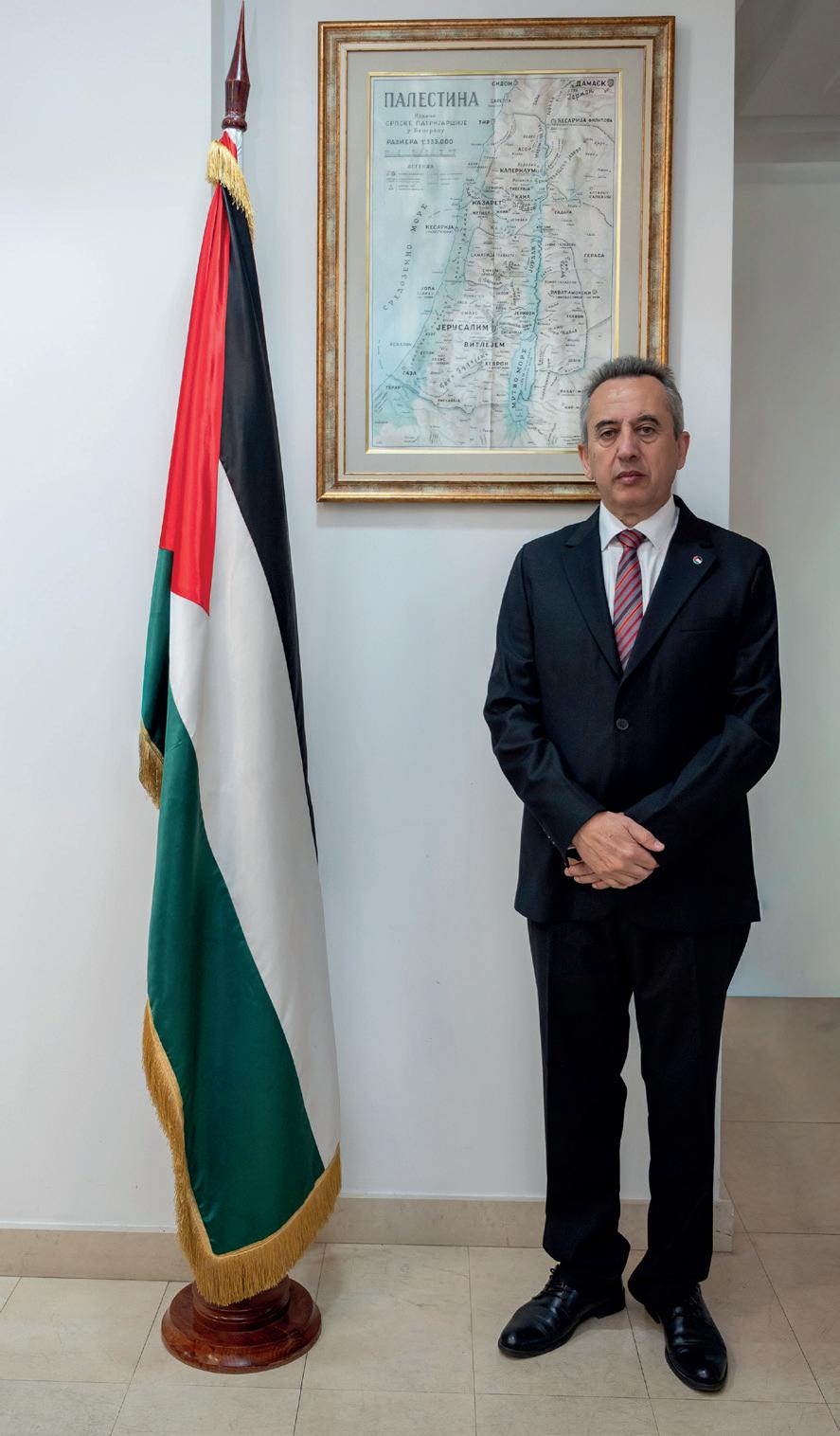
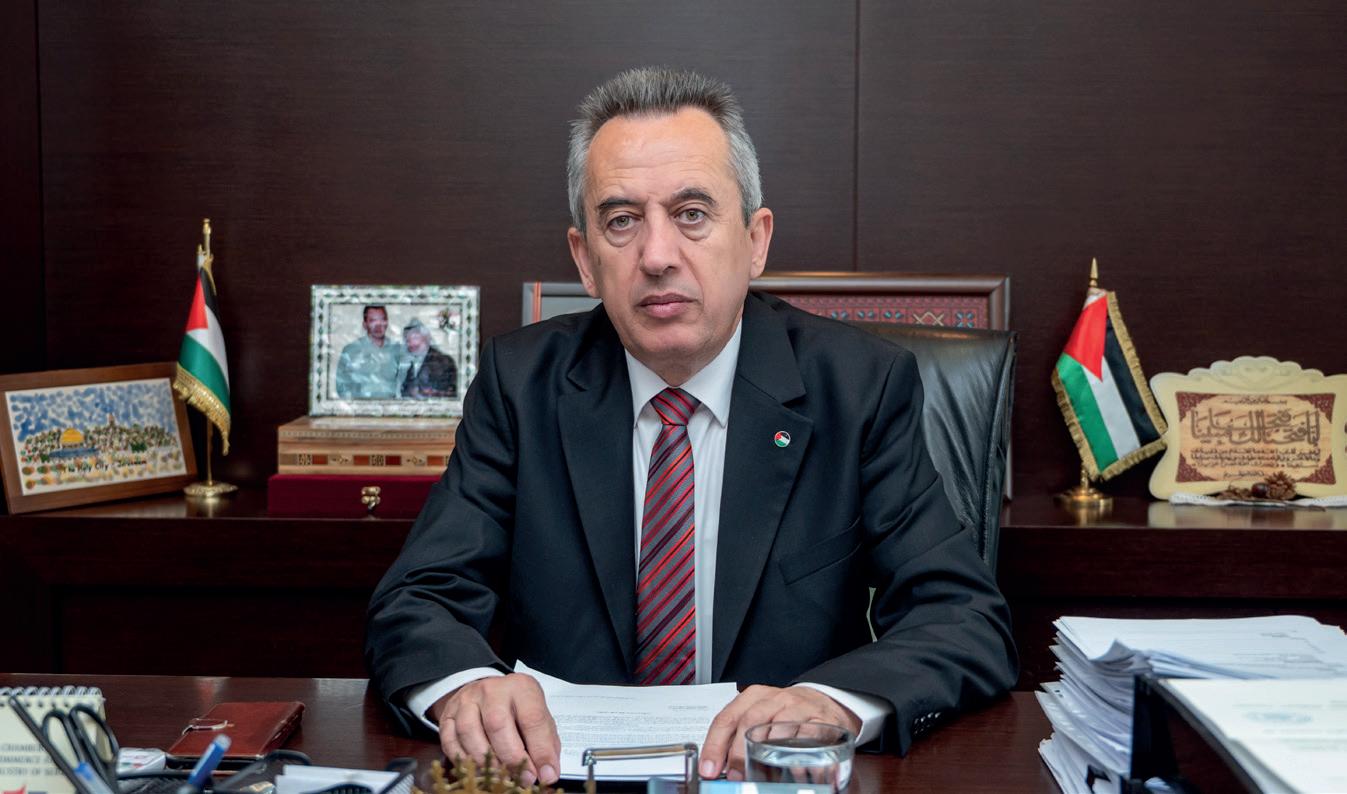
suffering genocide and extermination, when lives are lost every day, you must turn your attention to that. I’ve found good cooperation with institutions in Serbia. I’ve built strong relationships with municipalities and cities. Many of them have issued declarations of friendship or cooperation between Palestinian and Serbian cities. I’ve focused more on public outreach, especially to explain what is happening in Palestine. At the beginning, there was an Israeli invasion, and a media invasion as well. They spread false information and disinformation everywhere. We had to clarify the situation and show that what is happening did not come from a vacuum, as Guterres said, but is rooted in our Nakba of 1948, when Israel was established on the ruins of the Palestinian people and our land. This conflict has deep roots, long before the events of 2023. We lived in Palestine in peace for over 12,000 years. We are one of the oldest peoples in the world. The Palestinian people are the descendants of Canaanites. We lived in Palestine even before the emergence of any religion— before Judaism, Islam, or Christianity. When Abraham came from Iraq, he arrived in Palestine, where the Palestinian people and Canaanites already lived. Even the Torah says Abraham went to the land of
RECOGNITION OF PALESTINE IS NOT A GIFT. IT IS OUR NATURAL, POLITICAL, AND HISTORICAL RIGHT
Canaan. So we say: the Palestinian people have always lived in Palestine. It is our homeland. We are of different faiths—Muslims, Orthodox Christians, Catholics— and yes, there are Jews among us, but they are Palestinians, not Israelis. The Palestinian issue is not a religious one. It is political. It is about people who have lived on their land for centuries, and then an occupier arrived—today’s Israel— with the help of Western powers. They took our land, and to this day, the genocide continues. Even before 1948, massacres were committed in Palestine— in 1947, 1948, and after. Deir Yassin, Kibiya, Al-Dawayima, even Haifa and Lod— 950,000 Palestinians were expelled from their land. Many fled to Syria, Lebanon, the West Bank, Gaza, and Jordan. And sadly, we lost our homeland.
Just to add, the airport in Tel Aviv today was a Palestinian airport until 1948. Many of the Israelis who came then were refugees. We welcomed them. But later, they turned against us. They received Palestinian passports,
ID cards, and used the Palestinian pound, which was worth 2.5 dollars. Even Shimon Peres, former president of Israel, came to Palestine as a worker, a cleaner. That’s documented in his own words. At the time, the British Mandate and the Americans supported them. And through that support, we lost our state and our land. To this day, our people suffer. Today, the Palestinian population is around 15 million, maybe more. Over 7 million live outside Palestine, and between 7.5 and 8 million live within. In Gaza, there are 2.3 million Palestinians. On the West Bank, over 4 million. Inside Israel, around 2 million. So within historic Palestine, we are the majority. And that is why Israel is now waging a genocidal war— to kill as many Palestinians as possible, to displace us from our land. On the West Bank, they are conducting ethnic cleansing, especially in small villages, among Bedouins and farmers. They attack homes and drive people out. This has been happening for 77 years, since 1948. It is the greatest
crime in the world. It is an ongoing genocide, and now the world is watching it live.
Let’s return briefly to the history of relations between Serbia and Palestine, or rather Yugoslavia, which recognised the State of Palestine in 1989, which was a grand political gesture at the time. How do you view Serbia’s position today?
Yugoslavia recognised the State of Palestine on November 16, 1988— one day after our late leader, Yasser Arafat, declared independence in Algiers, on behalf of the Palestinian National Council. The next day, Yugoslavia recognised us. In 1988 and 1989, over 90 countries recognised the State of Palestine. At the time, there were around 156 UN member states. Not like today, with 193. In 1989, full diplomatic relations were established between Palestine and Yugoslavia, now Serbia. That’s when our embassy was opened. Before that, we had a political representation of the PLO, which later became the Embassy of the State of Palestine. To this day, we see Serbia as a friendly country. We see the Serbian people as friendly people. We ask all our friends to act in accordance with international law. We accept any country that treats us in line with international law. Although I must say,
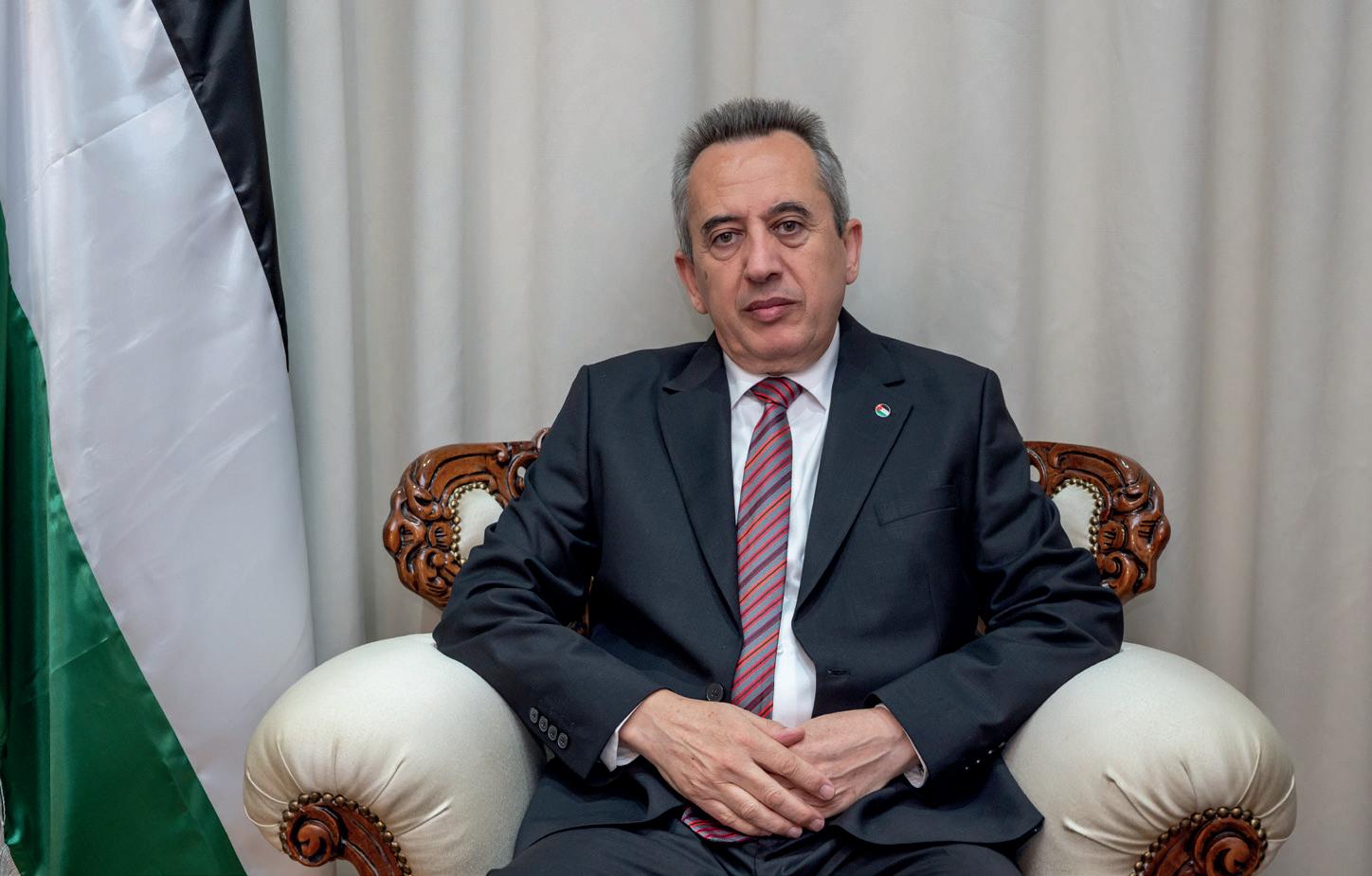
international law has often failed the Palestinian people, starting with the 1947 UN partition plan. Still, we accepted political solutions, peaceful solutions. In 1988, when we declared our state, we accepted that it would include the West Bank, East Jerusalem as our capital, and Gaza. We accepted it. And we ask the world to accept what international law requires.
Today, we see changes in Europe. Malta recognised Palestine on August 25, joining Ireland, Spain, Norway, and Slovenia. France has also announced its intention to recognise Palestine in September. Is this all just European political choreography or actual change that’s on the horizon?
We hope that the conference on September 22, led by France and Saudi Arabia, will bring real progress. It’s an important step. We believe the world is changing. We welcome these brave decisions. They are in line with international law. We have good relations with France and other EU countries. We have embassies there, and high-level diplomatic
OUR MESSAGE IS THAT WE WALK IN STEP WITH HISTORY. THOSE ON THE SIDE OF JUSTICE STAND ON THE RIGHT SIDE OF HISTORY
representation. We hope that once Palestine is officially recognised, these missions will become full embassies. In Jerusalem, France has a consulate general, but it functions as an embassy accredited to us. The same goes for the UK and many other countries. Even those without full diplomatic ties have political or diplomatic offices in Ramallah. France is a key country, a member of the UN Security Council. We hope the UK will follow. Russia and China already have. We expect many more countries to recognise Palestine. This is in line with international law.
Some people think that Palestine is a part of Israel. But Israel is the only country in the world without a constitution. They refuse to define their borders.
The UN, even the Americans, recognise that the West Bank,
Gaza, and East Jerusalem are occupied Palestinian territories. Recognition of Palestine is not a gift. It is our natural right, our political right, our historical right. We accepted having a state on just 22 per cent of historic Palestine. I, my father and my mother are refugees from 1948. We still have property there. I have documents from the UN proving it. We own hectares of land. Remind me after the recording, and I’ll show you the documents (I have seen the documents).
According to research by Reuters and IPSOS, 58% of Americans believe that Palestine should have the right to its own state, while 59% believe the force used by the Israeli military is excessive. Do you believe there is room for a shift in U.S. foreign policy toward Palestine,
especially in light of growing criticism from the public and academic circles?
You know, what Israel is using is not just excessive force—it is, in fact, a war of genocide against the Palestinian people. When we say “excessive,” we mean that there is only one military force operating there: the criminal Israeli army, which is committing genocide against Palestinians in the Gaza Strip. You’ve seen it—the whole world has seen it— how they bomb ordinary people, civilians, unarmed individuals. Now they are systematically demolishing and flattening Gaza. They’ve even brought in companies with bulldozers. Each of these companies receives five thousand shekels for every house or apartment they destroy—that’s nearly 1500 euros. Imagine, these companies publicly report how many homes they’ve demolished, and they get paid five thousand shekels for each one—it’s well known. So when we look at this aggression, which continues toward Gaza City, they are now systematically destroying everything that remains—high-rises, buildings
that haven’t yet been levelled. Their goal is to make Gaza uninhabitable so that people will be forced to leave. But to this day, the Palestinian people refuse to leave their land. They will not leave Gaza. The only thing that must withdraw is the occupier—the Israeli army, the Israeli occupation.
If you had to distil one message from all of this—a message of Palestinian diplomacy that the international community must understand—what would it be? We always say: we stand for justice. We support anyone who walks the path of justice. There has been tremendous injustice against the Palestinian people from 1988 until today. We accepted diplomatic and political solutions. We accepted dialogue. We accepted it even before 1948, when our friends and many wellintentioned countries asked us to engage in dialogue and to establish a state on 22% of the land of Palestine, with Jerusalem as its capital. That was supposed to be the solution. We accepted it. Unfortunately, the other side—the occupying state of Israel—continues to commit genocide to this day. They still do not recognise our rights, and they think they can gift us something that is already ours. But this is our natural right— our historical right—this is our land. We are not the newcomers— they are. We are from Palestine. We have lived there throughout history, and we will remain in Palestine.
We always say: we accept to act in accordance with international law. We accept political solutions. But our people must be free. There is no chance we will accept remaining under Israeli occupation. Israeli occupation—from 1948 to today— commits genocide, massacres, and crimes against the Palestinian people every single day, and steals our land.
Let me tell you one more thing: sometimes in the news, they say that Israel has allowed humanitarian aid. But when someone hears that, they think Israel is sending help. Do you know what they’re doing? That aid is not theirs. They refuse to release our funds—over 11 or 12 billion shekels to this day. They’ve taken our money, and from that, they finance what they call “humanitarian aid.” Moreover, when people go to wait in line for aid, they bomb and kill them— sometimes even for fun. Soldiers do it for amusement. You can
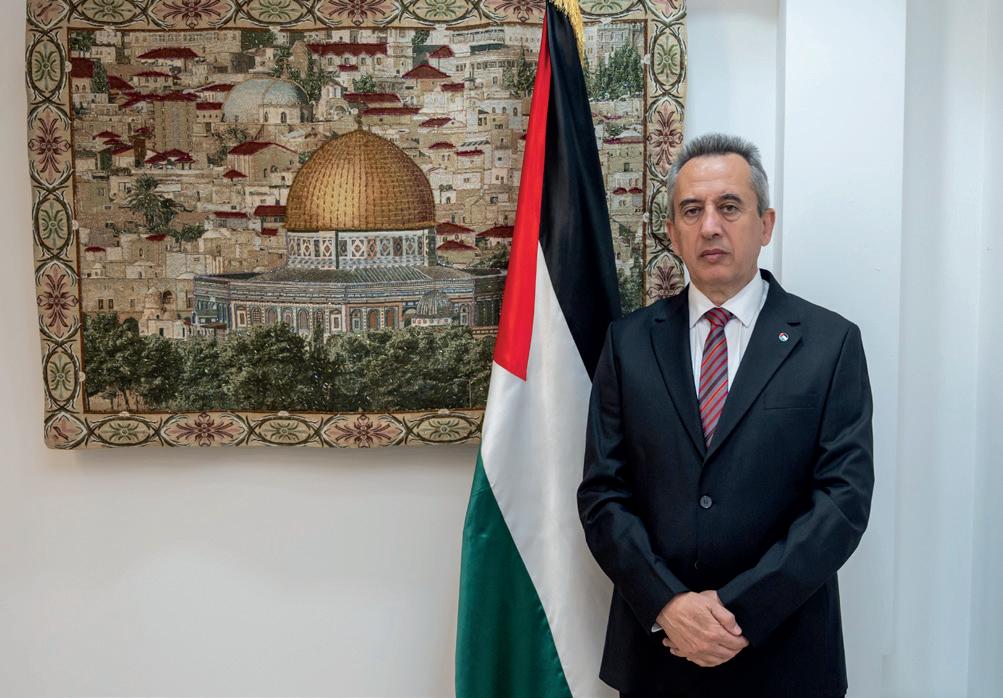
THE ONLY SOLUTION IS A SOVEREIGN PALESTINIAN STATE WITH EAST JERUSALEM AS ITS CAPITAL AND THE RETURN OF REFUGEES
see it online—how these soldiers brag, sending messages to their girlfriends for their birthdays, saying they destroyed an entire neighbourhood. The whole world sees this.
That’s why we say: Israel must be held accountable for what it is doing to the Palestinian people. You know that Netanyahu has now been declared a war criminal, along with Galant, Ben Gvir, Smotrich, and Eliyahu, who have called for Gaza to be bombed with a nuclear weapon. There are a thousand messages that can be sent to the world about all of this.
Before the events of 2023, did the embassies of Palestine and Israel have any communication, at least in Belgrade? What is the situation today? Do you greet the Israeli ambassador when you see her at receptions?
Since I arrived, even before all of this happened, I have never had any contact. And I still have no contact with representatives of the genocidal government of Israel. I have no contact, and I have no interest in having one. If there were ever to be any contact, it would be official, through our
state, our government. But I, as ambassador here, have no need for such communication.
How do you see the future of relations between Serbia and Palestine in the coming years?
You know, we are hopeful, and as I’ve already said, we see Serbia as a friendly country. The Serbian people are a friendly people. Since the genocide and aggression in Gaza began, perhaps you’ve seen it—at the gates of our embassy, people come in groups, bringing candles, lighting them, printing and posting images. People came, sending messages of support to the Palestinian people through phone calls and emails. I thank the Serbian people for that support. As we always say, everything must be in accordance with international law. We expect our friendly country, Serbia, as well as the entire world, to act in accordance with international law. We hope Serbia will not participate in any form of complicity in the genocide against the Palestinian people. Israel, as recognised by the entire world—including Western Europe— must not engage in military cooperation, arms
sales, ammunition transfers, or anything that violates international law and the rulings of the International Court of Justice from last year.
For the end of this interview, what message would you like to convey to our readers? My message is that the problem must be resolved peacefully, through political means. It cannot be resolved through force, as Israel attempts. The Palestinian people are not a people that can be defeated. We will certainly not remain under occupation. Our message is that we walk in step with history. Those who go against history—that is the Israeli occupation. We always say: we walk in step with history. Those who stand on the side of justice and rights are on the right side of history. Those on the opposite side are on the wrong side of history.
The only solution to the Palestinian issue is for us to have sovereignty over a recognised state— a sovereign state that includes the West Bank, including East Jerusalem as its capital, naturally with the Gaza Strip, and the return of refugees from 1948, along with the resolution of all remaining issues. We have accepted this through political means, in accordance with international law. Then everything would be resolved without problems— then peace would prevail. And all people would live in peace. That is our message.
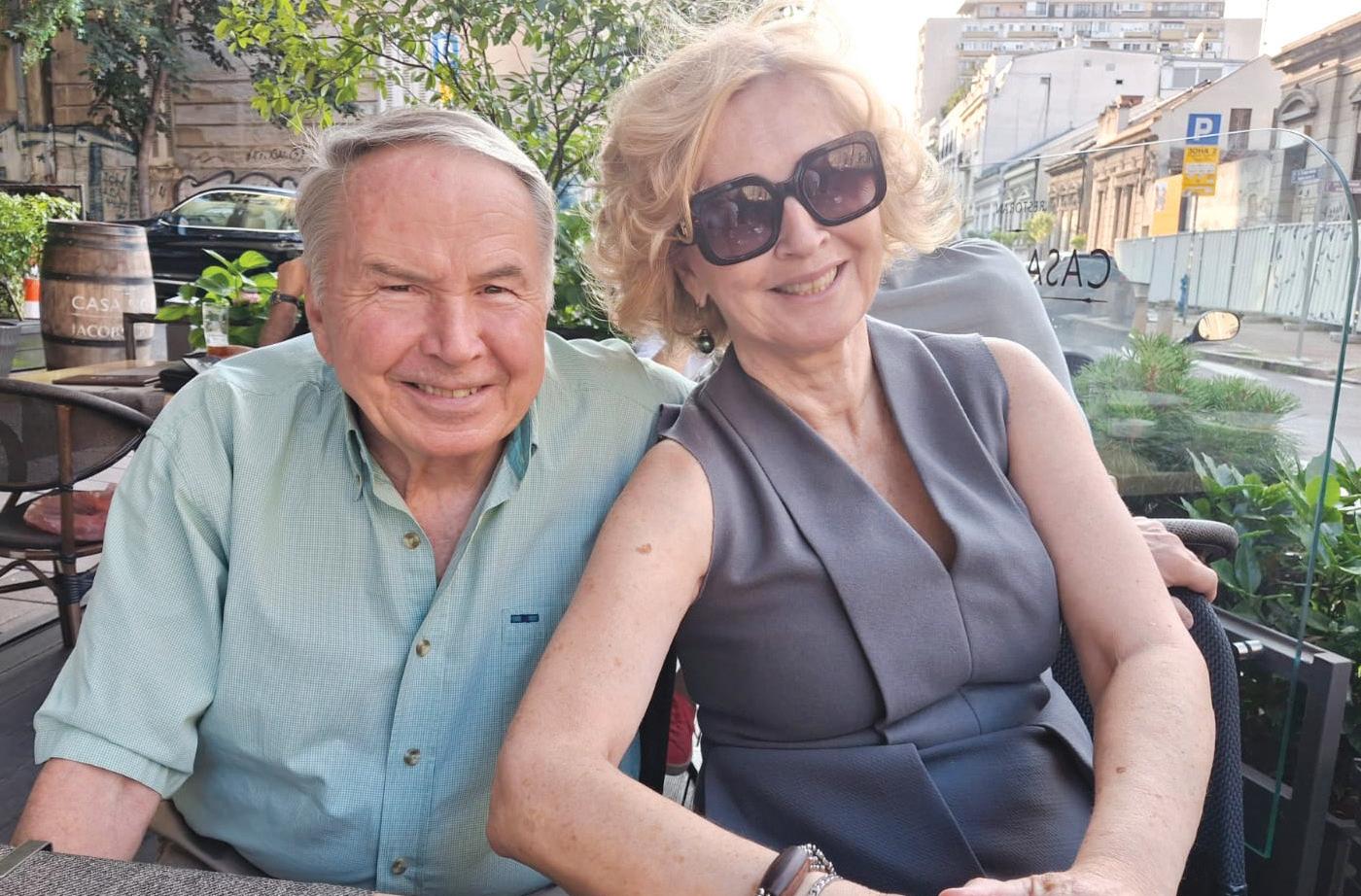
WILLIAM AND LYNNE MONTGOMERY
former U.S. Ambassador to Serbia (2001–2004) and his wife
William Dale Montgomery, a former U.S. Ambassador to Serbia (2001–2004), is now retired and living in Croatia with his wife, Lynne. Since leaving diplomacy, he has written over 200 weekly columns for media outlets across the region, published the book “When the Cheering Stops” about his experience in Serbia, and advised companies interested in doing business in the Balkans. He sent us this postcard from the Adriatic.
What have you been doing since you left Belgrade?
William: We have never really left Belgrade, as we return many times each year. But since retiring, I have written 204 weekly columns which ran simultaneously in Croatia, Serbia, Bosnia, and Montenegro; written one book on my Serbian experience called “When the Cheering Stops”; consulted several companies wanting to do business in the region; met and discussed issues with various political leaders in all of the countries in the region; had a business for a couple of years called Stracon; had
a 11 meter power boat for 12 years and went all over the Adriatic in it. Finally, we purchased and reconstructed an old olive mill built in 1601 in Mocici, Croatia, where we now live. Lynne: I can also add that we climbed to the summit of Kilimanjaro, as well as the highest peaks in Croatia and Montenegro. By myself, I have done two Caminos: across Spain and in Portugal. I plan a third, which goes from Florence to Rome next year. After Bill retired, I carried on on working in faculties in Croatia and Serbia
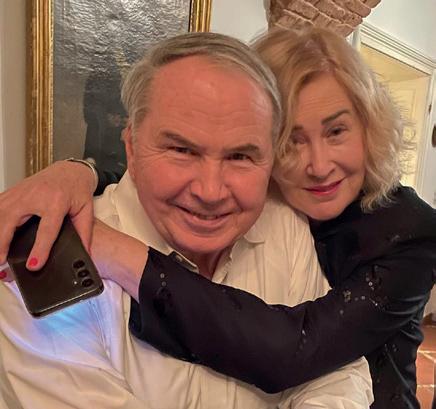
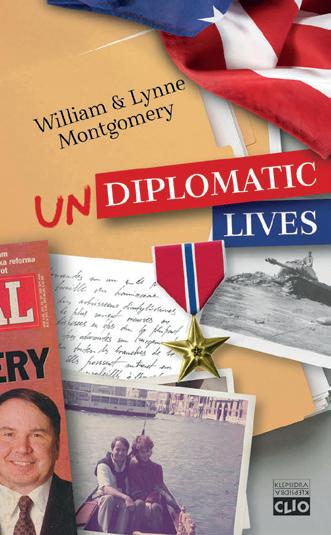
What (and who) do you miss the most from Serbia?
William: Belgrade was my last posting, and it was one filled with excitement, challenges, and, of course, the assassination of Prime Minister Djindjic, with whom I had worked closely and well. I also had other wonderful contacts in the government, some of whom I am still in contact.
Certainly, the atmosphere in Belgrade has always been friendly, and despite its size, Belgrade for me has the same feeling as I had in my small hometown in Bradford, Pennsylvania, where everything and everyone was familiar.
Lynne: I don’t think I miss Serbia, because if I do, I leave my wonderful village and go to Belgrade for a few days. I see my friends, eat too much, and generally enjoy the city. Then I come home, relax in a cafe by the sea with some good books, and for a lot of the year swim.
H.E. AHMED SALAMA SOLIMAN
New Ambassador of Egypt to Serbia
Arrival of the newly appointed Egyptian ambassador to Belgrade
The newly appointed Ambassador of Egypt to Serbia, H.E. Ahmed Salama Soliman, officially began his mission in Belgrade, presenting his credentials to the Head of Diplomatic Protocol at the Ministry of Foreign Affairs of Serbia.
Immediately upon his arrival, the Egyptian ambassador was warmly welcomed by the ambassadors of the Arab and African groups, affirming the spirit of solidarity and mutual support, as well as Egypt’s leading role in its regional and international environment.
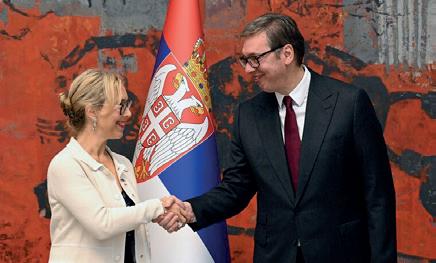
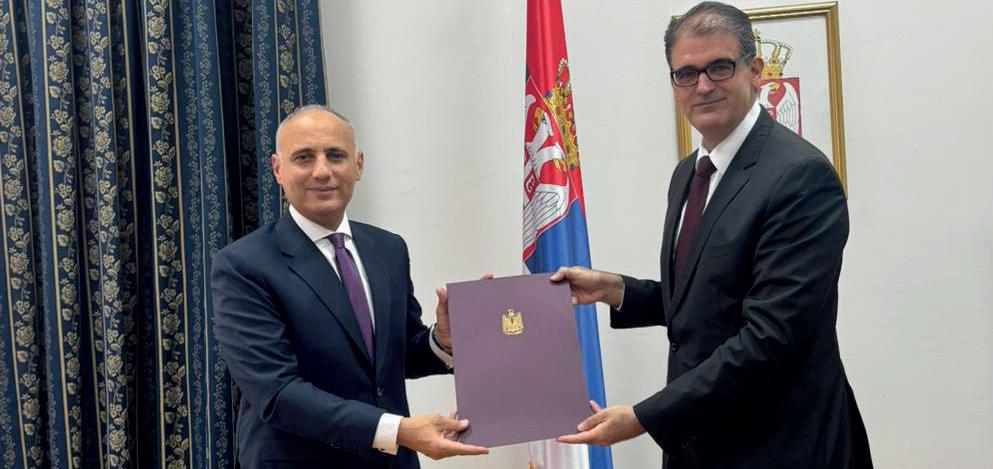
H.E. FLORENCE FERRARI
New Ambassador of France to Serbia
Appointed by decree on 19 September 2025, as the Ambassador Extraordinary and Plenipotentiary of the French Republic to the Republic of Serbia, Ms Florence Ferrari presented her credentials to the President of the Republic of Serbia, Mr Aleksandar Vučić, on 8 October during an official ceremony at the Palace of Serbia.
Ms Florence Ferrari, the new Ambassador of France to Serbia, formally presented her credentials to Mr Aleksandar Vučić, President of the Republic of Serbia. This official ceremony at the Palace of Serbia marks the beginning of her mandate in the country
H.E. NADA AL AKL
Farewell to Lebanon’s Ambassador Nada Al Akl
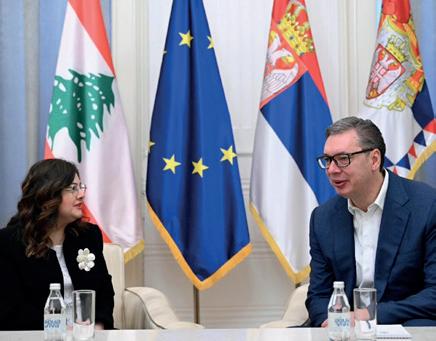
President of Serbia Aleksandar Vučić received the Ambassador of the Lebanese Republic, Nada Al Akl, for a farewell visit at the end of August.
On this occasion, President Vučić expressed his sincere gratitude to Ambassador Al Akl for everything she has done during her tenure to advance and strengthen the friendship between Serbia and Lebanon. He particularly commended Lebanon’s consistent position on respecting the territorial integrity of the Republic of Serbia and its non-recognition of Kosovo’s unilateral declaration of independence, stressing that such principled support,
H.E. LEYDE ERNESTO RODRÍGUEZ HERNÁNDEZ
Cuban Ambassador Concludes Mission in Belgrade
Nevena Jovanović, State Secretary at the Ministry of Foreign Affairs of Serbia, received Leyde Ernesto Rodríguez Hernández, Ambassador of the Republic of Cuba, for a farewell visit on September 12.
During the meeting, held in a cordial and friendly atmosphere, both sides expressed satisfaction with the traditionally friendly relations and mutual understanding between Serbia and Cuba. Jovanović thanked Ambassador Rodríguez Hernández for his dedicated work and personal contribution to strengthening bilateral relations, wishing him success in his future professional endeavours.
Ambassador Rodríguez Hernández expressed his deep gratitude to Serbia for the hospitality and support provided by various government institutions throughout his tenure, noting that he will always cherish fond memories of the Serbian people. He also reiterated Cuba’s solidarity with Serbia in defending its independence, sovereignty, and territorial integrity, while acknowledging Serbia’s continued support for the Cuban resolution against the blockade and unilateral coercive measures.
Ambassador Rodríguez Hernández has been appointed as Cuba’s Ambassador to the Holy See. During his farewell, he also held a brief meeting with Serbia’s Minister of Foreign Affairs, Marko Đurić.
rooted in international law and mutual respect, carries profound significance for Serbia.
President Vučić highlighted that Ambassador Al Akl’s dedicated work, personal integrity, and commitment left a mark worthy of respect in Serbia’s diplomatic community. She was praised not only as a dignified representative of her country but also as a true friend of Serbia who understood the spirit of the Serbian people, respected their history, and strongly believed in dialogue and cooperation.
Ambassador Al Akl departed Belgrade in early September and returned to Beirut.
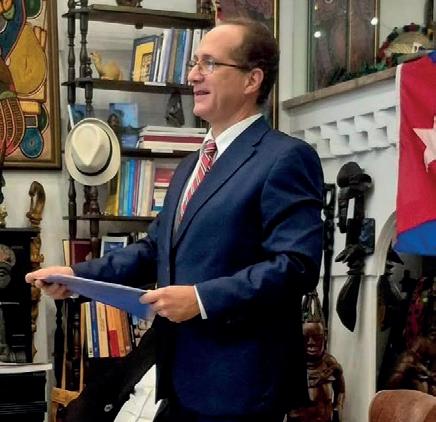
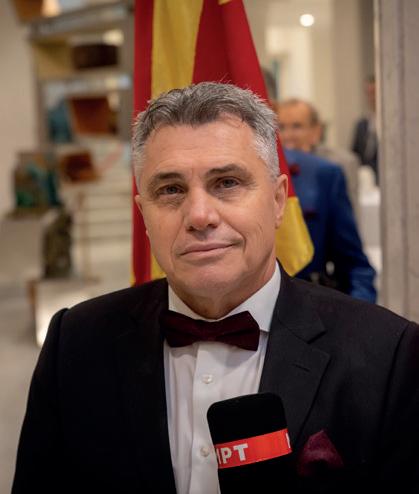
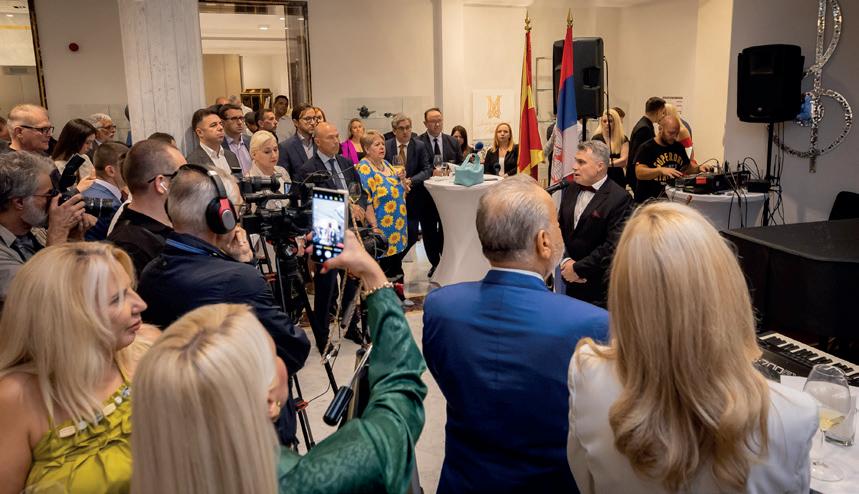
3 SEPTEMBER 2025
The reception was held on September 3rd at the Madlena Art Palace in Belgrade to mark the Independence Day of the Republic of North Macedonia (September 8th)
Guests were welcomed by the Ambassador of North Macedonia, Nikola Tupančevski. Dignitaries from the world of diplomacy, business, and culture, as well as
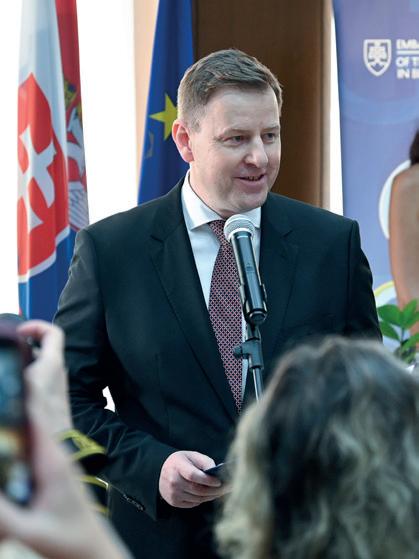
3 SEPTEMBER 2025
TMacedonians living and working in Serbia, enjoyed wines from the renowned “Tikveš” winery and music performed by Macedonian pop singer Daniel Kajmakoski.
Following Ambassador Tupančevski, guests were also addressed by Svetozar Janevski, owner of the “Tikveš” winery.
Among the diplomatic corps attending the reception were ambassadors or
mission heads from the embassies of Israel, Norway, Montenegro, Canada, Palestine, Slovakia, Denmark, Hungary, the United States, Switzerland, Libya, and several other countries.
Nevena Jovanović, State Secretary and former Serbian Ambassador to Skopje, represented the Ministry of Foreign Affairs of Serbia.
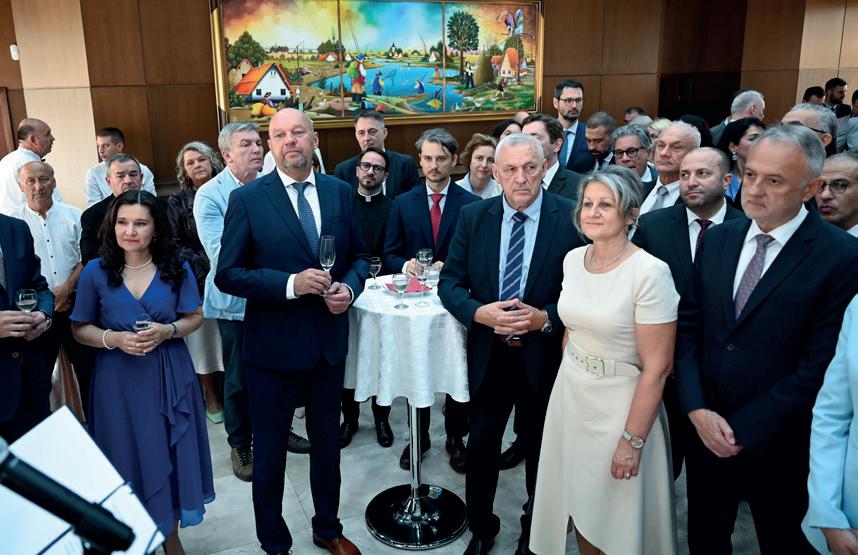
Celebrated
he Constitution Day of the Slovak Republic was marked with a reception in Belgrade, attended by numerous guests from public, cultural, political, and social life.
Among others, those seen at the reception included Prime Minister Đuro Macut, Deputy
Prime Minister of the Provincial Government of Vojvodina Tomislav Žigmanov, as well as the ambassadors of Canada, Israel, Hungary, Japan, Spain, and others…
The Slovak ambassador, Mihal Pavuk, welcomed the guests. Attendees also had the opportunity to view several artworks by
Slovak painters from Kovačica, whose art is inscribed on UNESCO’s Representative List of the Intangible Cultural Heritage of Humanity.
As a reminder, 33 years ago, on September 1, 1992, the Constitution of the Slovak Republic was adopted, serving as a foundational pillar of the country’s statehood.
The traditional September Gathering of NALED members and partners, held for the 19th consecutive year at the White Palace, brought together approximately 1,000 guests from the business sector, local governments, institutions, the international community, and the diplomatic corps. This year’s event focused on gender equality and the economic empowerment of women, which NALED has declared as its theme of the year
Symbolically, the colour of the evening was purple – the colour of equal opportunity, dignity, and resilience. Attendees helped shape a collective message about the women of the future by choosing one word to describe them and creating a unique mosaic of values and ideals, captured in the slogan “Strong and Important.”
“Since its founding, NALED has shown that equality is not just a word, but a matter of action. Together, we’ve removed unnecessary barriers – from 86 documents required for maternity benefits, to introducing equality in property registration. We’ve fought to give vulnerable groups, including women, a second chance through social entrepreneurship,” said Vladislav Cvetković, President of NALED’s Managing Board, during the opening ceremony.
Andreas von Beckerath, Ambassador and Head of the EU Delegation to Serbia, emphasised that gender equality is not only a moral obligation, but a smart economic choice:
“If women and men participated equally in the economy, the EU’s GDP per capita could increase by up to 9.6% by 2050, which would result in an economic gain of €3.15 billion. Through programs like EU PRO+ and EU4Gender Equality, the EU is directly investing in women entrepreneurs across Serbia – removing obstacles, breaking down stereotypes, and opening doors to funding and progress.”
His Royal Highness Crown Prince Alexander II Karađorđević also welcomed the guests and expressed satisfaction that the White Palace once again hosted NALED’s gathering:
“As this event has become a tradition, this time I won’t talk about how important NALED’s work is – that goes without saying now. Instead, I’d like to focus on this year’s theme, which has been very well chosen. The fight for equal opportunity is a just and worthy cause. Women have made significant contributions to the world we live in. It’s not enough to say they deserve equal conditions – it is right and just that they must have equal treatment and opportunity, in work and in every aspect of life.”
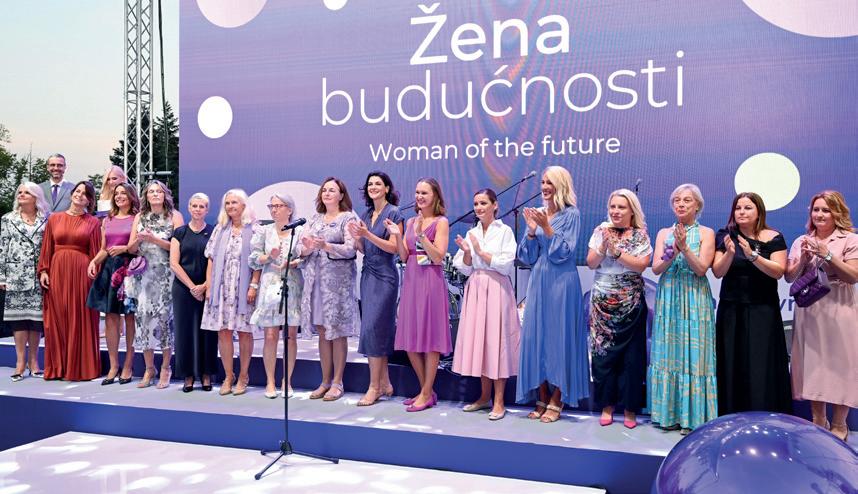
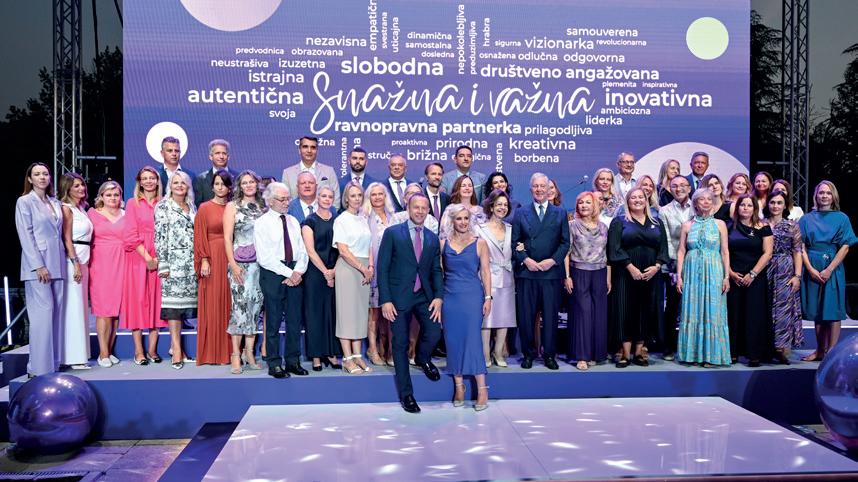
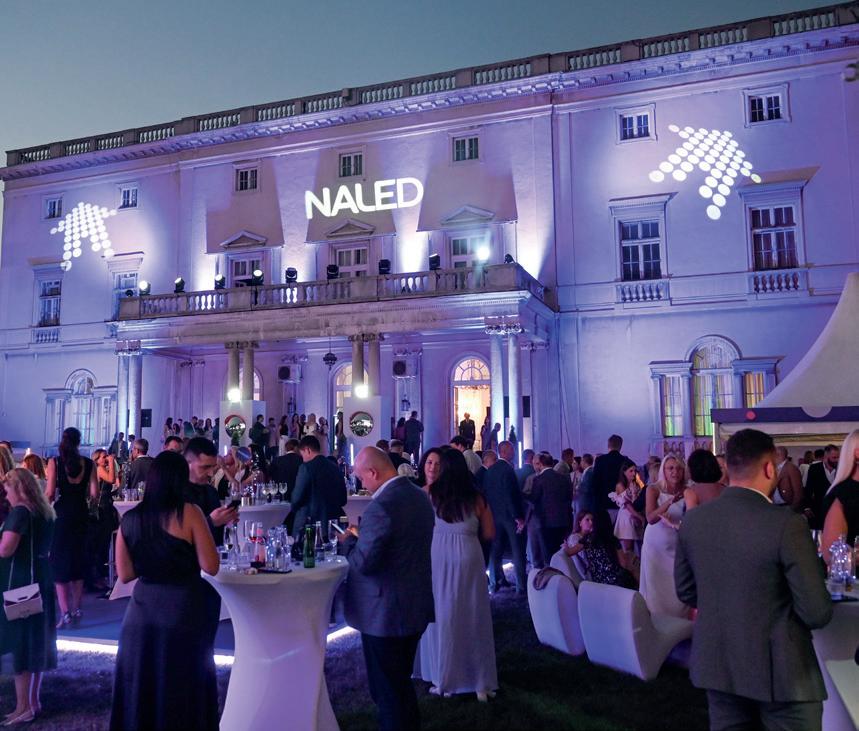
The first Italian Street Food Charity Festival took place on September 11, at Dorćol Platz, a unique event held under the slogan “EAT. LOVE. DONATE.” organised by the Association of Italian Industrialists – Confindustria Serbia.
The festival brought together a large number of visitors who, while enjoying authentic Italian specialities and a lively atmosphere, contributed to a humanitarian cause – raising funds for the National Association of Parents of Children with Cancer (NURDOR). For over 20 years, NURDOR has been providing practical, emotional, and material support to children with cancer and their families.
The festival was officially opened by Erik Košuta, First Vice-President of Confindustria Serbia; H.E. Luca Gori, Ambassador of the Republic of Italy to Serbia; Joland Korora, President of NURDOR; and Francesco Nicolai, Youth Coordinator at Confindustria Serbia.
Visitors had the chance to enjoy Italian favourites such as pizza, arancini, pasta, and piadina, accompanied by the sounds of Italian music, while the youngest guests took part in a creative workshop organised by the Art Central educational centre.
Erik Košuta, First Vice-President of Confindustria Serbia, invited guests to enjoy the Italian delicacies, expressing his honour at being part of the event’s organisation. “As Confindustria, we represent Italian business here, but when we have the opportunity to stand out in society through such a noble initiative, it is a particular honour,” Košuta said.
Italian Ambassador Luca Gori thanked Confindustria Serbia for initiating the event. “Tonight, we have a combination of Italian food and solidarity. Being Italian is not a matter of origin but of solidarity and friendship,” Gori stated.
Joland Korora, President of NURDOR, emphasised that their cooperation with Italy has lasted for 17 years, given that children from Serbia are treated in Bologna. “At present, six of our families are there for treatment. We visited them a month ago, and we are doing something great – saving children’s lives,” Korora said.
“This event demonstrated the power of togetherness and solidarity. Confindustria Serbia not only brings together companies and business leaders but also promotes the values of unity, responsibility, and solidarity. We are proud that through this initiative,EV we have managed to connect Italian tradition, culture, and gastronomy with a humanitarian goal. Because we believe that the business community should support the society in which it operates,” the organisers stated.
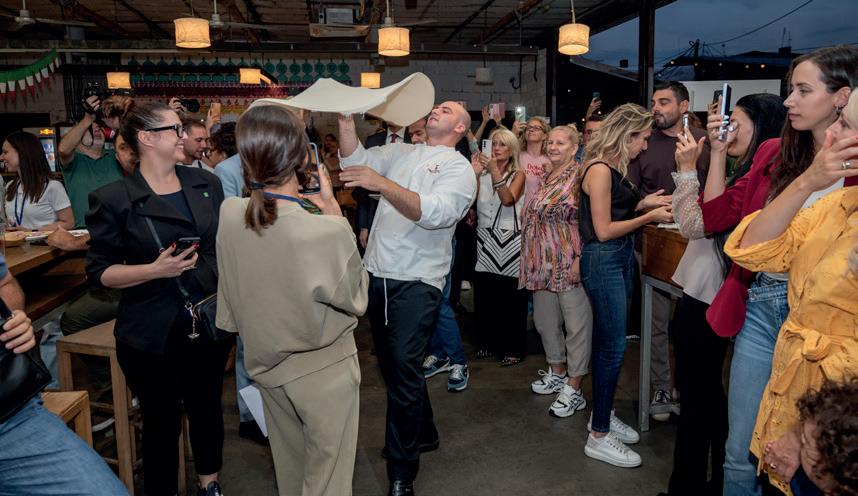
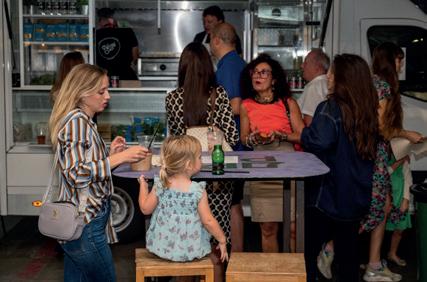
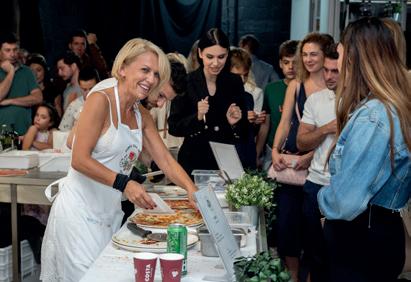
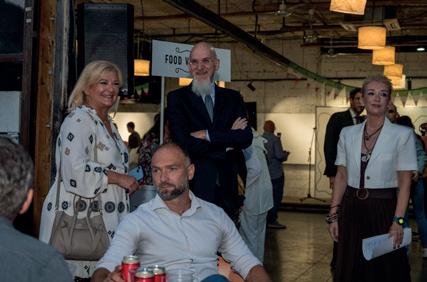
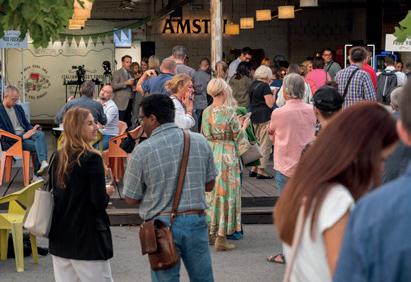
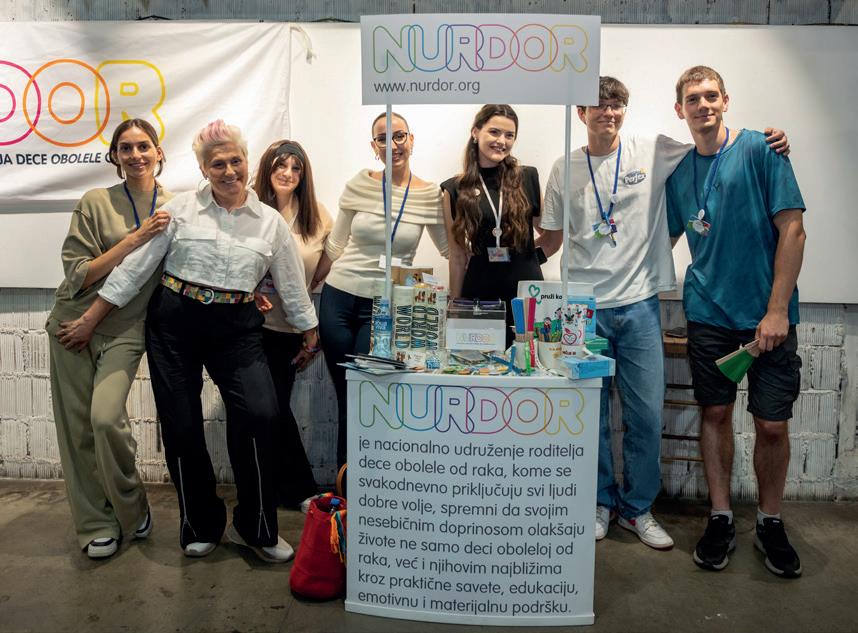
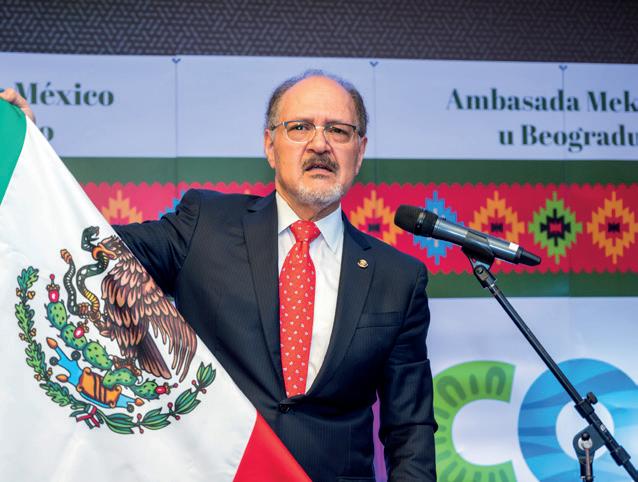
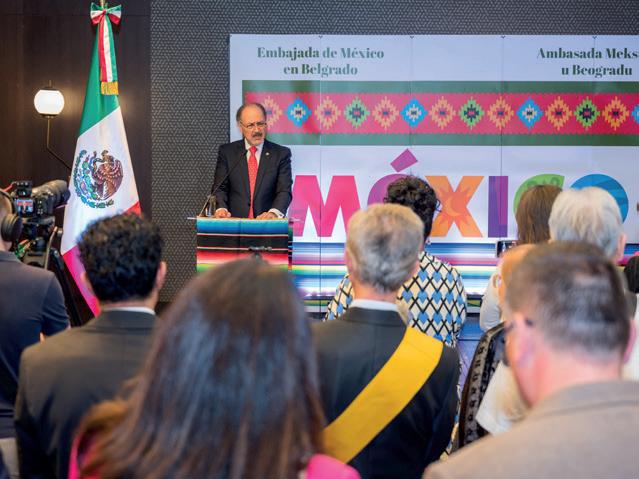
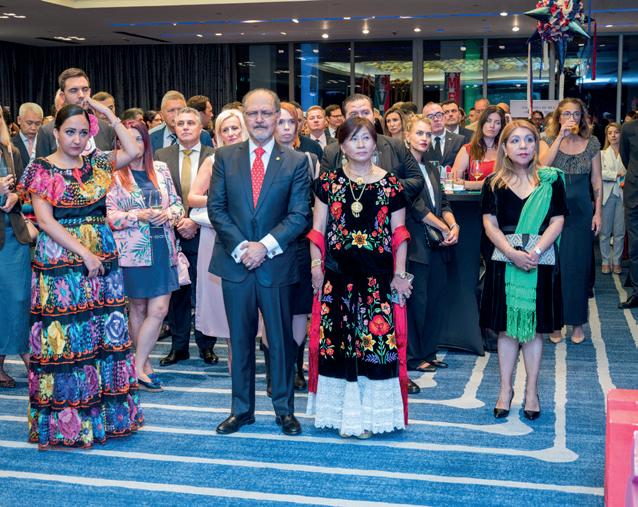
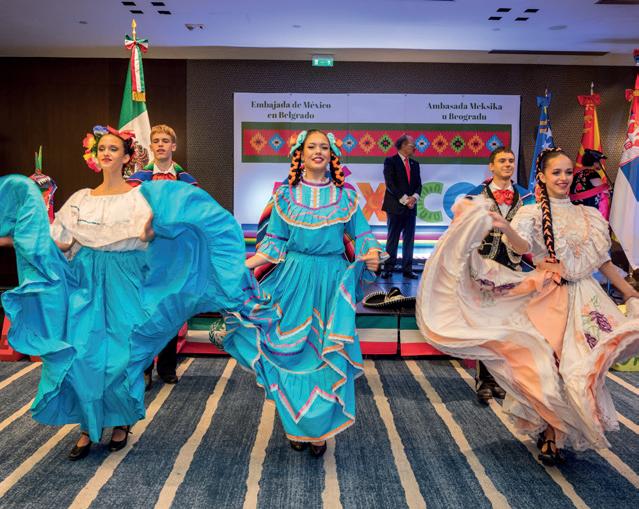
SEPTEMBER 2025
Grito de Dolores
mexico c elebrates
The Embassy of Mexico in Serbia hosted an official reception at the Metropol Palace Hotel in Belgrade to commemorate the 215th anniversary of Mexico’s Independence. The event brought together approximately 300 guests, including members of the Mexican community residing in Serbia, Bosnia and Herzegovina, Montenegro, and North Macedonia, as well as government officials, members of the National Assembly, accredited diplomatic corps, civil society representatives, business leaders, academics, and friends of Mexico.
The ceremony was presided over by Ambassador Carlos Félix Corona, who highlighted the historic significance of President Claudia Sheinbaum Pardo’s leadership as the first woman to head the Mexican Executive. Her presidency marks a milestone in inclusion and transformation, with a strong commitment to advancing Mexico’s feminist foreign policy.
Ambassador Félix Corona emphasised the strengthening of bilateral ties between Mexico and Serbia, celebrating 79 years of diplomatic relations. He noted recent progress in the relationship, including the presence of major Mexican companies such as América Móvil and Grupo Bimbo. A particularly symbolic gesture was the naming of a street in Belgrade after Mexico, reflecting the deepening friendship between the two nations.
Cultural and academic cooperation was also highlighted, with growing interest in Mexican literature translated into Serbian and active promotion of Mexican culture by Serbian universities. A special recognition was awarded to Dr Bojana Kovačević Petrović, professor at the University of Novi Sad, for her outstanding contributions to fostering mutual understanding and appreciation between Mexico and Serbia.
One of the evening’s most memorable moments was the traditional Grito de Dolores, enthusiastically celebrated by the Mexican
community and warmly received by all attendees.
The artistic program featured performances by the Serbian Talija Art Company, showcasing traditional dances from the state of Jalisco, and Mexican singer Carla Cardenal, who delighted the audience with a repertoire of Mexican music. Guests also enjoyed a Mexican culinary showcase and promotional tourism videos of Mexico.
The celebration was made possible thanks to the generous sponsorship of local companies A1 and Maliqi Group, strategic partners of the Embassy, in organising this important event.
On September 16, with the support of the Ministry of Foreign Affairs of Serbia, the Belgrade Tower—the tallest structure along the Sava River and visible throughout the city—was illuminated with the colours of the Mexican flag, accompanied by a congratulatory message marking the 215th anniversary of Mexico’s independence.
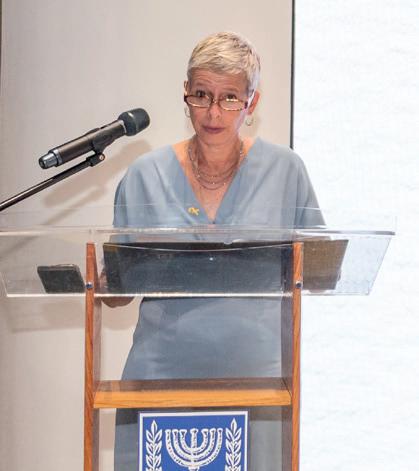
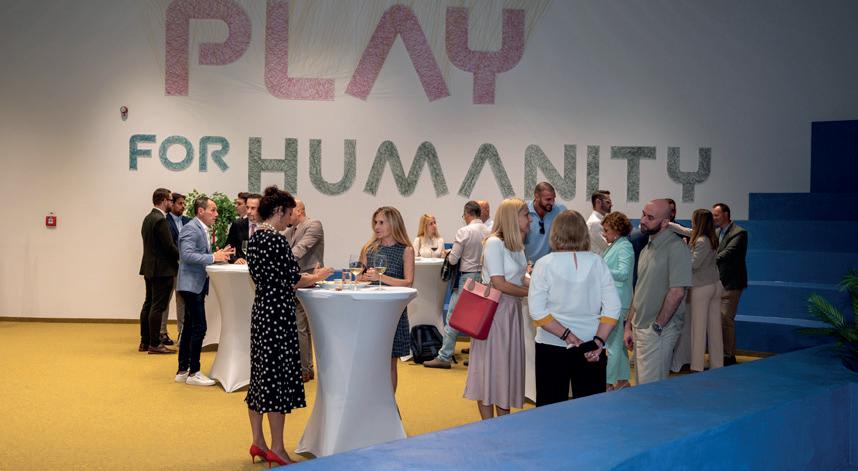
SEPTEMBER 2025
Jewish New Year – Rosh Hashanah Celebrated at “Playground EXPO 2027”
Continuing a cherished tradition, the Israeli Embassy in Belgrade hosted a business cocktail event in celebration of the Jewish New Year, Rosh Hashanah
The gathering brought together partners, colleagues, and friends from the Government of Serbia, municipalities, the business and academic communities, civil society, as well as the growing Israeli business community, to exchange ideas and strengthen business ties.
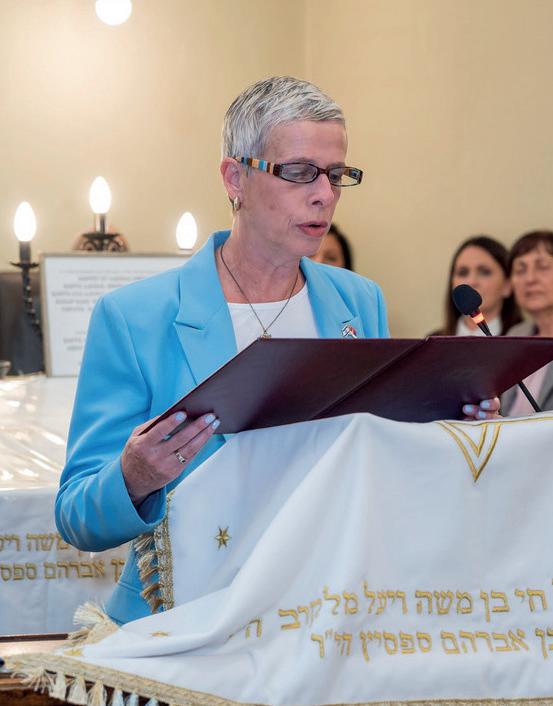
29 SEPTEMBER 2025
This cocktail reception has been organised for the tenth consecutive year, and this time it was held at the “Playground EXPO 2027” venue at the Belgrade Fair.
“We are especially pleased to host this celebration right here at the Playground EXPO 2027 space, which reflects a spirit of innovation, creativity, and visionary thinking,” said the Ambassador of Israel, Avivit Bar-Ilan.

She added, “Serbia’s preparations for EXPO 2027 are impressive, and we congratulate you on your progress. Israel proudly supported Serbia’s bid to host EXPO 2027 and was among the first countries to confirm its participation in EXPO 2027 here in Belgrade. We look forward to working together to make it a true success,” said the Israeli Ambassador.
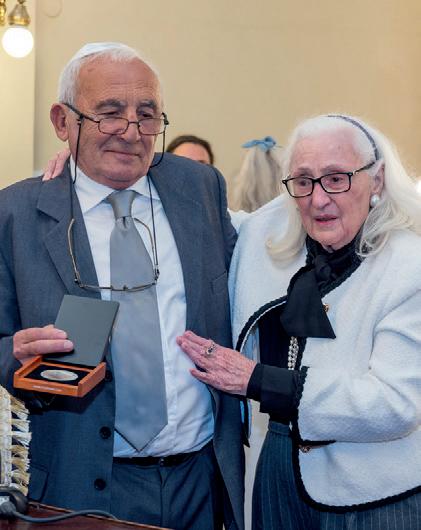
Righteous Among the Nations Medal Awarded at the Belgrade Synagogue
The Embassy of Israel yesterday organised the Righteous Among the Nations Medal Award Ceremony at the Belgrade Synagogue. At the Belgrade Synagogue, the Righteous Among the Nations Medal was posthumously awarded to Živorad Bećagović.
On behalf of Yad Vashem, the honour was presented by the Ambassador of Israel, Avivit Bar-Ilan, to his grandson, also named Živorad Bećagović, after his grandfather.
The ceremony was attended by Beti Đilda Kabiljo (89), who, together with her mother Lea, was hidden by Bećagović during World War II.
The Righteous Medal and the inscription of one’s name in the Garden of the Righteous at Yad Vashem represent the highest honour Israel bestows upon those who saved Jews during the Holocaust. The event highlighted the importance of testimony and the responsibility of passing remembrance on to future generations.
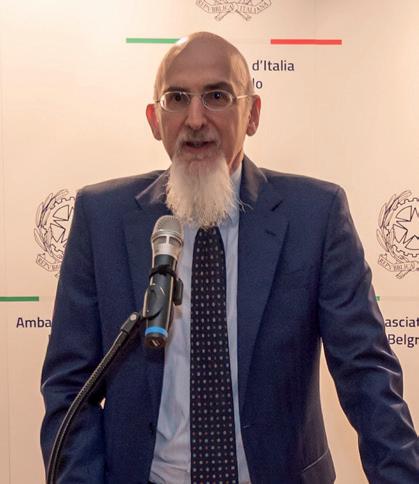
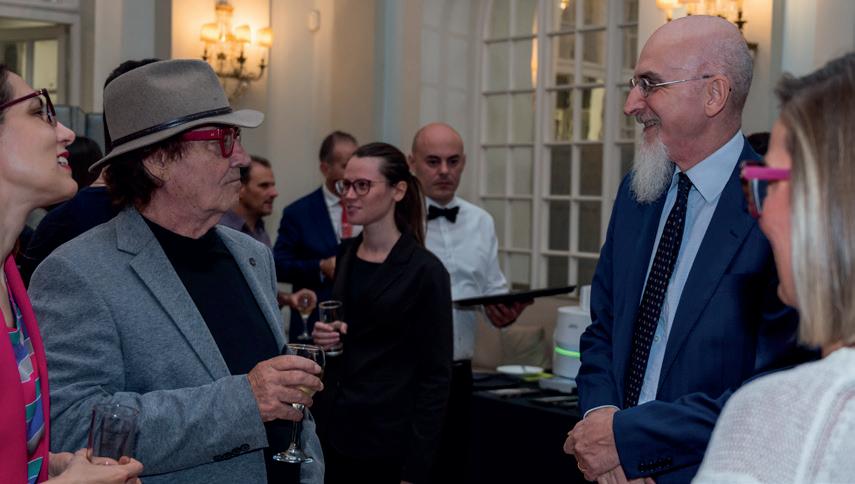
17 SEPTEMBER 2025
The Embassy of Italy in Belgrade hosted a press conference at the Residence of the Italian Ambassador, where H.E. Luca Gori officially announced this year’s festival. In his address, Ambassador Gori recalled the wealth of cultural initiatives organised by the diplomatic mission in recent months and invited the audience to discover the best of contemporary Italian cinema during the festival.
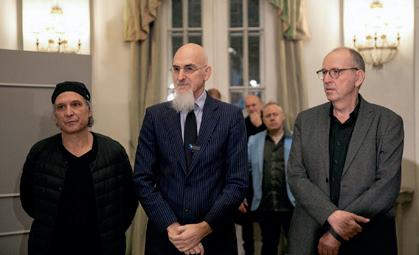
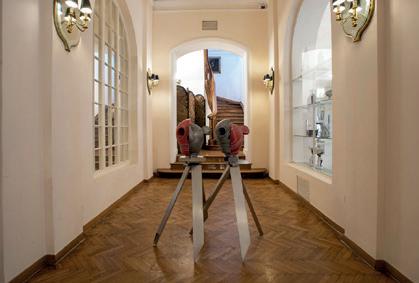
10 OCTOBER 2025
From September 18 to 22, numerous film screenings, meetings with authors, and events promoting Italian culture will take place at the festival, conceived and promoted by Gabriella Carlucci.
Following the ambassador’s remarks, the festival’s creator and curator, Gabriella Carlucci, presented the programme of this tenth edition. It is marked by films of various genres – from action to romance to
comedy – aiming to bring Italian productions with highly original screenplays to the Serbian audience.
Guests at the press conference included Italian actors Salvatore Esposito and Fortunato Cerlino, stars of the opening film In the Wolves’ Den and famous for their roles in the iconic series Gomorrah. Salvatore Esposito revealed that he had to learn many lines in Serbian for his role as a Serbian criminal in the film.
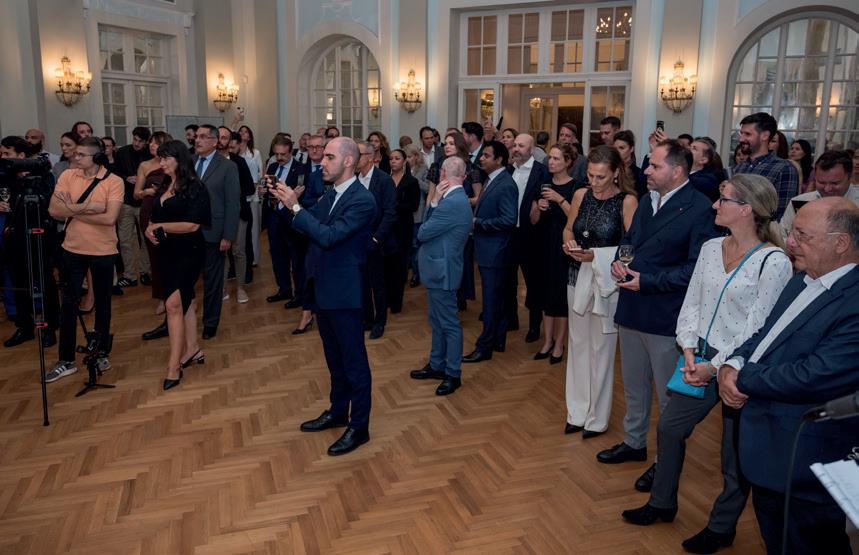
Exhibition “Tentativo” as a Meeting Point Between Serbia and Italy
An exhibition titled Tentativo – an artistic dialogue between Giuseppe Petroniro and Mrđan Bajić – was opened at the Residence of the Italian Embassy.
Through light, space, and form, the two artists engage in a conversation about the
boundaries of perception and the power of creation.
In his work Rocking Doors, Petroniro explores the passage between the real and the imagined, while Bajić, in Look at Me with the Eyes of Apollo, evokes a mythological expression in a contemporary guise. Their joint project, Tentativo, transforms the space into a living body of art – a meeting point between Italy and Serbia.
Curator Nataša Radojević has brought together the two artistic voices in an exhibition that will remain open until December 10, 2025.
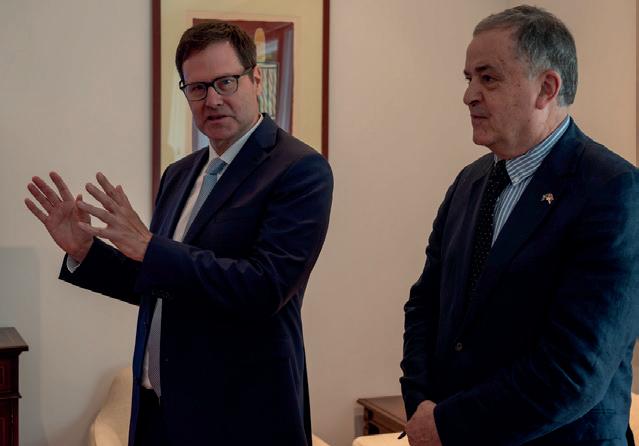
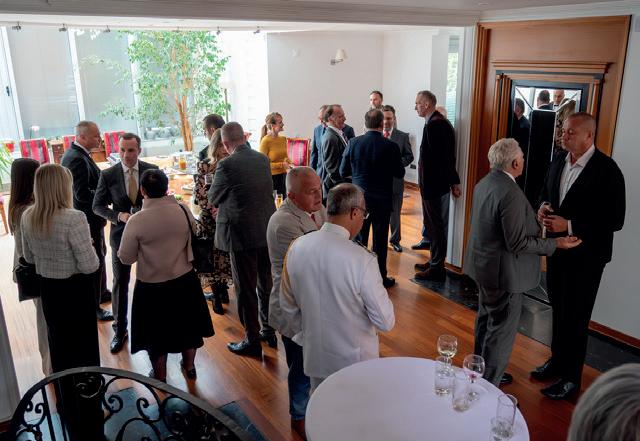
1 OCTOBER 2025
Reception at the Residence of the Australian Ambassador on the Occasion of the Premiere of the Film “Kajmakčalan”
Areception was held yesterday at the residence of the Australian Ambassador, H.E. Mr Peter Truswell, on the occasion of the premiere of the film Kajmakčalan, which tells the story of the participation of Australian volunteers— mostly nurses—in the battles of the Serbian army at Kajmakčalan during the First World War
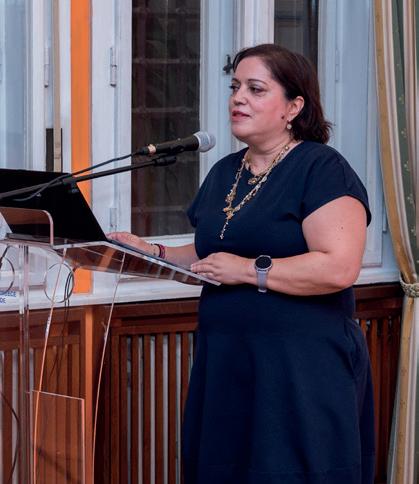
9 OCTOBER 2025
Representatives of public, social, and cultural life attended the reception.
The film premiere took place at the Belgrade Youth Center. While researching Australian, Serbian, British, and French archives, Bojan Pajić discovered that more than 1,500 Australian and New Zealand volunteers—doctors, nurses, ambulance drivers, soldiers, sailors, and air force
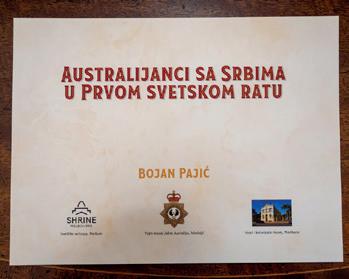
members—served side by side with Serbian forces during the war, supporting the Serbian resistance against the Austro-Hungarian and German invasion.
The film, based on a screenplay by Boris Trbić and Bojan Pajić, was directed by Trbić and Dragan Gavrilović, produced by the Australians with Serbs Association Inc.
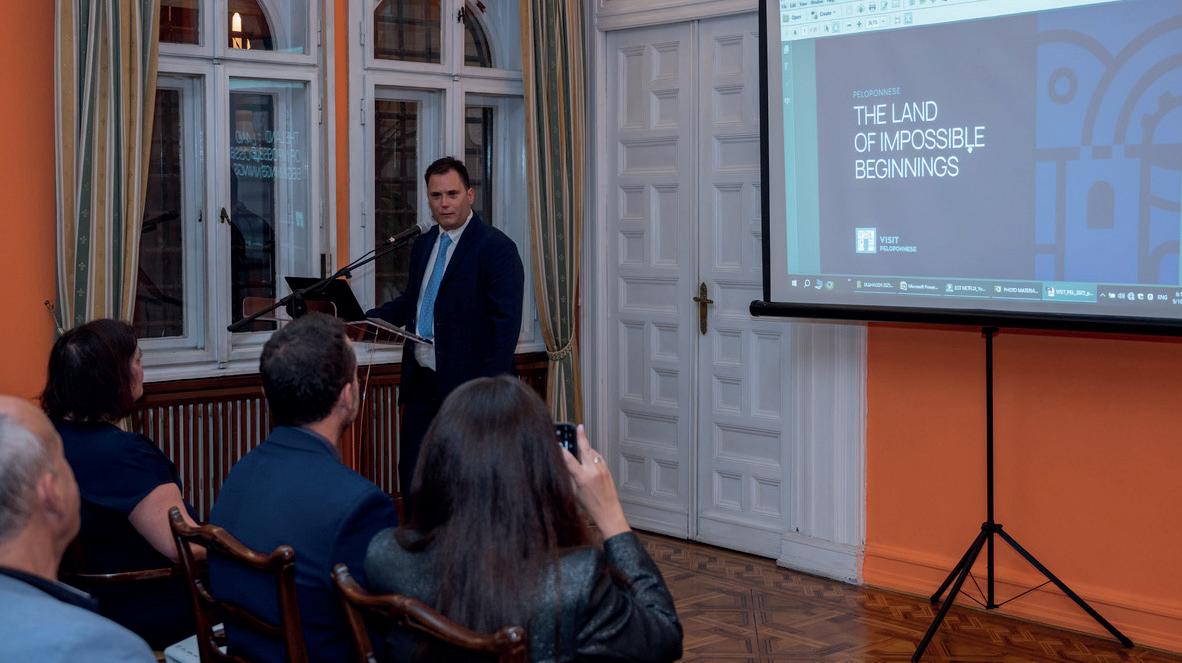
At the residence of the Ambassador of Greece, an event dedicated to the Peloponnese – the heart of Greek culture, nature, and gastronomy – was held yesterday.
Her Excellency, Ambassador of Greece Maria Levanti, and the Head of the Office of the Greek National Tourism Organisation in Belgrade, Giorgos Kakoutis, presented the riches of the Peloponnese: from the ancient
Epidaurus and the Mycenaean sites of Mycenae and Tiryns, through the historic Nafplio, to Voidokilia Beach and the famous Kalamata olives.
The long-standing friendship between Serbia and Greece was emphasised, highlighting that Greece remains a favourite destination for Serbian tourists, who always return for its sunshine, sea, and hospitality.
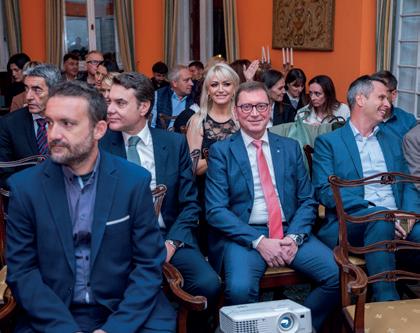
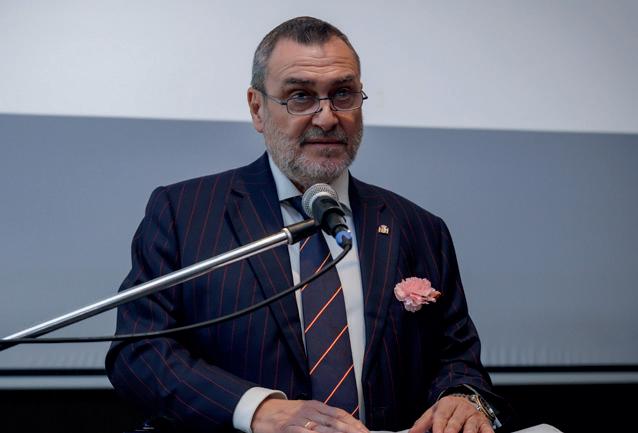
10 OCTOBER 2025
Celebration of Spain’s National Day in Belgrade
The Embassy of Spain in Belgrade marked Spain’s National Day with a formal reception in the Serbian capital.
The hosts of the evening, His Excellency Juan José Sanz Aparicio and Mrs María Jesús Rivero Rivero, gathered friends of Spain and members of the diplomatic community for the occasion. It was an evening of encounters, conversations, and new stories that connect Spain and Serbia.
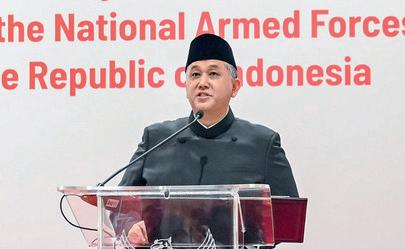
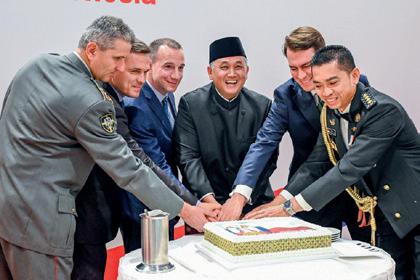
11 OCTOBER 2025
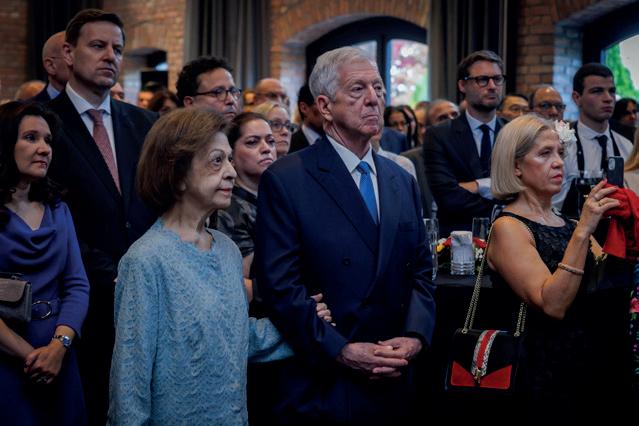
This day commemorates a moment from 1492, when the sea ceased to be a boundary — Columbus reached Guanahaní and opened a new chapter of lasting ties between Europe and the Americas.
On the same day, the city of Zaragoza celebrates the Día del Pilar, the feast of Our Lady of the Pillar, the patroness of Aragon and the Civil Guard. Thousands of people traditionally bring floral offerings, creating a mosaic of colours and togetherness that gives Spain its warm and recognisable face.
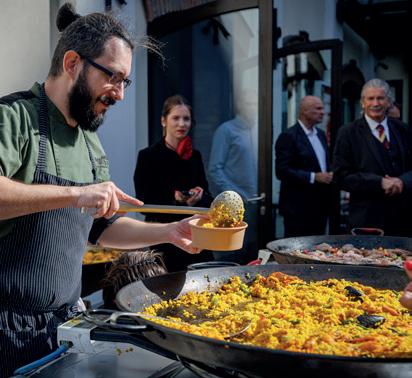
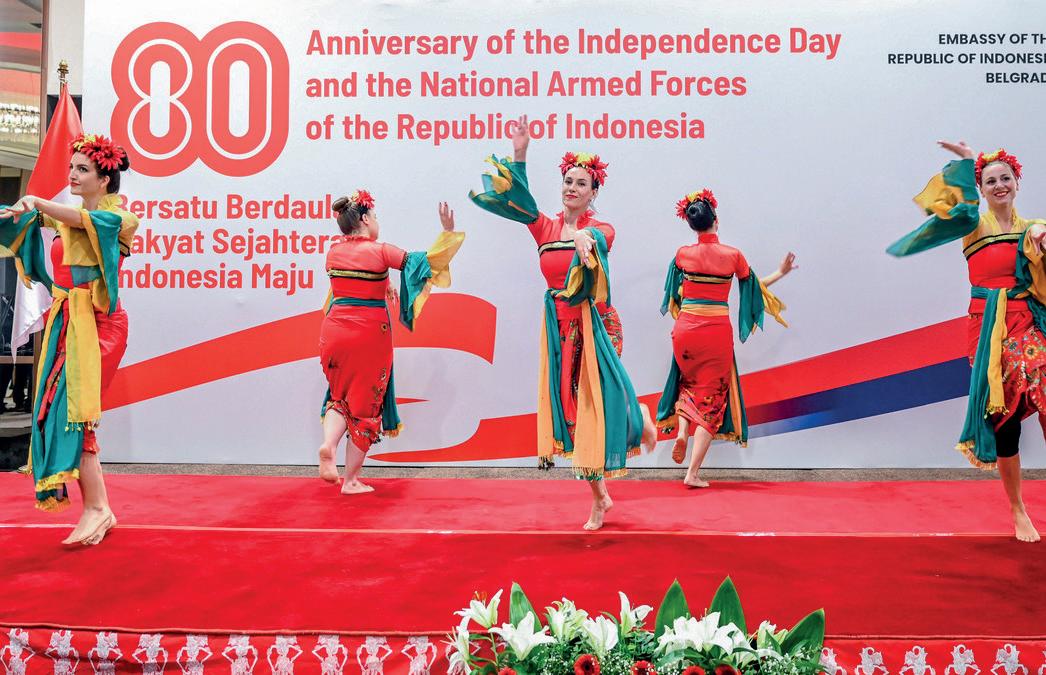
Celebration of the 80th Anniversary of Indonesia’s National Day
The Embassy of Indonesia in Belgrade organised a reception in honour of the 80th anniversary of the Independence Day and Armed Forces Day of the Republic of Indonesia. The host of the evening was His Excellency Ambassador Andreano Erwin.
When Sukarno and Hatta read the Proclamation on 17 August 1945, the sea ceased to be a divider of islands and became the thread that united them into a single story — Indonesia.
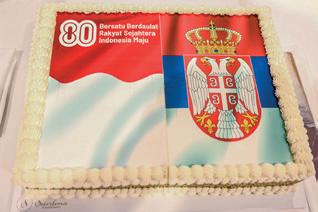
The celebration in Belgrade served as a reminder that freedom is nurtured through ceremony, togetherness, and joy — and that friendships grow when great stories are shared sincerely.
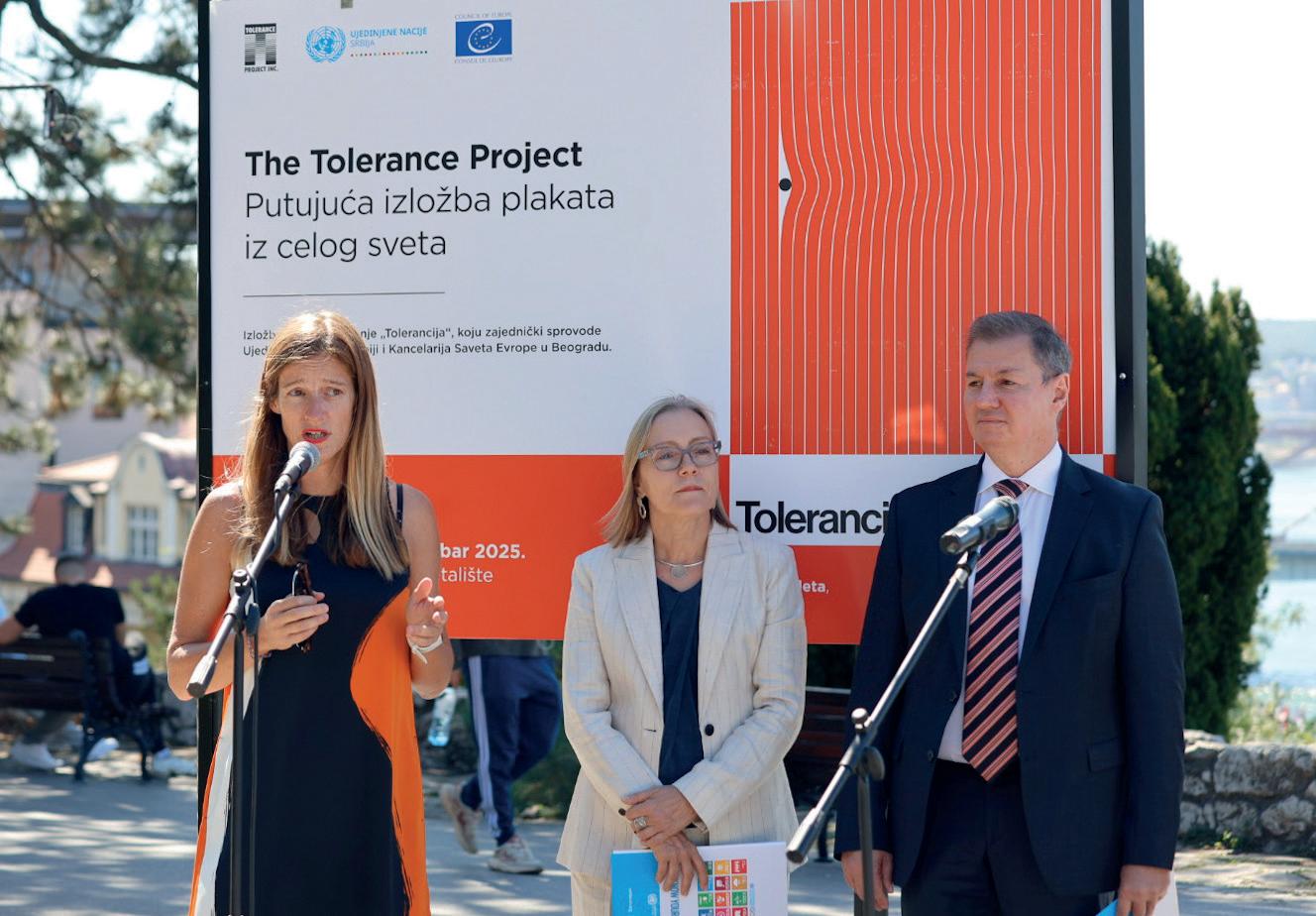
A global travelling poster exhibition curated by Mirko Ilić, presented by the UN and c ouncil of Europe, is now on view at the Sava Promenade of Belgrade Fortress until the end of September subtitlesubtitle subtitlesubtitle subtitlesubtitle subtitle
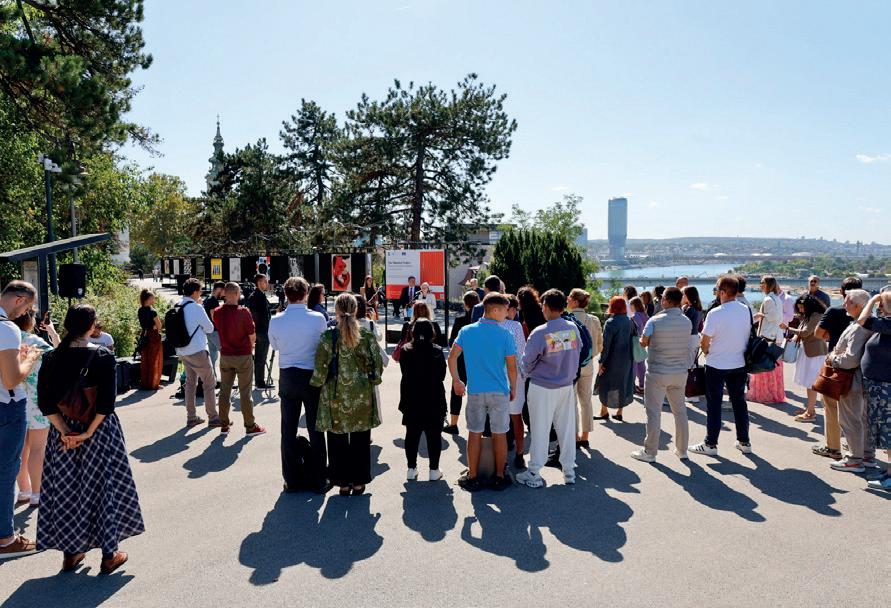
The United Nations in Serbia and the Council of Europe Office in Belgrade today opened the exhibition The Tolerance Project – A Travelling Poster Show on the Sava Promenade of the Belgrade Fortress. The latest Belgrade edition features a selection of new works from the global initiative launched and curated by designer Mirko Ilić, which has so far showcased the work of over 200 artists from more than 40 countries and all continents.
Over the years, The Tolerance Project has been presented in Belgrade as well as in cities such as New York, Madrid, Tokyo, and Johannesburg. The 2025 edition features works by local authors, including Marko Vuleta, Borut Vild, Dušan Petričić, Slavimir Stojanović, and Stefan Gajić, among others. Their works are displayed alongside international pieces that address prejudice and inspire reflection through the universal language of design.
The exhibition is part of the broader “Tolerance” campaign, a joint initiative of the United Nations and the Council of Europe launched this year to promote inclusion and counter hate speech through art, education, and public engagement.
Opening the exhibition, Matilde Mord, UN Resident Coordinator in Serbia, emphasised the relevance of the topic: “Tolerance is not passive acceptance, but an active choice. At a time when divisions are visible in societies, these
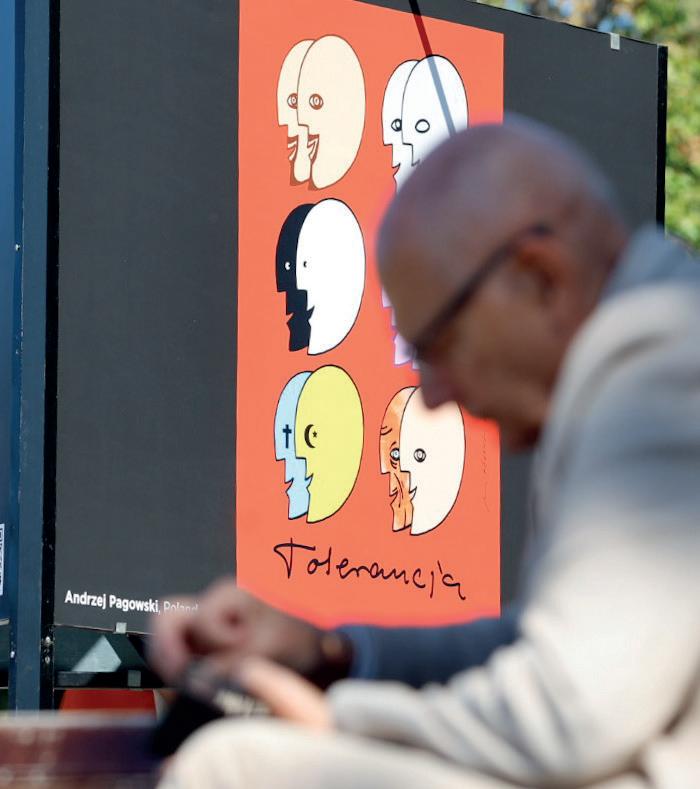
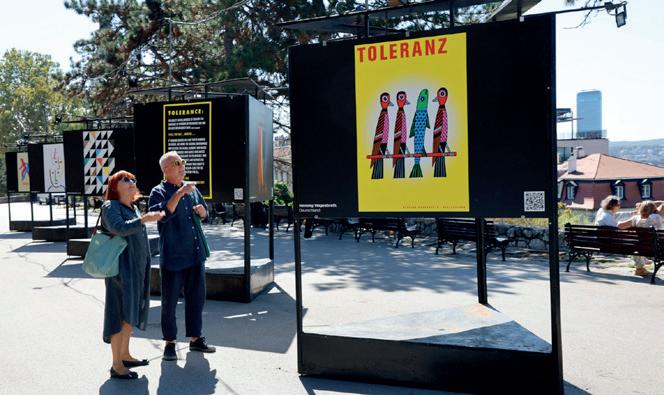
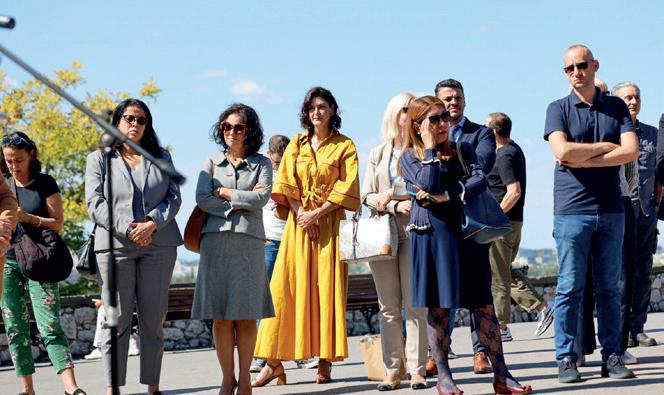
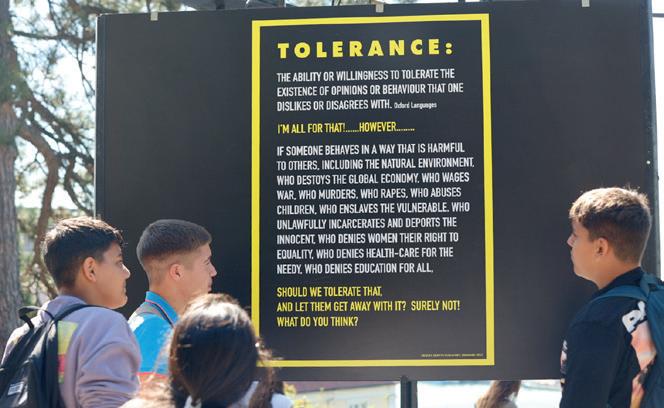
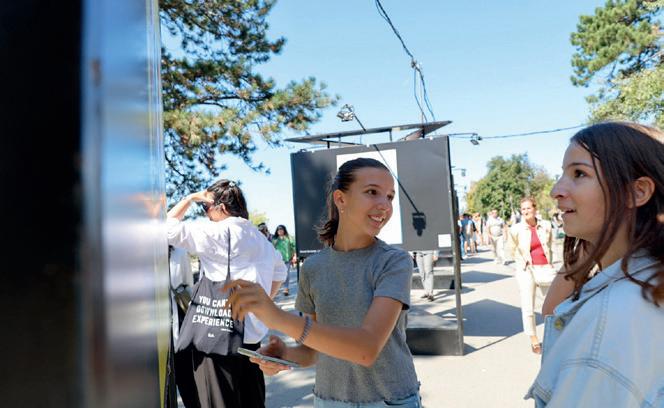
“TOLERANCE IS NOT PASSIVE ACCEPTANCE, BUT AN ACTIVE CHOICE.” – MATILDA MORT
posters remind us that respect, empathy, and fairness are the foundations that hold communities together.”
János Babity, Head of the Council of Europe Office in Belgrade, stated that “The exhibition is an invitation to all of us to say NO to prejudice, and YES to inclusion. Every step in that direction contributes to creating a community that is rich in its diversity and united in solidarity.”
Speaking at the opening, Professor Borut Vild, one of the Serbian authors, said: “We can dedicate this exhibition to the visual messages that have strongly shaped the public space in recent months — the vernacular design that arises from people’s need to express emotions and attitudes. The works of these authors were created from the same impulses: from the need to respond to injustice, violence, exclusion,
and hatred. Design, in that sense, is our mother tongue.”
The exhibition will remain open until the end of September on the Sava Promenade of the Belgrade Fortress, overlooking the confluence of the Sava and the Danube. Admission is free.
The “Tolerance” project was implemented in cooperation with Color Media Events, the publisher of Diplomacy & Commerce magazine.
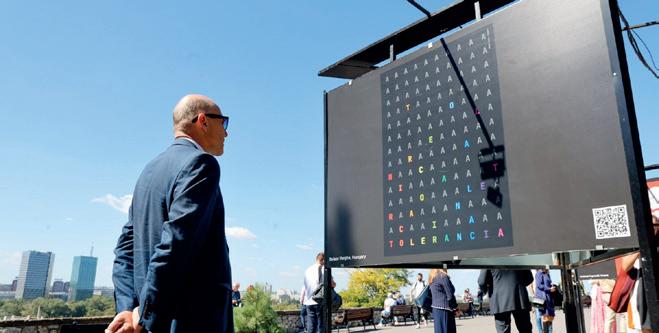
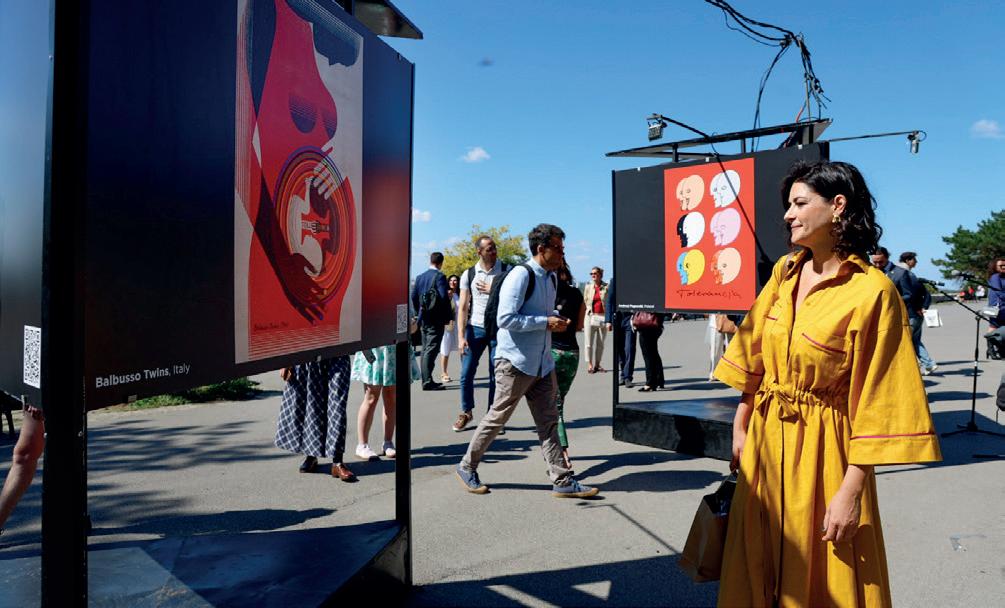
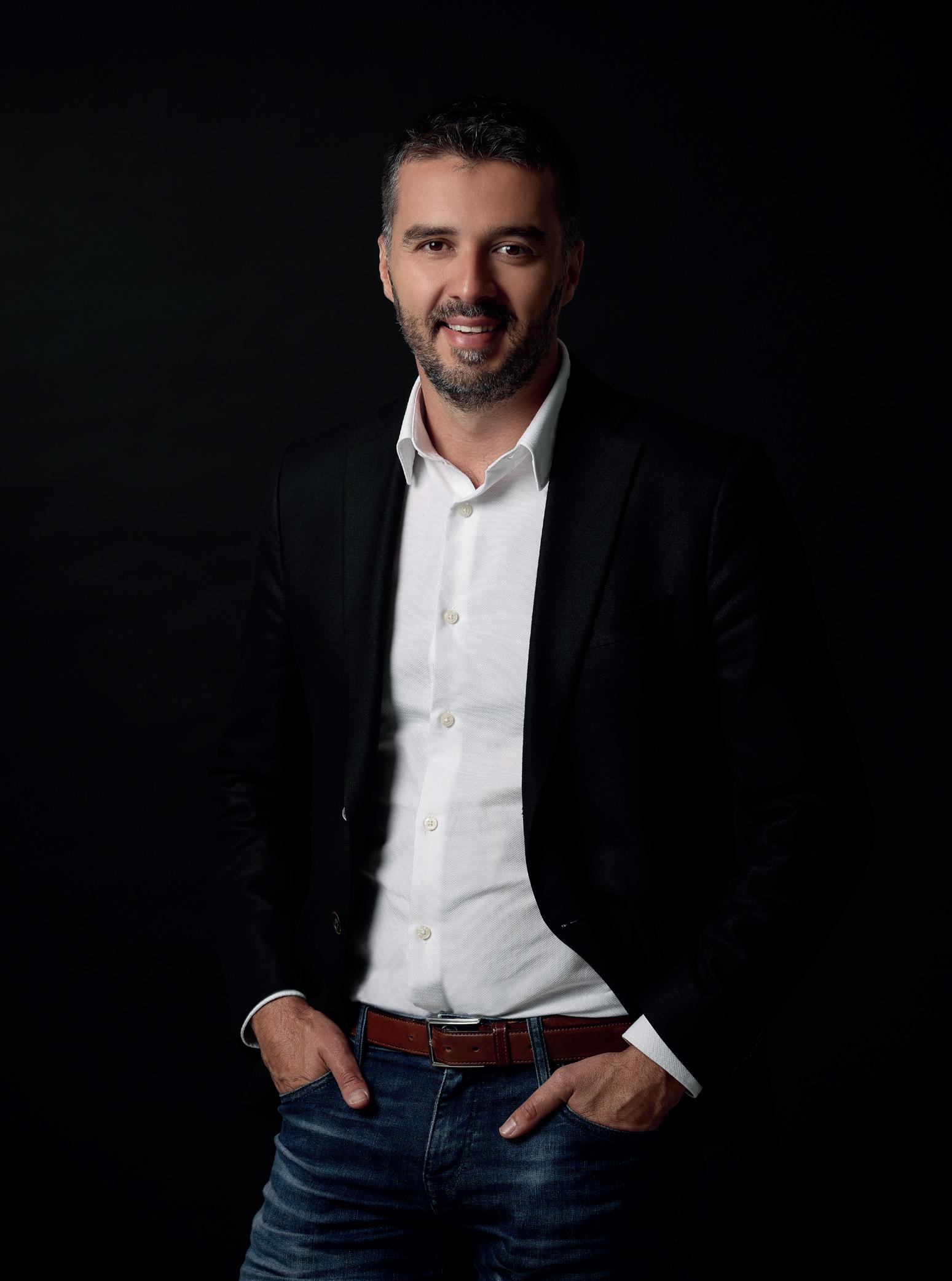

On protests, captured institutions, and why Serbia’s future cannot be stopped
Kreni-promeni Movement
Savo Manojlović, leader of the Kreni-Promeni movement, speaks about the growing wave of student and civic protests, the collapse of institutions, and why each new cycle of demonstrations brings Serbia closer to change.
You have been the target of physical attacks on several occasions. How do you interpret the fact that political activists and movement leaders are becoming targets? Is this part of a broader strategy to intimidate political opponents? There have been several attacks. I would single out the one in which I was physically assaulted by a member of the ruling party’s loyalists, an employee of the Government of the Republic of Serbia and an associate of Novak Nedić, who is linked to criminal clans. The attack happened while I was with my eight-month-old son and my wife. After I overpowered him and performed a citizen’s arrest, the police immediately released him. This shows that the authorities have completely captured and abused state institutions. Let me remind you, the man hit me twice and threatened to kill me, and after being handed over to the police, he invoked political protection and showed his Government ID. Despite multiple witness statements and security camera footage, he was immediately released.
This is just one indication that those in power have destroyed the very institutions that should serve all citizens. Such behaviour, however, has backfired on members of that same
government. You see, there is a theory of the social contract advocated by Rousseau, Locke, and Montesquieu. Citizens give up part of their freedom so that the state can guarantee security, justice, and dignity. However, when those in power and institutions usurp the state, violate rights and liberties, undermining dignity and endangering security, citizens often take justice into their own hands. Politicians from the ruling party can no longer walk the streets without security, angry citizens come to their homes, and that is the boomerang of chaos they themselves have created.
ABSOLUTE POWER MEANS ABSOLUTE RESPONSIBILITY
We are witnessing brutality against students and citizens who have been peacefully protesting for months. Where do you see the end of this cycle of violence, and do the protests have the strength to bring about concrete political change? In democracies, institutions resolve social conflicts. When institutions fail to do their job, conflicts spill over into the streets. Responsibility for this is proportional to power. Absolute power means absolute responsibility. This government has created chaos, bringing us to a point where each new cycle of protests is larger than the previous one. Protests have their rise, their peak, and their decline, but they also follow a pattern: since the famous blockades of 2021, every wave of protest has been more massive.
This government effectively no longer controls Serbian society. That is evident. It is no longer capable of managing the country’s processes.
Although a state of emergency has not been formally declared, many analysts claim that we are living in a kind of “informal state of emergency.” Is a formal declaration a realistic option, and what consequences would it have?
If we wanted to be a bit ironic, we could say that the state of emergency – just like the President’s “emergency” press conferences (held once a week, lasting an hour each, broadcast by all five national TV stations and 51 cable channels) – has become the regular state of affairs.
In constitutional law, which I study professionally, emergency law refers to the suspension of certain rights and freedoms to protect the constitutional order, institutions, and the state when they are under threat. This government would not introduce a state of emergency to defend the constitutional order, but rather to continue undermining it. Such a restriction of constitutional rights would itself be unconstitutional. And to be frank, the authorities are already trying to suppress and limit constitutional rights even without declaring a state of emergency. They tried to restrict the freedom of assembly by sending thugs against citizens and students who were peacefully protesting. They limit freedom of expression by dismissing and blackmailing employees of public companies. They deny the right to a fair trial by exerting pressure on the judiciary, which is supposed to be independent.
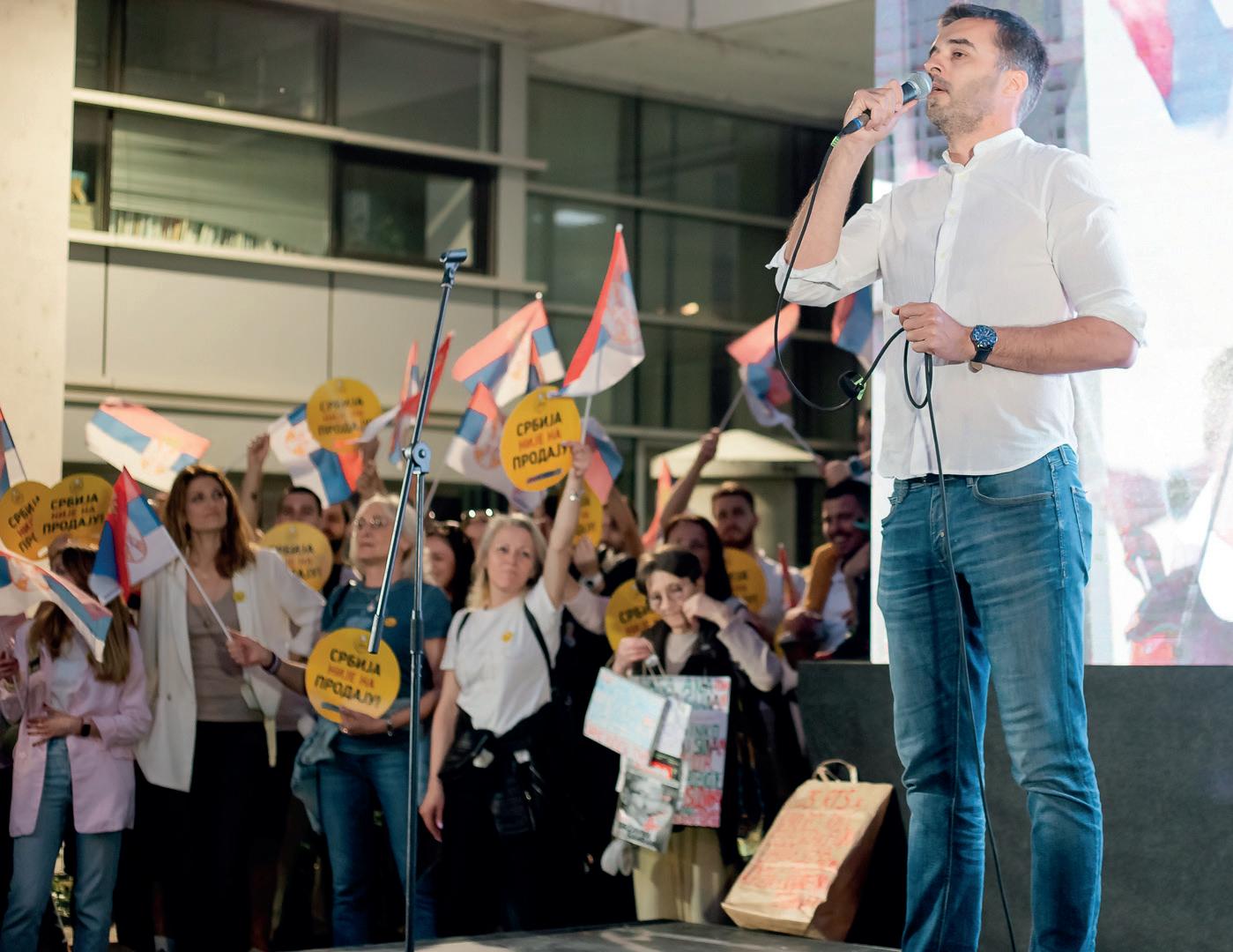
And despite all of this, they have failed to crush the magnificent uprising of a nation fighting for freedom, democracy, and the rule of law. From a formal legal standpoint, I do not expect this government to declare a state of emergency, as it lacks the capacity to enforce it, and doing so would only expose its inability to manage the situation effectively in the country.
How can the democratisation of the electoral process be achieved in a context of total media control and collapsed institutions? Are student and citizen protests enough pressure, or is an additional political strategy from the opposition also required?
THE GOVERNMENT CANNOT WIN A BATTLE AGAINST THE FUTURE
The fact that issues in Serbia are not being resolved within institutions shows that those who were supposed to build them have actually captured them. The 2021 blockades, which stopped Rio Tinto and were organised by Kreni-Promeni together with residents of the affected areas, demonstrated three key preconditions:
• First, precise and concrete demands that are legally and professionally grounded.
• Second, a narrative that transcends religious and political divisions among citizens.
• Third, a high level of mobilisation among the people.
All three preconditions have been met in this struggle led by the students. As someone who is involved both practically and theoretically (I work at an academic institute) in organising change, it is clear to me that the government cannot win a battle against the future. Serbia, due to its dismantled institutions, is currently in a state of pre-political development. There is no utopian goal or unattainable demand in this struggle. The citizens of Serbia
aspire to a democratic, free state founded on the rule of law and a commitment to combating corruption. We want “boring” institutions that do their job.
What is the role of the opposition in today’s protests, and is there functional cooperation with student organisations and civic initiatives that are driving the protests?
I believe it is fair to speak on my own behalf and on behalf of the movement I am part of. Personally, I try to attend every protest because I believe that engaging in political activism means sharing the fate of the people whose rights are being violated –people who are writing the pages of their own history, and whose
struggle will serve as an example of how to fight for freedom.
Kreni-Promeni is a young movement, but among all movements and parties, it has the most developed social media networks, with posts reaching millions of people. Our members are constantly present both on the ground and online, where they transmit messages from all gatherings and thus become part of this magnificent uprising.
As for relations between opposition actors, the principle of Kreni-Promeni is not to discuss those relations in the media, and we stick to that principle.
It seems that international actors (the EU, US, Russia, and China) are reacting rather weakly to the brutality against citizens.
How do you explain this, and is there a chance their stance will become more decisive in the coming period?
The President of Serbia tends to tell representatives of Russia and China that the demonstrators are CIA and European agents, and tells the West that the students and his opponents are actually Russian or Chinese spies. There are, of course, channels through which such false information is disseminated.
I believe that countries which fall for such stories – or whose representatives knowingly
participate in creating a false picture – lose a great deal in Serbia, above all their reputation among citizens. Regimes fall, but the people are the ones who make up a country. Tying your interests to a corrupt regime that does not control the situation seems shortsighted. In international politics, the most important thing is to be far-sighted. We do not expect international actors to take sides in our domestic politics, but rather to support fundamental principles: free elections, the rule of law, and the will of the majority of the citizens of Serbia.
EACH NEW
What is the position of the “Kreni-Promeni” movement at this moment – in relation to the protests, the opposition, and potential elections? How do you view the idea of a unified student list, and would you support it?
According to all polls, whether conducted by the government or the opposition, only the Kreni-Promeni movement, alongside the student list, has no problem passing the electoral threshold. Despite this, we are open to supporting a student list that shows the potential to be a winning formula for changing this regime. According to relevant research, the student list already enjoys greater support than Aleksandar Vučić’s list.
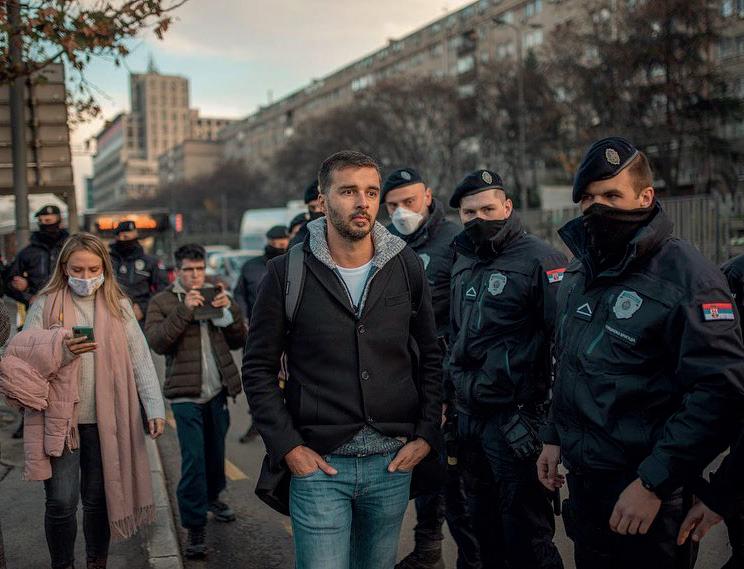
What happened was not only the tragic end of a life, but a brutal confirmation of how deeply American society is trapped in its own divisions and cultures of hatred
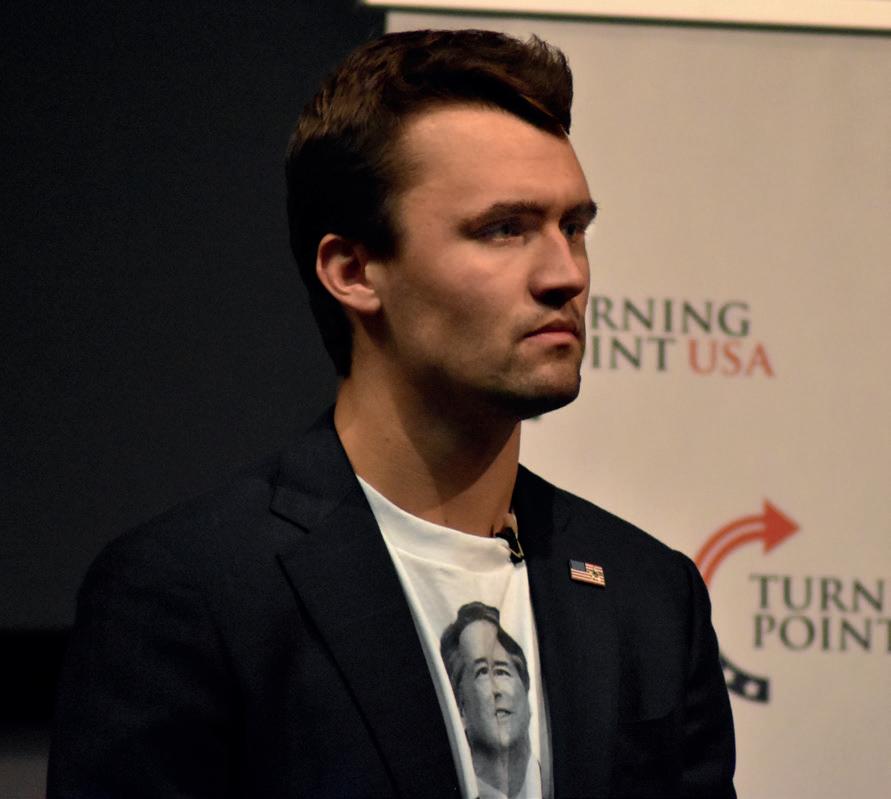
The murder of Charlie Kirk at the University of Utah feels like a scene from an American film – until one realises it is not fiction. What happened was not only the tragic end of a life, but a brutal confirmation of how deeply American society is trapped in its own divisions and cultures of hatred. Whoever Kirk was, and whatever “fires he lit”, his killer “extinguished them with petrol”.
Charlie Kirk was anything but a neutral figure. As the founder and face of Turning Point USA, he built his career on a culture of confrontation. His speeches on university campuses had the air of rallies, with a clear divide between “us” and “them.” He was a hero of conservative youth, a preacher of the “return to Christian and family values,” but also a target of ridicule – and even hatred – in liberal circles. His rhetoric inspired some, provoked others, and rarely left anyone indifferent. He was someone labelled a “Christian fascist,” and his positions were often extreme and offensive to many
SILENCING AN IDEA WITH A BULLET ONLY MAKES IT LOUDER
communities (LGBTQ+, African Americans, those known in America as “liberals”), irritating and angering people. Enough (and reason enough) to silence him with a bullet? Absolutely not. It was a “disservice” to liberal America.
This is precisely why his death carries a double meaning. On the one hand, Kirk becomes a symbol – almost a martyr of conservative America, proof that today’s political battles can be paid for with one’s life. His followers will see the murder not as an attack on a man, but on the very idea of the America they envision. “Stopped on the path of Good by the forces of Evil,” his admirers who favour simple narratives will say. Is it realistic to think that such people exist? Oh yes – many! All the more so given that, alongside J.D.
Vance, he was seen as one of the “future presidential hopefuls of America.”
On the other hand, some will argue that Kirk himself contributed to the climate in which violence is no longer unthinkable, through his speeches. Were his words fuel for further conflicts? Did he “dance” too close to the fire and eventually get burned? Perhaps he lit fires he should not have lit, but whoever tried to extinguish them with a single shot ended up pouring petrol on them – and has now opened Pandora’s box.
Answers to the questions about the righteousness of Kirk’s words and positions will not be easy to find, but society will inevitably continue to ask them. Kirk maintained that the right to bear arms was an absolute American right and that the victims of mass shootings were a necessary sacrifice to protect freedom. Is this irony of fate, or “karma” as the left says – that “he who lived by the sword died by the sword”? Others claim he was a “champion of free speech” and should be nominated for the Sakharov Prize.
To quote Sarajevo-based analyst Vuk Bačanović in his critique of Kirk’s positions: “If the Lord Christ had wished His community (the Church) to exist in any kind of ‘symphony’ with earthly empires – which are themselves nothing more than manifestations of fallen humanity – He would have, with the movement of a finger, killed the Pharisees, Pontius Pilate, and Emperor Tiberius, and Himself become an earthly ruler to whom everyone would bow unquestioningly. But the matter was the very opposite: God turned everything upside down and, in the form of the last ‘wretch,’ defeated the earthly empires and their fundamental philosophy – the monetisation of death, that is, the fear of death. In this sense, any Christianity that is not a vanguard against this Babylonian philosophy, which today is also called ‘Christian nationalism,’ is not authentic.” In other words, the creation of a “virtuous state” does not go hand in hand with the rhetoric of violence, with statements such as “empathy does harm” and the like.
The bigger picture, however, goes beyond a single man. America has long been in a state of permanent culture war, where a political opponent is no longer simply someone with a different opinion but an enemy. For years, the rhetoric has oscillated between insult and demonisation, with social media amplifying the echo chambers. In such an atmosphere, moving from words to weapons no longer seems like a “quantum leap,” but rather a continuation of the logic of conflict – politics pursued by other means.
Liberal campuses, already under pressure, will become even more cautious, perhaps even more closed off, fearing new accusations and attacks. Public debates in America will become increasingly costly – not only in terms of money and security, but also in terms of risk. Freedom of speech will formally remain, but in practice it will be constrained by fear of what is spoken aloud.
It all recalls last year’s film Civil War, in which we see a deeply divided America, prone to violence reminiscent of the Yugoslav wars of 1991–2001. All of this has deep roots in an already polarised American society, where there are very few “in the middle,” very little reason, and little of the Middle Way preached by the Buddha – and ever-widening chasms between those on the left and those on the right. How has America reached the point where we are once again in the 1960s, with assassinations of public figures?

The timing could not have been worse: instead of a moment of silence, Congress erupted into a loud debate over everything –whether his death should be commemorated at all, whether now is the time for stricter gun laws – with open displays of disrespect for his passing. On social media, many are celebrating and mocking, while others threaten them that their laughter will be short-lived. Murals are being painted across the US of Iryna Zarutska, the “beautiful white blonde” Ukrainian refugee, senselessly massacred by an African American psychopath. This goes beyond mere crime or mental illness – many have seized the opportunity to stigmatise all African Americans and sanctify whites quietly. Movements like BLM and those advocating for trans rights are likely to suffer a setback.
Posts online highlight the contrast between Kirk’s killing – marked by quiet flower tributes reminiscent of Princess Diana’s death – and George Floyd’s murder, which sparked mass riots and looting, accompanied by captions like “We are not all the same!” It has been mentioned that the killer had a trans partner before the murder, and hatred has now spilt over onto that community as well. Everything is simmering. Sixty years later, right-wing America has its own JFK, its own Robert Kennedy, its own Martin Luther King – an idol who died at
PERHAPS KIRK LIT FIRES HE SHOULD NEVER HAVE LIT, BUT THE ONE WHO TRIED TO PUT THEM OUT WITH A SINGLE SHOT ENDED UP DOUSING THEM IN PETROL – AND HAS NOW OPENED PANDORA’S BOX
31. Someone thought that silencing a “figure of hate” would silence the idea itself, but instead, we may see many of his “ideological heirs,” and I fear even more extreme ones. For them, his murder “proved he was right.” An explosive mix is brewing. It is not too late to stop America from turning into a runaway train, but it will require skill and restraint on both sides – something we are not currently seeing.
From Serbia’s perspective, all of this seems like a continuation of the familiar American paradox: a country that sees itself as a bastion of democracy and freedom, yet increasingly resolves its internal disputes through violence. From the outside, it appears that America has grown tired of words and increasingly chooses the bullet and not over “greater issues” such as war and peace, but over questions of identity, gender politics, religion, and culture. Charlie Kirk was both a participant and a victim of this, caught in a
highly complex mechanism of polarisation on the political and social scene – a mechanism that goes far beyond America itself.
The widening of divides and the disappearance of the “Middle Way” are characteristic of many countries that have allowed democratic aberrations and abandoned the Social Contract, as Rousseau called it – or, in other words, the social consensus: we all coexist and respect one another, more or less; no one overreaches too far, no one takes too much. Around the world, it feels as though everyone has suddenly started taking too much to finally realise their own visions of society as they imagined them. As Darko Rundek said: “Within us, time is changing, and everyone is once again ready to fight for the dream.” In his song “TheWatchmenAreComing,” Rundek foresaw the arrival of the 1990s and the many wars – from Tajikistan and Yemen to Somalia and Yugoslavia, as well as conflicts in Georgia, Moldova, Armenia, and Azerbaijan. And it feels as if such a new era is coming again. “Either my dream will become reality – or there will be nothing left of the world!” Too many people seem to have this sentence on their lips.
Outside of America, the question remains: how deeply will the world – dependent as it is on America’s cultural and political exports – feel the reverberations of this tragedy? And within America’s divided society, new icons are being created. In a twist of irony, the American right has been given its own Đinđić – “the young leader tragically cut down on his path to set the country right.” Instead of uniting, as it so desperately needs to, America has been left even more divided by this killing.
DEJAN BURSAĆ Political Scientist, Senior Research Fellow at the Institute for Philosophy and Social Theory
Political scientist Dejan Bursać, Senior Research Fellow at the Institute for Philosophy and Social Theory (IFDT), doesn’t mince words: Serbia’s political arena is broken, its institutions hollowed out, and its ruling party terrified of the ballot box. In this interview, he dissects the crisis, explains why the streets have become the last arena for politics, and warns about what might come next.
How can society fight for the democratisation of political processes when institutions have collapsed and power is highly centralised?
In the only way it is fighting now – on the streets. And for such a state of affairs in our society, SNS is absolutely to blame. When you dismantle every social institution: from parliament; through elections at practically every level – from national to local and even the most seemingly insignificant ones, for local communities; through the judiciary; to the media and even civil society organisations – when you shut down or strip of meaning every channel where politics is supposed to be conducted and where opposition or at least alternative voices should be heard, politics inevitably spills over to where it still can –onto the streets. This is particularly the case in moments of crisis, when those collapsed institutions fail, and society demands a response or reaction from them.
What are the potential turning points in the coming period?
How do you forecast the further course of events, first and foremost, the actions of students and citizens, and then the response of the authorities? The biggest and only remaining turning point is snap elections. That is why the authorities are avoiding them, on very weak pretexts. Bear in mind, we are talking about a ruling party that

WHEN YOU SHUT DOWN EVERY INSTITUTIONAL CHANNEL FOR POLITICS, IT SPILLS ONTO THE STREETS
has gone to snap parliamentary elections four times in the past 13 years (2014, 2016, 2022, and 2023), and not once did they have a valid reason: their majority was never threatened, nor was there an imminent social crisis that could have endangered their hold on power. All four times were so-called opportunistic elections, when the ruling party judged that the opposition was in disarray and that it was the right moment to capitalise on its popularity and extend its rule for another four years.
Now, however, elections are being avoided despite all the advantages the ruling party enjoys in the electoral arena: from almost total media dominance, through unlimited financial resources, to the misuse of virtually all state institutions, which, in principle, should act as neutral arbiters in political competition, but in our
case openly work for a single party. Even in such circumstances, SNS is still avoiding elections – because they are well aware that they may be the very point of complete reversal. The only question is how long they will be able to avoid them, as pressure mounts – from the protest movement, from SNS voters who cannot understand why the party is not going to the polls, and gradually from the international actors who want this situation to be resolved institutionally.
Recent personnel changes in certain police units appear to be an attempt to consolidate control over the police. How do you see the police’s attitude towards the protests, and how autonomous is it in such situations? It is absolutely not autonomous –it has been placed in the service of the ruling party. And it has
badly discredited itself throughout this entire period. Restoring public trust in the police will be a painstaking and lengthy process once this is over. It will undoubtedly require cuts and reforms that this society unfortunately failed to make back in 2000. This time it must not fail.
Is the introduction of a state of emergency a realistic option, and can the current situation already be described as a kind of “informal” state of emergency?
You are right – we are indeed in a kind of informal state of emergency, at least in the sense that the legally guaranteed human rights of certain parts of the population (opponents of the regime) have been suspended. On the other hand, the primary purpose of introducing a state of emergency in our constitutional framework is to temporarily transfer decisionmaking power to the executive, allowing for more efficient decisionmaking during times of crisis. In our political practice, where power is informally (and unconstitutionally) almost entirely concentrated in the hands of the President of the Republic, formally declaring a state of emergency would be a redundant move.
How much influence does the international community have on the government’s decision not to introduce a state of emergency, and how do you assess the position of foreign actors towards the protests and the regime’s response?
Over the years, Aleksandar Vučić’s regime has developed a transactional relationship with key external actors, delivering to each of them what they want to receive. It tells them what they want to hear, mostly concerning the geopolitical or economic interests of those powers in our region. In return, the regime received blank cheque support. However, in that tacit agreement – at least as far as Western countries are concerned – there is a clause: the regime must at least act in principle as a democracy. That means holding regular elections, which may not
be fair but are at least free, and maintaining some form of rule of law, which includes respect for human rights. Deviations from these principles – such as problems in the electoral process, restrictions on media freedom, or widespread corruption – were largely ignored and treated as isolated incidents (even though it was clear they were part of the SNS’s style of governance), as long as the country was governed in a way that appeared, at least formally, democratic and lawful.
It is now obvious that we no longer have that. The recent debate in the European Parliament clearly shows that even the SNS’s allies, such as the European People’s Party group, can no longer remain silent in the face of the violence carried out by Vučić’s regime. Since I am sceptical about the regime’s willingness to de-escalate the situation, I believe that external pressure will only increase. It may not yet imply a complete shift in Western policy, but it is definitely a sign of a changing attitude towards Vučić – and that, at least, is a beginning.
What are the key challenges for opposition politics at a time when the protests are entirely civic and student-led, without formal leadership? Can the opposition even capitalise on this wave of dissent?
The opposition parties are in a truly unenviable position. In situations of high polarisation, such as ours, a third actor trying to find its place between two clashing and clearly defined sides usually fares poorly. We ourselves witnessed this in 2000, when third-party candidates performed poorly in the tense contest between Koštunica and Milošević. On the other hand, I believe it is entirely legitimate for the opposition to seek its place in this new context and to announce its participation in the elections.
However, we must be aware that when we refer to “the opposition,” we are not talking about a single, homogeneous entity, but rather potentially four, five, or six different actors. Such a fragmented electoral run would, in fact, leave some of those lists (and votes) below the threshold. The question is therefore whether the opposition can go into elections in a way and in formations that meaningfully contribute to maximising the votes of the regime’s opponents, bringing about a change of power and,
consequently, the democratisation of the country. If it cannot, the harm outweighs the benefit. I think it would then be wiser to do what several opposition actors have already announced – to sit out the upcoming elections, support the student list, and reposition themselves in a new democratic situation after the fall of the regime, when political action will be much easier for them than it is now in the closed and repressive system we currently have.
What are the biggest challenges for SNS and SPS at this moment, especially in light of reports of falling popularity? Can we trust the polls promoted by the government, or is the decline in popularity genuinely evident? It seems to me that the polls disseminated by the government through friendly media contain the usual methodological traps designed to make the ruling parties’ results look better than they actually are. The biggest deception is definitely the fact that,
under some strange pretexts, they do not measure the rating of the student list, even though it is clear that this actor has been setting the tone of social dynamics for the past ten months and has announced its participation in the elections. Taking that approach into account, and bearing in mind that the publication of such polls obviously serves a political purpose – to reassure their own voters and confuse opposition voters – I still tend to trust some independent pollsters, who give the student list an edge over the united ruling parties. After all, I would stress once again that if the polls were really favourable for SNS, they would have called snap elections a long time ago.
Incidentally, SPS is one of the bigger casualties of these processes – albeit entirely through its own fault. When you become merely an appendage of the ruling party, with no identity or independent policy of your own, and that ruling party polarises the political scene to the maximum,
IF THE POLLS WERE TRULY IN THEIR FAVOUR, THEY WOULD HAVE CALLED ELECTIONS LONG AGO
your voters no longer see a reason to support you. I would say that unless the Socialists change course soon – both in terms of personnel and their relationship with SNS – they are sliding towards complete political irrelevance.
Overall, the decline in popularity of the ruling coalition in Serbia is indeed evident. There has been a partial outflow of voters, as well as fear and confusion among a much larger segment of regime voters. SNS is now trying to stop this through so-called economic measures and by organising its own rallies across towns and cities in Serbia. On the other hand, there has been absolute mobilisation of regime opponents – in this case, the student movement and its potential electoral list – supported by right-leaning voters, liberal and pro-European voters, a small percentage of former regime supporters, and most importantly, a significant number of abstainers. These include both young people who were previously uninterested in politics and former voters of democratic parties who are disillusioned with the political process. The student movement has now awakened a new sense of hope in all of them – and SNS does not know how to counter that.
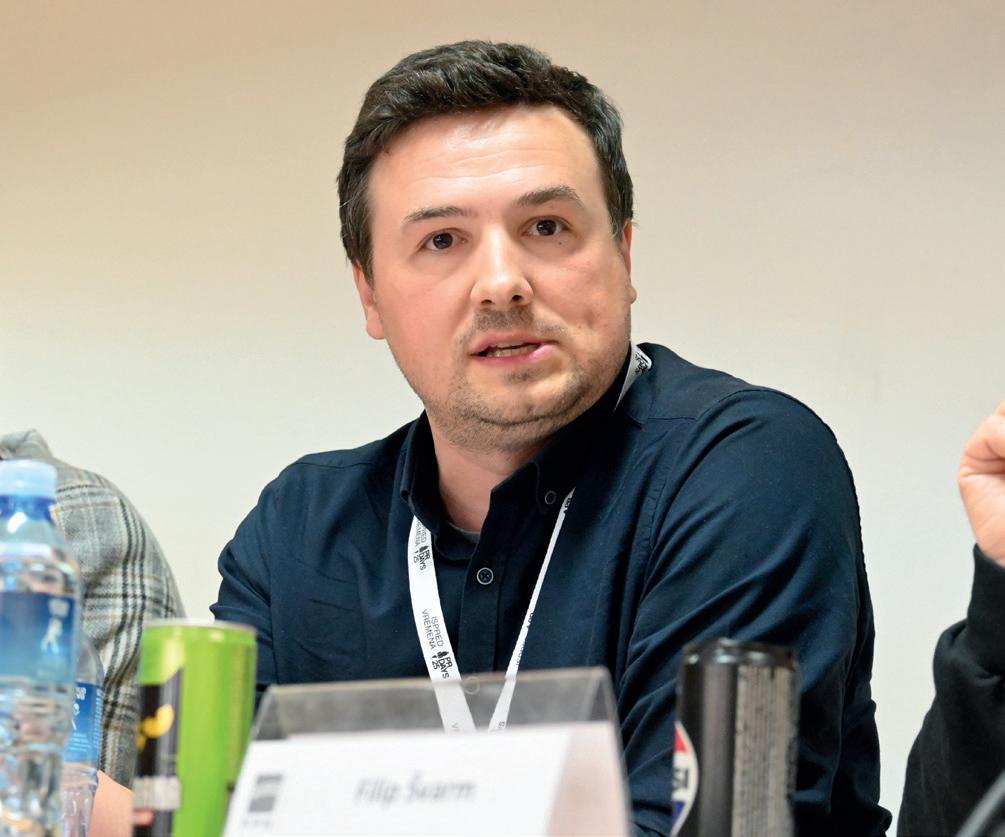
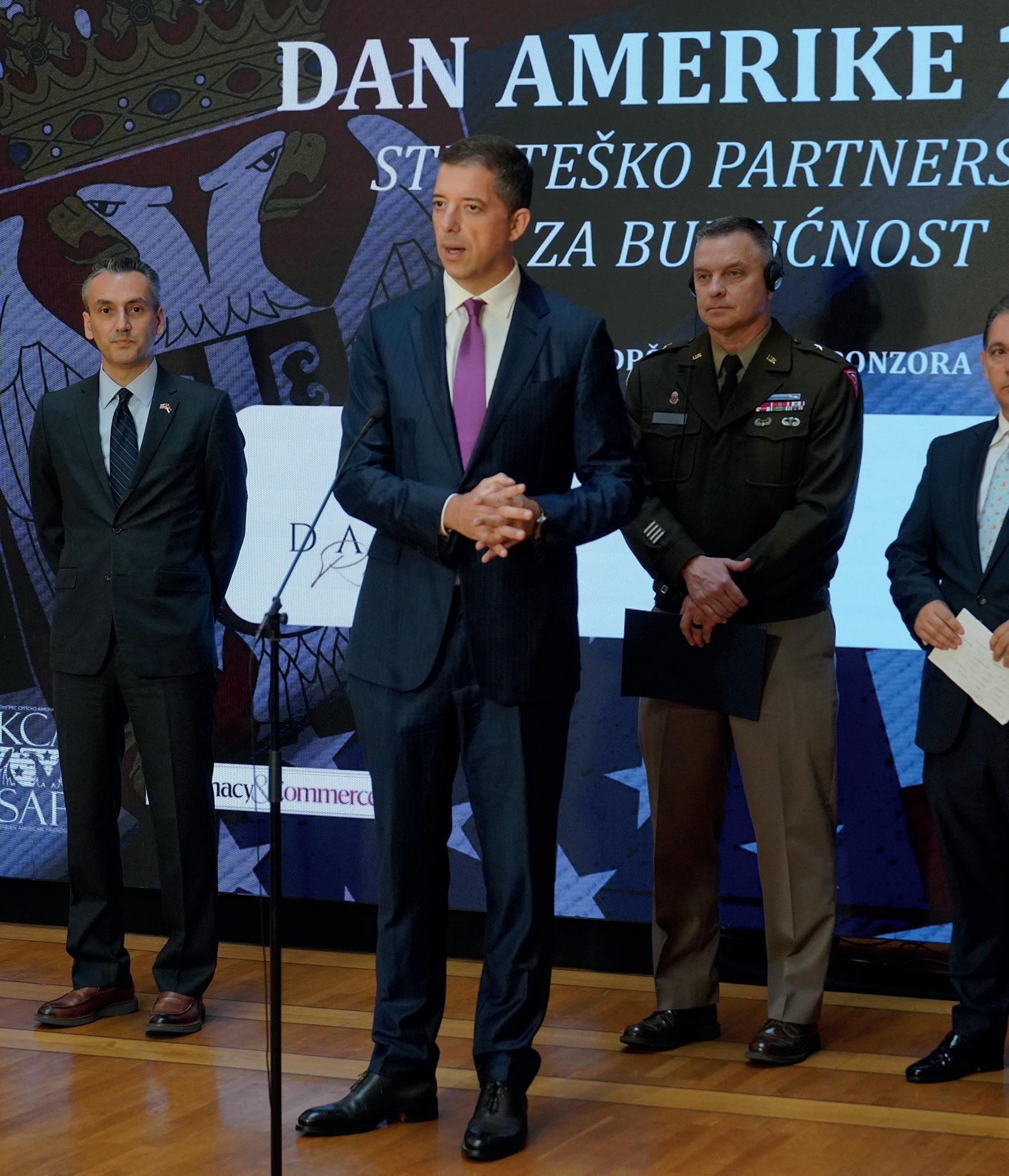

On September 18th, the Serbian-American Friendship Congress, in cooperation with Diplomacy & Commerce magazine and under the patronage of the U.S. Embassy in Belgrade, organised the fourth annual America Day at the National Assembly of the Republic of Serbia. The event brought together diplomats, government officials, business leaders, and representatives from civil society to reaffirm and deepen the strategic partnership between Serbia and the United States.
Dr Vladimir Marinković, President of the SerbianAmerican Friendship Congress, delivered opening remarks and moderated several panels throughout the day. He was joined by Milovan Drecun, President of the Parliamentary Friendship Group with the U.S. in the National Assembly, who emphasised the role of parliamentary diplomacy in strengthening bilateral ties.
Congressman Robert Aderholt and Congresswoman Claudia Tenney addressed attendees via video message, underscoring the importance of congressional support for U.S.-Serbia relations.
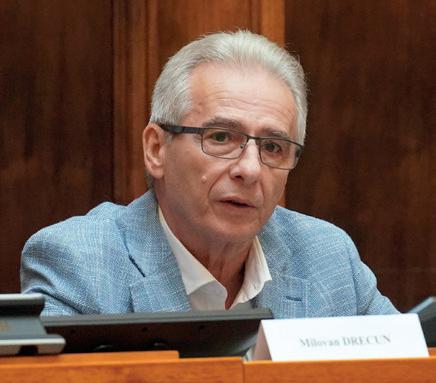
Minister of Foreign Affairs
Marko Đurić opened the “Political StrategicDialogue–Partnership for the Future” panel by announcing that preparations for a strategic dialogue between Serbia and the United States would be intensified to elevate bilateral relations to a new level. He expressed hope that Serbia might have the opportunity to host U.S. President Donald Trump in Belgrade, stating: “It’s no secretthatPresidentTrump,even beforehispresidency,enjoyedthe sympathiesoftheSerbianpeople.”
Alexander Titolo, Chargé d’Affaires of the U.S. Embassy in Belgrade, participated in the same
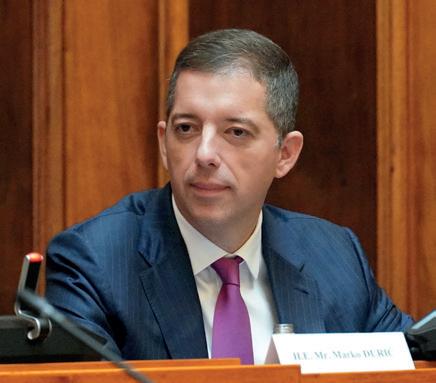
panel discussion, emphasising the Embassy’s continued support for initiatives that foster bilateral engagement.
Immediately following the panel, the Annual Awards Ceremony of the Serbian-American Friendship Congress took place, honouring individuals who have made outstanding contributions to deepening bilateral cooperation between Serbia and the United States. The awards were presented by Slobodan Cvetković, with the ceremony organised by the Serbian-American Friendship Congress and Diplomacy & Commerce magazine.
Award Recipients:
• Ivan Bošnjak and Stojan Vujko – for advancing economic relations between Serbia and the United States
• Saša Marković – for improving the business environment and promoting socially responsible entrepreneurship (awardreceivedonhisbehalfbyMsTisa Čaušević)
• Dr Meho Mahmutović – for strengthening cooperation in the field of healthcare
• John Capello – for enhancing collaboration in public diplomacy
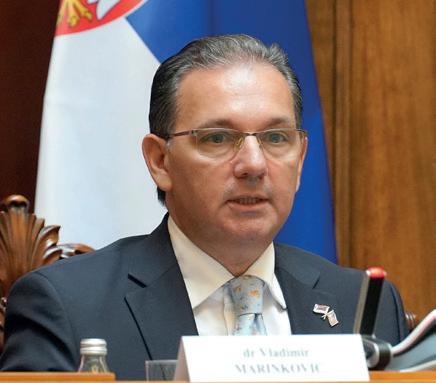

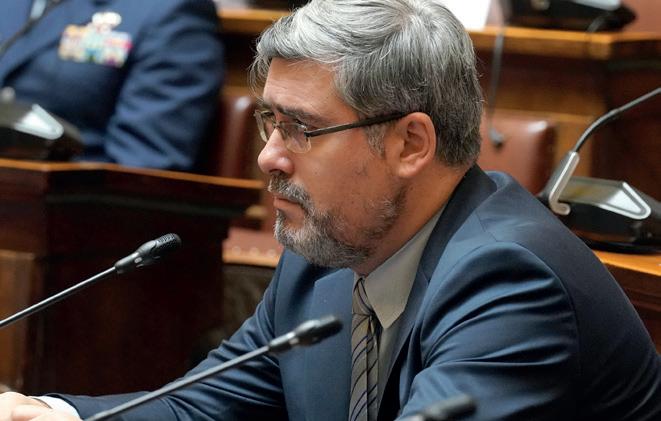
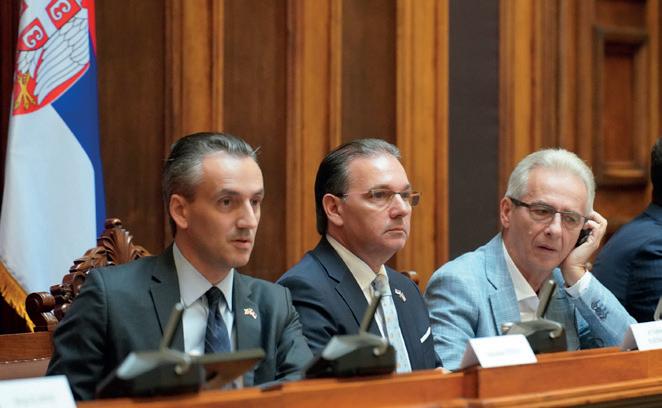
• Dr Zoran Jolevski – for fostering regional cooperation with the United States
• Stefan Drašković – for promoting cooperation in sports and youth engagement
The event reaffirmed its role in strengthening ties between Serbia and the United States across various fields, including economy, education, business, and politics. It also highlighted the importance of sustained dialogue and mutual understanding in shaping future cooperation.
Nemanja Starović, Minister for European Integration, spoke on the panel “StrategicRelationsbetween Serbia and the State of Ohio – Paths TowardDeeperCooperation,” alongside Brigadier General Matthew S. Woodruff, Commander of the Ohio National Guard. The discussion focused on defence cooperation, regional partnerships, and the potential for joint initiatives in education and innovation.
Additionally, as part of the Business Forum, the Expo 2027 project was presented as a key pillar of Serbia’s international outreach. Dušan Borovčanin, Advisor to the Director of Expo 2027, announced that 120 countries had confirmed their participation in the specialised international exhibition hosted by Belgrade. He noted that the project was progressing well, adding: “All that remains is to complete construction and wait for the year 2027.”
Further contributions to the business forum included Tipten Troidi, Commercial Attaché of the U.S. Embassy in Belgrade, who spoke about commercial diplomacy and the role of U.S. businesses in Serbia’s economic development. A representative of Danube Riverside also participated, highlighting regional investment opportunities and cross-border collaboration.
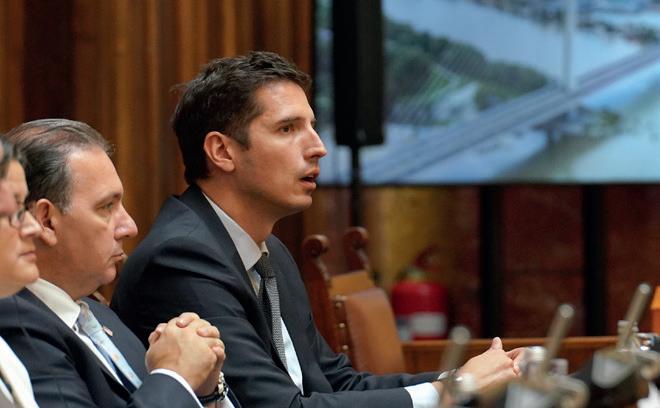
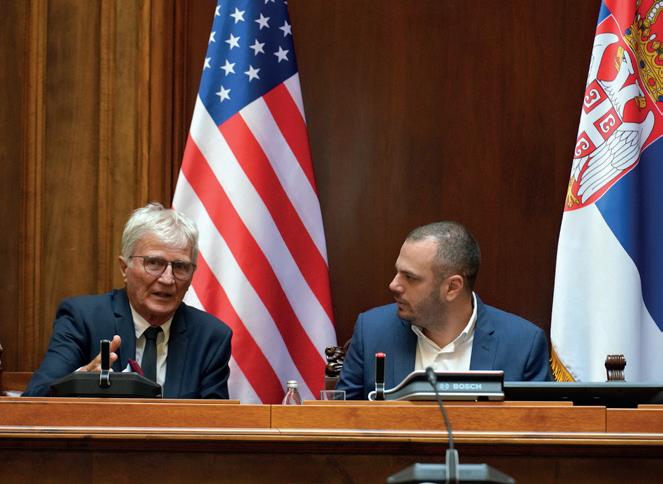
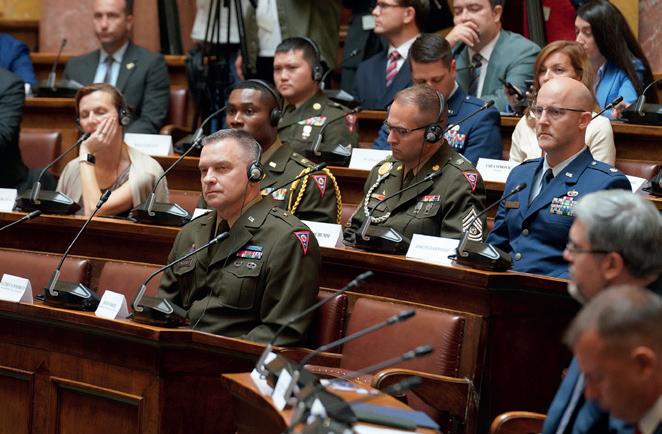
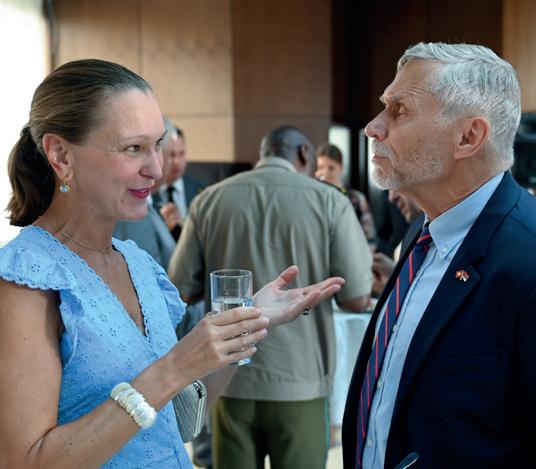
The wife of the British Ambassador and the husband of the Swiss Ambassador, Slovak National Day, September 4
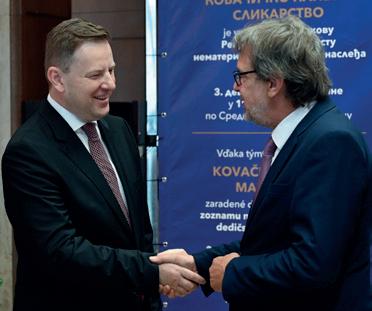
Head of Mission at the U.S. Embassy in Belgrade, Alexander Titolo, and British Ambassador Edward Ferguson, Mexico National Day Reception, September 15
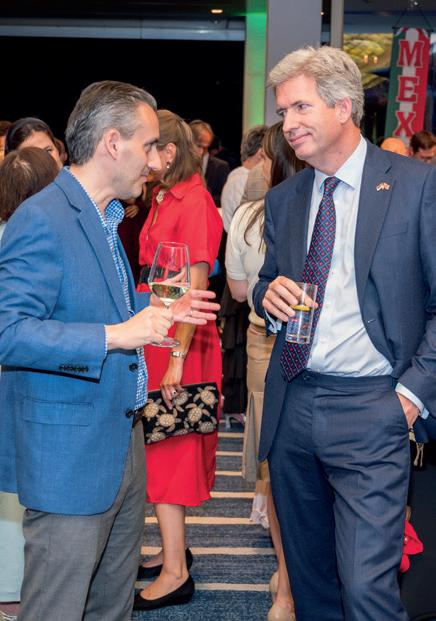
Slovak Ambassador Michal Pavuk and Deputy Prime Minister of Vojvodina Tomislav Žigmanov, Slovak National Day, September 4
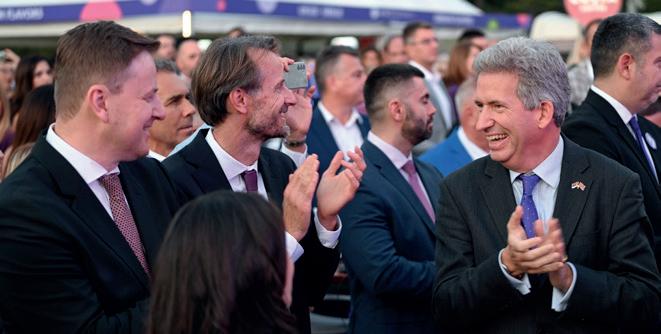
Slovak Ambassador Michal Pavuk, Head of the EU Delegation to Serbia Andreas von Beckerath, and British Ambassador Edward Ferguson, NALED September Gathering, September 4
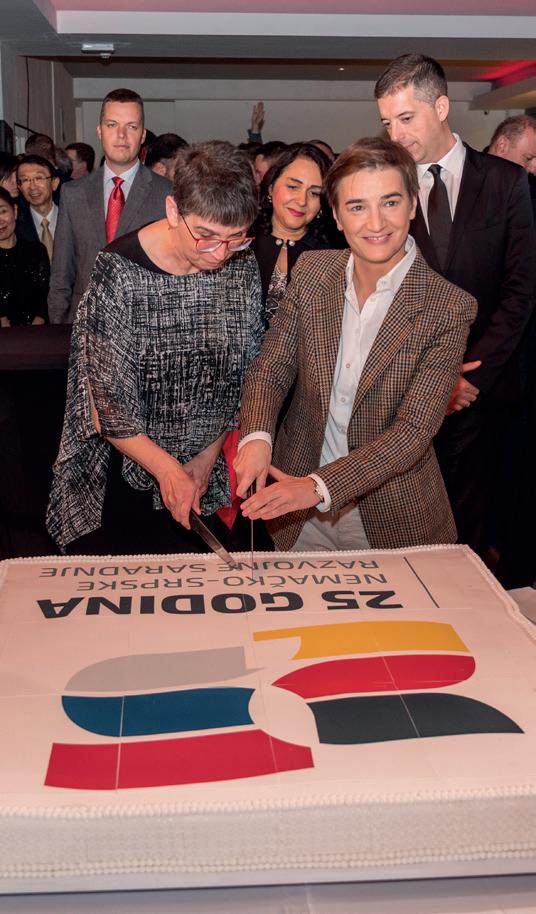
German Ambassador Anke Konrad and President of the National Assembly of the Republic of Serbia Ana Brnabić, German Unity Day Reception, October 1st
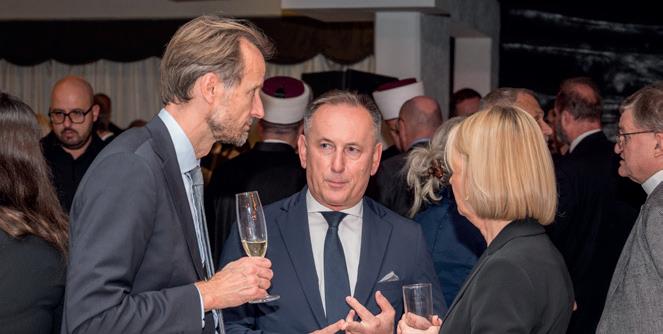
“FIRST ORBÁN, THEN FICO, AND NOW BABIŠ…”
Hungarian Ambassador Jozsef Magyar and Head of the EU Delegation to Serbia Andreas von Beckerath, German Unity Day Reception, October 1
Usame Zukorlić, a young Bosniak leader from Sandžak, has achieved an extraordinary diplomatic and political breakthrough on the international stage in just a few years.
Although he comes from a small region that has been economically and politically marginalised for decades, Zukorlić managed to swiftly build a network of ties with key actors in the Islamic world through his personal engagement and predispositions.
As the son of the prominent mufti and politician Muamer Zukorlić, Usame took over the leadership of the Justice and Reconciliation Party (SPP) at the end of 2021 and soon established himself as the leading political figure among Sandžak Bosniaks. His ability to use personal connections, knowledge of languages (he speaks Arabic and English), and strategic partnership with Serbia’s state leadership enabled him to build strong international contacts “out of nothing.”
RELATIONS WITH TURKEY AND PRESIDENT ERDOĞAN Zukorlić’s relationship with Turkey, especially with President Recep Tayyip Erdoğan and the ruling AK Party, represents the backbone of his international breakthrough. This relationship is characterised by intensive institutional cooperation and personal respect.
The culmination came in September 2025, when an SPP delegation led by Usame Zukorlić visited Ankara and signed a historic Memorandum of Cooperation with Erdoğan’s Justice and Development Party (AK Party). Signed under Erdoğan’s direct authorisation with AK Party vice president Zafer Sırakaya, the agreement made SPP the first Bosniak party with this level of cooperation with the AK Party, and only the eighteenth party in the world to establish a formal alliance with Turkey’s ruling party.
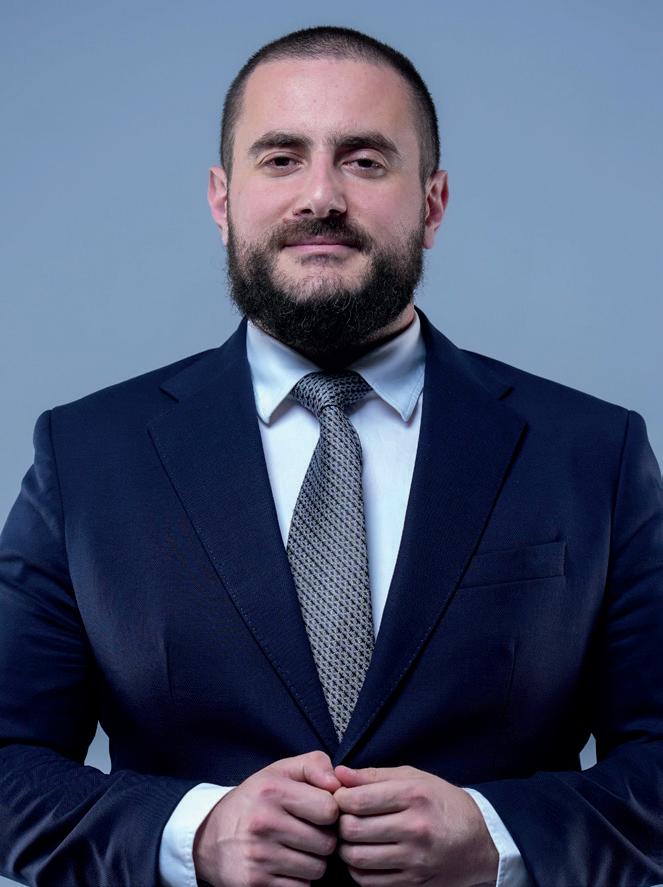
On that occasion, Zukorlić stressed that Bosniaks and Turks have been “brotherly peoples for a long historical period,” and that this partnership marks a turning point, leaving behind a turbulent past and opening a new chapter of development, peace, and cooperation.
This institutional support from Ankara followed Zukorlić’s gradual building of trust with Turkey’s state leadership after a long period of cold and turbulent relations. Since May 2024, as Minister in the Serbian Government responsible
for reconciliation and regional cooperation, he has participated in several high-level meetings.
In October 2024, he attended for the first time a joint meeting of President Erdoğan with Sandžak Bosniak leaders, sitting at the same table alongside longtime rivals Sulejman Ugljanin and Rasim Ljajić. That meeting marked the end of SPP’s isolation from Turkish official circles.
However, his entry into the Serbian Government changed the situation: in front of his Sandžak colleagues, Erdoğan congratulated
him on his ministerial appointment, stating, “See that Usame has become a minister,” and instructed Ugljanin and Ljajić to “cooperate” with Zukorlić on local issues. This public gesture by the Turkish president effectively legitimised Zukorlić as the main interlocutor for Sandžak, giving him both honour and obligation to justify the trust shown.
Zukorlić’s personal respect for Erdoğan and Turkey has been clearly expressed in his public appearances. He has repeatedly praised Erdoğan’s leadership on the global stage, highlighting Turkey’s role as a protector of the oppressed.
Throughout 2025, Zukorlić intensified institutional contacts with the Turkish state. In March 2025, he spoke in Edirne at a meeting hosted by Turkish Vice President Cevdet Yılmaz for religious and political leaders of the Balkans.
The meeting unfolded in the spirit of dialogue and mutual support, with special emphasis on the role of religious leaders in promoting peace and stability in the region. Furthermore, during his September 2025 visit to Ankara, Zukorlić met with Turkish Foreign Minister Hakan Fidan, further strengthening ties with the top of Turkey’s diplomacy. All this testifies that Zukorlić has built a close relationship with Turkey based on ideological affinity, personal contacts, and formal agreements—an unprecedented achievement for a politician from Sandžak in recent history.
In parallel with deepening Turkish ties, Usame Zukorlić launched diplomatic initiatives across the Islamic world, focusing on the Middle East. His strategy included strengthening relations with influential Arab states such as Qatar, re-establishing communication with war-torn Syria, and actively advocating for the Palestinian cause on the international stage.
As a young leader from the Muslim community, Zukorlić recognised the significance of Qatar, a country that has established itself as a global investor and mediator in conflicts. In May 2025, he attended the 5th Qatar Economic Forum in Doha, a prestigious gathering of world leaders, investors, and experts. On that occasion, he met Qatar’s Emir Sheikh Tamim bin Hamad Al-Thani during a formal gala dinner. In an official statement, he expressed admiration for the Qatari leadership’s vision, saying: “When a geographically small country has a wise leader, it can become a beacon of justice.”
He praised Qatar for achieving this “through courageous diplomacy and major investments, especially in knowledge,” adding that he was proud to have had the honour of meeting the Emir, whom he described as “a great statesman.” These compliments indicated a conscious effort to build close ties, as Zukorlić sought to win Qatar’s favour by highlighting shared values and visions of development. His presence in Doha also enabled him to network with other senior officials from various states on the sidelines of the forum, thereby expanding his diplomatic reach.
One of Zukorlić’s most significant undertakings in the Middle East was leading a Serbian delegation to Damascus in June 2025, in an effort to restore ties with Syria after years of civil war. As Minister responsible for reconciliation and regional cooperation, he initiated this move in coordination with Serbia’s leadership. In Damascus, he held talks with Syria’s highest officials, meeting President Ahmed al-Sharaa and Foreign Minister Asaad Al-Shaibani.
Both sides expressed readiness to renew and strengthen bilateral cooperation between Serbia and Syria. Zukorlić emphasised the importance of continuous political dialogue and presented concrete models for how Serbia could contribute to Syria’s reconstruction—especially in infrastructure, education, healthcare, and the economy.
From Damascus, Zukorlić sent strong symbolic messages. In a social media post picked up by the press, he praised the resilience of the Syrian people, declaring: “Syria today gives hope to the entire ummah and the free world precisely because, despite all trials, it has neither collapsed nor fallen into fratricidal war after the overthrow of dictatorship.”
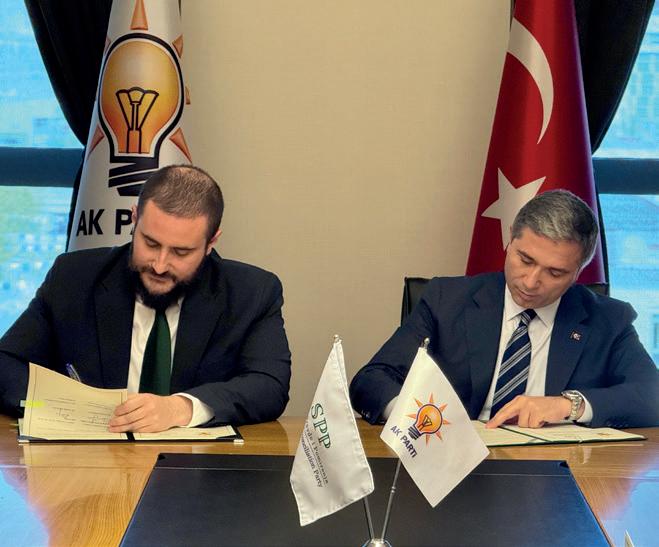
FROM ONE OF SERBIA’S POOREST REGIONS, ZUKORLIĆ BUILT A PATH TO GLOBAL PARTNERS.
He expressed satisfaction with his talks with the Syrian leader, stressing that new diplomatic relations had been established between the two countries to the benefit of both peoples. On behalf of Serbia, he offered support for Syria’s reconstruction and stabilisation through institutional cooperation and concrete projects, emphasising the importance of dialogue, solidarity, and mutual respect in times of global challenges.
Damascus warmly welcomed him, with Syrian officials underscoring their openness to partnership with Serbia based on mutual respect, exchange of experience, and joint development. Thus, a politician from small Sandžak played an unexpected role in renewing Serbian-Syrian relations,
demonstrating the breadth of his diplomatic potential.
The Palestinian question holds a central place in Zukorlić’s international discourse, which is unsurprising given his family background—his mother is Palestinian. In 2023 and 2024, he established personal contacts with Palestine and publicly voiced support for the Palestinian people. As he revealed, at the beginning of 2025, he visited Jerusalem, Bethlehem, Hebron, and even areas near the Gaza border. This tour of holy sites and conversations with locals left a deep impression on him. Describing what he saw, he said the scale of horror in Gaza is almost beyond comprehension: “What I witnessed was already a reflection of genocide.” These testimonies
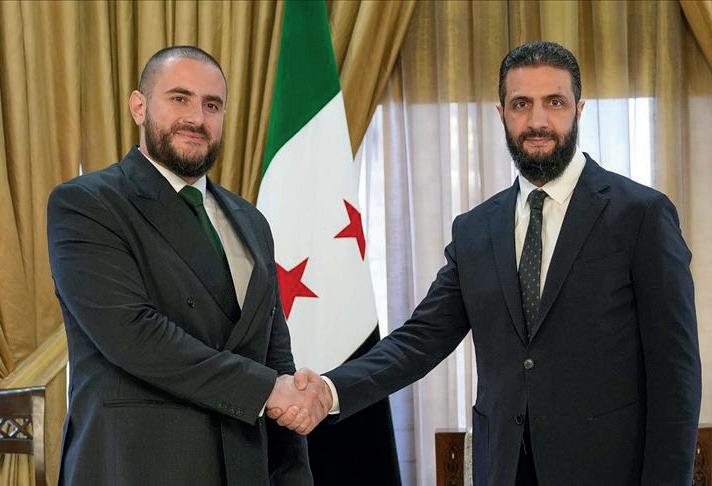
gave him moral legitimacy to later speak as a voice of solidarity with Palestinians.
During his stay in Ankara in September 2025, Zukorlić made his strongest statements condemning Israeli actions in Gaza. He urged global actors to “do everything in their power” to stop the horror, warning that if nothing is done, “we will all bear the consequences.” Zukorlić welcomed Serbia’s earlier recognition of the State of Palestine and stressed that Palestinians, like all nations, have the right to life and dignity.
More broadly, Zukorlić has also established communication with other parts of the Islamic world. He actively maintained contacts with the Bosniak diaspora and regional religious leaders, built ties with international Islamic organisations, and participated in gatherings where he represented the voice of Muslims from Serbia. Naturally, this approach carries risks: balancing the politics of Serbia as a secular state with its Islamic allies requires diplomatic skill and caution to avoid undermining trust on either side.
Zukorlić’s rise from a local Sandžak politician to an actor on the international stage is the result of a carefully thought-out approach and an unconventional blending of identities. Starting from Sandžak, a peripheral region with a Bosniak majority long on the margins of state politics, Zukorlić managed to exploit a set of comparative advantages that few before him recognised or used.
First and foremost, there is his specific identity and background: raised within Sandžak’s Islamic community, with a father, Mufti Muamer, who had contacts in the Islamic world, and a Palestinian mother who instilled in him an emotional connection to the Middle East. This multinational pedigree enabled him to feel at home in Belgrade, Ankara, and Arab capitals alike—a skill few previous Sandžak leaders could boast.
Second, Zukorlić strategically used his position in Serbia to gain international credibility. SPP’s entry into coalition with the ruling Serbian Progressive Party and his appointment as minister gave him access to state resources: travelling under the national flag, mandates to represent Serbia on specific missions, and visibility in diplomatic circles.
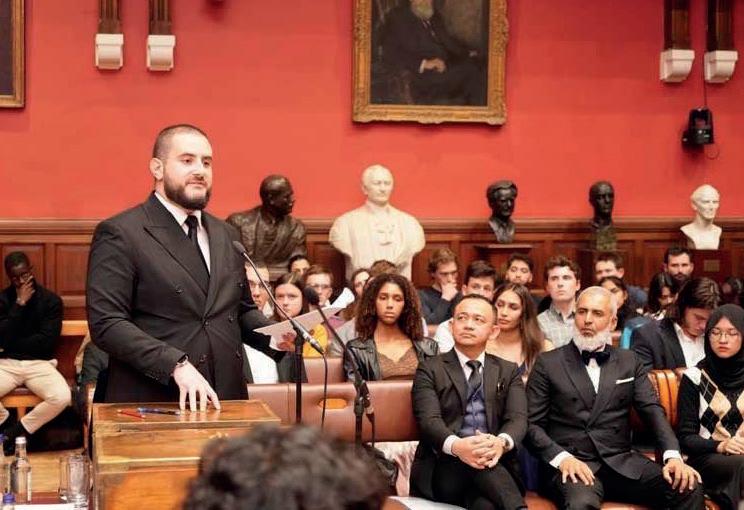
While similar officials are often limited to domestic issues, Zukorlić projected his “reconciliation and regional cooperation” portfolio globally, establishing himself as Serbia’s informal ambassador to the Islamic world. In doing so, he strengthened his own profile while also benefiting the government in Belgrade, which, through him, built bridges to Ankara, Doha, and Damascus.
The third key element is ideological and value-based positioning. Zukorlić deliberately branded himself as an advocate of justice, dialogue, and multiculturalism, reflected in both his party’s name (Justice and Reconciliation) and in his public messages. On the international stage, he presents himself as the voice of moderate European Muslims, willing to cooperate but also determined to defend the oppressed (Palestinians, Syrians, Muslim minorities). This positioning made him a desirable interlocutor for countries like Turkey and Qatar, which seek to act as patrons of Muslims worldwide.
Finally, Zukorlić has demonstrated personal diplomatic initiative and skill. His performance on the international stage combines
ZUKORLIĆ’S STORY PROVES THAT EVEN FROM THE PERIPHERY, INFLUENCE CAN REACH THE WORLD STAGE.
both formal and informal approaches: on the one hand, forging formal alliances (such as the memorandum with the AK Party—a unique move among Balkan politicians), and on the other, building personal relationships, from cordial meetings with leaders to maintaining contact through social media, where he regularly posts photos and messages with his counterparts. This dual strategy generates both institutional trust and friendly closeness.
His youth and energy are also a factor: in a diplomatic world dominated by older career politicians, Zukorlić brings freshness and enthusiasm, which at times more easily capture media and public attention.
Of course, this “diplomatic breakthrough out of nothing” has not come without challenges. At home, Zukorlić has had to face scepticism, with some rivals in
Sandžak and Serbia dismissing his international contacts as mere marketing. Abroad, he has had to navigate complex geopolitical games. So far, he has avoided major missteps by sticking to broadly accepted topics (Palestine, development, dialogue) and steering clear of polarising conflicts within the Muslim world.
Usame Zukorlić represents a rarity on the political scene of the Western Balkans: a leader of a small Bosniak-Sandžak community who has become a relevant figure in international affairs. Through personal engagement and vision, he has managed to put Sandžak—one of Serbia’s poorest and most politically forgotten regions—on the diplomatic map. The key to his success lies in the combination of authenticity and pragmatism: he acts simultaneously as a proud representative of his people and as a flexible statesman open to cooperation.
Through partnership with Turkey and Erdoğan, building trust with Arab leaders such as the Emir of Qatar, and actively championing global Muslim causes, Zukorlić has built a network of contacts once unimaginable for a politician from Novi Pazar.
His example shows that with the right strategy and personal initiative, it is possible to overcome the limitations of one’s environment: from the periphery, one can become a bridge between civilisations. However, it remains to be seen whether Zukorlić can translate this international capital into tangible benefits for his homeland—investments, infrastructure projects, or cultural exchange.
The future will also show whether his model is sustainable in the long term, and whether he will leave behind institutions capable of continuing these ties once he is no longer in office. For now, however, Zukorlić’s diplomatic breakthrough remains an impressive case study of how personal leadership can pave the way for a community to global partners—even “out of nothing,” from small Sandžak at the crossroads of the Balkans.
FEATURED INTERVIEW UNITY IN ACTION
H.E. Anke Konrad Ambassador of Germany to Serbia
September/OctOber 2025
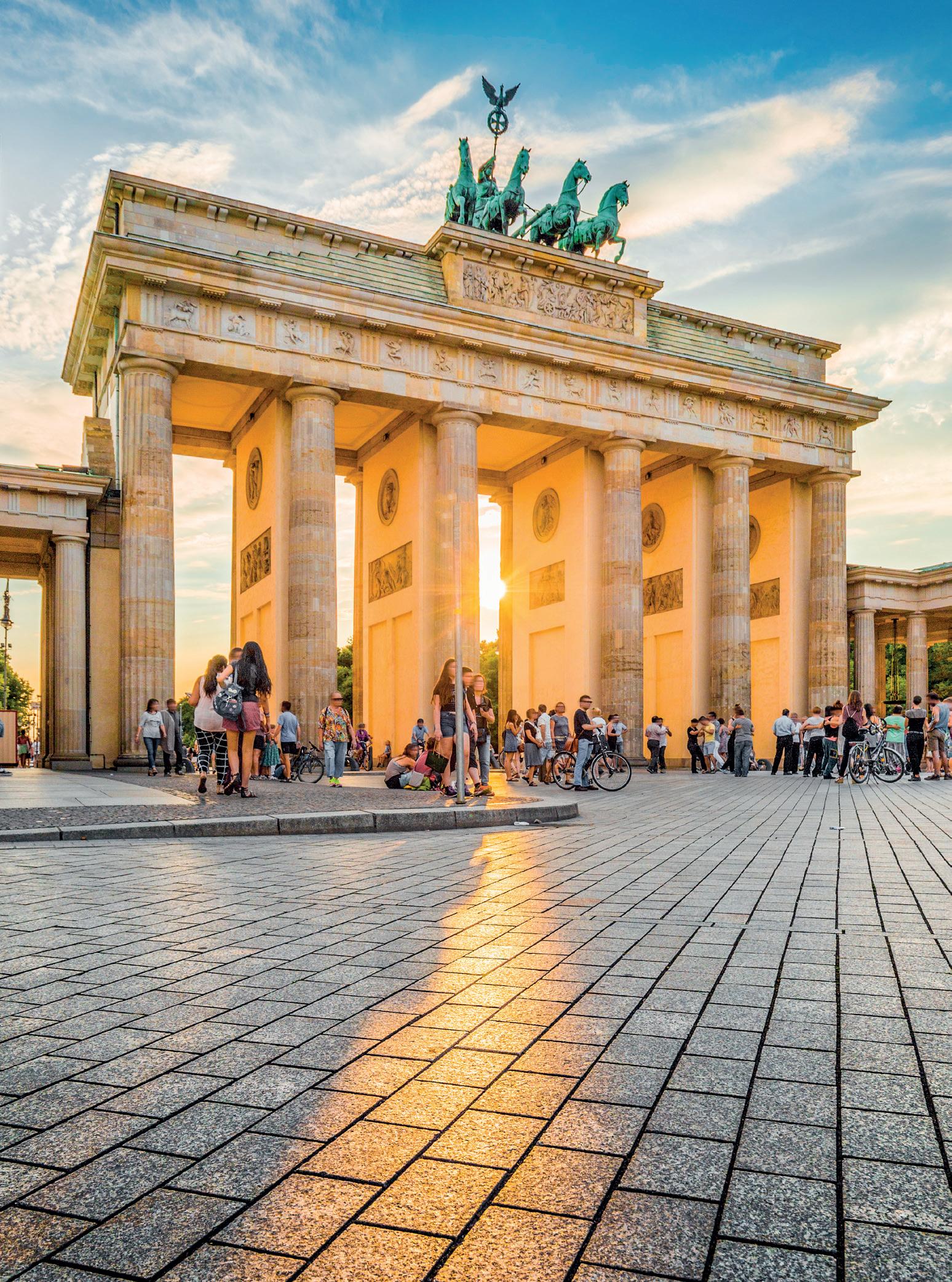
EVENT
THE GERMAN EMBASSY MARKED THE DAY OF GERMAN UNITY in Belgrade
CORPORATE INTERVIEW SMART CLEANING FOR A NEW ERA
Suzana Dubajić General director of Kärcher Serbia
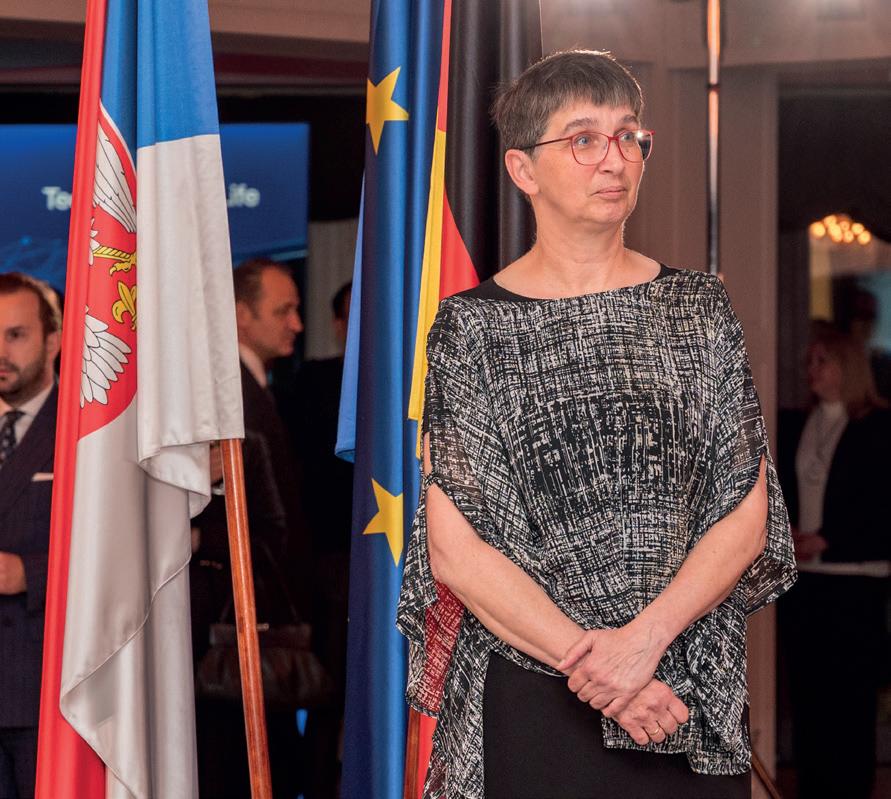
Thirty-five years ago, a dream came true for many Germans - the fall of the Berlin Wall in 1989 marked the beginning of the end of Germany’s division. The Unification Treaty, which entered into force on 3 October 1990, begins by mentioning those who made a significant contribution to that process: “in grateful respect to those who peacefully helped make freedom possible.”
German unity was achieved thanks to the citizens’ uprising in East Germany — people who wanted freedom instead of social and political paternalism, who wanted to form their own opinions instead of memorising others’, and who wanted to take their lives into their own hands. They were inspired by an important predecessor — the “Solidarity” movement in Poland.
The dreams of East Germans from 1989 have come true for many, but by no means for all. Therefore, it remains important that even after 35 years, we continue working toward the full realisation of German unity.
We do so in a demanding geopolitical environment. Russia’s war of aggression against Ukraine, physical and cyber attacks on the EU’s critical infrastructure, violations of NATO
THE FALL OF THE BERLIN WALL IN 1989 MARKED THE BEGINNING OF THE END OF GERMANY’S DIVISION
partners’ airspace, and the deliberate spread of disinformation represent attacks not only on our security but also on the security, social cohesion, and prosperity of our partners in Europe.
We are facing challenges across the globe: attempts to undermine the rules-based order, crises, wars, the consequences of climate change, and economic and trade dependencies in critical areas. For us — for the EU — it is now more important than ever to demonstrate unity, to strengthen our capacity for action and resilience, and to work with both old and new partners for the future.
The Federal Government of Germany regards the Western Balkans as a region of strategic importance. We continue to support Serbia in its reform efforts — across all areas of our cooperation: politics, economy, culture, science, police, and security. Let us work
together to improve the framework conditions so that we can make even better use of this potential!
This October, we are celebrating not only 35 years of German unity but also 25 years of bilateral development cooperation with Serbia.
• 25 years dedicated to improving living conditions across the country. Two million people in Serbia have benefited from access to drinking water and wastewater treatment.
• 25 years dedicated to energy security and energy transition — from emergency electricity imports in 2000 to the Trans-Balkan Corridor.
• 25 years dedicated to sustainable economic development — dual vocational education, opportunities for private enterprises, infrastructure, and “green” production.
25 years dedicated to good governance, which, since 2012, has been integrated into Serbia’s reform processes on the path toward the EU.
To date, the German Federal Government has approved €2.5 billion in aid for Serbia. Currently, 75 projects are being implemented across the country. All of them support Serbia’s efforts to carry out the necessary reforms on its path to European Union membership.
A big thank you to everyone engaged in development cooperation at this time. Since images often speak louder than words, I invite you to watch a short video at the end.
Before the film begins, I would like to extend my heartfelt thanks to our sponsors: Dräger, LIDL, Mercedes-Benz, Siemens Energy, and Volkswagen-Porsche, the choir of the German School in Belgrade, and the wonderful team of the German Embassy.
Without you, this celebration would not have been possible.
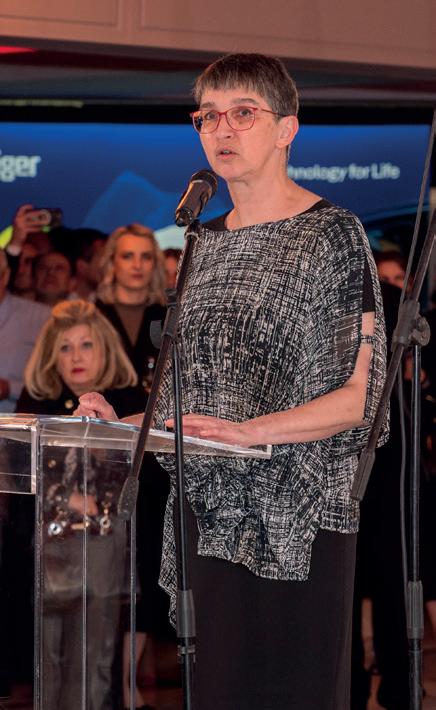
c elebration of German Unity Day in Belgrade highlighted the values of freedom, partnership, and solidarity
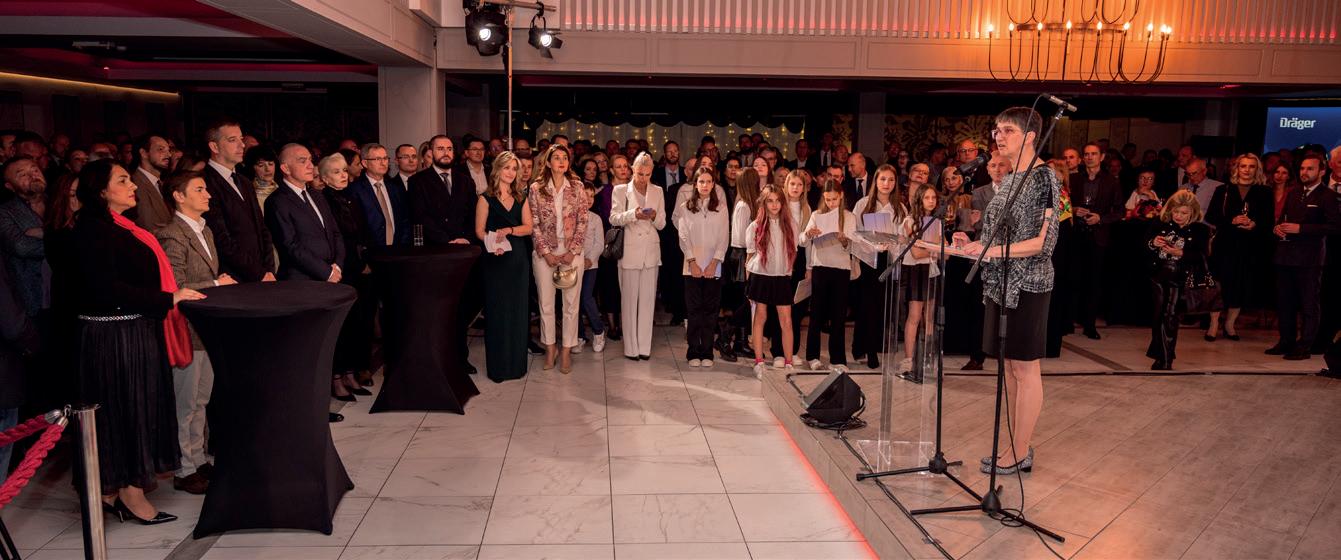
The Embassy of the Federal Republic of Germany in Serbia organised in Belgrade on 1 October a ceremonial celebration of the country’s national holiday –the Day of German Unity.
The event was attended by a large number of representatives of the diplomatic corps in Belgrade, generals and officers of the German, Serbian, and other armies, as well as guests from Serbian public life.
The host of the event, German Ambassador Anke Konrad, welcomed attendees, including Speaker of the National Assembly Ana Brnabić, Minister of Domestic and Foreign Trade Jagoda Lazarević, Minister of Foreign Affairs Marko Đurić, Minister of Agriculture Dragan Glamočić, Minister of Justice Nenad Vujić, and Minister without Portfolio in charge of Reconciliation, Regional Cooperation and Social Stability Usame Zukorlić.
The celebration began with the national anthems of Germany and Serbia. Among those present were Dušan Živković, General Director of Elektroprivreda Srbije, Milan Gajić, President of the German-Serbian Chamber of Commerce, and ambassadors Edward Ferguson of the United Kingdom, Luca Gori of Italy, and Akira Imamura of Japan.
The Day of German Unity is Germany’s national holiday, commemorating the country’s reunification after it had been divided during the Cold War. It has been celebrated on 3 October since 1990, when reunification was formally completed.
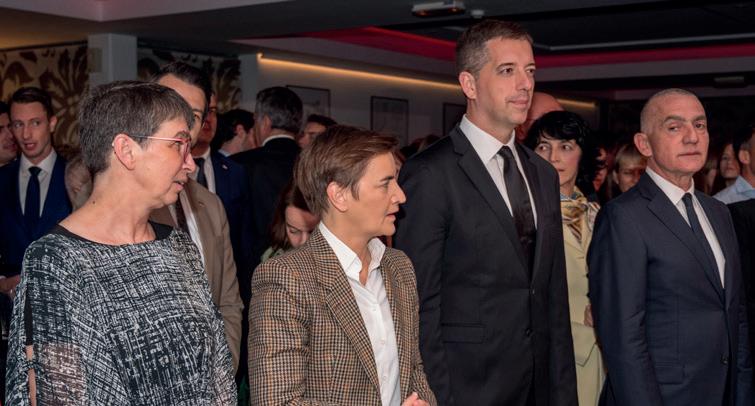
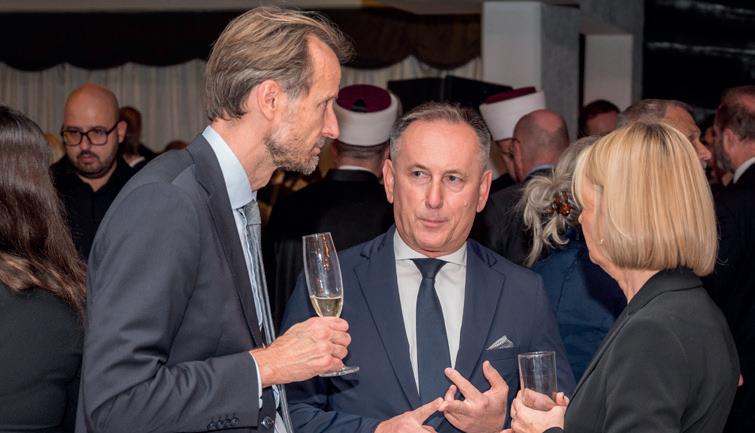
SUZANA DUBAJIĆ
General director of Kärcher Serbia
In this interview for Diplomacy&Commerce, Suzana Dubajić, General Director of Kärcher Serbia, outlines the trends reshaping the cleaning industry, the role of smart technologies and training, and the company’s long-term commitment to quality and sustainability.
How would you describe the current trends and changes in the professional and household cleaning industry in Serbia and the region?
We are living in a time when the very concept of cleanliness is being redefined. In the postpandemic world, hygiene is no longer merely a matter of aesthetics, but a fundamental necessity and imperative – both in business and private environments. We are observing several key trends that are shaping our market.
In the household segment, we are witnessing the expansion of the “do-it-yourself” culture – but with professional expectations. Users are looking for devices that are powerful, efficient and easy to use. The absolute trend is batterypowered devices. The freedom of movement without cables has become a standard, from vacuum cleaners and window cleaners to high-pressure washers. There is also a growing demand for multifunctional devices, such as our hard floor cleaners that vacuum and mop at the same time, saving valuable time. Consumers are becoming increasingly informed and environmentally aware, choosing solutions that use less water and energy.
In the professional (B2B) sector, trends are driven by the need for maximum efficiency and resource optimisation. The market is facing the challenge of labour shortages, which puts automation and robotics in the spotlight. Our autonomous floor-cleaning machine, KIRA B 50, is no longer just a futuristic concept, but a real necessity for large logistics centres, retail facilities and airports
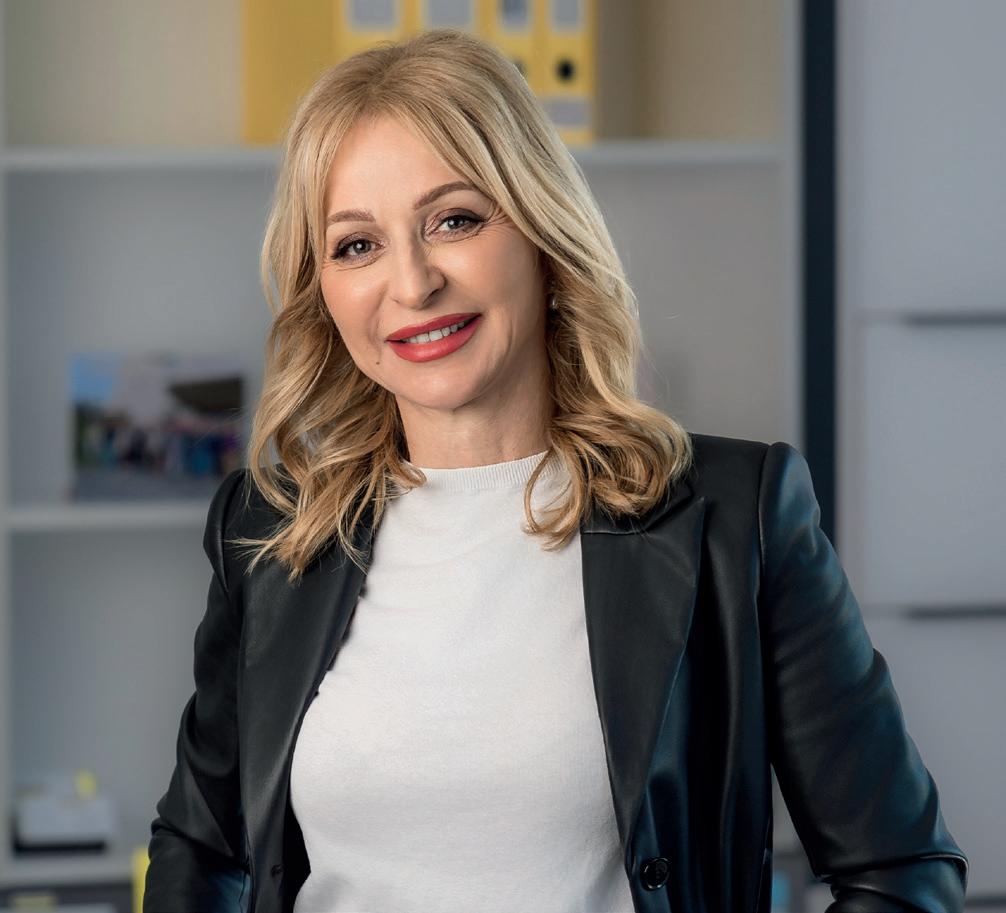
EVEN THE BEST MACHINE IN THE WORLD IS USELESS IF NOT USED PROPERLY
in Serbia. Another key trend is digitalisation. Managing a fleet of cleaning machines through software solutions such as our Kärcher Fleet enables clients to monitor performance, plan maintenance and significantly reduce operational costs. Efficiency, sustainability and measurable results are the key words that define professional cleaning today.
Kärcher is globally recognised for its innovation. How are new technologies and digital solutions being integrated into your products and services in the local market?
Innovation lies at the very core of the Kärcher brand, and our task is to make these global innovations accessible and purposeful for users in Serbia. We do this on several levels.
First, through smart products. Our Home & Garden app is not just a remote control – it is a personal cleaning assistant. When connected to our smart high-pressure washers, the app provides users with precise guidance – which pressure to use for cleaning a wooden terrace and which for a car, ensuring a perfect result without damaging the surface.
Second, through a unique battery platform. Our Kärcher Battery Universe allows one single battery to power dozens of different devices – from lawnmowers to multifunctional vacuum cleaners. This brings our customers exceptional savings and convenience.
In the professional world, digitalisation goes even deeper. In addition to the already mentioned Kärcher Fleet system, our service teams use digital tools for faster diagnostics and more efficient on-site problem solving. By integrating IoT (Internet of Things) sensors into our machines, we are shifting from reactive to proactive maintenance – predicting potential malfunctions before they occur. In this way, we ensure maximum reliability and minimal downtime for our clients in Serbia.
Sustainability is becoming an increasingly important topic in business. How does Kärcher Serbia approach reducing its environmental impact – from production to end users?
For us, sustainability is not a marketing term but a strategic commitment. Our philosophy, “Be the difference,” obliges us to take concrete action.
At the global level, Kärcher has committed to ambitious goals within the Science Based Targets initiative, aimed at reducing CO2 emissions. This commitment is reflected in our local operations as well. Our products are designed to be energy-efficient. Almost all our professional machines feature the eco!efficiency mode, which, at the touch of a button, reduces energy, water and detergent consumption – without compromising cleaning performance.
We promote the use of our biodegradable cleaning agents, all of which carry recognised environmental certificates. Our engineers are also continuously working on reducing water consumption. For example, our high-pressure washers use up to 80% less water compared to ordinary garden hose cleaning.
Finally, a key aspect of sustainability is product longevity. Kärcher devices are built to last, and in Serbia, we provide full service support and spare parts availability for many years after purchase. In doing so, we fight against the “throwaway culture” and promote responsible ownership.
Which sectors in Serbia do you see as the most promising for the development of professional cleaning solutions, and why?
Serbia is a dynamic market with several sectors showing exceptional growth potential.
Logistics and warehousing:
Owing to its geographic position, Serbia has become the logistics hub of the region. We are witnessing the rapid expansion of large distribution centres and warehouses. Cleaning thousands of square metres of floor space is unthinkable without highly efficient floorscrubbing and cleaning machines, including autonomous robots.
HoReCa (Hotels, Restaurants, Cafés): Tourism is on the rise, new hotels from global chains are opening, and hygiene standards are higher than ever. This sector requires a wide range of solutions – from discreet and silent vacuum cleaners for hotel corridors and steam cleaners for deep disinfection
of kitchens and bathrooms, to floorpolishing machines for lobbies.
Industrial manufacturing: With the arrival of foreign investments, the number of modern production facilities is increasing. Specific requirements, such as cleaning machine parts without water using dry ice blasting technology, or safely vacuuming industrial dust, open the door for our highly specialised solutions.
Healthcare and the pharmaceutical industry: These are sectors where there can be no compromise when it comes to hygiene. Our certified disinfection systems, steam cleaners and vacuum cleaners with HEPA filters meet the strictest standards required in hospitals, laboratories and pharmacies.
How important is user education and training when it comes to the efficient and safe use of modern cleaning equipment?
Education is essential. Even the best machine in the world is useless if not used properly. At Kärcher, we believe that we don’t just sell devices – we deliver complete solutions, and training is an integral part of that solution.
Proper training achieves three goals: maximum efficiency (the operator knows how to use the full potential of the machine and complete the task faster), cost reduction (correct dosing of detergents and proper use of the machine reduces consumption and prevents breakdowns), and workplace safety (preventing injuries and property damage).
Our team in Serbia provides detailed training upon the delivery of every professional machine. We demonstrate all functions, advise on selecting appropriate cleaning agents and accessories, and train users on proper maintenance. In addition, through our Kärcher Centres and cooperation with partners, we continuously provide support and guidance. Investing in the knowledge of our users means investing in their satisfaction and in a long-term partnership.
What are Kärcher’s plans in Serbia in the coming years when it comes to new products, projects and investments?
Our vision is clear – we want Kärcher to be the first choice and the synonym for cleanliness in
every home and every company in Serbia. Our plans are focused on three key pillars:
Expanding the portfolio: We will continue to bring the latest global innovations to the Serbian market. This particularly includes expanding our battery platform, introducing new models of autonomous cleaning robots, and developing solutions for specific industrial needs.
Strengthening the sales and service network: We plan further investments in our Kärcher Centres to be even closer to our customers. Our goal is for every user, anywhere in Serbia, to have quick and easy access to our products, expert advice and reliable service support.
Digitalising the customer experience: Investing in digital communication and support channels is our priority. We want to offer our partners and end users a seamless experience – from online research and purchasing to digital service scheduling and personalised guidance.
Serbia is a strategically important market for us, with enormous potential. We will continue to invest in the local team, infrastructure and partnerships, as we believe that the best results come from the synergy of global strength and local expertise. Kärcher remains a reliable partner that truly makes a difference.
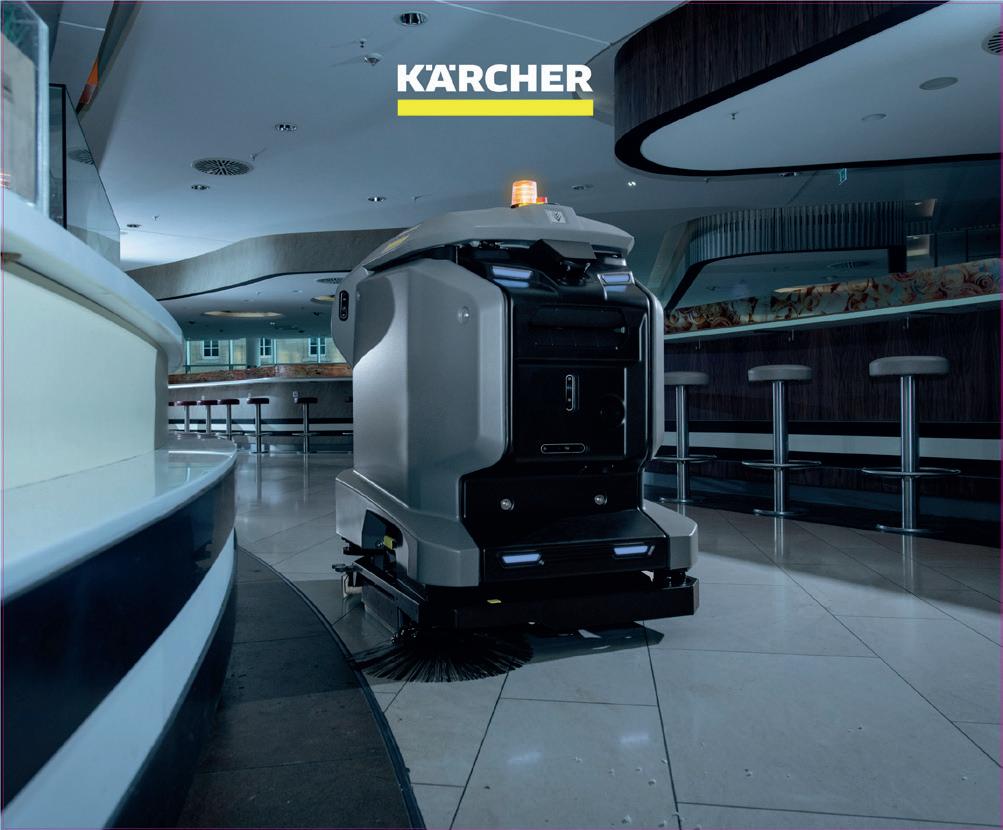
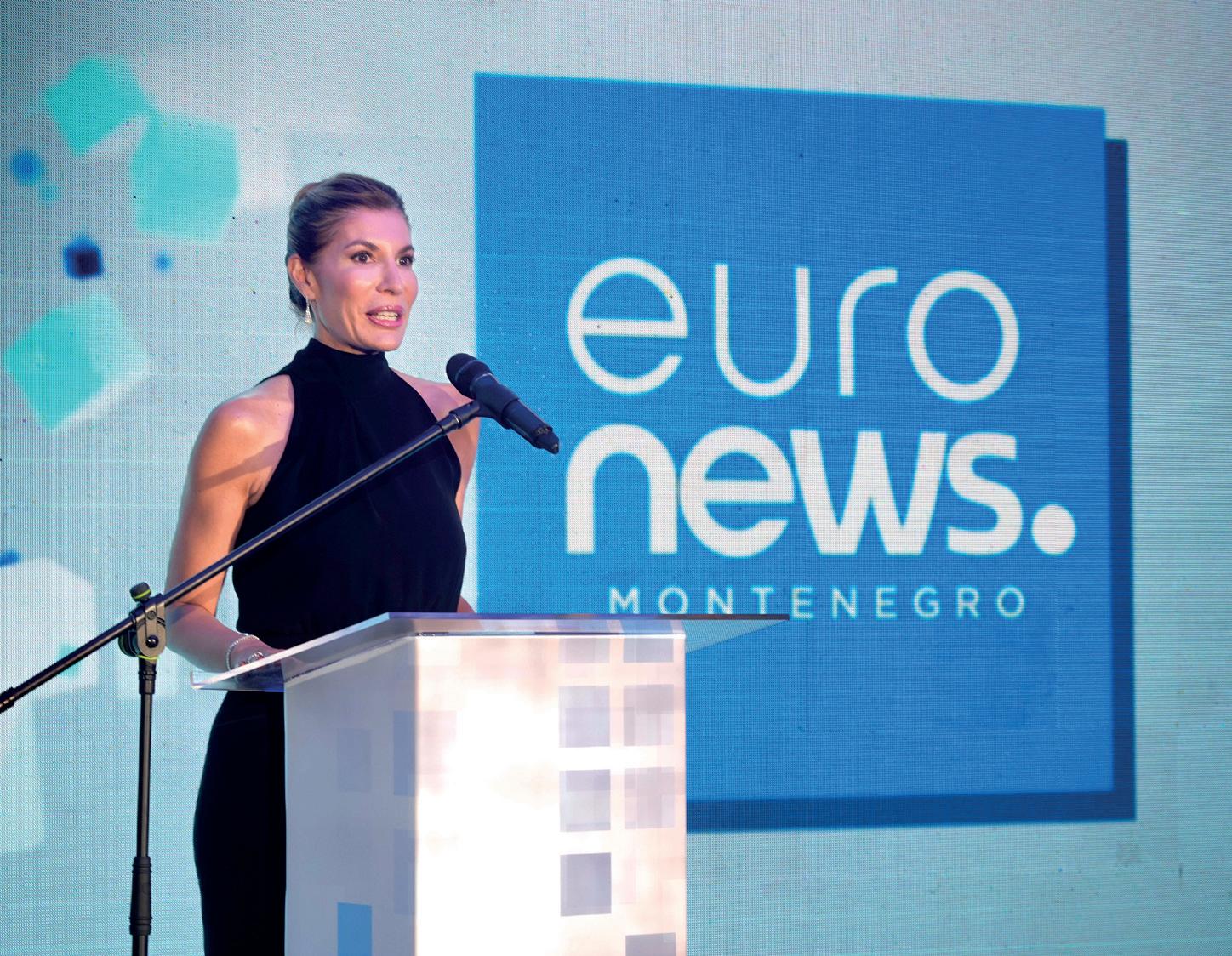
A new regional branch of Euronews, Euronews montenegro, was officially opened in Podgorica
Euronews President Pedro Vargas David, Telekom Srbija CEO Vladimir Lučić, Euronews Serbia, Montenegro, and Bosnia and Herzegovina Regional Director Minja Miletić, and Euronews Montenegro Editor-in-Chief Milutin Stjepović attended the ceremony. They emphasised that stories from Montenegro will now be heard across Europe. Montenegro
“WE DON’T WANT TO SHAPE OPINIONS; WE WILL PROVIDE INFORMATION SO YOU CAN FORM YOUR OWN.” – MILUTIN STJEPOVIĆ
joins 19 other Euronews editions across the continent.
Euronews President Pedro Vargas David highlighted the success of Euronews being broadcast
in the languages of European nations, as the service covers 90 per cent of the market.
“Today, we are reaching the homes of Europeans in more
countries than ever before, and we serve 90 per cent of Europe’s population in their mother tongue. That is Euronews’ greatest hallmark. We are Europeans. Most of us speak English, but at home we speak all our different languages, and that is why providing this multilingual service from Brussels and other capitals is, for us, the key to success,” said Vargas David.
The CEO of Telekom Srbija expressed his gratitude to the Government of Montenegro, which has enabled Telekom Srbija to remain a major investor in the country for nearly 20 years.
“At Telekom Srbija, we believe that Europe is one family, and we are glad that Euronews is one of the symbols of that Europe, and that we are the company which, together with Euronews, brought that symbol to Montenegro. Therefore, I would first like to thank the Government
“OUR GOAL IS CLEAR: TO PROVIDE OBJECTIVE, VERIFIED, AND IMPARTIAL INFORMATION.” –MINJA MILETIĆ
of Montenegro, the state of Montenegro, for allowing us to be a major investor in this beautiful country for almost 20 years,” said Lučić.
Euronews Serbia, Bosnia and Herzegovina, and Montenegro Regional Director Minja Miletić stressed that the Euronews family is already recognised in the region as a credible source of information, expressing hope that the same will be the case with Euronews Montenegro.
“Our goal is clear: to provide objective, verified, and impartial information, to be a bridge between the region and the world, and to create space for dialogue in society, which, I believe, has been changing very quickly lately. Alongside Euronews
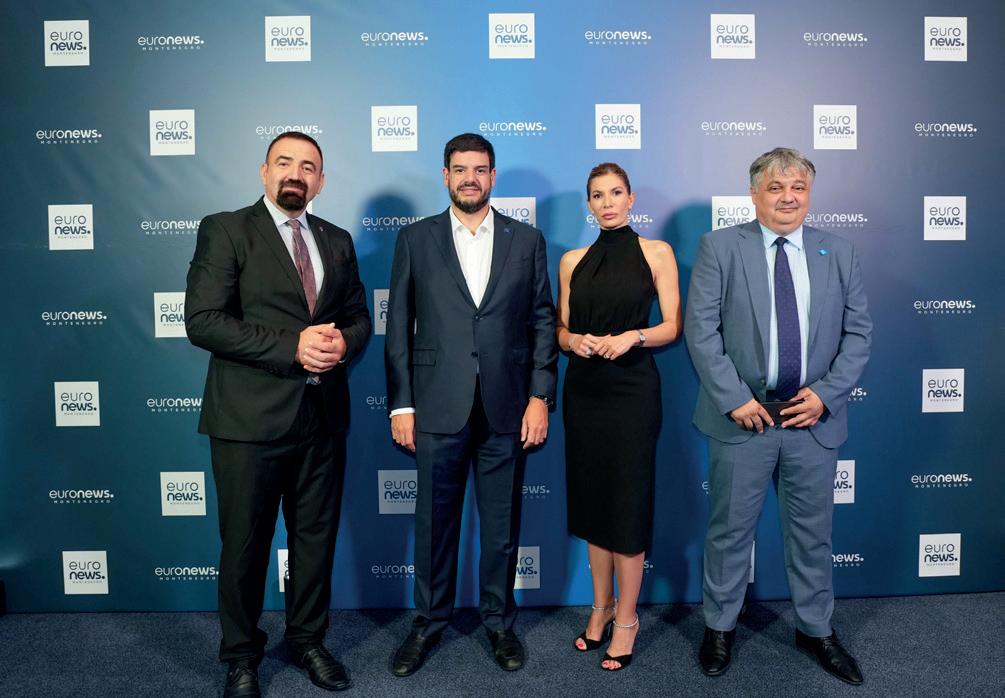
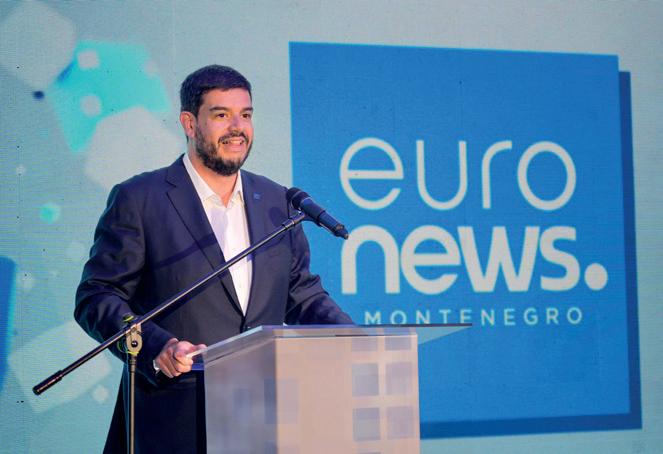
Serbia and Euronews Bosnia and Herzegovina, already recognised as credible sources of information
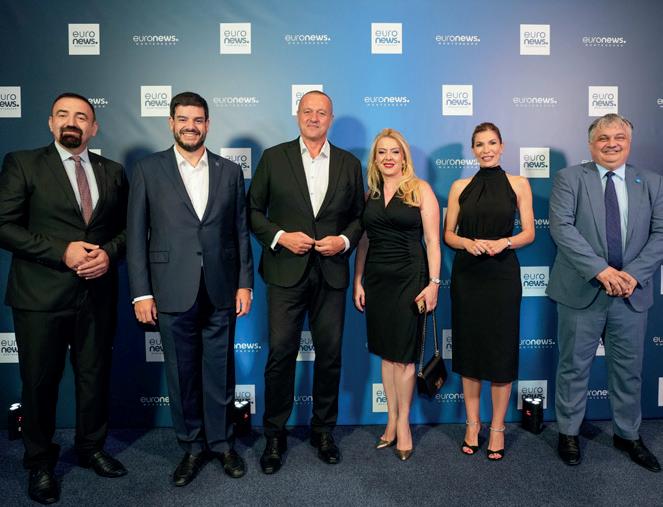
and carriers of high professional standards, we want that quality, responsibility, and dedication
to also be present in Euronews Montenegro,” said Miletić.
Euronews Montenegro Editorin-Chief Milutin Stjepović underlined that his team is young, energetic, and ready for challenges.
“We aspire to be part of the European Union; chapters are being closed, and we are glad that we are here at this time. We want to show Europe the values Montenegro has, but we also want to bring European and global values into our country.
We are a young, new team — full of energy and ready for challenges. I invite you all to join us in building trust. We don’t want to shape opinions; we will provide you with information, and you will form your own opinions based on that,” said Stjepović.
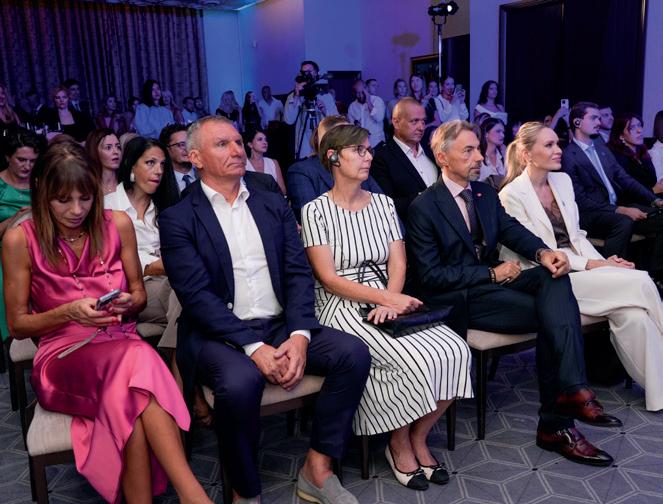
A platform that unites art, business and life – and inspires introspection
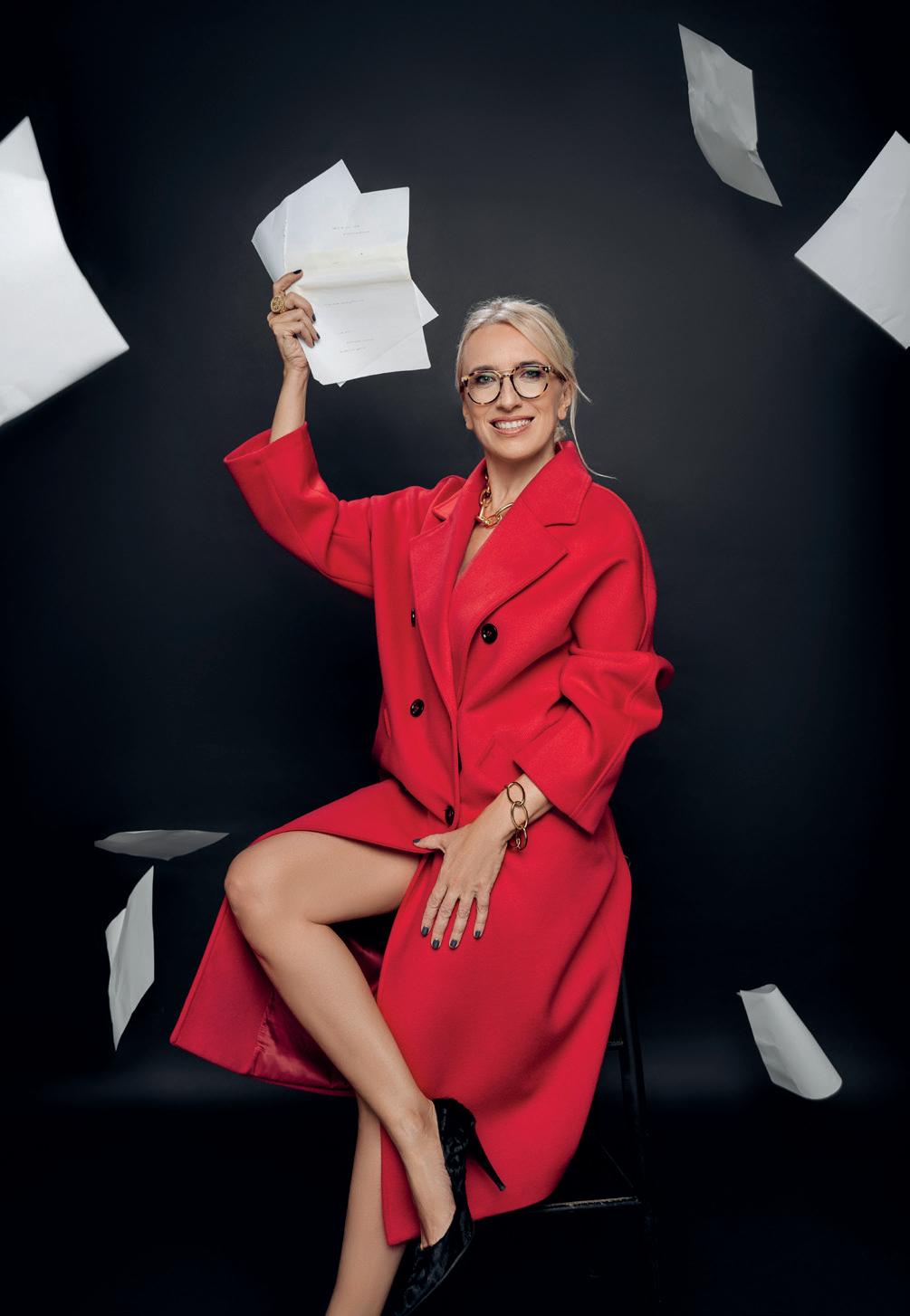
MIA MEDAKOVIĆ-TOPALOVIĆ
Founder and editor-in-chief of Refresh Your Life magazine
When spending an afternoon with Mia Medaković-Topalović, the Founder and the Editor–in–Chief of the Refresh Your Life magazine, we were offered a unique view of this publication representing the voice of united art, business and lifestyle.
Mia uncovers the experience and the values of creating RYL magazine, from its original idea to a recognised brand name that creates a global mindset. RYL magazine brings colourful life stories to its loyal and refined readers as a unique experience that one comes across rarely.
RYL is a distinctive magazine that blends lifestyle and mindstyle with philosophy,
look inward. My guiding thought was for the magazine to serve as a bridge between the outer and inner worlds – to inspire, raise questions, unveil emotions and help people better understand themselves and the world around them. My primary focus is on art, business, and personal growth. The magazine has become a recognised platform that fosters creativity, sparks dialogue and empowers its readers.
RYL is a space unlike traditional media. I wanted it not to be just another lifestyle magazine, but one that encourages, guides and makes life more beautiful and authentic.
It is often said today that people read only headlines and that attention spans are getting shorter. Do you see this among your readers, or is there still an audience that wants to read longer, more serious texts?
Indeed, attention today often gravitates towards shorter, faster content, but I believe there is still an audience that wishes to immerse themselves in longer, more serious pieces. From the example of our readers, I see that those who truly connect with RYL appreciate the chance to pause and savour the content. RYL aims to be a place where that kind of attention is nurtured – where long-form reading is not a burden but a pleasure and a source of inspiration.
Bad news, crime stories, and sensationalism mostly dominate the media. Do you believe there is room for good, inspiring
READING IS NOT A BURDEN BUT A PLEASURE AND A SOURCE OF INSPIRATION
literature, art and deep reflections on life. How did the idea for such a concept come about, and what was the guiding thought when you launched the magazine?
The idea for RYL was born from a desire to connect lifestyle with deeper reflections on the world, art and people. I wanted to create a space where readers could not only enjoy beauty and inspiration but also be encouraged to
stories and positive news, and what kind of response do you get from your readers when you publish them?
I absolutely believe there is room for good, inspiring stories. People want to hear about beauty, courage, creativity and human achievements – not just about problems and scandals. Whenever we publish such stories, the response from our audience is overwhelmingly positive; readers
write to us saying they feel inspired, reminded of kindness and encouraged to see the world from a different perspective. RYL strives to be a place where such stories are nurtured and shared, because we believe inspiration can transform everyday life.
Each issue of RYL has a central theme. How do you choose the themes, and how do you encourage authors and contributors to write in line with them while keeping their own voice?
I choose the themes for each issue to reflect the spiritual and artistic pulse of the moment, as well as the inner reflections we wish to inspire in our readers. When working with authors and contributors, I encourage them to explore their own creative perspective within that theme while keeping their unique voice. I believe it is precisely this combination – a clear central thread and freedom of expression – that makes RYL vibrant, authentic and truly alive.
RYL has a wide network of contributors from different fields. How important is it to you that the authors come from diverse cultural and professional backgrounds, and how does that contribute to the magazine’s quality?
It is very important to me that our authors come from different cultural and professional backgrounds, as each perspective brings a new layer, a new page for the reader to discover. This diversity enriches RYL, making the texts layered and inspiring, and allows readers to gain a broader view of the world through different experiences and sensibilities. It is precisely this combination of voices that gives the magazine its unique quality and spiritual depth – a reflection of our readership, who are intellectuals with a broader perspective on the world and their own growth.
What is RYL’s relationship with the diplomatic community in Serbia, and do you see your magazine as a platform for promoting cultural and bilateral ties with other countries?
I have been a member of the International Women’s Club in Belgrade since 2017 and have met many women from all over the world, whose spouses are diplomats in Serbia. What connects us is precisely this shared
appreciation of world cultures and, on my part, strong support through RYL magazine to promote them and bring them closer to the Serbian public. RYL is also the publisher of the book Belgrade throughtheEyesofForeigners, in which IWC members wrote about the places they love most in Belgrade and why the city has become their second home.
Therefore, RYL maintains a friendly and open relationship with the diplomatic community in Serbia, as we believe in the importance of cultural exchange and dialogue between nations. Through the magazine, we aim to be a platform that promotes art, culture and ideas that connect people, as well as to encourage understanding and bilateral links through inspiring stories and projects that bring different cultures together.
The position of journalists in Serbia today is not easy, and media freedom is a frequently debated topic. From an editor’s perspective, how do you view the state of media freedom, and what challenges do you see for journalists who wish to pursue serious, independent journalism? The state of media freedom in Serbia is challenging and requires constant attention. Journalists who wish to pursue serious and independent journalism often face
pressures, financial constraints and the need to balance market demands with professional ethics. As an editor, I believe it is crucial to create a space where quality, investigative and thoughtful journalism can thrive, and to support journalists in their courage to put the truth first.
As a woman editor and journalist, what is your view on the position of women in the media in Serbia? Is their position equal, and what obstacles still exist?
The position of women in the Serbian media has improved, but it remains unequal. Women often have to balance professional demands with social expectations, and at times face obstacles such as stereotypes and unequal opportunities for advancement. It is essential to create a media environment that recognises, supports, and amplifies women’s voices, as their perspectives contribute to better, more diverse, and more authentic journalism.
The obstacles in the media are numerous – from political and economic pressures, financial instability, and dependence on advertisers, to insufficient protection for journalists and the ever-faster pace of content production that leaves little room for in-depth, investigative reporting. We also face the dominance of sensationalism,
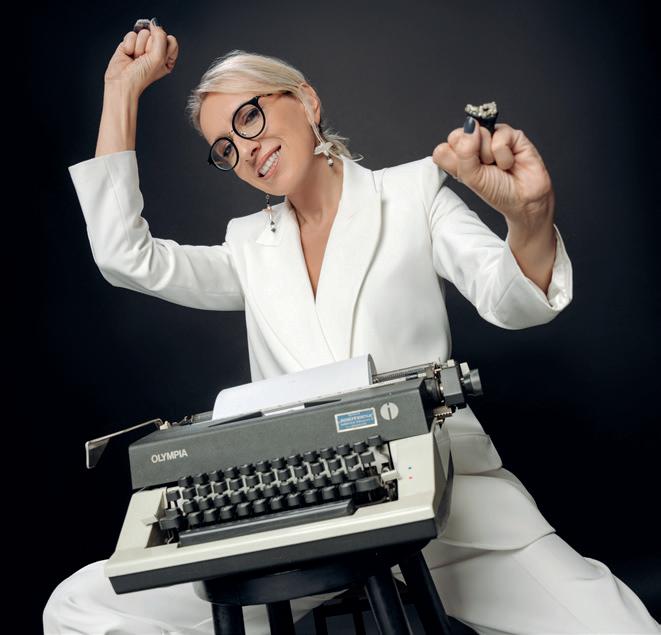
which makes it harder to create space for truthful, quality and authentic work. This is why I believe it is essential for the media to persevere in upholding professional and moral principles.
RYL is a high-quality magazine, but it is digital and aimed at an audience that seeks meaningful content. How difficult is it to maintain financial sustainability and profitability when you avoid clickbait and sensationalism?
Maintaining the financial sustainability of a digital magazine that eschews clickbait and sensationalism is certainly a challenge. The audience that values meaningful, high-quality content is smaller than the one that chases quick thrills. Still, I believe that, in the long run, such an approach builds loyal readers and the magazine’s credibility. At RYL, we strive to strike a balance between creative freedom, quality content and a sustainable business model, because we believe that the value of quality journalism pays off over time.
Is it easy? No. Has it all been worthwhile over the magazine’s ten years of existence? Yes – because RYL has a mission.
Finally, what fulfils you the most in this work, and what would you like to achieve with RYL in the coming years?
What fulfils me most is seeing how each issue is better than the last – how we grow through creation and knowledge. I feel fulfilled when we are compared to international magazines in every sense, when we receive support, as well as constructive criticism. I love seeing our readers pause and truly connect with the stories and articles – when they are inspired, encouraged to reflect, or gain a new perspective on their lives. In the coming years, I want RYL to become an even more recognisable platform that unites art, business and lifestyle, and a place that supports authors and creatives, spreading culture, dialogue and inspiration in Serbia and beyond. We are here to empower, support and give wind to the backs of both our readers and our authors.
I want to emphasise that Refresh Your Life magazine serves as a bridge between art and business, between the outer and inner worlds, between inspiration and daily life, and between different cultures, ideas, and sensibilities.
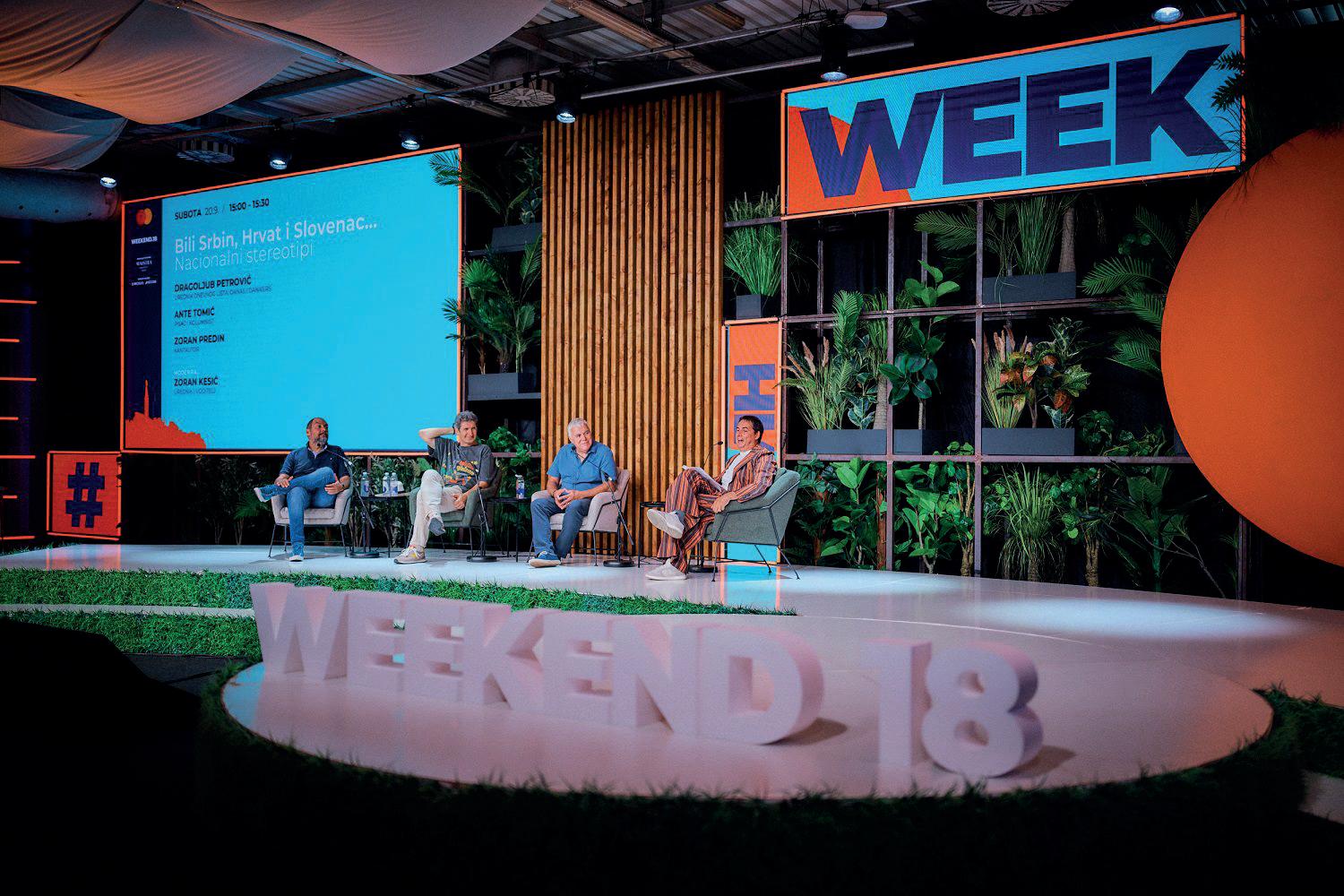
The coming-of-age edition of the most influential festival in the region gathered the largest number of participants so far, confirming Rovinj as an unavoidable meeting point for the communication, media, business, and creative community. Through ten halls and six festival segments, ideas, experiences, and visions were exchanged, shaping the future of the industry and society.
Weekend.18 was also marked by speakers whose messages resonated far beyond Rovinj. Lara Boro, CEO of The Economist Group, emphasised the importance of objectivity and a balanced approach in reporting: “When Trump won for the second time, we publicly recruited journalists who supported him because we wanted to hear that perspective too. There must be no polarisation; we must have both poles. Even what Trump
“CREATIVITY FUELS INNOVATION MORE THAN ANY CODE EVER COULD.” – JAMES TAYLOR
says can sometimes be true and make sense.” Michael Wolff, author of the bestseller FireandFury, reminded that Trump is “at the same time an idiot and a genius. An idiot because he knows almost nothing and wages a war against information itself, a genius because he managed through that very chaos to capture attention and be the centre of every discussion.” Mariana van Zeller, awardwinning National Geographic journalist, in a packed hall shared her experiences from global black markets and smuggling networks and pointed out that “the real power of a story comes from honesty and building relationships, even with those who live outside the
law.” Mirsada Begović, editor at Al Jazeera English, emphasised the context in which journalists work today, in a world marked by wars, disinformation, and constant polarisation, where truth is often the first victim of global crises. “There must be no doubt about objectivity, even when our lives literally hang by a thread,” added Begović.
The second day of the Weekend opened with an inspiring lecture by James Taylor, an awardwinning expert on creativity and artificial intelligence, who emphasised that “our future depends on how much we nurture our own creativity, as it accelerates innovation more than any code ever could.”
During the day, Federico Paderni, Managing Director for Emerging Markets in the EMEA region at X, highlighted that “X is no longer just a social network, but a technology platform that is building the future in real time, and brands must be ready for hyper-adaptability. Communication will have to be more personalised, and content more relevant,” stressing that only brave and adaptable brands can succeed in this fast and unpredictable arena.
The festival also created space for regional reflections. At the panel “A Serb, a Croat and a Slovene Walk Into a Bar…”, Ante Tomić, Zoran Predin, Dragoljub Petrović, and Zoran Kesić dissected Balkan stereotypes through humour and satire, while the discussion “Haters: WhoAreTheseStrangePeople?” showed how online hate can be neutralised through authenticity and humour. “470,000 people
on my profile are just waiting to hate me,” said Zoran Šprajc. At the same time, Ida Prester shared a comment she received: “Yugoslav woman, feminist, communist, but at least not a Serb,” illustrating the absurd and bizarre ways in which haters attack individuals.
Equally powerful were the messages from women in the newsroom. “The audience recognises honesty, not imitation,” noted Mojmira Pastorčić, adding that women bring a new dimension to news reporting: “We are more sensitive to certain topics, we bring empathy and change the tone of reporting.” Still, she admitted that female journalists often face pressures unrelated to their work: “Why should Šprajc›s jokes be commented on, and my shirts? I demand that we talk about content. I don’t want to talk about my beauty routine; I want to be taken as seriously as my colleagues.”
Weekend.18 was also a space for announcing new initiatives. Nenad Milanović, founder and CEO of CAKE.com, announced the establishment of a completely independent media outlet in Serbia that will employ journalists dismissed for critical reporting: “I don’t want to get into the media business, but what matters most is that there is a media outlet that will report impartially on the real situation on the ground and everything the regime is doing.”
While some panels opened up social questions, others gave the festival a strong strategic dimension. AI.Weekend, dedicated
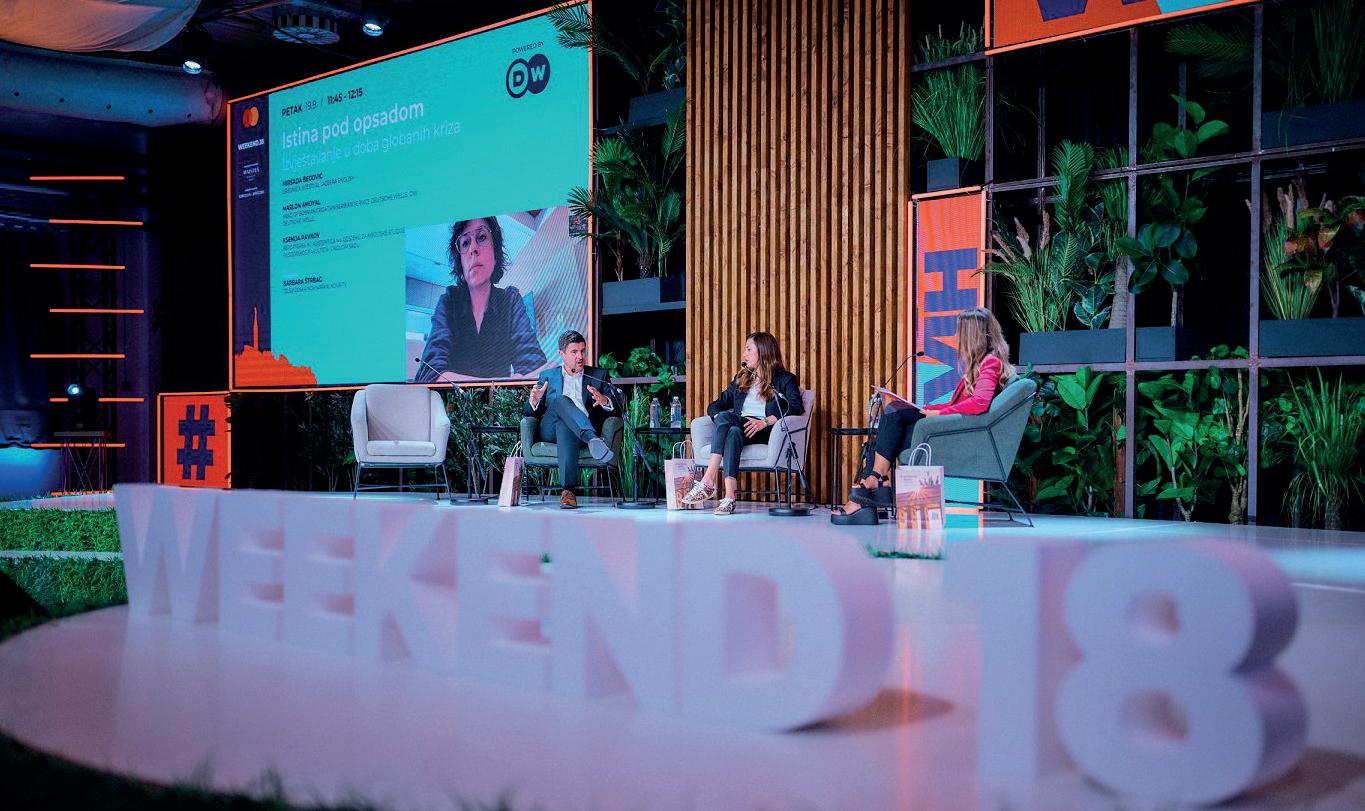
“WEEKEND IS NOT JUST A FESTIVAL, BUT A MOVEMENT SHAPING THE REGION’S FUTURE.” – TOMO RICOV
entirely to artificial intelligence, showed how technology is already transforming business models. Across two stages, examples were presented of how AI is being applied in media, marketing, medicine, finance and the creative industries. The conclusion was clear: artificial intelligence does not take jobs away from people but rather frees up time for creative and strategic tasks, while responsibility and
ethical application remain key challenges.
HR.Weekend highlighted the latest trends in management, leadership and corporate culture, sparking discussions on the future of business in the region. Finance. Weekend opened debates on the future of markets and the role of digital innovation in finance, Investment.Weekend emphasised the investment potential in the region and the importance of
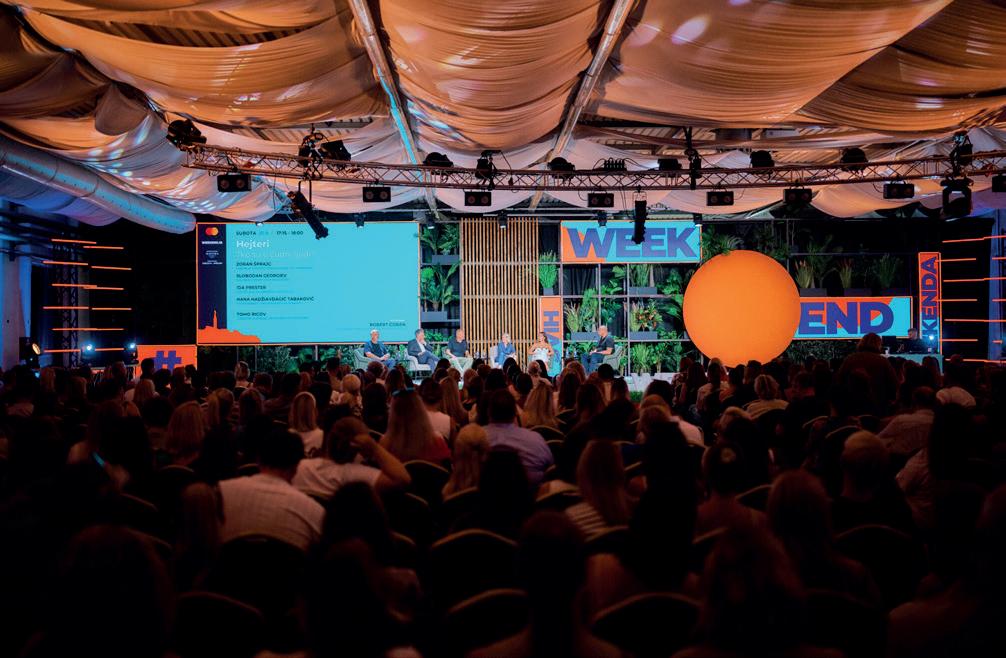
sustainable projects, while Energy. Weekend underlined the crucial importance of energy transition.
The festival’s closing message was clear: “Weekend is not just a festival but a platform that shapes trends and opens conversations that transform the industry. This year we have shown that Rovinj is not only a meeting place but also a space where ideas are born – ideas that will define the next decade,” concluded Tomo Ricov, Festival Director.
Weekend.18 once again proved that it is not merely an event, but a movement – a place where leaders meet and where the direction of the region is being shaped for the years to come.
The Weekend Media Festival closed with the panel “Haters: Who Are These Strange People”, moderated by Robert Čoban, President of Color Press Group. Participants included Ida Prester, musician and activist; Slobodan Georgiev, journalist and influencer; Tomo Ricov, Director of the Weekend Media Festival; and Hana Hadžiavdagić Tabaković, influencer. The panel discussed the global phenomenon of hate on social media and how it manifests in our region.
A bold look at how the Museum of African Art is redefining Africa’s place in Belgrade’s cultural life and inspiring a new generation of visitors
DR MARIJA ALEKSIĆ Director of the Museum of African Art (MAU)
Step into Belgrade’s “House of Africa” – a museum that refuses to be a static relic and instead pulses with dialogue, education and collaboration. In this interview, Director Dr Marija Aleksić reveals how the Museum of African Art (MAU) is shaping a new vision of Africa in Europe – breaking clichés, sparking partnerships, and turning exhibitions into living, breathing experiences.
The MAU is unique in the region. How do you define its identity and mission today, especially considering it was created as a result of cultural and diplomatic ties rather than colonial heritage?
The MAU is the first and only museum in the region dedicated exclusively to the arts and cultures of the African continent. It was born out of cultural and diplomatic ties – not colonial heritage –and that is what makes it unique. It is a place of genuine cultural exchange and a testament to the long-standing friendship between African nations and our country.
It is worth recalling that the Museum was created thanks to the vision and enthusiasm of the Pečar couple, Yugoslav diplomats, who donated their private collection of objects gathered across Africa to the City of Belgrade. That original collection still forms the foundation of the museum and is the basis on which we continue to build cooperation with African artists and institutions.
Our aim is not to reproduce traditional colonial narratives, but to present Africa through a lens of equality, respect, and mutual understanding. We aim to bring African art closer to the public, not as an exotic curiosity, but as a rich and diverse blend of traditions, aesthetics, and contemporary artistic expression – through ongoing dialogue, education, and collaboration
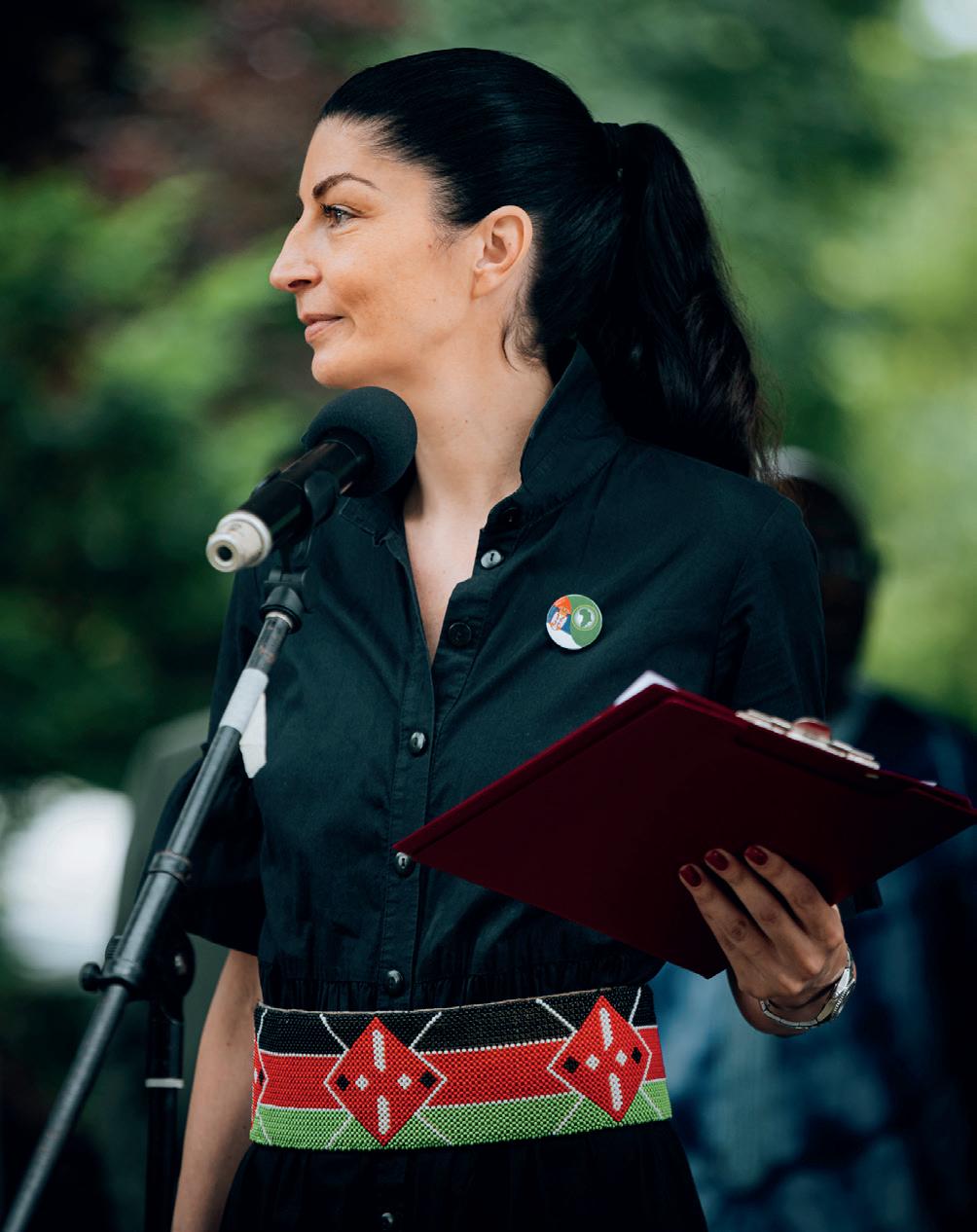
OUR AIM IS NOT TO REPRODUCE TRADITIONAL COLONIAL NARRATIVES, BUT TO PRESENT AFRICA THROUGH A LENS OF EQUALITY, RESPECT, AND MUTUAL UNDERSTANDING
with African artists and researchers. The legacy of the Non-Aligned Movement and friendship with African nations further shape our identity, which is why interest in the MAU – the only anti-colonial museum in Europe – remains strong.
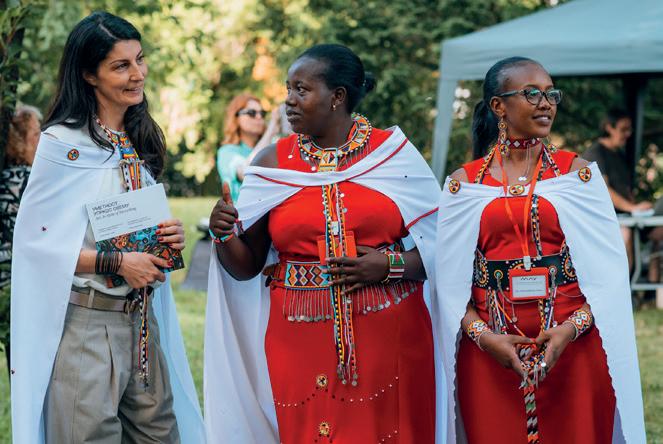
You are at the head of the museum, but also part of the team that creates programmes and preserves the collection. What does it mean to you to lead such an institution, and how do you motivate your team to keep pushing boundaries?
For me, leading the MAU means not only safeguarding the founders’ legacy but also building new bridges with the African continent. Our permanent display features significant examples of West African art. At the same time, our temporary and thematic exhibitions present the arts of Ethiopia, the Maghreb, as well as East, Central and Southern Africa.
Travels and direct contact with artists, curators and colleagues constantly remind us that African art is not static – it is contemporary and deeply intertwined with the everyday lives of its people.
Directing the museum carries great responsibility – not only to preserve the entrusted heritage, but also to enrich it, remain innovative, and stay open to new ideas. I motivate the team through a shared mission: every exhibition, workshop, or programme has a clear message and purpose. I encourage colleagues to research, experiment, and not be afraid to take risks, while visitors’ responses inspire and shape new content. Together, we are building the museum as a space for encounters, exchange and dialogue – a process that can be challenging but also brings the most energy, enthusiasm and inspiration.
The Museum has recently undergone important administrative and organisational changes. How do these changes affect day-today operations and long-term development plans?
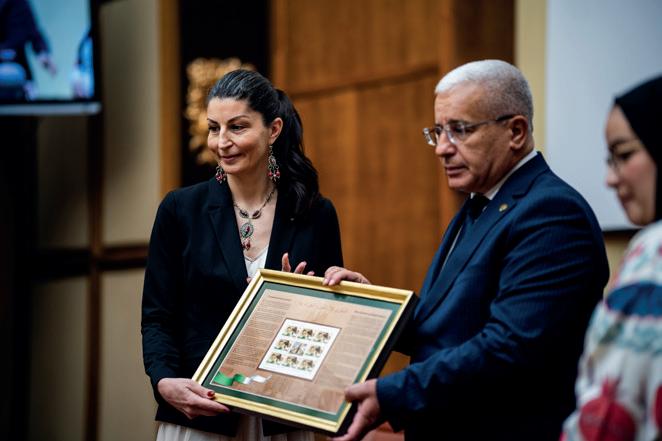
The transfer of founding rights from the City to the State – placing the museum under the auspices of the Ministry of Culture and the Government of the Republic of Serbia – has given us a stronger institutional position and room for strategic planning. This enables long-term project development, ranging from improving conditions for preserving the collection and reconstructing the building to expanding capacities for education and international cooperation.
In our daily work, this means having more resources, better conditions for staging exhibitions, and greater responsibility to
ensure everything is sustainable, well-thought-out, and transparent. The team can plan projects more ambitiously and offer the audience higher-quality, more diverse and more accessible content.
All of this is also recognition of the museum’s importance and achievements over the decades – not only in the cultural sphere but also internationally and politically. With the support of the Government and the Ministry of Culture, our work in the coming years will be even more visible and influential, particularly as we approach the fiftieth anniversary of the museum’s founding.
What opportunities do you see for strengthening cooperation with African artists, institutions and cultural centres? Are you planning new international projects or residency programmes?
For over four decades, the Museum has played a crucial role in fostering cultural connections and promoting the principles of multiculturalism. Our goal is for the Museum to be not just a mediator of African art, but an active partner in it.
Our curatorial team closely follows the contemporary art scene and collaborates on joint projects with African colleagues. Exchange programmes for experts and exhibitions – whether bringing artists to Belgrade or sending our curators to African countries – deepen an authentic dialogue.
Support from diplomatic missions and embassies – both of
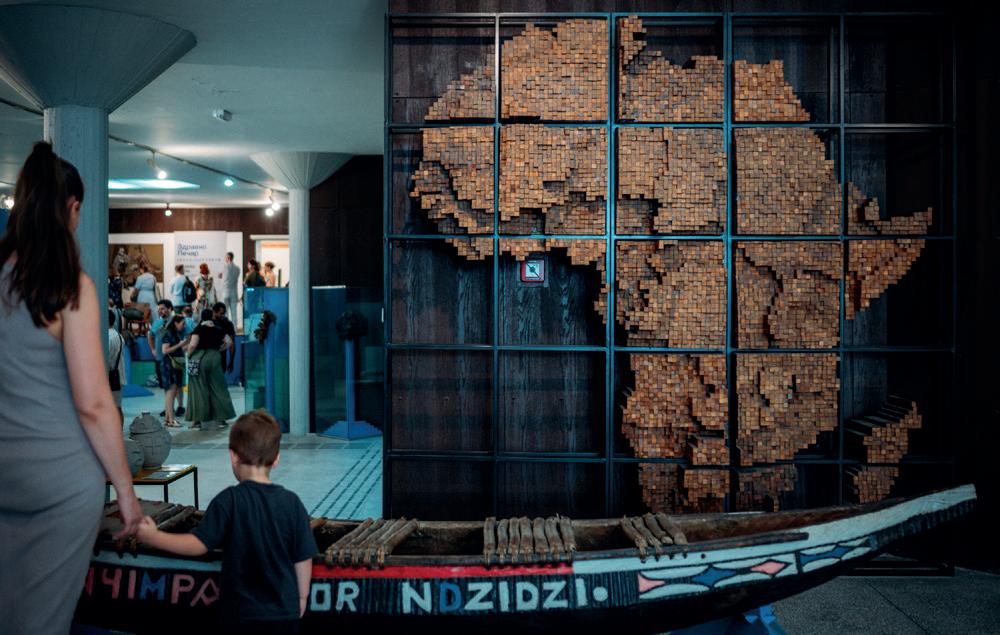
African countries in Belgrade and of our own in Africa – is essential in carrying out such projects, as is ongoing cooperation with the Ministry of Foreign Affairs of the Republic of Serbia. Their mediation and institutional backing often help turn contacts into long-term partnerships and joint initiatives.
We are especially proud of our co-productions with African museums and cultural centres, through which the public gets to see works created as part of shared creative processes. Just this year, we had two exceptional guest appearances: exhibitions at the Parliament of Algeria and at the National Museum of Egyptian Civilisation in Cairo.
Looking ahead, we are planning new international projects and residency programmes that will allow artists and curators to conduct research and create in both Belgrade and Africa – forging the deepest and most authentic connections.
The Museum is well known for its innovative educational workshops and events for children and adults. What are your priorities when it comes to audience engagement, and how do you plan to bring African art closer to new generations? In addition to exhibitions, we present Africa’s cultural heritage through the Afro Festival, lectures, film screenings, art and music workshops, thematic evenings and concerts. We engage the public through interactive and creative programmes that create a unique experience.
Workshops such as Colours of Africa, public guided tours, programmes for children and high school students, Swahili courses, and initiatives like MAU for Everyone – Everyone to MAU for pensioners ensure that every visitor can participate. We are especially proud of our progress in accessibility for persons with disabilities – with walking paths designed for the blind and visually impaired, as well as tactile replicas and audio guides available to all. After the planned reconstruction, the Museum will truly become a “museum for everyone.”
We also attract new generations through digital channels, including social media, campaigns, and online content. The museum’s attractive setting and garden facilitate participation in urban events, such as the Picnic, which
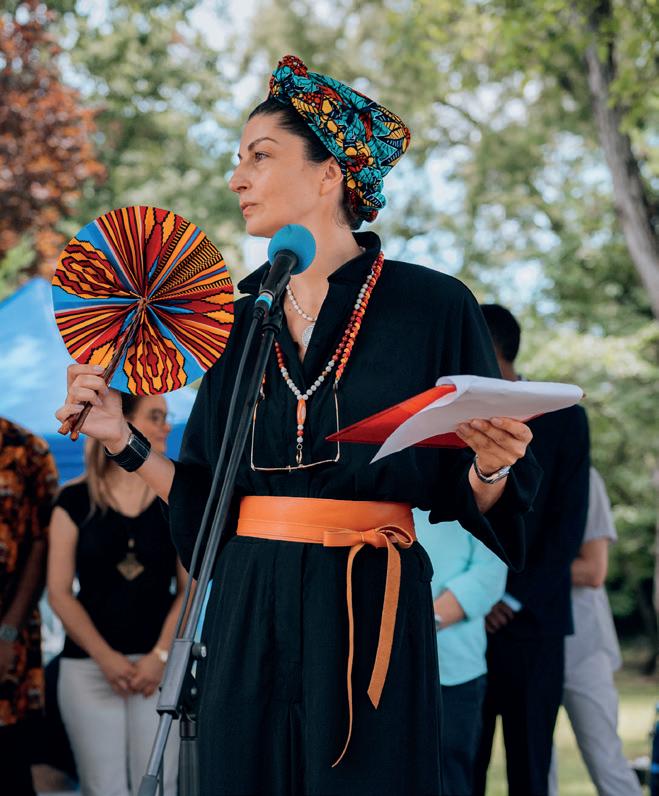
WE WANT THE MUSEUM TO BE A PLACE WHERE AFRICAN CULTURE IS NOT ONLY EXHIBITED BUT LIVED, REFLECTED UPON AND INSPIRING
brings fresh energy and attracts a younger audience.
Most recently, we hosted the Disco Travel Experience programme, where over 3,000 visitors enjoyed music, guided tours, workshops, and themed stands representing different continents, simulating a “trip around the world” in one day – all within our garden. This project is a prime example of highly successful crosssector and public–private cooperation, which, beyond its cultural value, had a strong humanitarian component: raising funds for NURDOR and supporting children battling cancer. The idea of solidarity and collective action for the common good brought together numerous partners, transforming a cultural event into a powerful social message.
Innovative programmes like these – combining education, entertainment and compassion – enhance the museum’s visibility, attract new visitors and build long-term partnerships within the community.
What are the biggest challenges facing a specialised museum institution in Serbia today, and how do you overcome them?
The biggest challenges include financial stability, maintaining buildings and collections, staff shortages, and the need to raise public awareness about the importance of specialised museums. We address these through strengthening institutional capacity, strategic planning and international partnerships that enable expert exchange and the development of new projects. Transparent communication with state institutions, the local community and partners further builds trust and ensures sustainability.
We particularly emphasise education and openness – both among staff and the public. When people understand the value of cultural heritage, support comes naturally. We continually invest in the professional development of our staff, as an open and knowledgeable team is best equipped to share knowledge with visitors. Through a wide range of programmes and workshops, we show that specialised museums have a relevant and vibrant role in the everyday life of the community.
What kind of MAU would you like us to see in five or ten years – in terms of its collection and exhibitions, as well as the role it plays in the cultural life of Belgrade and the region?
The MAU has a long tradition of cooperation with the embassies and cultural centres of African countries. How intense is this cooperation today, and in what way does it contribute to programme diversity and greater visibility of African art in Serbia?
Cooperation with the embassies and cultural centres of African countries is both long-standing and intensive. It includes donations of objects, visits by artists, lectures, workshops and participation in events such as the Afro Festival. This enriches our programme and allows the audience to explore different African regions and traditions, confirming that African culture is not monolithic but a rich mosaic of voices and perspectives.
We plan to further expand this cooperation through bilateral projects, expert exchanges and exhibition co-productions, to offer the public even more authentic and innovative experiences.
Within five to ten years, we aim for the MAU in Belgrade to become a regional hub for contemporary African art and culture, showcasing an innovative, interactive, and dynamic permanent exhibition. We envision a strong international programme, featuring travelling exhibitions that showcase works from Africa, as well as initiatives facilitating direct collaboration with African artists and institutions.
Our goal is for the Museum to be a place where African culture is not only exhibited but lived, reflected upon and inspiring –where visitors experience art as something that connects them to diverse traditions and contemporary creativity. In the cultural life of Belgrade and the region, we want to be recognised as an institution that creates content the audience truly desires, one that unites people and actively contributes to dialogue and education. We want the Museum to remain a true “House of Africa in Belgrade.”
Spanish artist Joan Bofill painted Princess Elizabeth of Yugoslavia in Belgrade for his upcoming Double Portrait exhibition in New York
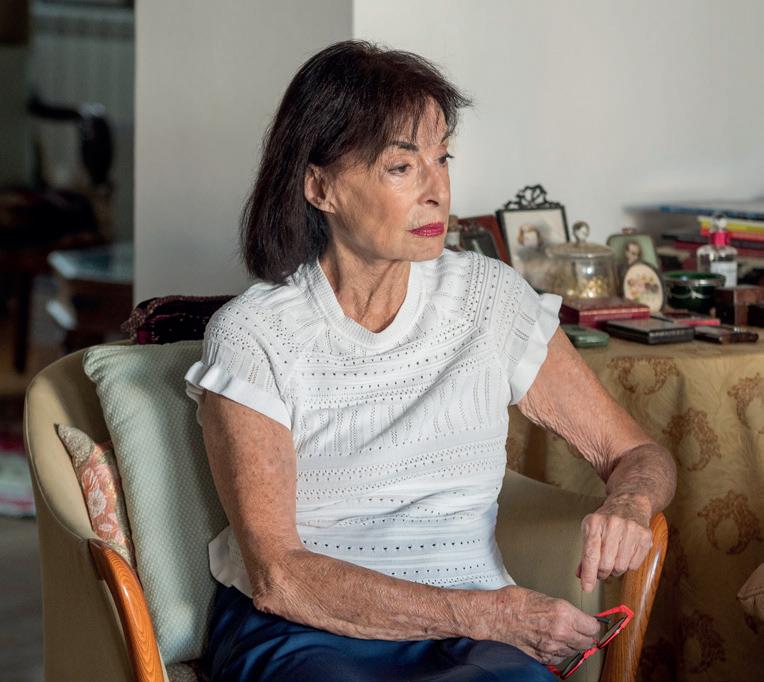
Spanish artist Joan Bofill created a portrait of Princess Elizabeth of Yugoslavia at her apartment in Belgrade on September 13. The work will be included in his Double Portrait collection, which will be featured in his upcoming solo exhibition in New York, opening on October 16 at
the Angel Orensanz Foundation. The show presents Bofill’s ongoing series of portraits of prominent figures from European and North American culture, while also including a curated selection of works produced over the past fifteen years, tracing the artist’s evolution and creative maturity.
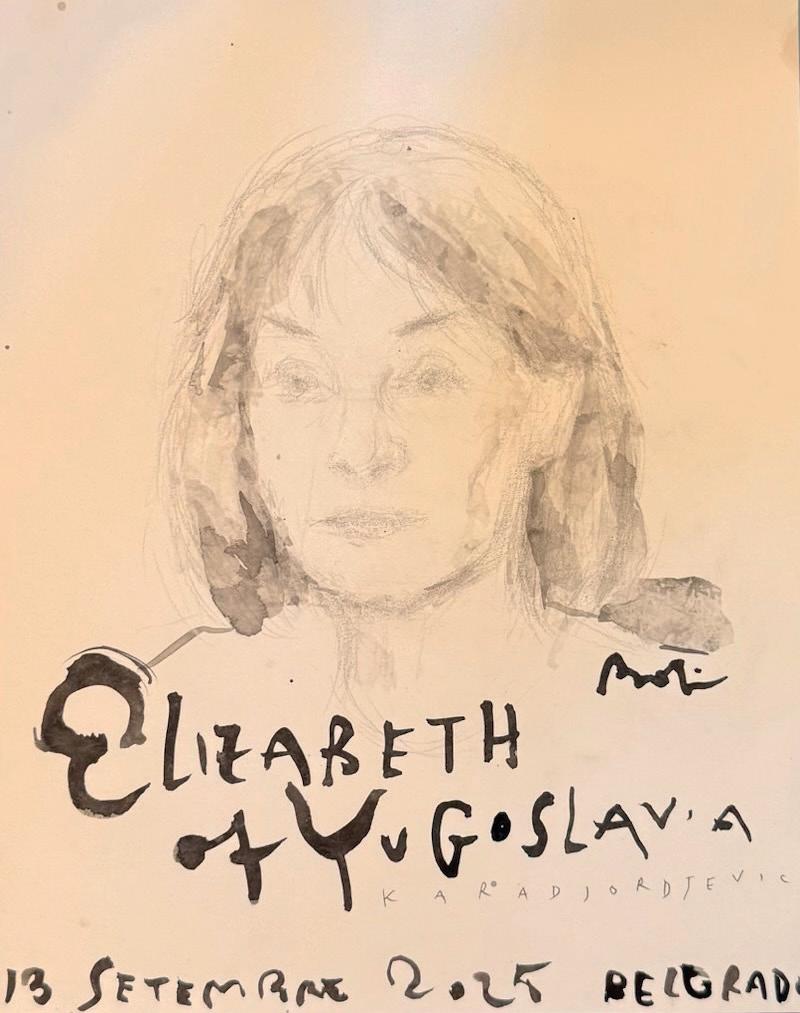
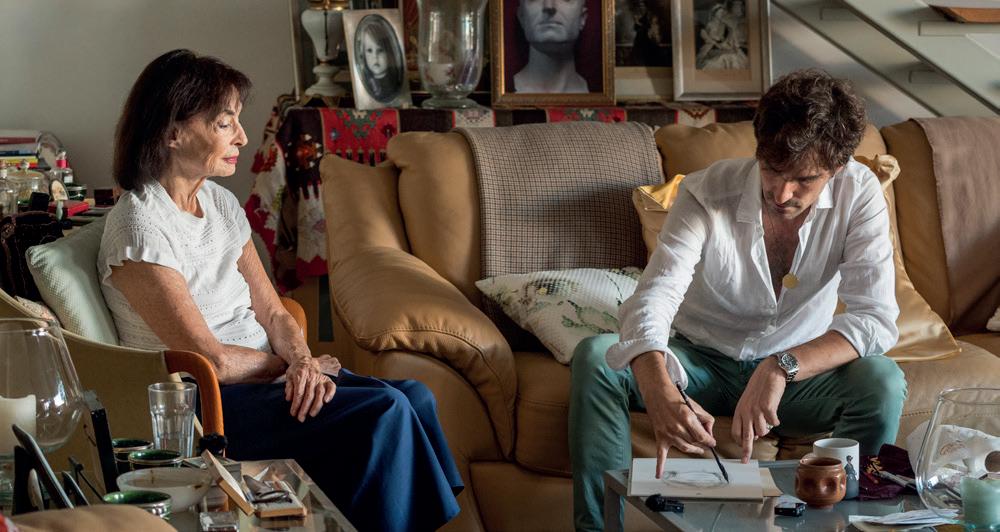
Joan Bofill Amargós (1982) is a Spanish visual artist and filmmaker whose repertoire includes multiple disciplines, with a particular emphasis on painting and documentary film. His dual focus on visual and audiovisual media defines much of his work, reflecting a deep commitment to the exploration of diverse forms of artistic expression.
Bofill does not distinguish between the creation of a plastic and an audiovisual portrait; for him, both media are equally valid and complementary. His fascination with the interplay between vulnerability and strength, as well as innocence and intuition, drives him to create pieces that explore these themes.
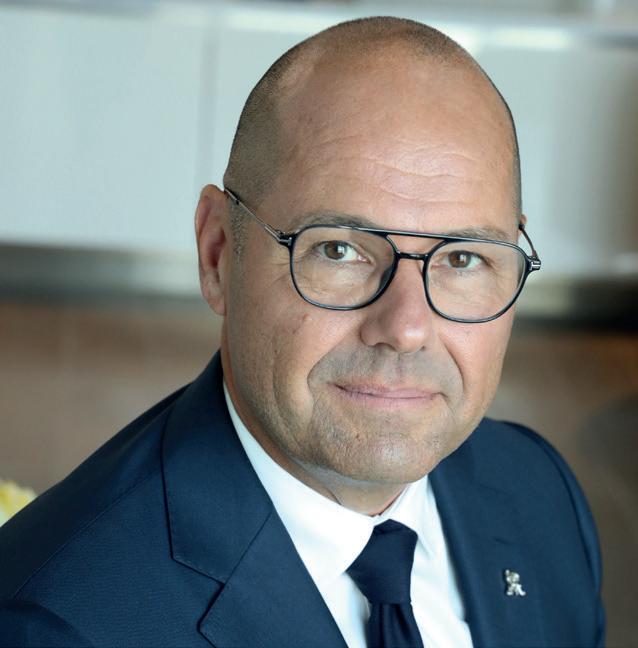
General manager of The St. Regis Hotel and Residences Belgrade
Marc C.A. de Ruijter, General Manager of The St. Regis Hotel and Residences Belgrade, shares how this iconic brand has reshaped Belgrade’s luxury hospitality landscape.
What does the arrival of the St. Regis brand in Belgrade signal, not just for the city’s hospitality scene, but for Serbia’s positioning on the global luxury map?
The arrival of The St. Regis Belgrade on November 1, 2024, represents far more than the opening of a new hotel, it signifies a defining moment for both the city and the region. Whenever a house of such heritage enters a destination, it signals that the market has matured, ready to welcome a new caliber of travelers, investors, and residents.
Located at the heart of Belgrade Waterfront, our presence has become a powerful catalyst, inspiring confidence in Serbia’s evolving position on the global luxury map. With the support of our visionary owners, we are proud to have established ourselves as the address of choice for statesmen, global leaders, key opinion leaders, cultural Luminaries, and leisure travelers seeking a truly world-class experience in Belgrade.
In practical terms, how is St. Regis redefining what it means to be a 5-star hotel in Serbia? What sets it apart from premium or 4-star offerings?
What distinguishes The St. Regis Belgrade is not merely the architecture or the refinement of our spaces, even though our guestrooms are among the most generous in the city, it is the art of service. Our guests consistently tell us that what delights them most is the unexpected
t he St. Regis Belgrade sets new standards in hospitality
warmth and precision they experience here.
We go beyond meeting expectations to anticipating them, tailoring each stay to the personal preferences of our Luminaries. This hallmark of bespoke service, together with our signature rituals, cutting-edge technology, and exquisitely curated public spaces, defines a level of graciousness that elevates us well above other premium offerings. Ultimately, it is our people, their intuition, attention to detail, and genuine care who transform a visit into a lasting memory, inspiring many of our guests to return time and again.
THE
How does St. Regis Belgrade blend local culture, gastronomy, and artistry with the brand’s international standards? Can you share a few standout examples?
The St. Regis story has always been synonymous with heritage and celebration. We carry forward the spirit of John Jacob Astor, who opened the first St. Regis in New York in 1904 and transformed the social landscape of his era with innovations and iconic gatherings that were both pioneering and elegant. Here in Belgrade, we honor that legacy by celebrating Serbia, its artistry, craftsmanship, and traditions. Our design narrative draws inspiration from the hotel’s unique setting at the confluence of the Sava and Danube rivers. Throughout the interiors, bespoke artworks echo the shimmering waterlines, while intricate metalwork pays homage to the region’s 5,000-year-old heritage of metallurgy.
In gastronomy, we honor the Serbian terroir, sourcing ingredients from local artisanal producers. Our iconic Bloody Mary is reimagined with a distinctly local character, infused
with quince rakija, while each evening the Champagne Sabrage at sunset marks the graceful transition from day to night in true St. Regis style. At the heart of it all is our signature butler service-an art form in itself: discreet, intuitive, and deeply personal.
How did St. Regis quickly become a preferred choice for diplomats, international guests, and business travelers, and what role does it play in shaping MICE tourism in the region?
Our strategic location and seamless accessibility certainly set the stage, but what truly differentiates us is the level of privacy, security, and thoughtfulness we provide. From dedicated valet services to meticulously managed arrivals and discreet in-house security protocols, every detail is orchestrated to ensure a sense of ease and confidence for our guests.
In less than a year, we have hosted prominent international delegations, global corporations, and key decision-makers who recognize The St. Regis Belgrade as the natural setting for high-level meetings and events. In doing so, we are contributing to Belgrade’s emergence as a sophisticated hub for MICE tourism, attracting influential leaders whose presence elevates the city’s profile on the international business stage.
On a personal note, what drives your vision as GM, and how do you see the future of St. Regis Belgrade evolving alongside the city itself?
For me, the soul of any exceptional hotel lies in its people. My guiding vision has always been to cultivate a team of passionate hoteliers, talents, and individuals whose commitment to service transforms hospitality into an art. I see The St. Regis Belgrade not merely as a hotel but as a destination unto itself, where both business and leisure experiences are infused with a sense of occasion and celebration.
Our foundation is strong, our standards constant. As Belgrade continues its cultural and economic renaissance, I believe The St. Regis Belgrade will remain its best address -continuously innovating yet always rooted in the timeless elegance and service ethos that define the St. Regis legacy.
September/OctOber 2025
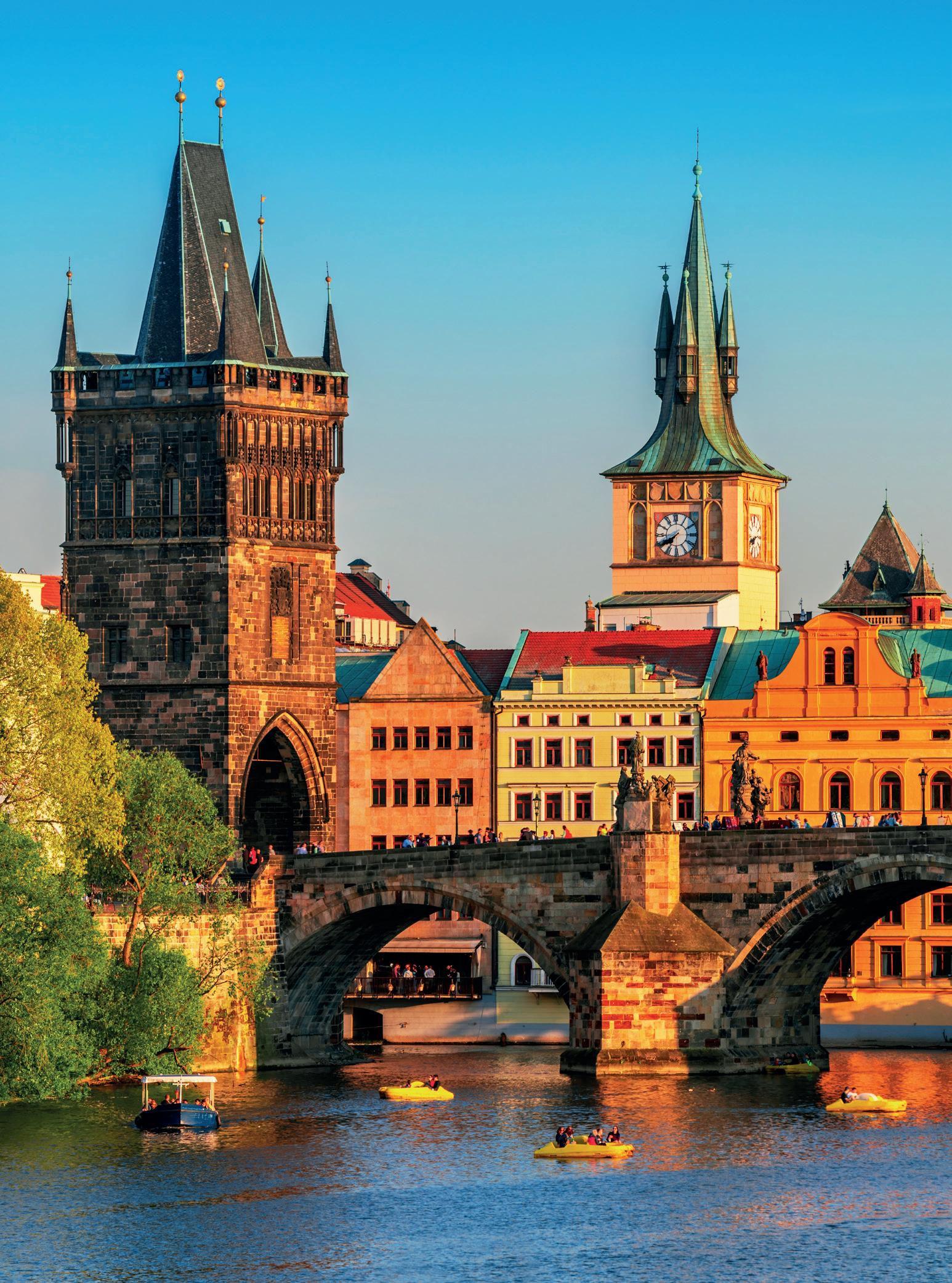
FEATURED INTERVIEW IN DIALOGUE WE GROW
H.E. Jan Bondy Ambassador of the Czech Republic to Serbia EVENT DOBRÝ DEN FROM BELGRADE! The Czech Embassy Celebrated St. Wenceslaus Day
DAN BROWN IN PRAGUE DEATH AND THE RIDER by Robert Čoban
A partnership that has evolved over centuries — rooted in understanding and shared values WE WERE ALWAYS ON THE SAME SIDE OF HISTORY
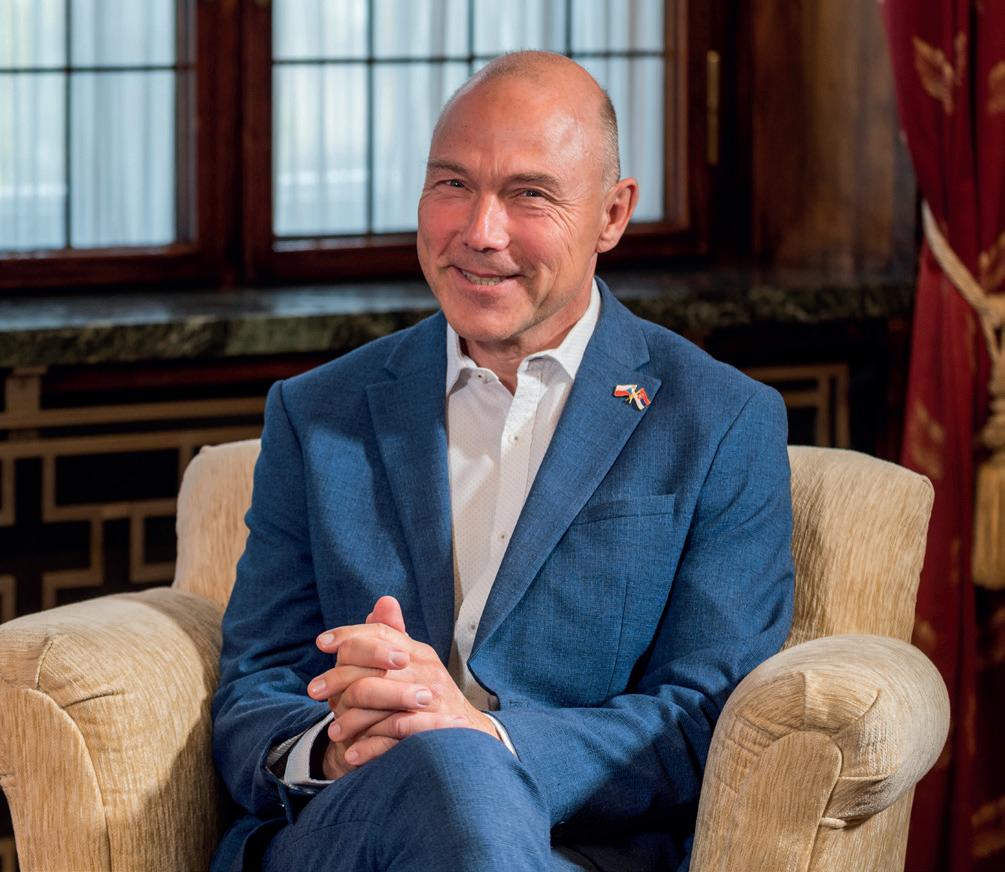
H.E. JAN BONDY
Ambassador of the Czech Republic to Serbia
The conversation explores the evolving role of the Czech Republic in the Western Balkans — from EU support and civic education to digital partnerships and defence diplomacy. Speaking with us is H.E. Jan Bondy, Ambassador of the Czech Republic to Serbia The interview was conducted for the TV programme Diplomata, aired on Euronews Serbia
You’ve led the Public Diplomacy Department at the Ministry of Foreign Affairs of the Czech Republic multiple times in your career. Could you share with
us what core values guide your communication strategies when representing your country abroad, especially in regions such as the Balkans with deep historical ties?
I think that one of the most important roles in our activities as diplomats is also this so-called public diplomacy. It means you care a little bit about your history and the history of the country you’re working for, which also brings our roots closer together. Before I arrived in Serbia, I wondered when we started our relationship with the Serbs and the Czechs, and it came back to the 12th century. So even the Protector Uroš married her daughter to one of the famous Constants from the Znajm, which is a part of the Czech Republic nowadays, Moravia.
We also have Morava, like you do, and it’s an integral part of the country because of the wineries and the very nice landscape. I can recommend it to you. And then, slowly, it developed into a brighter communication. During our, let’s say, famous King Karl IV, there was a strong relationship against the Ottomans at that time, and so on.
So I’m coming slowly, slowly to the point we are now, boosting our relationship like in the 12th and 13th centuries, and we hope it will get closer and closer. So it’s a partnership that evolved over so many centuries. Right, that’s right, and we are never enemies, which is nice to say, nice to mention, and we were always on the same side of history.
You’ve extensively worked in this part of Europe. Could you say that you have a certain affinity for this region, and could you also share with us if any aspects of Balkan diplomacy resonate with your personal or professional values?
My decision was always to work in the south of Europe, with the warm Balkan hospitality and people, because my grandmother and grandfather’s roots are from this part of the world. Because of our, let’s say, strong relationship, I found out that my ambitions and experience could be helpful, and hopefully, it will be true one day. Absolutely. You mentioned the historical ties that the Czech Republic and Serbia share, especially in the Slavic heritage that’s rooted in both countries.
What role do you see Serbia playing in ensuring regional stability in the Balkans? It’s a very important role. You are the centre of the Balkans, and because of your heritage and because of your experience in tackling and working with the neighbouring countries, we feel it is very important.
From my point of view, I think the most important embassy in the Western Balkans is here. You are sitting in the spot nowadays. Even from history, I wanted to mention that the first decision of the young Czechoslovak state in 1918 was to establish diplomatic relations with the Yugoslavian kingdom. Our first president, whom we call Father, President Tomas Garik Masaryk, was a very close friend of the Karadjordjevic, your king at that time. The first building of the embassy was constructed here so that we can celebrate its opening next year.
Could you share with us what changes Serbia underwent and the reforms that made this possible? Also, are there any risks that persist in this area?
We are among the 10 biggest investors in Serbia, coming from the Czech Republic. Later, I will mention some companies you know for sure and encounter almost every day with Czech products.
I think it’s important for us to see the country with openness and the ability to accept new models of running companies and making investments, so I think that is very, very important. You have very talented people, similar to the machinery and, let’s say, the technological approach, which somehow attracts our companies. They’re very compatible.
So they are here, and some of them, or let’s say many of them, are already invested here, while others are now searching for what will be possible for the cooperation. And opposite as well, so there are many Serbs who are working in the Czech Republic. They are studying in the Czech Republic, focusing on IT and new technologies, so it’s very interesting to follow them.
On this note, it’s also important to notice the success of the WFS and DunoNet collaboration in digital agriculture. How does the Czech embassy plan to support future tech partnerships in Serbia, as you mentioned, especially in areas like smart farming, forestry, and environmental monitoring?
We are a partner of the fair every year, which is held in Novi Sad and is an agriculture fair, and next year we will participate as well. There were several visits from our Minister of Agriculture. Your last visit by the diplomats and politicians took place in České Budějovice, the biggest Czech fair, last month.
There is a lot of exchange of products, and there is also a significant possibility to boost it. And there is something like the website Agronet you can follow, with a lot of offers and possibilities here. And especially with modern technologies like agricultural drones and field coverage, it’s interesting for future cooperation.
Czechia’s defence industrial cooperation with Serbia is expanding over time, yet public discourse around arms and security is still a very sensitive topic, especially in light of
global conflicts. How do you balance these strategic defence partnerships with public interest and transparency in mind? Unfortunately, we are somehow afraid to discuss the defence, but we see the situation worldwide. We know the necessity of it continuing to rise. There is a necessity, somehow, to improve in this sector as well. So the Czech defence companies are visible to partners. It’s a fair here in Belgrade, which is coming in a few days.
So, I think we will have something like seven companies arriving directly, and some three or four companies that are already on the market. It is not only about the defence itself. It’s about the whole industry of machinery and technology. I will name one of the companies which is known here. It’s “14 Oktobar”, a company which is now in a joint venture with the Czech companies. There are many investments, and it’s not only about the defence sector.
It’s also about the other machinery sectors. So I’m really happy that the company decided to invest the money to hire local people. And so they have more than 200 employers now, which is a reasonable amount. It’s something that will bring us together. I know how sensitive it is for the
Serbians. It’s the membership of NATO, for example, but the cooperation since 2006 as a partner in this defence and security system is something I really admire personally.
And there is a lot of cooperation between the militaries of the Czech Republic and Serbia. I think that our last visitors, I mean official visitors from the Ministry of Defence, came two weeks ago. So it’s a communication that is ongoing and evolving.
Could you tell us how you’re liking Belgrade so far? And more generally, what has impressed you here the most, whether it’s culturally, politically, or socially? I arrived on 1 September last year. And since that time, there have been a lot of things that have happened. First, our Ministry of Foreign Affairs arrived, followed by our Prime Minister, and then our Ministry of Agriculture. I had no chance to see a little bit, to relax yet. And I still hope that I will somehow be able to travel more and see some big cities and interesting parts of the country, as we spoke before, to boost, let’s say, the relationship, which is my task and my role here.
And frankly speaking, I was shocked by the excellence and,
THERE IS A LOT OF WARMTH AND A LOT OF PARTNERSHIP THAT I HAVE ALREADY ESTABLISHED
let’s say, warmth and openness of the society here in Serbia. So maybe because I’m Czech and because of these roots, this relation, and the Slavic sector, it has helped me a lot. And even I’m still not able to speak properly in Serbish. So there is a lot of warmth and partnership that I have already established.
That’s great to hear. As for the last question, to bring this interview to an end, looking ahead, what kind of legacy would you like your tenure in Serbia to leave, both in terms of bilateral relations and the Czech Republic’s image among Serbian citizens?
I wish to see Serbia among the member states of the European Union. It will be my main goal. And if I can be supportive of this approach, I will do my best.
As a Czech, I would like to open the doors as widely as possible, not only because of the investments, which will come anyway, but also for these roots of partnership. That’s the thing I’m really proud of: seeing a boost in our cooperation in the social sector. We recently opened the Czech house here; it’s something like a culture centre.
And we promote Czech culture, which is well-known here, as well as famous Yugoslavian film directors and singers recognised in the Czech Republic, and so on. So if I am somehow able to make a small contribution in this direction, it will be my real pleasure. I wish you luck in succeeding in this mission.
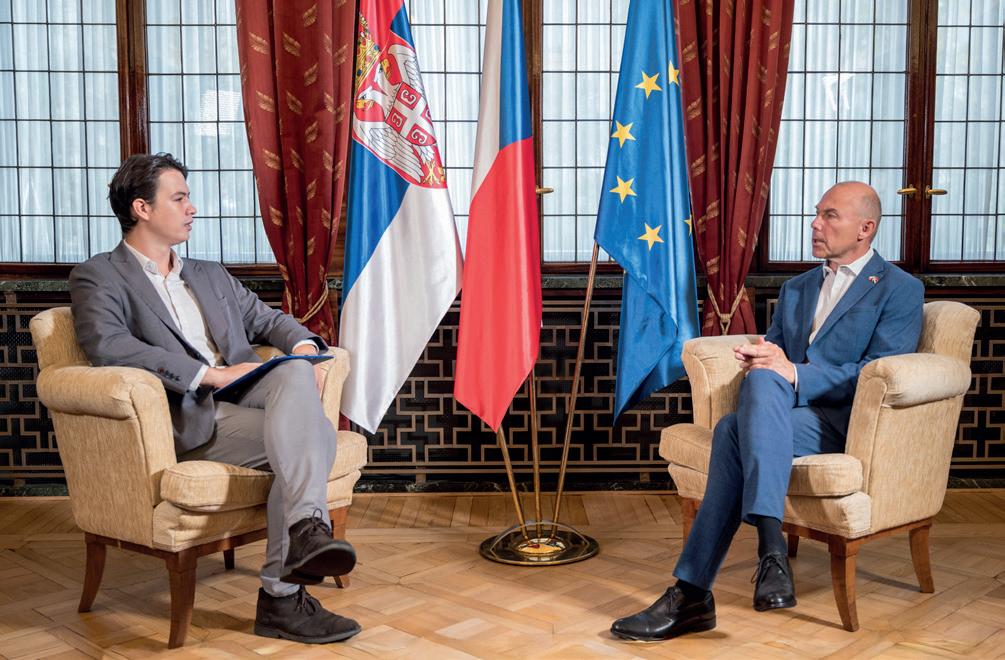
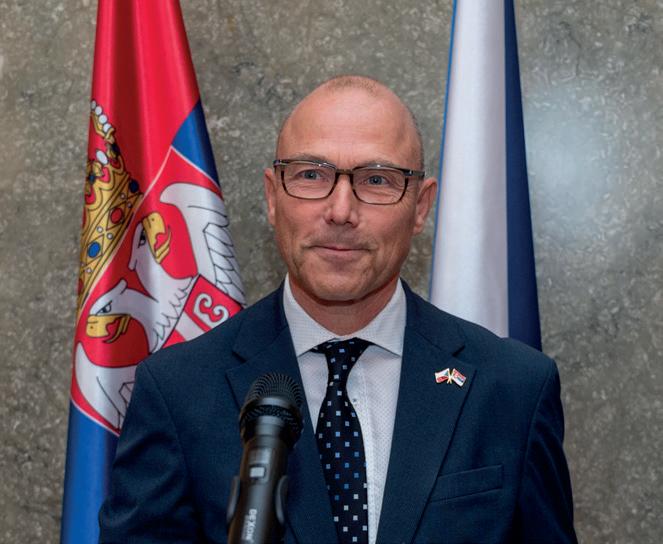
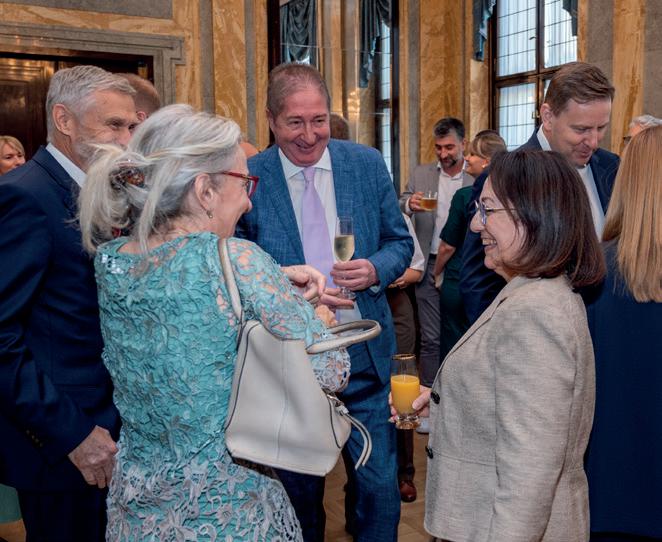
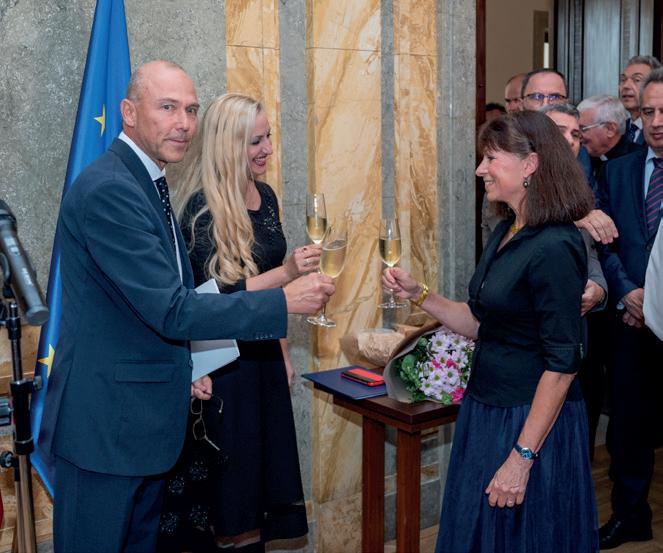
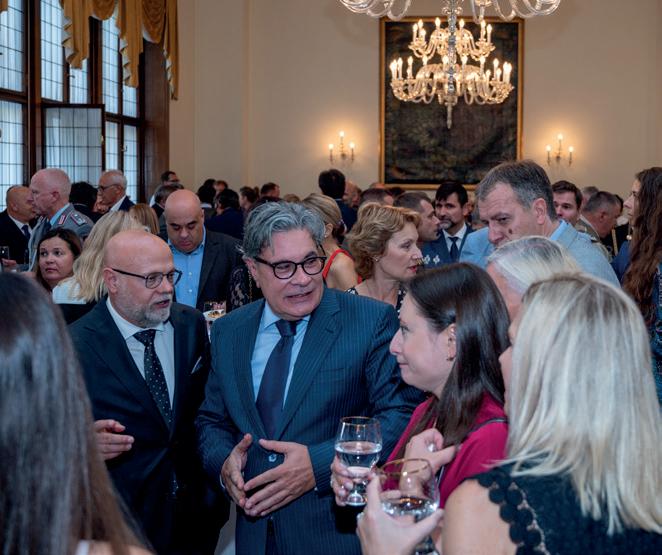
The Embassy of the Czech Republic in Belgrade ceremonially marked St. Wenceslaus Day, the patron saint of the Czech Republic, on 25 September St. Wenceslaus (Václav) was a 10th-century Duke of Bohemia, remembered for his just rule, deep faith, and efforts to strengthen Christianity in early medieval Bohemia. His tragic death in 935 made him a symbol of Czech statehood, moral integrity, and national unity.
St. Wenceslaus Day, traditionally celebrated on 28 September, is one of the most important dates in Czech history. It is closely connected with the Czech National Day on 28 October, commemorating the proclamation of independent Czechoslovakia in 1918 — two anniversaries that together embody the continuity
ST. WENCESLAUS DAY, TRADITIONALLY CELEBRATED ON 28 SEPTEMBER, IS ONE OF THE MOST IMPORTANT DATES IN CZECH HISTORY
of Czech statehood from its medieval roots to modern democracy.
This year’s reception was held in the Ladies’ Salon of the Czech Embassy, an elegant setting that mirrors the building’s historic dignity. The embassy was built in the 1920s on land
purchased by Czechoslovakia in 1923, and its foundation stone was ceremonially laid on St. Wenceslaus Day, 1925 — a symbolic act of friendship between the two nations. Designed by architect Alojz Mezera, the building combines Czech cubist influences with classical harmony and remains one of Belgrade’s finest examples of interwar diplomatic architecture.
Ambassador Jan Bondy, Ambassador Extraordinary and Plenipotentiary of the Czech Republic to Serbia, welcomed numerous guests from diplomatic, cultural, and public life. In his address, he highlighted the long-standing friendship between the Czech and Serbian peoples and reaffirmed the importance of dialogue, partnership, and shared European values.
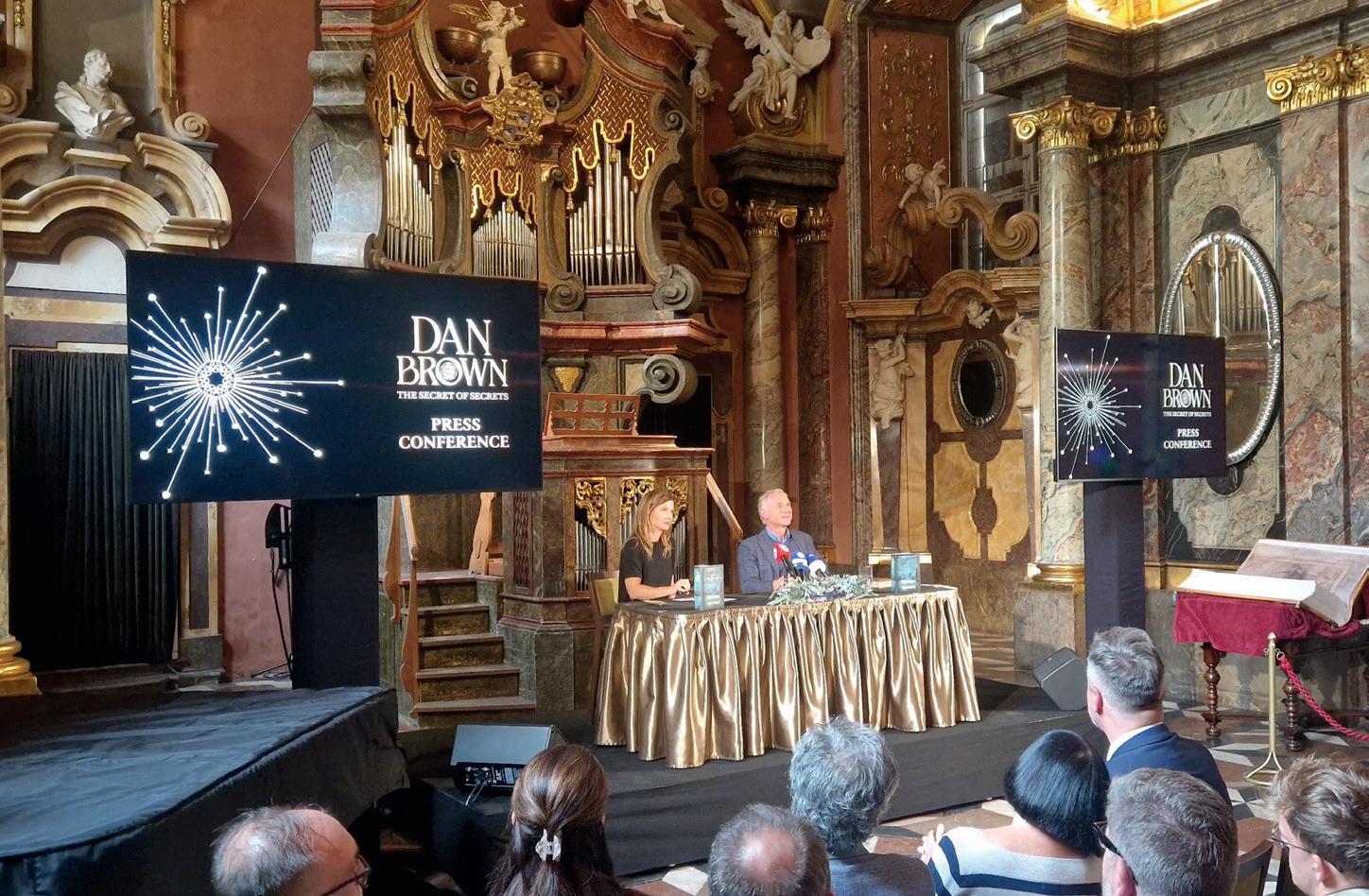
Fiction isn’t about finding out what happened. It’s about enjoying how it happens
The world premiere of Dan Brown’s new novel, The Secret of Secrets, took place on 18 September in Prague — the very city where the story itself unfolds. And Diplomacy & Commerce’s correspondent was there, at the right place and at the right time.
Robert Langdon finds himself in Prague, attending a lecture by his colleague and partner, noetic scientist Katherine Solomon. She presents the results of groundbreaking research offering new insights into the nature of human consciousness. But their work is abruptly interrupted by a series of dramatic events: a murder, Katherine’s disappearance, and the theft of a crucial manuscript.
PRAGUE HAS BEEN EUROPE’S MYSTICAL CAPITAL SINCE THE MIDDLE AGES
Langdon embarks on a quest that takes him across Prague, London and New York… When the Serbian edition of Dan Brown’s latest novel hits bookstore shelves this December, readers will finally discover how the story ends.
The global launch of The Secret of Secrets, the latest literary work by the celebrated Dan Brown, was held on 18 September in the Czech capital — the very setting of the novel itself. That evening, after arriving in Prague aboard an Air Serbia ATR, we took a walk
through the city centre. To borrow from Šerbedžija’s famous song, “drunks were falling outside instead of snow.” In other words, just half an hour before midnight, it seemed that no one in Prague’s centre was sober but us. On one billboard, I noticed an advert reading “Secret of Secrets Tour.” Quick-witted Czechs had wasted no time: they turned the author’s global fame into an opportunity, creating a guided tour of the very locations where the story takes place.
The next day, precisely at noon, we were seated inside the baroque Mirror Chapel within the Klementinum complex, right in the heart of Prague’s Old Town, waiting for the author to appear. The sound of the organ — meant to heighten the drama of the moment — mingled with the murmurs of journalists from around the world. Dan Brown appeared to a long round of applause, as Prague’s mayor, Bohuslav Svoboda, rose from the front row to symbolically present the writer with the “keys to the city.”
During the nearly hour-long press conference, we had the opportunity to ask Dan Brown everything we wanted to know about his new novel, as well as his views
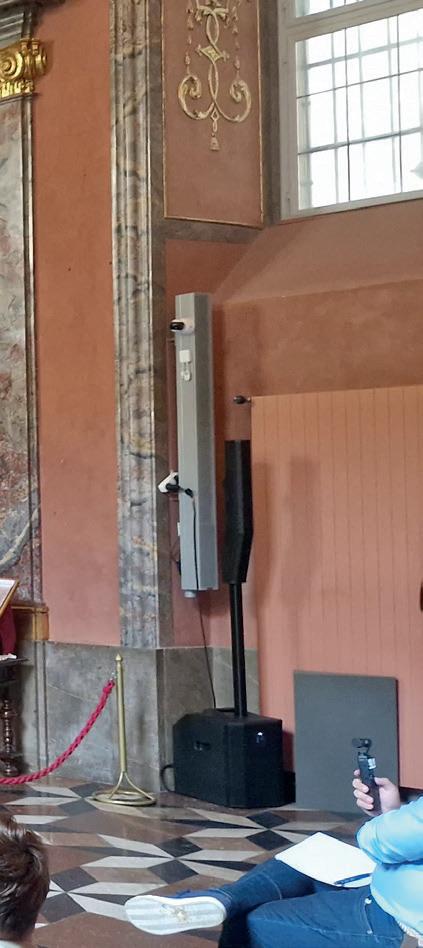
on life and the state of the world today. We learned, for instance, that earlier that morning, Czech President Petr Pavel had hosted the famous author for breakfast.
“I didn’t know it was going to be breakfast, so I had a giant omelette at the hotel,” Brown said with a smile. “When I arrived at the Presidential Palace and realised there would be food served, I told myself: please, anything but an omelette! Naturally, that’s exactly what was brought out. And since President Pavel was enjoying his meal so much, I had to join in.”
Brown has visited Prague seven times — the first was as a student with a rucksack on his back, back when the country was still Czechoslovakia. The city, which he describes as “Europe’s mystical capital since the Middle Ages,” had been under consideration for fifteen years as the setting for one of his books. A journalist from Poland asked whether he had considered any other locations besides Prague, and that’s how we discovered that in Krakow, there is a church with a striking blue ceiling adorned with stars of
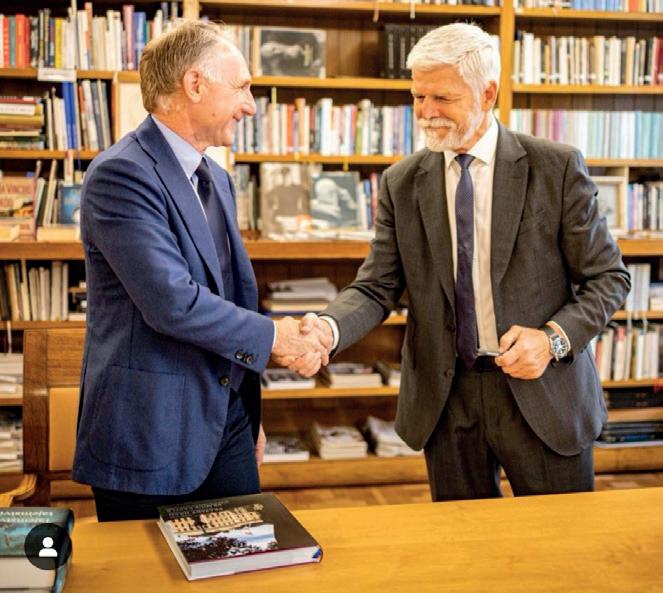
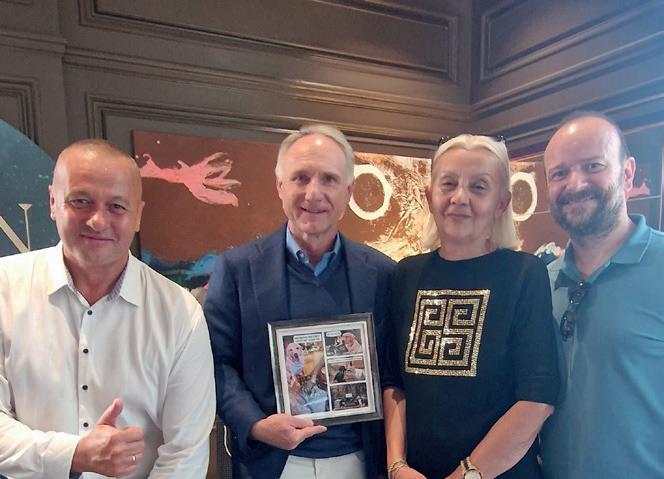
BASED ON THE SECRET OF SECRETS, NETFLIX WILL PRODUCE EIGHT ONE-HOUR EPISODES
symbolic meaning — a place that, as Brown hinted, might find its way onto the “shortlist” for one of his future novels.
Brown revealed that his fascination with the theme of human consciousness began after his mother passed away from leukaemia eight years ago. “If someone had asked me ten years ago what happens to human consciousness and the experiences we accumulate throughout life after a person’s death, I would have said — they simply disappear. That’s the end. Like switching off a computer,” Brown explained. “However, after my mother’s death and many conversations with experts in this field, I’ve grown increasingly convinced that when the body dies,
The next question concerned the main antagonist in the new novel — the American intelligence agency, the CIA. Reporters wanted to know whether the agency had tried to stop the book from being published or if it was keeping an eye on him. Brown smiled and replied, “Not that I know of!”
The celebrated author also reflected on the widespread belief that today’s world is “turned upside down” and that humanity is on the verge of catastrophe. “The human race has survived for thousands of years because we possess an innate sense of danger avoidance,” he said. “If you walk into a garden full of beautiful flowers and trees, but there’s a tiger in one corner, everyone will focus on the tiger — because our instinct is to protect ourselves from danger. That’s why I believe that, no matter how bad things may seem, humanity will endure the challenges we face today.”
The journalists present were tactful enough not to ask about the topic that had been filling both Czech and international headlines in recent months. Back in May this year, Dan Brown appeared in Prague with his longtime partner, Dutch equestrian Judith Pietersen (34).
In the past, the author had often stated that The Da Vinci Code might never have been written without the support of his former wife, Blythe, whom he once described as “the most talented woman I have ever met.”
human consciousness continues to exist in some form.” He added that this view is not rooted in religion — “I don’t consider myself a believer,” he said — but rather in scientific understanding. I wanted to know what he thought about streaming platforms as venues for film premieres, since The Secret of Secrets will be the first adaptation of his work to debut not in cinemas, but on Netflix. “My previous three books have all been adapted into films,” Brown told us, “and I can assure you — it’s not easy to turn a complex, multi-layered novel into a two-hour movie. Based on The Secret of Secrets, Netflix will produce eight one-hour episodes!” he revealed.
That was true until their divorce in 2018, when Blythe went so far as to file a lawsuit, claiming that Brown had led “a life full of lies.” Allegedly, he had four mistresses and had spent shared funds on gifts for them. The women were, according to reports, a personal trainer, a Caribbean politician, a hairdresser, and finally the aforementioned Dutch horse rider, to whom, as the press wrote at the time, Brown had bought a stallion worth 350,000 dollars, as well as a special transport truck for the animal.
Brown denied all allegations, insisting that his former wife had received half of everything they had earned together and that she had never been deceived. That was the “official version” — until the release of The Secret of Secrets, which opens with the author’s heartfelt acknowledgement of his fiancée, Judith Pietersen.
During his stay in Prague in May, Brown posted a photo on Instagram showing the couple
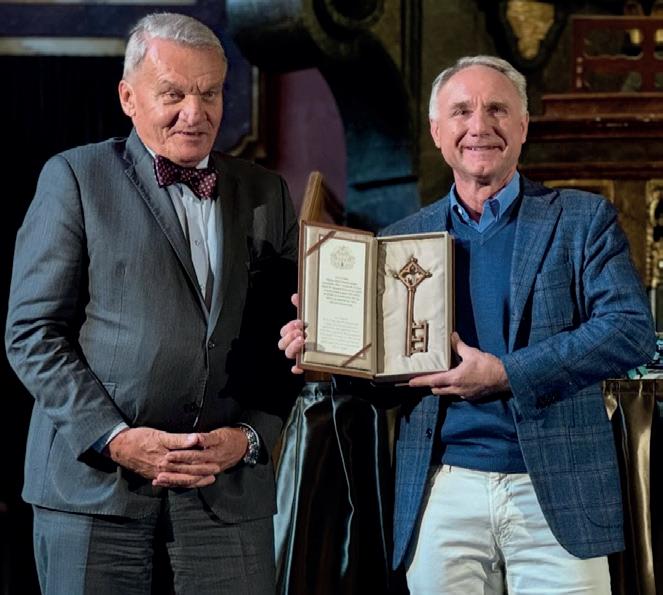
NO MATTER HOW BAD THINGS MAY SEEM, HUMANITY WILL ENDURE THE CHALLENGES WE FACE TODAY
strolling romantically across the Charles Bridge.
After the press conference in the Mirror Chapel, we had just enough time to sit in a garden café beneath Prague’s Astronomical Clock, enjoy a couple of Czech beers and gather our impressions before heading to the Four Seasons Hotel bar, where a “meet & greet” with the author had been organised.
Brankica Đukić, co-owner of Novi Sad–based publishing house Solaris, which publishes Dan Brown’s books in Serbian, presented the author with a framed comic strip drawn by her colleague Saša Radonjić. The gift visibly moved Brown — the strip even featured his beloved dog, Winston. Interestingly, Solaris has been Brown’s publisher since his very first novel, Digital Fortress (1998), long before he achieved global fame. And fortune smiled upon them — they have remained the publisher of one of the world’s best-selling authors of the 21st century.
That evening, a public event with the author took place in the grand hall of the Lucerna Palace, built in 1909. Hundreds of readers, holding tickets in hand, formed two long “snakes” stretching from either side of the palace, patiently waiting for their turn to enter. The host of the evening asked how many had already read the
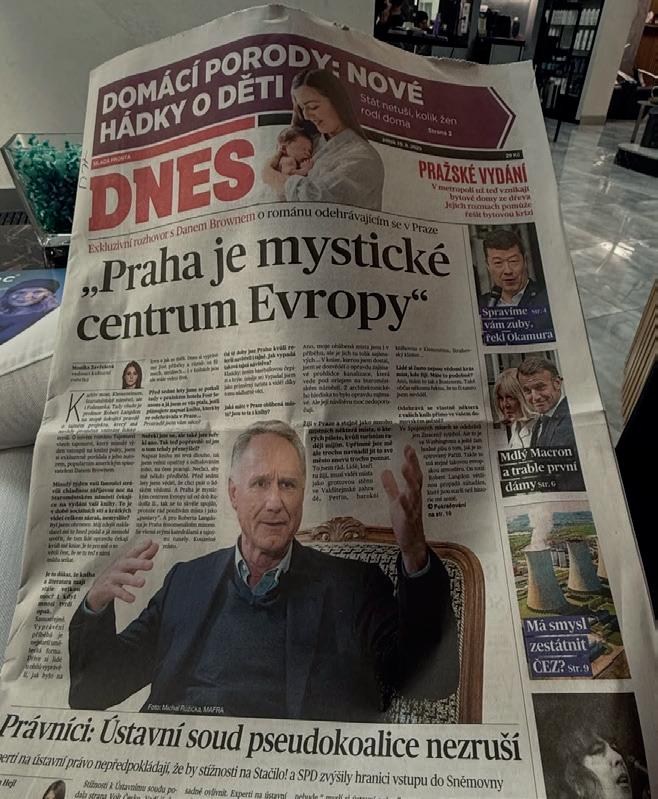
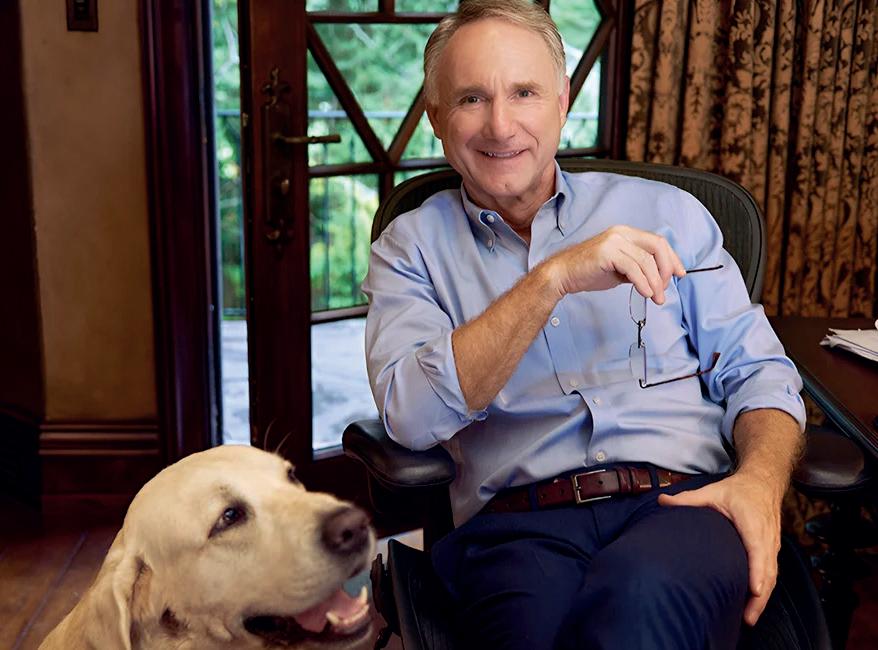
book, how many had just begun, and how many had bought it but hadn’t yet opened it. The raised hands revealed that Dan Brown enjoys a remarkably loyal readership in the Czech Republic.
Those who hadn’t yet finished the book were warned that the discussion would include spoilers, to which Brown responded with a grin: “Fiction isn’t about finding out what happened. It’s about enjoying how it happens. You don’t watch a James Bond film to see whether he’ll stop the villains from destroying the world and end up in bed with the most beautiful woman — you know he will! You watch it to enjoy how he does it.”
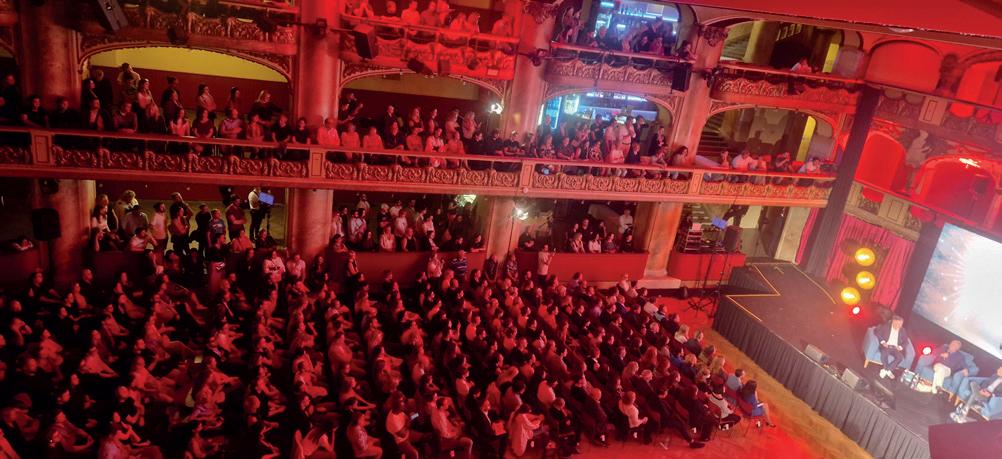
HILTON PRAGUE
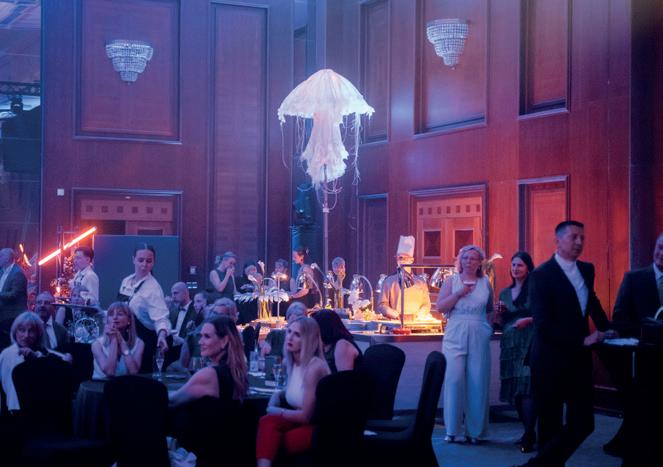
Every grand vision needs a space that allows it to breathe. For such events, there is a place in Prague that is adapted to them in both its architecture and its philosophy.
Hilton Prague was designed to allow even the most ambitious ideas to develop to their full potential.
The glass-walled, daylightfilled atrium alone is a monumental canvas for grand welcomes, informal gatherings, or site-specific installations. Imagine video mapping on the walls, the unveiling of a new car, or an art exhibition – the atrium is a stage that adapts to any story. For the largest productions, there is the Congress Hall, accommodating up to 1,500 delegates, with its high ceiling that can support even the most daring scenography. For social occasions, galas, and balls, there is the elegant Grand Ballroom, seating up to 650 guests in stylish surroundings, where every event gains a touch of prestige.
Hilton Prague offers 38 versatile meeting rooms and banqueting halls for events of all sizes, complemented by state-of-the-art technology and personalised service. A dedicated events team ensures that every detail is handled flawlessly, while the Business Center provides high-speed internet, full technical support, and secretarial services. Executive chefs design bespoke menus for each occasion, also catering for external functions. Through the Hilton Honors Loyalty
Programme, business travellers are rewarded for every meeting they host.
However, the true strength of Hilton Prague lies in its ability to connect everything into a single whole. The possibility of organising an event for hundreds of guests who can meet, dine, and subsequently stay under one roof is key for large-scale gatherings.
The hotel’s 791 modern and spacious rooms become elegant sanctuaries, providing comfort and privacy after a demanding day full of networking.
An integral part of any successful event is, of course, the gastronomy – and Hilton Prague offers an exceptional variety of dining experiences:
• Atrium Restaurant – A modern restaurant accommodating up to 450 people, offering an
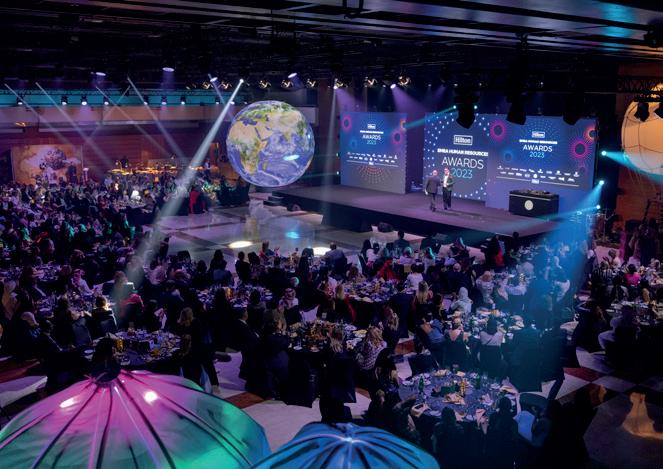
all-you-can-eat breakfast buffet to start your day. Ideal for group bookings for both lunch and dinner.
• Café & Bistro – Open 24 hours, 7 days a week, located in the grand Atrium Lobby with 150 seats. A relaxed yet stylish spot serving breakfast, snacks, and light meals throughout the day.
• Seasons – Featuring European cuisine with a Czech touch, this elegant venue embraces the essence of each season.
Fresh menus highlight locally sourced ingredients in an inviting open-kitchen setting, perfect for group lunches and dinners.
• Cloud 9 Sky Bar & Lounge – Prague’s first true sky bar, located 40 metres above the Vltava River. With capacity for 250 people, it offers panoramic
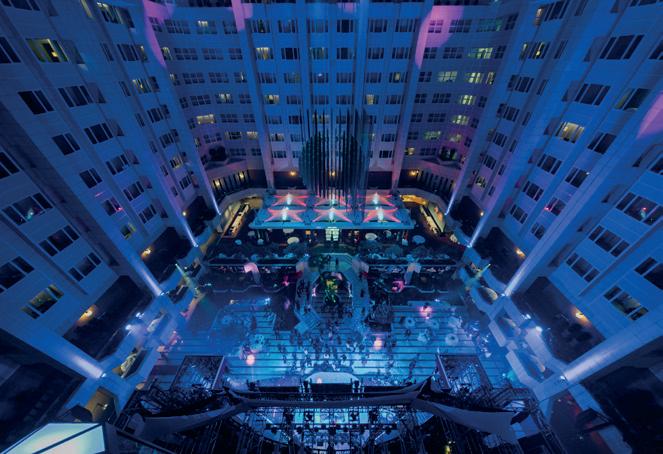
views, signature cocktails, and contemporary dishes – an ideal setting for exclusive parties or after-event gatherings.
• Hop House – A new bar where beer and atmosphere meet. Enjoy craft, draft, and bottled beers, live sports on six screens, and modern twists on Czech cuisine.
For wellness and relaxation, the 2,000 sq. m. Health Club & Spa provides one of the largest fitness and wellbeing spaces in Prague, featuring the latest gym equipment, an aerobics room, squash court, sauna, steam room, indoor pool, hair salon, and a spacious summer terrace.
Occupying a prime location on the banks of the Vltava River, Hilton Prague is within easy walking distance of the city centre and offers excellent transport links –Florenc metro station is just three minutes away.
With its strategic location in the heart of Europe, excellent connectivity, and a unique blend of history and modern infrastructure, Prague is an ideal destination for corporate and leisure events. The city’s vibrant atmosphere, high-quality hospitality, and cost-effectiveness make it a compelling choice for your next event.
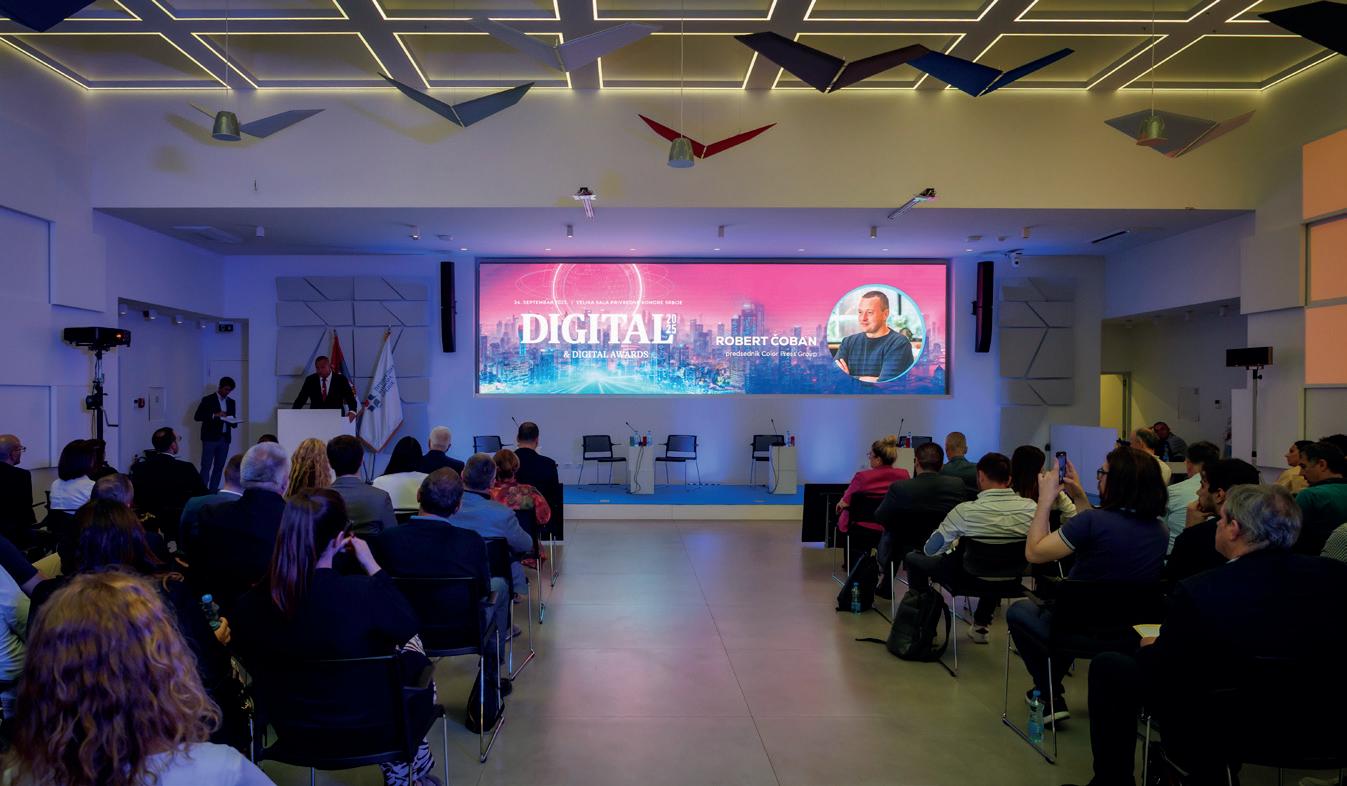
Belgrade, 24 September 2025 — The twelfth DIGITAL 2025 conference, organised by Color Media Events and Diplomacy & Commerce magazine with the support of the Serbian Chamber of Commerce, once again brought together key leaders from the digital industry, telecommunications, media and artificial intelligence across the region.
Throughout the day, government officials, representatives of international organisations and leading companies exchanged ideas and experiences about the future of digital technologies and their impact on the economy, media and society.
The conference was officially opened by Boris Bratina, Minister of Information and Telecommunications of the
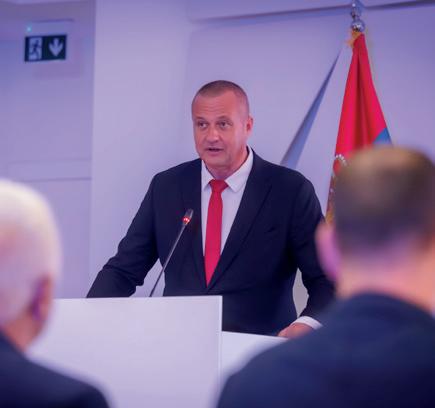
Republic of Serbia, alongside Predrag Nikolić from the Centre for Digital Transformation of the Serbian Chamber of Commerce, Tina Aničić from UNFPA and Robert Čoban, President of Color Press Group. In their opening remarks, they highlighted Serbia’s potential to become a regional leader in the field of digital economy and innovation.
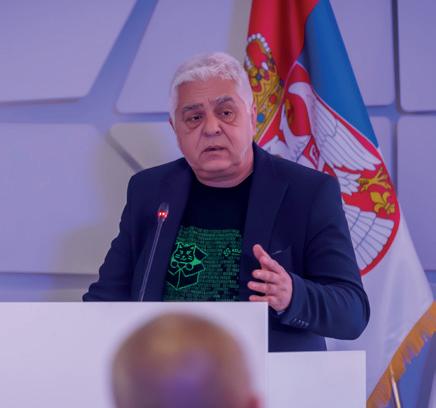
“It is a great pleasure to welcome you to the 12th Digital Conference. Looking at this year’s programme, it is clear how quickly and dynamically the field of digital technologies is evolving. The path we have travelled since our very first conference would take some other industries fifty or even a hundred years. This only shows how important it is for us to gather, exchange experience
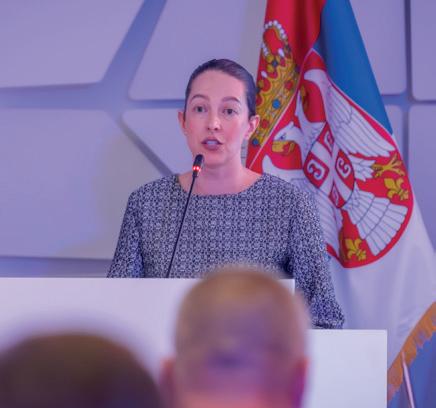
and keep pace with this extraordinary rate of change,” said Robert Čoban, President of Color Press Group, when opening the event and announcing the day’s programme.
“Since last year’s Digital, the Ministry of Information and Telecommunications has taken several steps in various areas. We have continued the rollout of broadband infrastructure in rural parts of the country — the so-called ‘rural broadband’ programme — to ensure every citizen of Serbia has access to fast internet. We have also advanced our work on strengthening cybersecurity systems in line with the National Strategy 2022–2026, because we believe digital development makes sense only if it is secure and fosters trust in digital services,” stated Minister Bratina.
The conference programme featured five dynamic panel discussions with more than twenty prominent speakers. Regional telecommunications leaders — Natali Delić (Telekom Srbija), Mike Michel (Yettel Srbija), Judit Albers (A1 Srbija) and Slobodan Đinović (Orion Telekom) — explored the future of network technologies and user expectations in the years to come.
Particular attention was drawn to the panel Leaders of the AI Revolution, where experts such as Aco Momčilović (Global AI Ethics Institute) and Nikola Kostoski (Dr. Max Serbia) discussed how artificial intelligence is shifting from being a competitor to becoming a vital ally to business and the creative industries.
The transformation of the content market was at the centre of the panel WhatWeWill(Not)Be Watching in 2026, where executives from leading TV and digital platforms analysed changes in audience habits and distribution models. The following session, Video Didn’t Kill the Radio Star, demonstrated how radio is finding
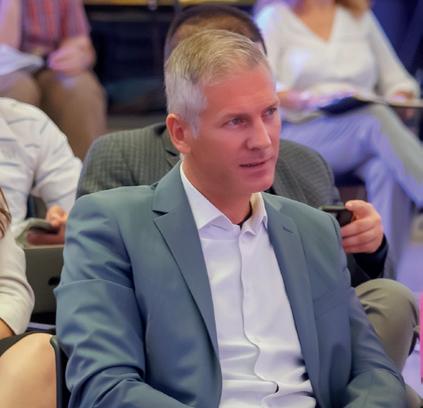
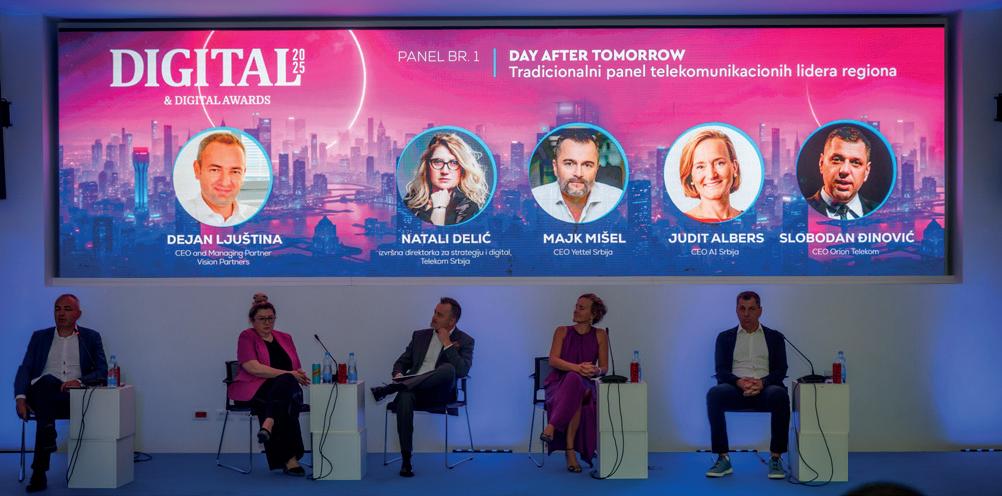
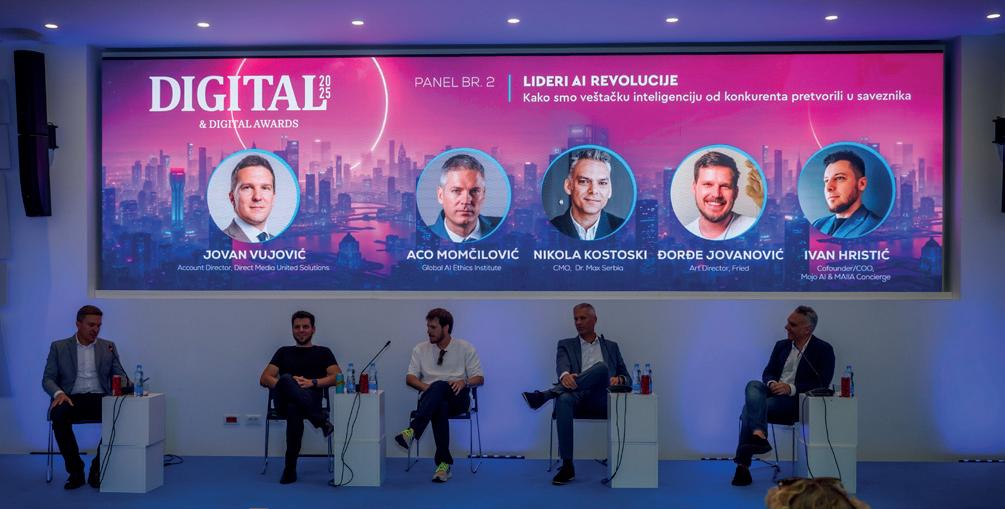
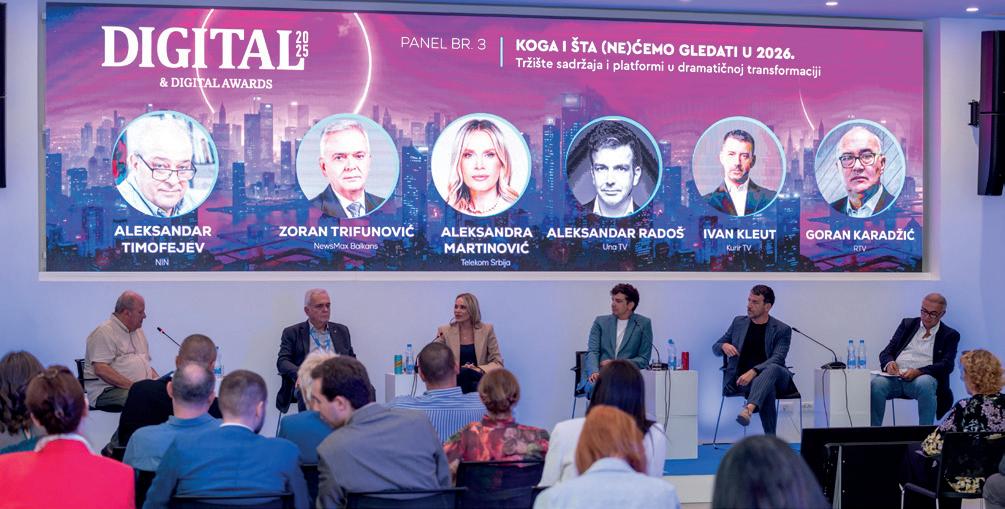
new channels and ways to engage listeners in the digital era, while the final panel, Fake, Deepfake, Deeper and Deeper…, tackled the pressing issues of accountability for brands, media and users in the age of AI-generated content.
The evening concluded with the presentation of the prestigious
DIGITAL AWARDS, honouring the best achievements in the digital industry for 2025, followed by informal networking at the After Work cocktail.
For the twelfth consecutive year, the DIGITAL conference has gathered top experts and delivered key insights into the direction of digital transformation in
the region, reaffirming Belgrade as a central hub for knowledge exchange and innovation.
The DIGITAL 2025 conference was supported by sponsors including mts, Yettel, A1, Star Channel, Orion Telekom, directmedia, Vision Partners and the Serbian Chamber of Commerce.
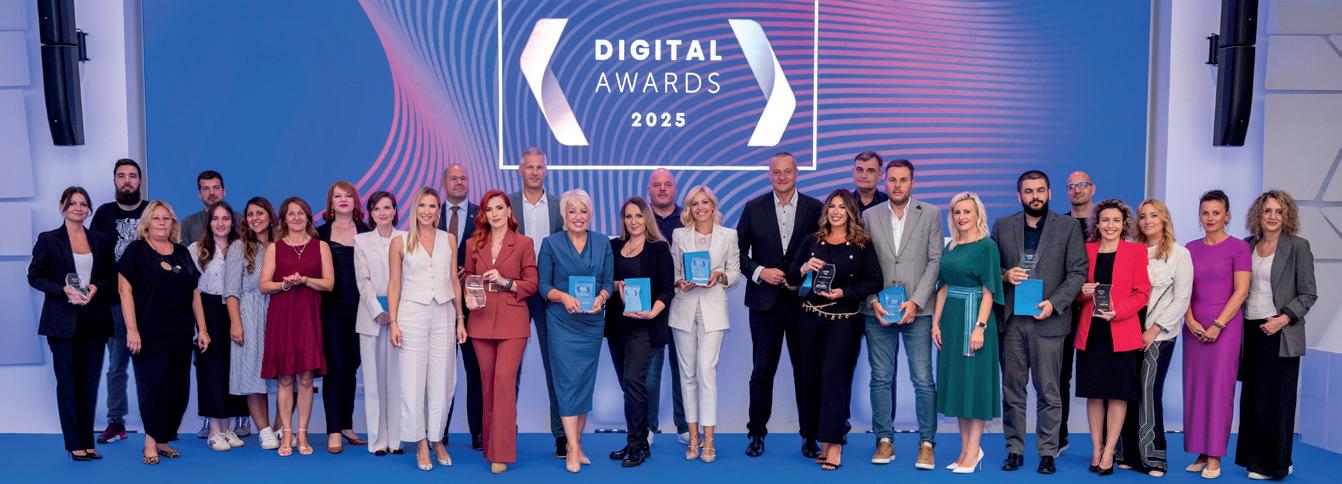
The regional conference on trends in telecommunications and media, “Digital 2025,” was held at the Serbian Chamber of Commerce in Belgrade, where the Digital Awards were presented for the third time.
The awards honour the best in the fields of media, telecommunications, marketing, PR, the ICT industry, and digital innovation.
In addition to 15 standard categories decided by the expert jury, three special awards were also presented.
The jury consisted of: Violeta Jovanović (NALED), Ivan Stanković (Communis), Marija Matić (Direct Media), Slavimir Stojanović (designer), Danijela Rakić (Serbian Association of Managers), Jelena Medaković (Director of the Belgrade City Museum), Dušan Jovović (multimedia artist), Željko Tomić (SPK “Privrednik”), Srđan Jerinkić (Challenge Rekonstrukcija), and Aco Momčilović (Global AI Ethics Institute).
Congratulations to all Digital Awards winners. We look forward to future laureates.
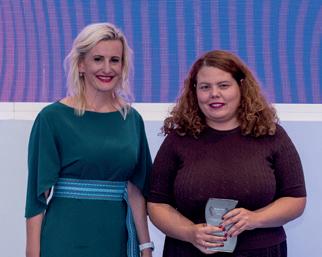
The award for Best Social Media Campaign went to Telekom Srbija for the campaign “The Best of Both Worlds”. Una Zabunov, Head of the Digital Marketing Communications Department at Telekom Srbija, received the award. The award was presented by Violeta Jovanović, NALED, and a member of the jury for the Digital Awards 2025.
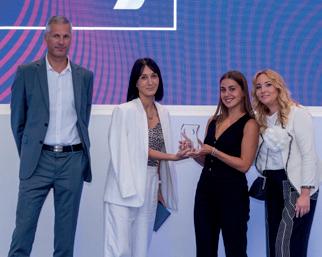
The award for BestRadioCampaign went to dm drogerie markt and the agency Direct Media for the campaign “dm #potpunoja”. The award was received by Anđela Vujačić (dm drogerie), Sanja Stojanović and Aleksandra Jovanović (Direct Media). The award was presented by Aco Momčilović, Global AI Ethics Institute, and a member of the jury for the Digital Awards 2025.
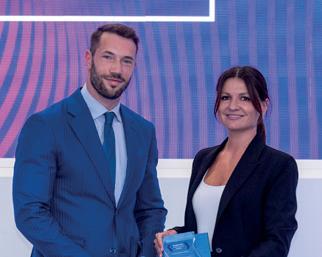
The award for Best Online Campaign was presented to Dukley Hotel & Resort for the campaign “Dukley Digital Transformation: Luxury in a New Dimension”. Olga Giniyatullina of Dukley Hotel & Resort received the award. Nikola Risović, a lawyer, presented the award.
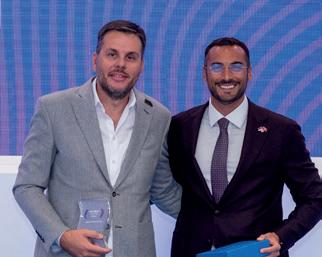
The award for Best Print Campaign went to Yettel Bank The award was received by Aleksandar Milić, Brand & Marketing Communications Director, Marketing Division, Yettel Bank. Aleksandar Goračinov, SME HUB, presented the award.
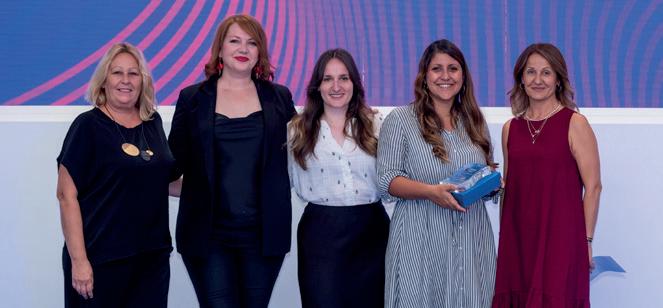
The award for Best TV Campaign had two laureates this year. Winners were: OMV and the agency Media Point for the campaign “VIVA Brazil Coffee”. The award was received by Rada Jocić (OMV) and Milica Đorđević and Dunja Slović (Media Point).
The second laureate in this category was Kurir Television with the campaign “Television for All of Serbia”. Aleksandra Majdarević Stamatović received the award. The award was presented to the laureates by Marija Radulović Tikvicki, Croatian Chamber of Economy Representative Office in Belgrade.
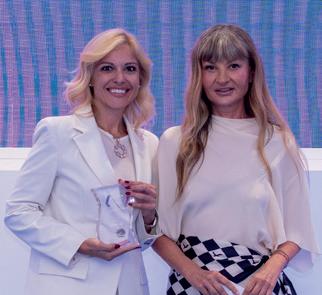
The award for Best Outdoor Campaign was presented to Air Serbia for the campaign “Today You Decide, This Fall and Winter You Travel”. Bojana Knežević, Head of Marketing and Corporate Affairs at Air Serbia, received the award. The award was presented by Duška Jovanić, a journalist.
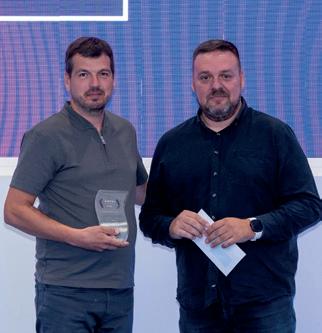
The award for Best Domestic TV Series went to “Ubice moga oca 7” (My Father’s Killers 7), produced by Dandelion Productions and Film Danas. The award was received by the series’ producer and director, Miloš Kodemo Igor Černiševski, IAB, presented the award.
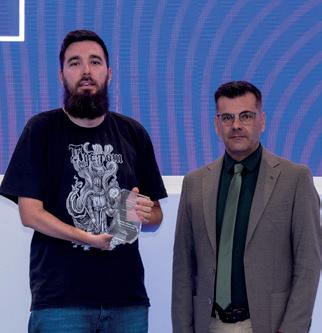
The award for Best Domestic Film went to “Volja Sinovljeva” (The Will of the Son), produced by Režim, Mir Media, Telekom Srbija, and the Film Centre of Serbia. The award was received by the film’s screenwriter and creator, Strahinja Madžarević. The award was presented by Dragan Nikolić, editor of Diplomacy & Commerce magazine.
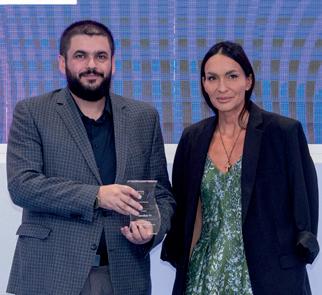
The award for Best Documentary Film went to “Bosniaks Between the Two World Wars” (Bošnjaci između dva svjetska rata), produced by Sandžak TV. The award was received on behalf of the laureate by Salahudin Fetić, Director and Editor-in-Chief of Sandžak TV and Director of Sandžak Media DOO. Irena Trifunović from MaxBet presented the award.
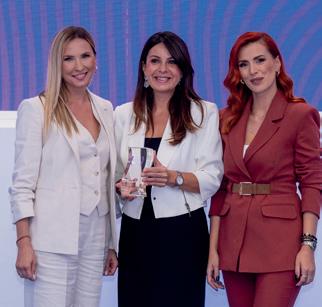
The award for Best Domestic News TV Program went to “Podne” (Noon), produced by Una TV. Marijana Tabaković and Bojana Bojović received the award. The award was presented by Svetlana Kostić, MK Group, last year’s laureate.
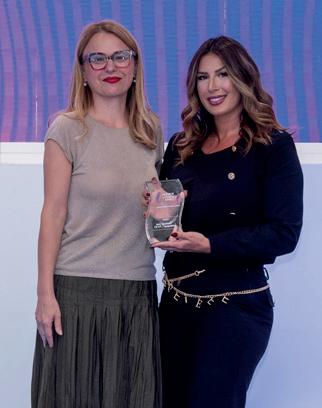
The award for Best Domestic TV Entertainment Show went to “Žena za sva vremena” (A Woman for All Time), produced by K1 The award was received by the show’s host, Ena Popov Danka Milošević, film and television producer, presented the award.
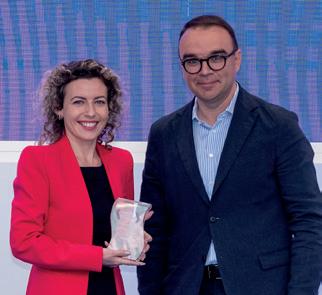
The award for CSRManagerofthe Year went to Marina Mijić, Head of the Sustainable Development Department at ProCredit Bank The award was presented by H.E. Aleksandar Vranješ, Ambassador of Bosnia and Herzegovina to Serbia.
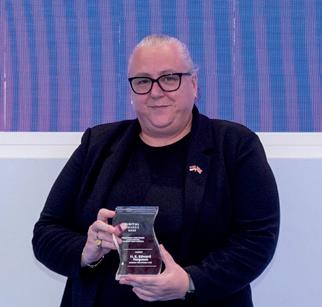
The award for Creativityand DecencyinSocialMedia Communication went to H.E. Edward Ferguson, UK Ambassador to Serbia, who addressed the audience via video link. The award was received on his behalf by Lara Bryden, Second Secretary at the British Embassy, and presented by Plamena Halacheva from the EU Delegation in Serbia.
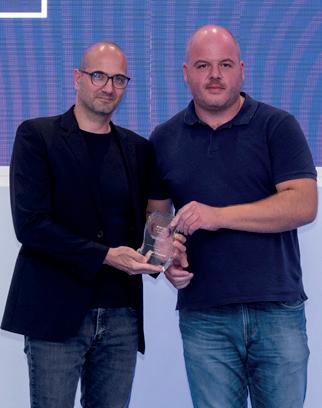
The award for Most Creative Social Media Management went to STAR Channel. The award was received on behalf of the channel by Marketing Manager for Serbia, Marko Dacić Srđan Jerinkić, a member of the jury, presented the award.
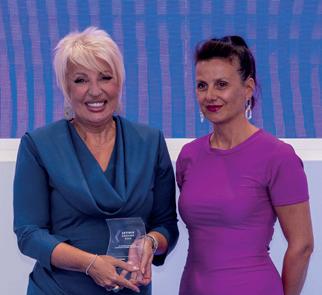
The Special Award for Advancing the Media Industry was presented to Maja Raković, Owner and Editor-in-Chief of Naxi Radio and President of RAB Serbia. Danijela Rakić, a member of the jury of the Serbian Association of Managers, presented the award.
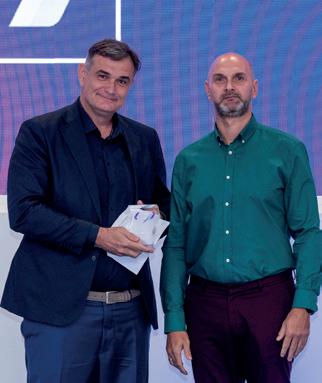
The Special Award for the Use of AI in Business went to Milan Đukić, Director of Novi Sad – Gas
The award was received on behalf of the laureate by Deputy Director of Novi Sad–Gas, Branko Božanić The award was presented by Marko Cvetković of ElevenS.
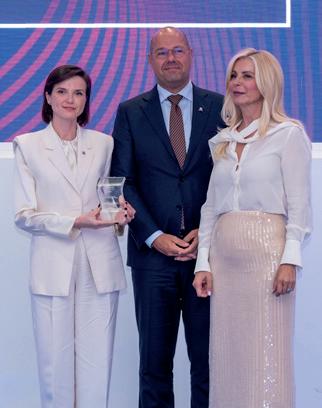
TheSpecialAwardforLaunching a New Brand went to St. Regis Hotel Belgrade. The award was received by Marc De Ruijter, General Manager of St. Regis Belgrade—award presented by: Svetlana Glumac, Telegraf.rs.
GABRIEL FELTZ (1971 – 2025)
In just 54 years of life, Gabriel Feltz left an indelible mark on the global stage as one of Germany’s most prominent conductors, with a versatile career spanning both opera and symphonic repertoire. From 2001 to 2005, he served as General Music Director in Altenburg-Gera, and from 2004 to 2013 as General Music Director of the Stuttgart Philharmonic. He was General Music Director of the Dortmund Opera and Chief Conductor of the Dortmund Philharmonic from the 2013/14 season until 2024/25, and in 2024, he took over as Music Director in Kiel. Feltz assumed the post of Chief Conductor of our Belgrade Philharmonic in 2017, to the delight of our musicians and all colleagues, who instantly gained not only a musical leader, but a close friend and ally. With our orchestra, he quickly began to achieve great success, celebrating each triumph only briefly before passionately and tirelessly devising new and greater challenges – with the same energy and persistence with which he stood up for and defended the Belgrade Philharmonic in its most difficult moments.
As soon as he took the helm of the orchestra, out of respect for his colleagues and for Serbian culture as a whole, Gabriel Feltz immediately began learning Serbian, winning the hearts of people across the country and becoming a favourite of the local media, with whom he insisted on speaking in Serbian. Beyond the Philharmonic, he adored Belgrade, as well as Serbian art and culture, which he absorbed with enthusiasm. Feltz approached every concert with childlike joy, transforming into a superhero during performances, offering the audience an unforgettable sense of elation, and
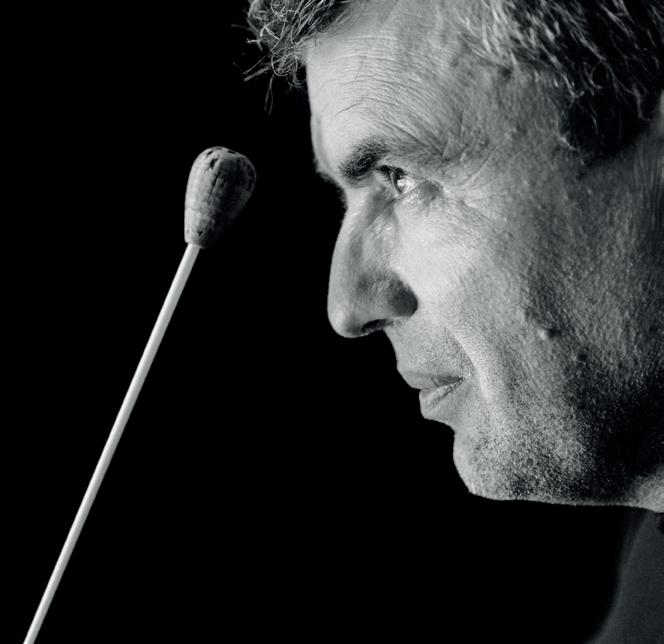
With profound sadness and heavy hearts, the Belgrade Philharmonic informs our colleagues, our audience, and the Serbian public that Gabriel Feltz passed away suddenly on August 29, 2025, at the University Hospital in Essen. t he untimely loss of our beloved and long-standing c hief c onductor is a tremendous blow not only to the Belgrade Philharmonic but to Serbian culture as a whole.
then modestly accepting their congratulations, having left his entire being on the stage.
With Gabriel Feltz, the Belgrade Philharmonic entered a completely new phase of development. He has earned his place in its century-long history as one of its most successful and important Chief Conductors. Under Feltz, the Philharmonic rose to the ranks of the world’s “heavyweight” orchestras, dramatically expanding its repertoire and significantly elevating its performance standards to a level of true excellence. More than anything, however, Gabriel brought an irrepressible
joy of music-making, despite the “German” discipline. He was the spiritus movens of the Philharmonic musicians, their steadfast support and a synonym for safety and trust. In recognition of his love, selflessness and dedication, the Philharmonic’s audience literally adored him –and made sure he knew it. Gabriel often proudly remarked that Belgrade boasts a first-rate orchestra on a global level and the best audience in the world.
With Feltz, the Belgrade Philharmonic performed outdoors for the very first time, brought opera to the concert
stage, organised special musical conversations, and introduced new trends in contemporary music. An unrivalled erudite, Feltz was a conductor of vast scope and grand ideas, through which he expressed his deep admiration for the works of composers such as Beethoven, Brahms, Bruckner, Mahler, Wagner, Strauss, Rachmaninoff…
In the Belgrade Philharmonic, he found his ideal partner for breaking established norms, reaching the highest artistic peaks through numerous marathon undertakings. As joint Chief Conductor, he united the Dortmund and Belgrade Philharmonics in the performance of the “Beethoven Marathon”, all nine symphonies in a single day, culminating in a unique “Ode to Joy” that brought together not only the two orchestras, but two cultures, in a powerful European message delivered in concert marathons in Dortmund and Novi Sad in 2022. This was followed by unforgettable Brahms and Mozart marathons at Kolarac. Still, no one could have foreseen that the triumphant Rachmaninoff Marathon in Dortmund this June 2025 – for which he once again united the Dortmund and Belgrade Philharmonics – would be the final work of this great conductor’s life.
Dearest Gabriel, it will take immense strength to come to terms with your departure, but what you have given us will live forever in our music. You gave us a new perspective, a firm selfconfidence for which we will continue to fight, and an endless well of love that will warm us with every note we play. We will always have our Bells, our Tosca, our Eroica, Bruckner’s Seventh, literally every Mahler we performed… Although finite, that list is vast – and eternal.
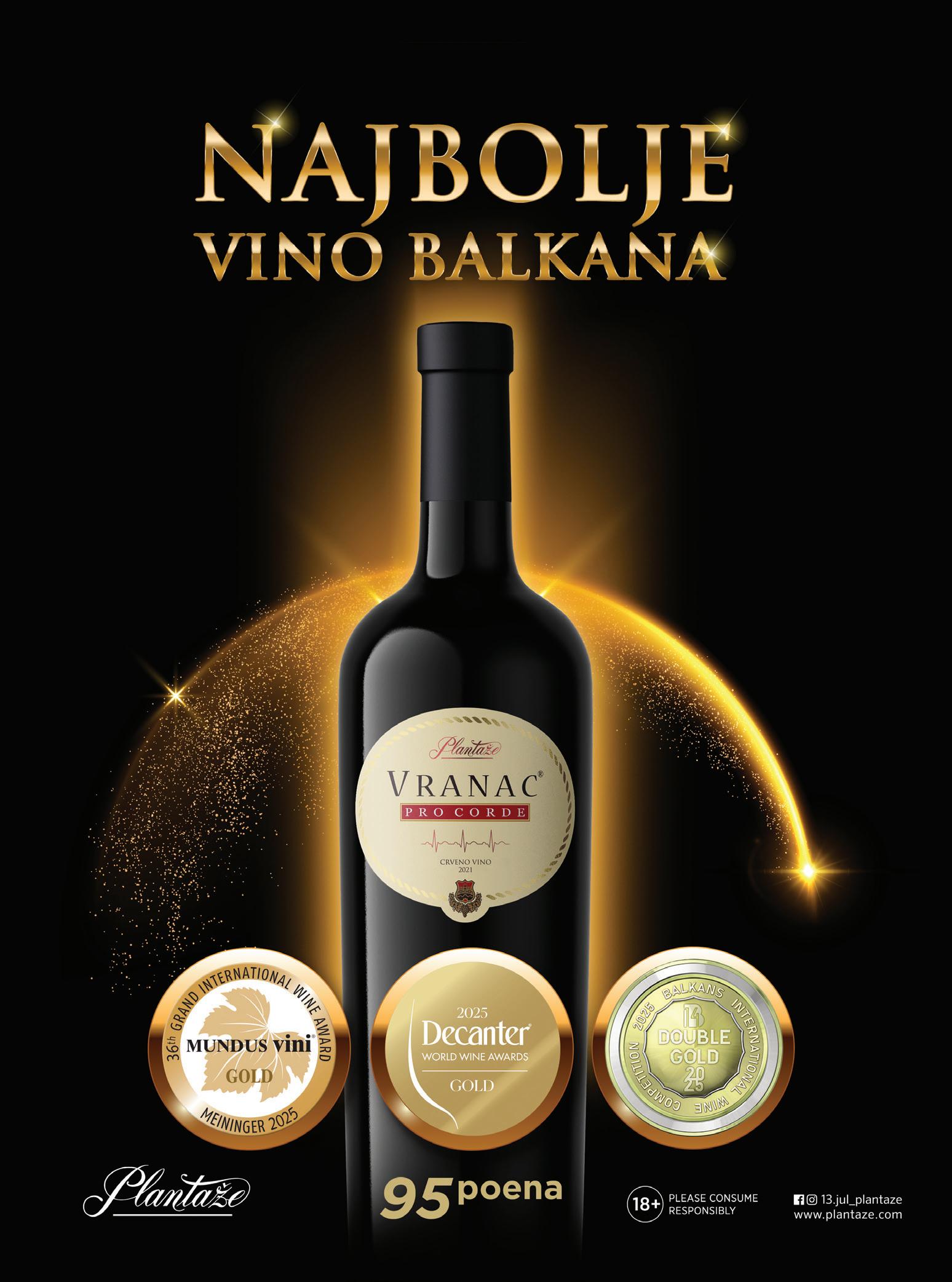
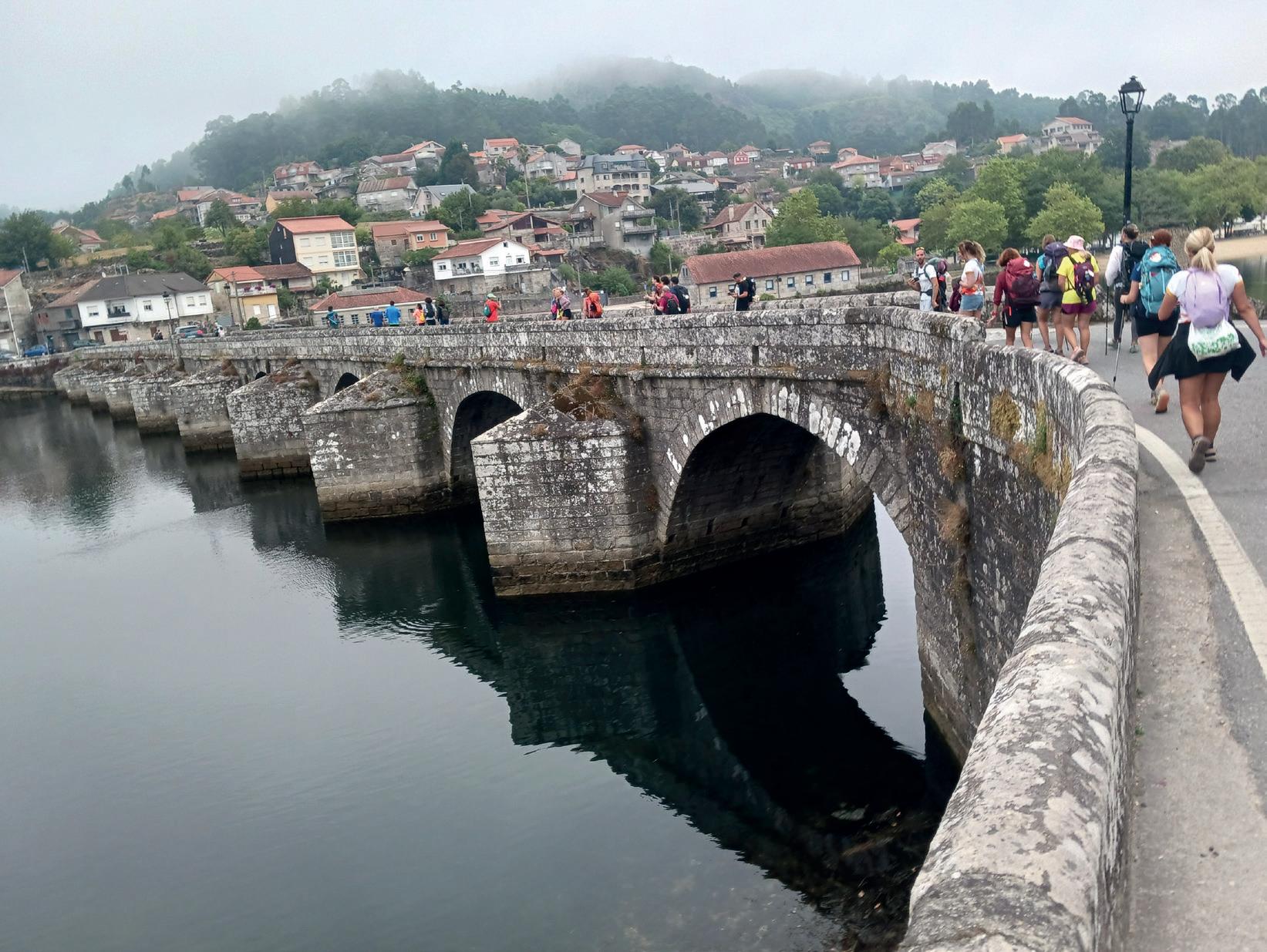
c amino is not tourism – It is a path to self-discovery
Cof the soul. It is a challenge that strips you of distractions, confronts you with yourself, and invites you to walk in peace, take stock of your life, and make new decisions. It is, quite literally, a path.
When people ask me if it was hard or whether I ever thought of quitting, I realise that the real Camino for me happened long before I set foot on the trail. It was in my city, in my bed, in my own head – a hellish storm of thoughts, dilemmas, doubts, and attempts to prevent problems I imagined were waiting for me. I knew the challenge was immense, and I refused to give up after just a few sleepless nights or a bout of aching muscles.
At the end of last year, I decided that the coming year would see me spending far more time in nature, no matter the weather. One winter’s walk through Fruška Gora, I heard a woman I didn’t know say to me, “You should go on the Camino this year…” I am not one to trust voices from nowhere, meant only for me, but as I crunched
HAPPENED LONG BEFORE I SET FOOT ON THE TRAIL – IN MY BED, IN MY HEAD
through the fresh snow, I felt the blaze of the Spanish sun and a summer that was still months away. I thought: “What an adventure that would be… and why not…” And just like that – not at all like me – I decided without a second thought: “I’m going! To see what I am truly capable of…” Yes, my joints ache, I struggle with sleep, and I am not exactly in peak condition.
That was my thinking until summer finally came, bringing with it suffocating June heat and scorching days when even night brought no cool relief. Suddenly, I doubted whether I could master even the challenge of sleeping in my own air-conditioned flat, let alone a night in dormitories with twenty or thirty beds. Still, I kept
My daughter gave me a copy of Marina Juranić’s Confession on the Road to Santiago, and the further I read, the braver I felt. The journey began to take on a tangible form. I gathered a borrowed backpack, a headlamp, a power bank, and oversized noise-cancelling headphones meant to shield me from dormitory noise. I treated my feet to brand-new Salomon trekking shoes, packed a sleeping bag, woollen socks and underwear that promised to keep me calm. I stocked up on vitamins to keep me healthy, electrolytes, and Compeed blister plasters for the road, and sleeping pills that, alongside earplugs, an eye mask, and lavender oil, were my only hope of rest.
Ten days before departure, I walked 30 kilometres for the first time in my life – as much as we would need to cover on the longest days of the trek – to see how it felt, aware that I was a recreational walker rather than a serious trekker. A few days later, I hiked with a packed rucksack

– as it turned out, much lighter than it would be when weighed at the airport before flying to Porto. I even treated myself to a few massages to relax my muscles and, in the end, I felt I had done everything I could to prepare. And I should not forget – alongside my family, who supported me wholeheartedly, there was ChatGPT, constantly encouraging me and repeating: “Focus only on this one day, this one step, on what you see in front of you…” I loved its mindful approach, and I often turned to it.
The starting point of our “Portuguese route” was the beautiful cathedral in Porto, where we received our pilgrim’s passport and the scallop shell that now hangs on my wall – the unmistakable symbol of those walking to Santiago de Compostela. The passport is essential, as it is stamped at every stop along the way, providing a true record of your journey. Beyond being a cherished keepsake, it also serves a practical purpose in the albergue, the pilgrim accommodation, as proof that you are indeed walking the route and not just passing through as a tourist.
Whether we were truly pilgrims or merely tourists is hard to say. We were a group of nineteen, led by Ljubica Selaković Bandić and Žarko Atanasovski, now at the helm of the “Montanika” mountaineering club, and none of us were pilgrims in the traditional sense of the word. We wanted to walk, to be in nature, to claim a little space for our thoughts. Perhaps that is enough. Yet, the one who first carved out this path might not agree.
St James was an early Christian who, in the year 44, came to the Iberian Peninsula to spread the teachings of Christ. Preaching love for one’s neighbour and forgiveness, he travelled as far as Finisterre – whose name itself means “the end of the world” as it was known to medieval people (and where we too would eventually arrive, though with the help of modern transport, since the end of our route was Santiago de Compostela). After his martyrdom in Jerusalem, the remains of the apostle were brought back to Spain by his companions and buried where Santiago stands today. For centuries, his bones lay hidden until one night in the ninth century,
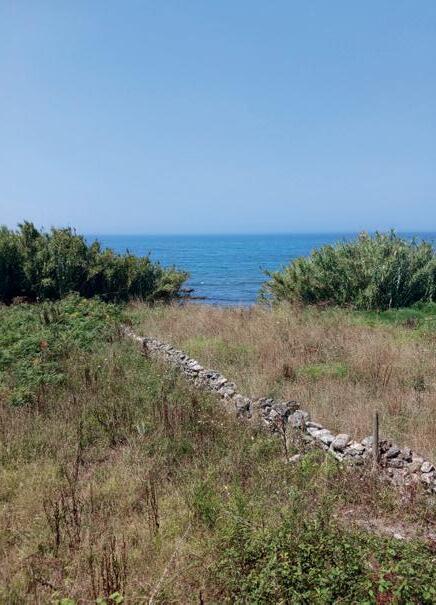
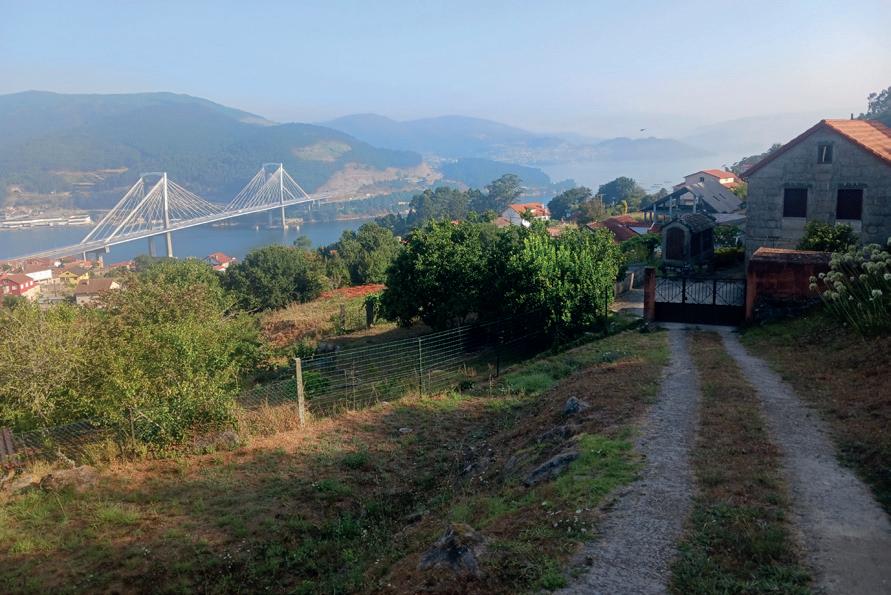
CAMINO IS A STORY OF ANTI-COMFORT – PROOF OF HOW LITTLE WE TRULY NEED
thousands of stars appeared to light up the sky above them, spotted by a shepherd. A small chapel was built on that spot, growing larger over the years until it became the monumental cathedral that can be compared today only with St. Peter’s Square in Rome.
Legend has it that the king who recognised the significance of this vision became the first pilgrim to the new shrine. After the first church was built in 829, a new pre-Romanesque one was constructed in 899 by order of King Alfonso III of Asturias, and the settlement slowly grew into a major centre of pilgrimage.
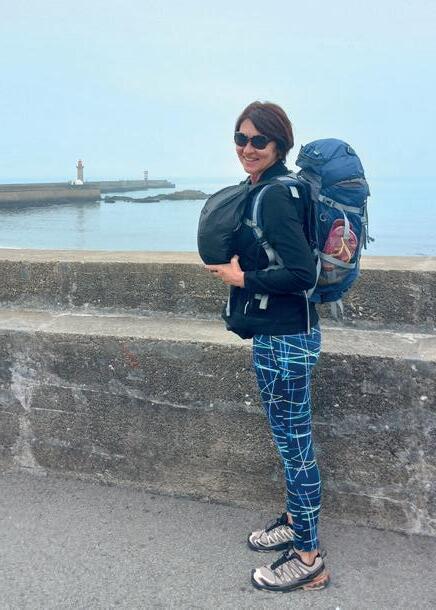
In 997, the early church was reduced to ashes by Al-Mansur ibn Abi Amir (938–1002), the military commander of the Caliphate of Córdoba. The doors and bells, carried by Christian captives, were taken to Córdoba and placed in the Great Mosque of Córdoba. Construction of the current cathedral began in 1075 under King Alfonso VI of Castile (1040–1109) and under the patronage of Bishop Diego Peláez. It was built to the same plan as the brick-built Basilica of St Sernin in Toulouse – likely the largest Romanesque building in France – but made mostly of granite. Work was interrupted several times, and the final stone was laid in 1122; however, the cathedral was not completed. It was consecrated in 1128 in the presence of King Alfonso IX of León.
It is believed that the cathedral is the work of Master Bernard the Elder and his assistant Robertus Galperinus, and possibly later Esteban, who worked on the cathedral’s final phases. Bernard the Younger completed the last stage, while Galperinus coordinated the work and built
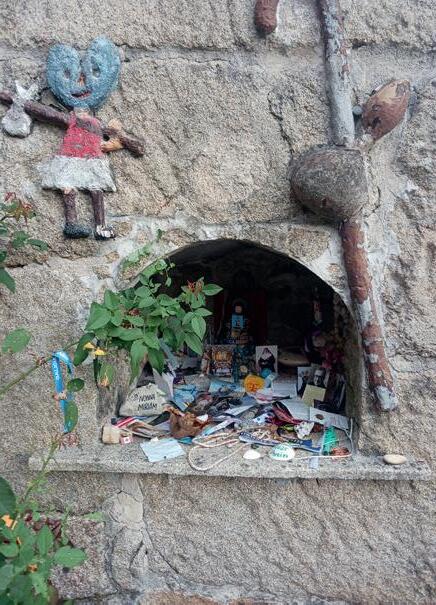
the monumental fountain in front of the north portal in 1122.
The church became the seat of a bishop, and its growing importance as a pilgrimage centre led Pope Urban II to raise it to the status of an archbishopric in 1100. A university was added in 1495. The cathedral continued to be decorated and expanded between the 16th and 18th centuries. After that, pilgrimage declined during the Enlightenment, only to be revived in the 1980s, in an era that promoted walking, physical activity, and healthy living.
Encountering the square full of pilgrims and walkers who had arrived before us was truly moving. Even if you are not deeply religious, the space forces you to face yourself, to confront what you carry within you and what you have wrestled with on the road leading to the cathedral. What disturbs such a sacred moment, however, is the modern urge to capture every instant of life through photos and videos, prioritising the recording of the moment over actually living it. I had hoped to have time later, once I had separated from the group, to reflect on my own – and I did. That same afternoon and the next morning, I sat with my rucksack and thought about myself, stronger and more capable than I usually believe myself to be.
“This Camino is not just a path – it is a mirror of life, with all its burdens, doubts, and moments when strength falters and the soul needs a reason to keep going. Every stone beneath your feet reminds you that freedom is not given but earned,” said our guide Ljubica. She was right. She was also right when she told us we would deal with problems as they came and that there was no need to wrestle with them too far in advance. This was an important lesson for me, as I tend to pour far too much energy into preventing problems and overthinking situations that may never actually happen. And it is true – almost unbelievably so – that it is much easier to face problems when they actually arrive than to battle them as shapeless fears hanging over you, causing needless anxiety.
On this journey, for example, I was terrified of bedbugs. I spent so much time thinking about
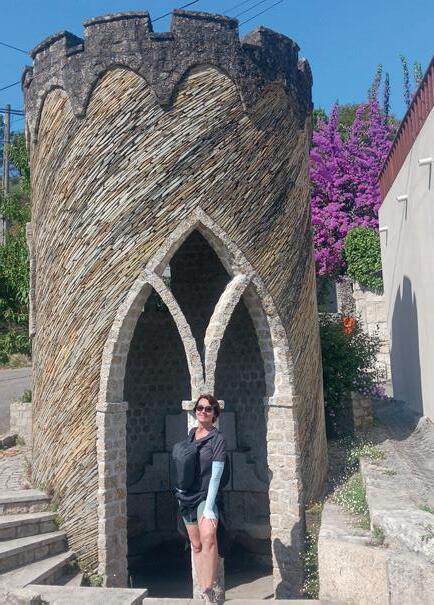

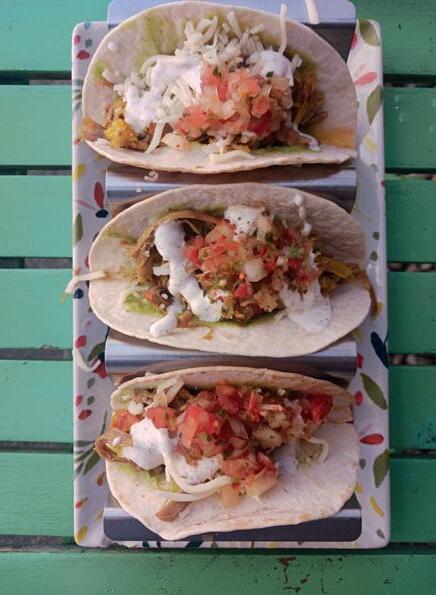
EVERY STONE BENEATH YOUR FEET REMINDS YOU THAT FREEDOM IS NOT GIVEN BUT EARNED
them, reading about them, figuring out which repellents were most effective, how to find them, and how to apply them safely without poisoning myself. Pilgrim hostels are very busy, allowing guests to stay only one night (because they are meant for walkers, not those taking a rest day), and by their very nature, they are low-cost –around fifteen euros per night – which makes them difficult to keep spotless. Bedbug stories circulate constantly. Pilgrims resort to every possible trick: spraying their rucksacks and sleeping bags with special insecticide (not available in my country), carrying anti-bug liners,
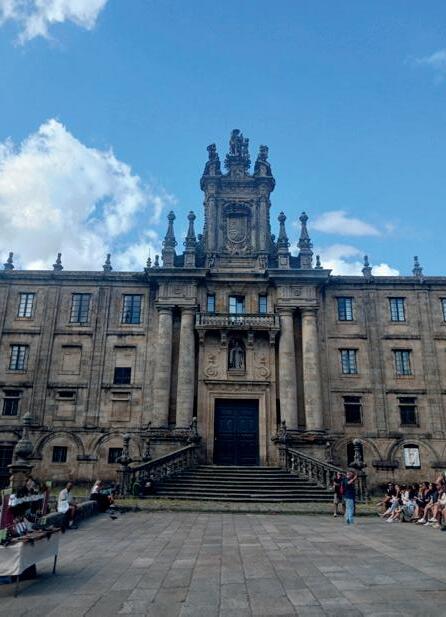
or putting their faith – wrongly – in herbs. I ended up doing just that, rubbing lavender oil on myself before bed. And yet, one morning at first light, I discovered I was covered in bites. Still, I kept walking. I grumbled a little, treated the bites with creams, and took two antihistamines; the angry red marks began to fade. One of the situations I had feared most had come to pass – and somehow I got through it, or perhaps it resolved itself. Back home, that fear had been so intense that, had I known it would really happen, I might have given up the whole idea; it was almost on par with my dread of sleeping in large dormitories.
I am the sort of person who happily pays extra for a single room, however expensive, to have privacy and comfort. Camino, by contrast, is a story of anti-comfort – a reminder of how little we truly need. The realisation that you can survive seventeen days in dormitories and shared bathrooms, arranging shower times together, washing and drying clothes with others, repacking excess gear into shared bags – takes you back to the communal life of early human society. And admit it, we all sometimes wonder what that might have felt like. And I must admit – it feels good. The feeling that I can not only sleep in a dormitory but rejoice at finding a socket and a tiny reading light next to my bed. That I can live with just two pairs of underwear, yet always be clean because I wash and dry one pair the moment I arrive at the hostel. The discovery that I can survive without “all those things” is minimalism in its purest form, proof that we have all burdened ourselves with too many supposed necessities and dread situations where we might have to go without them. My Camino experience taught me that you can get by with almost nothing. The one civilised habit I never abandoned was my morning coffee – often prepared with lukewarm tap water or even under the shower – which I would carry with me at dawn as we set off for the next destination.
Now, while I am still in my post-Camino blues, I keep thinking about – as Jasmina so beautifully put it – the daily nomadic rhythm of our
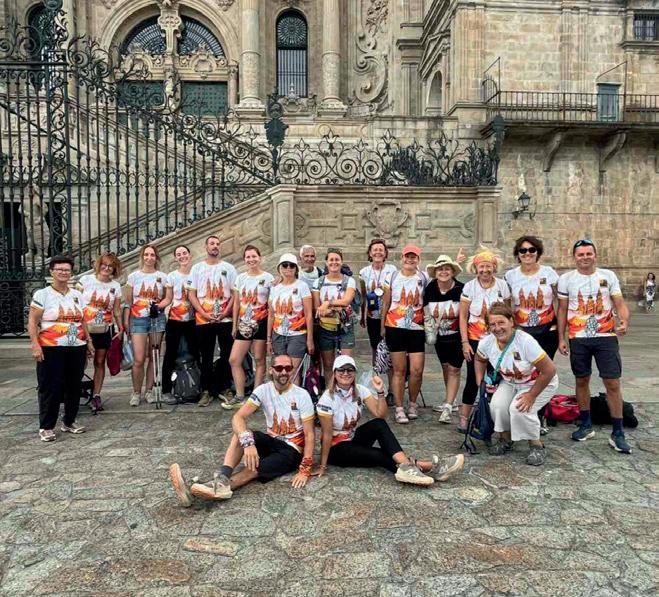
ancestors, moving from one shelter to the next, for whom the very act of finding a new place to stay was the sole goal and ultimate source of dopamine.
And then there was the second extraordinary gift – the nature we walked through. In Portugal, we strolled along the ocean shore, almost always on flat paths, often on boardwalks edged with ropes. The ocean foamed in the distance, crashing against the rocks, with salt and sand floating in the air. Dawn took its time to arrive, and the early wake-up calls and departures in the dark carried their own magic. I rarely get up that early, so watching the world as it woke and, it seemed, came into being again was a blessing. The small towns we passed through were still cloaked in darkness and felt like they belonged only to us. Roosters crowed as we crossed farmland, and every tree and blade of grass was wrapped in stillness. These images are perhaps the first that come to mind when I think of the Camino. When we crossed into Spain, we were greeted by the
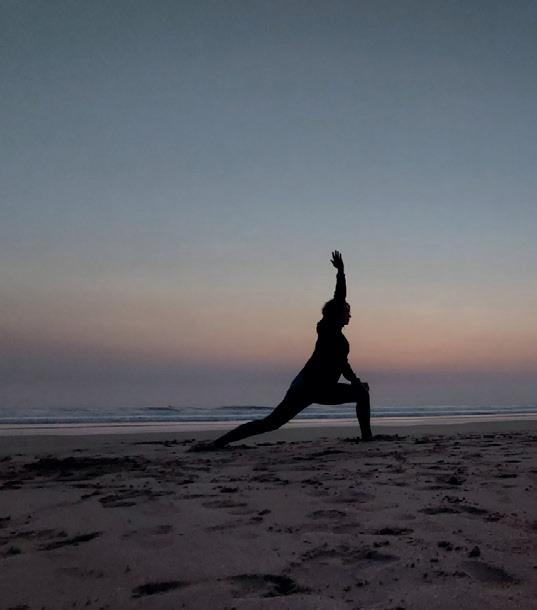
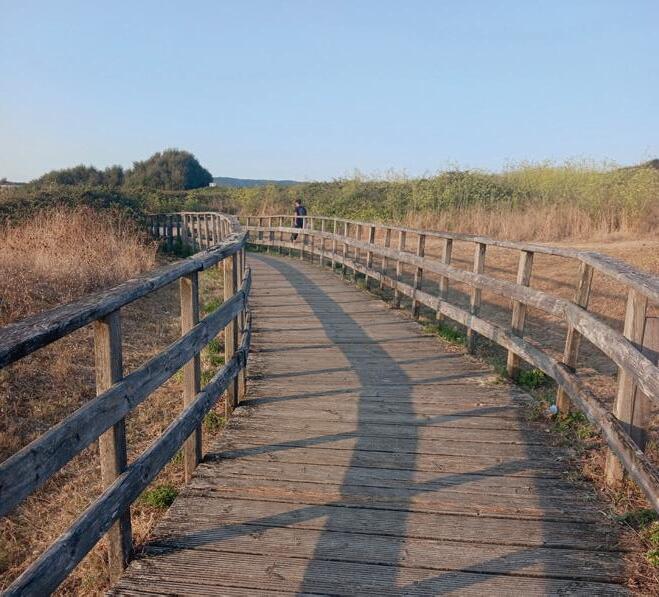
rolling hills of Galicia, featuring its beautiful and vibrant landscapes and charming villages.
CAMINO IS LIFE IN MOTION – SILENCE, STRUGGLE, AND THE OPENING OF YOUR HEART
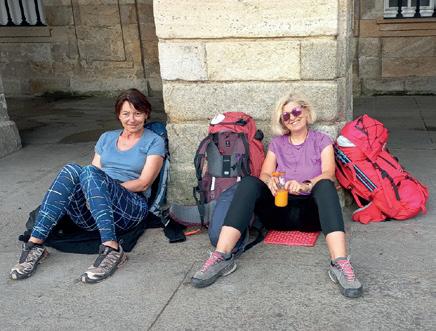
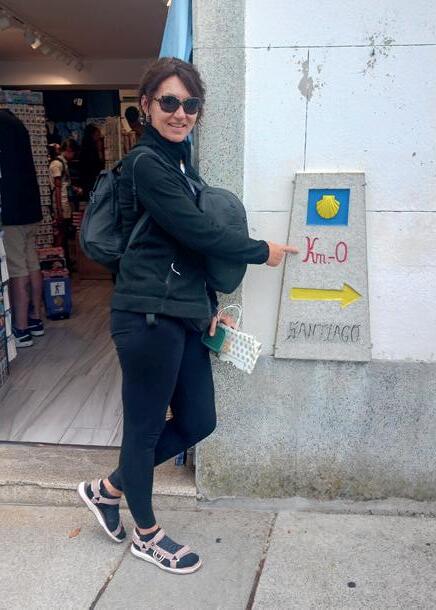
The route was exceptionally well-marked, so we could not have lost our way even if we had walked alone, as most people do. Apart from ours, the only groups of pilgrims we encountered were Italian, just as cheerfully noisy as we were. When the kilometres to the destination dropped below one hundred, people would often pose for photos next to the stone markers that matched their age. Our guides had walked the entire French Way in 2023, leading the first Serbian group to complete this long route. The French route is classic, crowded, full of people, small monasteries, and history, offering a deep sense of shared tradition. Our Portuguese route, being much shorter, was more intimate, quieter, and featured more natural and coastal scenery. It gave us the feeling of a personal journey, of freedom and of setting our own pace.
“Camino is not tourism or a holiday… it is more than a route. It is life in motion – the silence and noise of your own thoughts, the struggle with fatigue, with blisters, with the limits of your body… but also the opening of your heart, the unexpected friendships, the sense of freedom. Camino demands sacrifice and patience, but in return, it gives you inner peace and a strength that is hard to put into words. Tiredness comes, but so does the joy of knowing that each day brings us closer to the goal – both the outward one and the one within. No one is truly tired – we are all moving towards the finish!” Ljubica and Žarko would remind us. They were aware of something I had not fully realised – that perhaps the greatest challenge of such a journey is finding your place within the group and learning to live with eighteen strangers with whom, in many moments, you share deeply personal experiences.
And now, as I think about the next challenge and the next journey, the small, picturesque towns pass before my mind’s eye – La Gruge, Agucaudora, Caminho, Marinhas, Viana do Castelo, Mougás, Baiona, Vigo, Redondela, Pontevedra, Caldas, Padrón, and Santiago de Compostela – and I can’t help but think: why not again? There are so many routes leading to Santiago – why not try at least one more!
t he story of Paccari – organic, ethical, vegan, gluten-free chocolate, now available in Serbia
In the heart of the Andes, between the Amazon and the Pacific, a chocolate revolution was born — one that changed the world. This is the story of Paccari, a unique organic chocolate from Ecuador that set new standards not only in flavour, but also in ethics, sustainability, and social responsibility.
For decades, Ecuador was known merely as an exporter of raw cacao for major global brands. Farmers rarely had the chance to taste finished chocolate, and the country gained little beyond minimal export income. Everything changed in 2002, when Santiago Peralta and Carla Barbotó decided that Ecuador should no longer be just a source of raw materials, but a land of premium chocolate. That’s how Paccari was born.
The word Paccari means “nature” in the Quechua language. The idea was to create a product that would fully respect nature, people, and tradition. From the very beginning, Paccari became synonymous with chocolate made exclusively from organic cacao — grown without pesticides or chemicals, completely vegan, gluten-free, and dairy-free.
Paccari was born from a desire to change the way the world understands luxury. For its founders, luxury doesn’t mean exclusivity –it means honesty. That’s why they directly involved local farmers in the production process, ensured fair pay and education, included women in cacao cultivation, and thus helped reduce domestic violence. Children and minors were excluded from production,

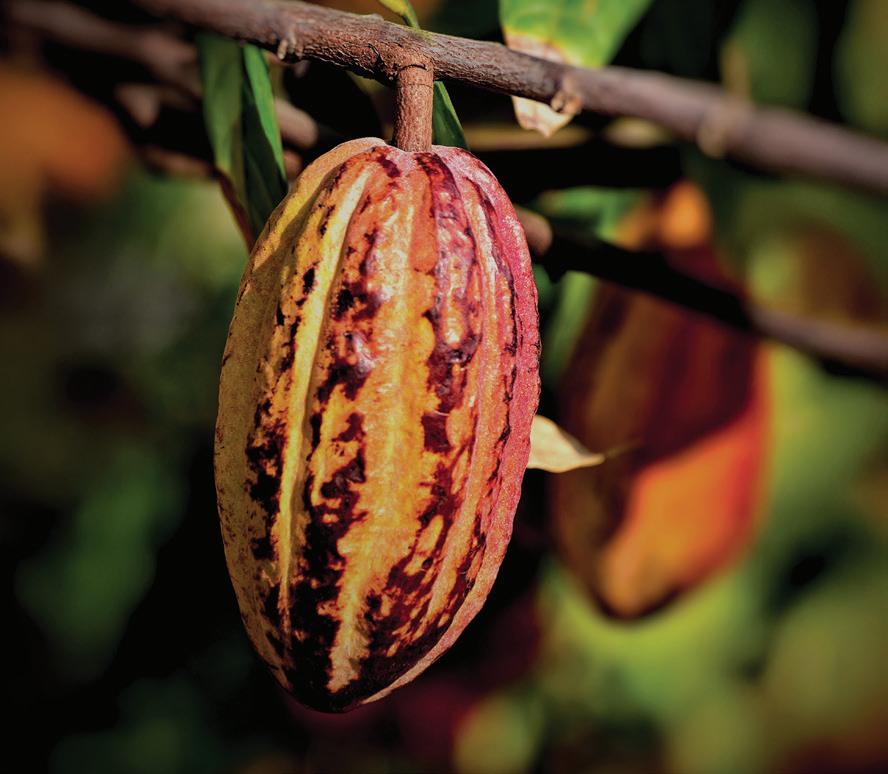
and farms were cleaned up and converted to organic methods.
This approach brought not only global recognition but also deep social transformation in Ecuador. Paccari has won multiple prestigious awards for the world’s best chocolate, while its business model has become a benchmark for ethical and sustainable entrepreneurship.
Today, while Africa’s cacao market faces major crises and record-high prices, Ecuador is living its golden moment. Thanks to brands like Paccari, cacao has become the country’s leading export product. The native cacao variety, known as Arriba Nacional, is recognised worldwide for its complex flavour and aroma. Every Paccari bar carries a distinctive terroir – the unique character of the region where its beans are grown, much like the finest wines.
Since April this year, true chocolate lovers in Serbia can enjoy Paccari products. This is the first chocolate on the local market made entirely from cacao of single geographic origin, with certified organic cultivation. Paccari chocolates are available at Ivona flower shops in Galerija, Delta City and Merkator shopping centres, as well as in the Autokomanda store.
Buying Paccari means much more than indulging in a perfect flavour. It means supporting a sustainable production system, empowering local communities, and respecting nature. Every piece of this chocolate tells a story — about Ecuador, its people, and the belief that luxury can be honest, conscious, and responsible.
Enter the world of Paccari. Discover how chocolate can be art — and a revolution.
For those who prefer shopping from home, Paccari can also be ordered via cvecaraivona.rs, and you can follow the brand on Instagram at @paccari.rs
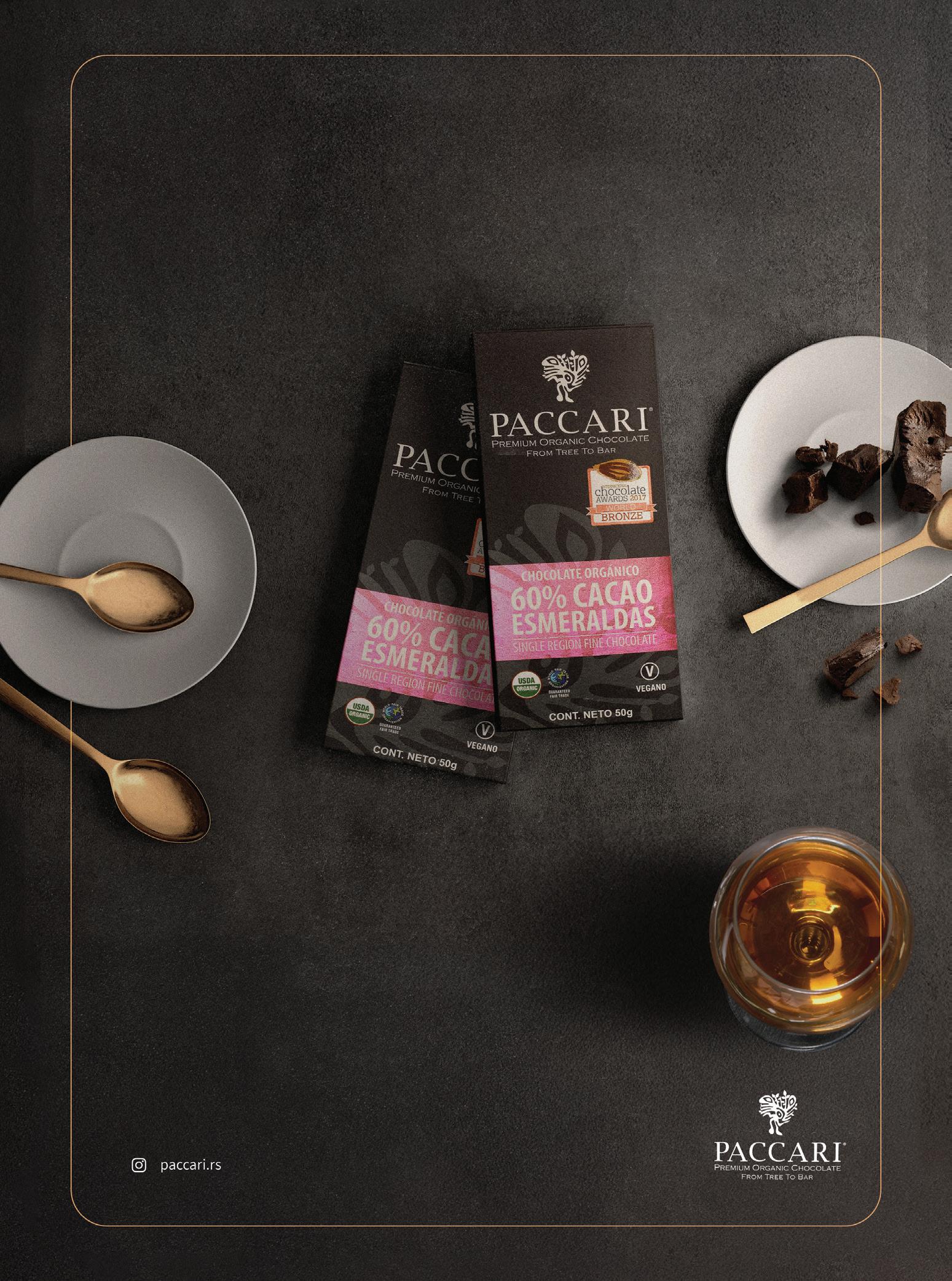
Since April this year, true chocolate lovers in Serbia have been able to enjoy Paccari products.
Paccari chocolates are available at Ivona Flower Shop locations in the Galerija, Delta City, and Merkator shopping centres, as well as in the flower shop at Autokomanda.

Vinčić Winery’s “Grand Fru Grašac” won last year’s taste Award for the best white wine in Serbia
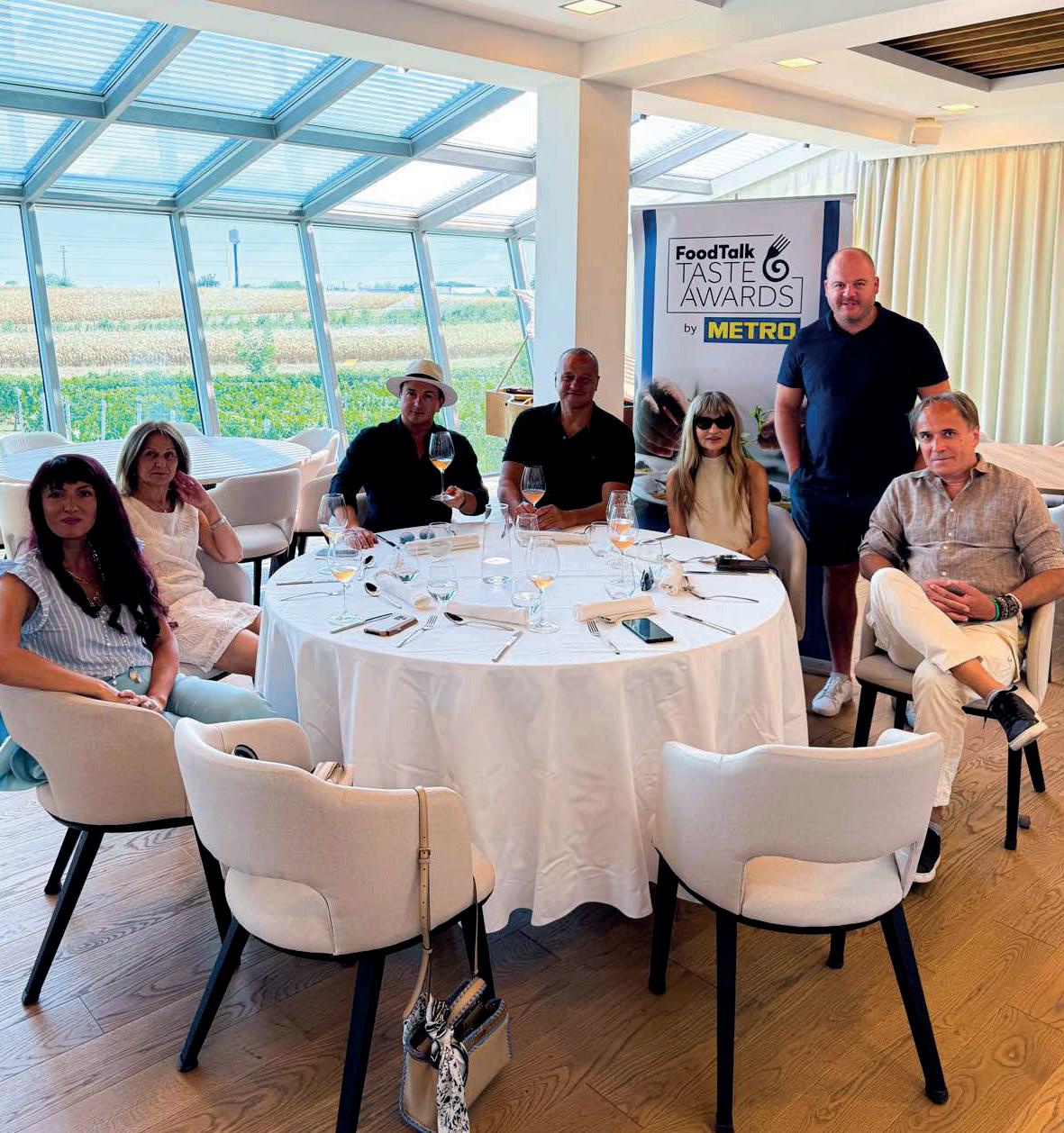
Last week, members of the Taste Awards jury visited this now-renowned winery, whose labels have received some of the world’s most prestigious awards and are served in top London hotels. The winery’s “Grašac Beli 2020” earned the Best in Show title at the 2023 Decanter World Wine Awards in London, ranking among the nine best white wines in the world at this most important international competition.
This accolade is proof of the potential of a grape variety that, in the former Yugoslavia, was widely known as Italian Riesling. Since it was once used to produce millions of litres of inexpensive wine, the grape’s reputation suffered a major blow. In recent years, this injustice has been steadily corrected, and the triumph at Decanter will surely do much to restore its standing.
The vineyard sits at an altitude of 250 metres, in a location known as Zaravan, where
the first winds arrive from Budapest, as the land to the north is flat all the way to the Hungarian capital,” says Aleksandar Vinčić, the winery’s owner and one of Serbia’s foremost winemakers.
The Taste Awards jury enjoyed the wines and Srem culinary specialities prepared with local ingredients in a contemporary way. By the end of September, jury members will also visit Thyme restaurant in Belgrade, where chef Lazar Svrkota won last year’s Taste Award for Best Chef Under 30, as well as the company Aleva in Novi Kneževac, which was awarded for the best spice.
This year, Taste Awards introduces a new category: Best Food (Agroturismo), which will celebrate the finest food experiences offered by rural households.
Metro Serbia is the general sponsor of the Taste Awards 2025.
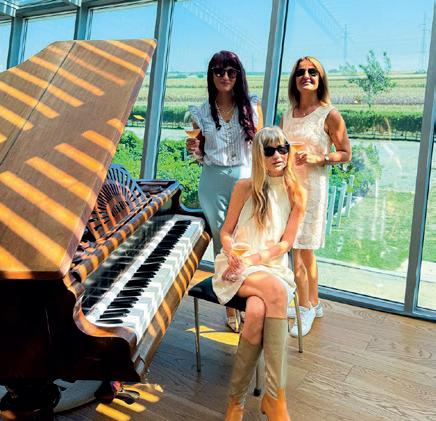
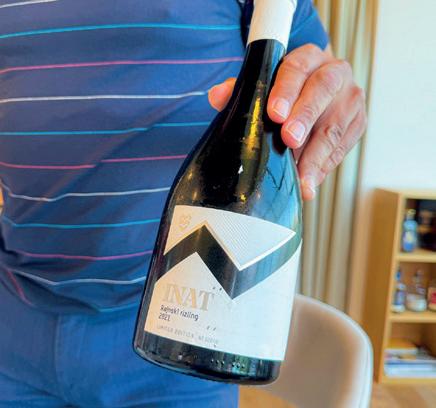
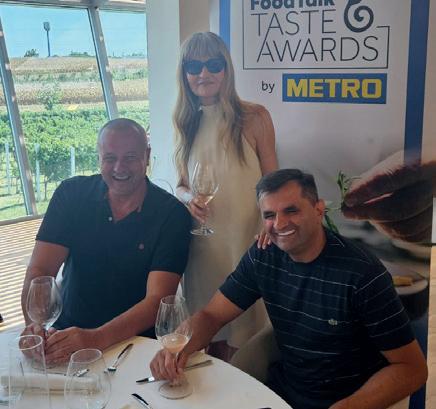
Entries for Taste Awards 2025 will open on 1 October. You can see how past visits to the laureates and the 2023 and 2024 award ceremonies looked here:

members of the taste Awards by metro jury visited the restaurant t hyme Streetcuisine & Breakfast in Zemun yesterday, whose chef and co-owner Nikola Rosić won this prestigious award in 2023 as Best Chef Under 30. Lazar Svrkota, a chef from the same team working at another restaurant from the chain — t hyme Streetcuisine & c ocktails — received the same award in 2024. It’s clear these young men know their craft.
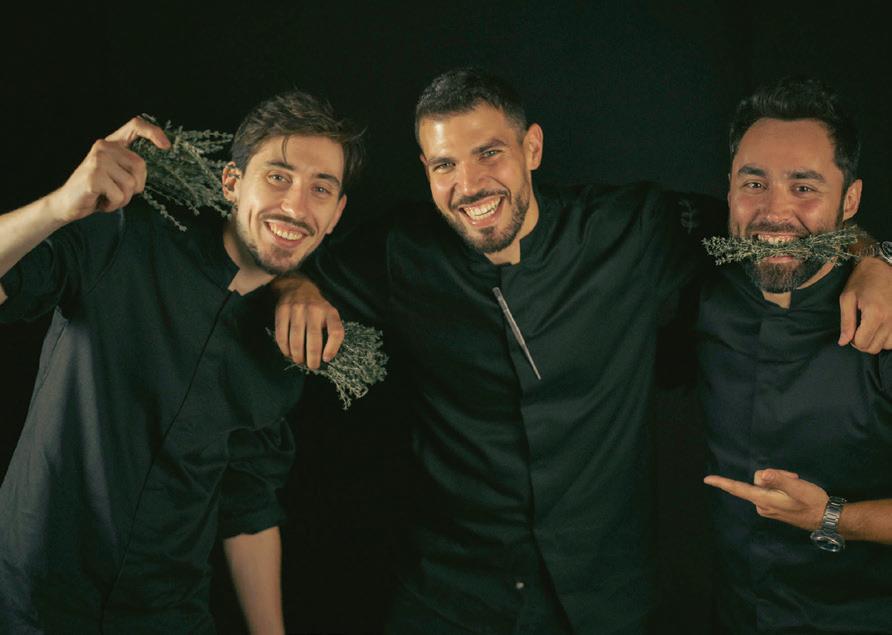
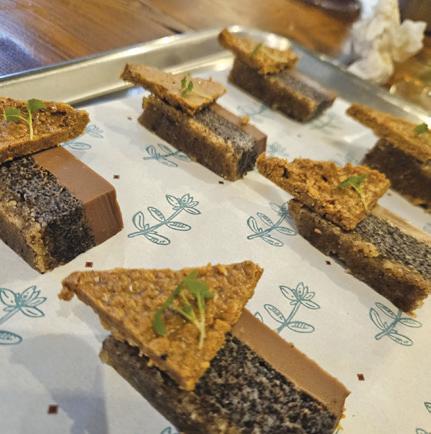
The Thyme StreetFood culinary concept was founded in September 2022 by three young, passionate chefs. Today, they also run Thyme Indian StreetFood, which the jury plans to visit as part of the 2025 competition.
“The fact that, for two consecutive years, young chefs from this team have received
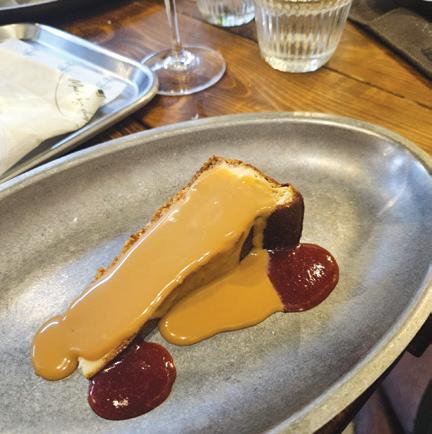
awards says enough about the care and attention given here to food quality and service alike. Everyone is smiling, nothing seems too hard for them, the food comes out fast, it’s delicious — and I’m already looking forward to visiting your Indian restaurant!” said Duška Jovanić, President of the Jury.
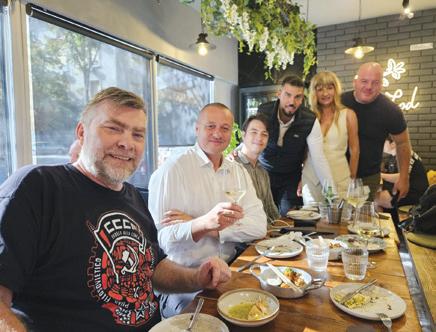
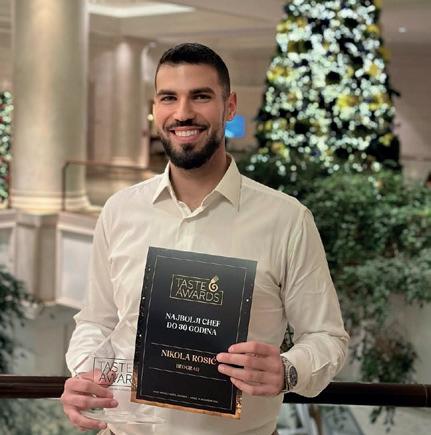
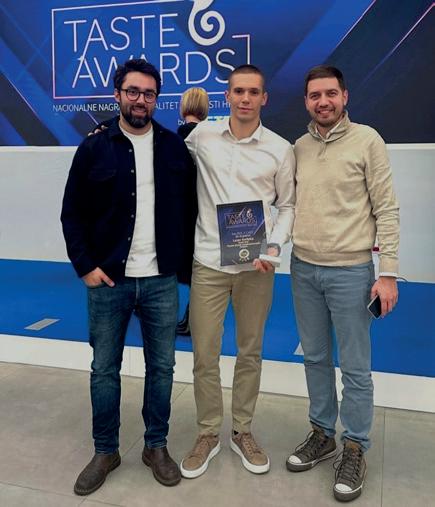
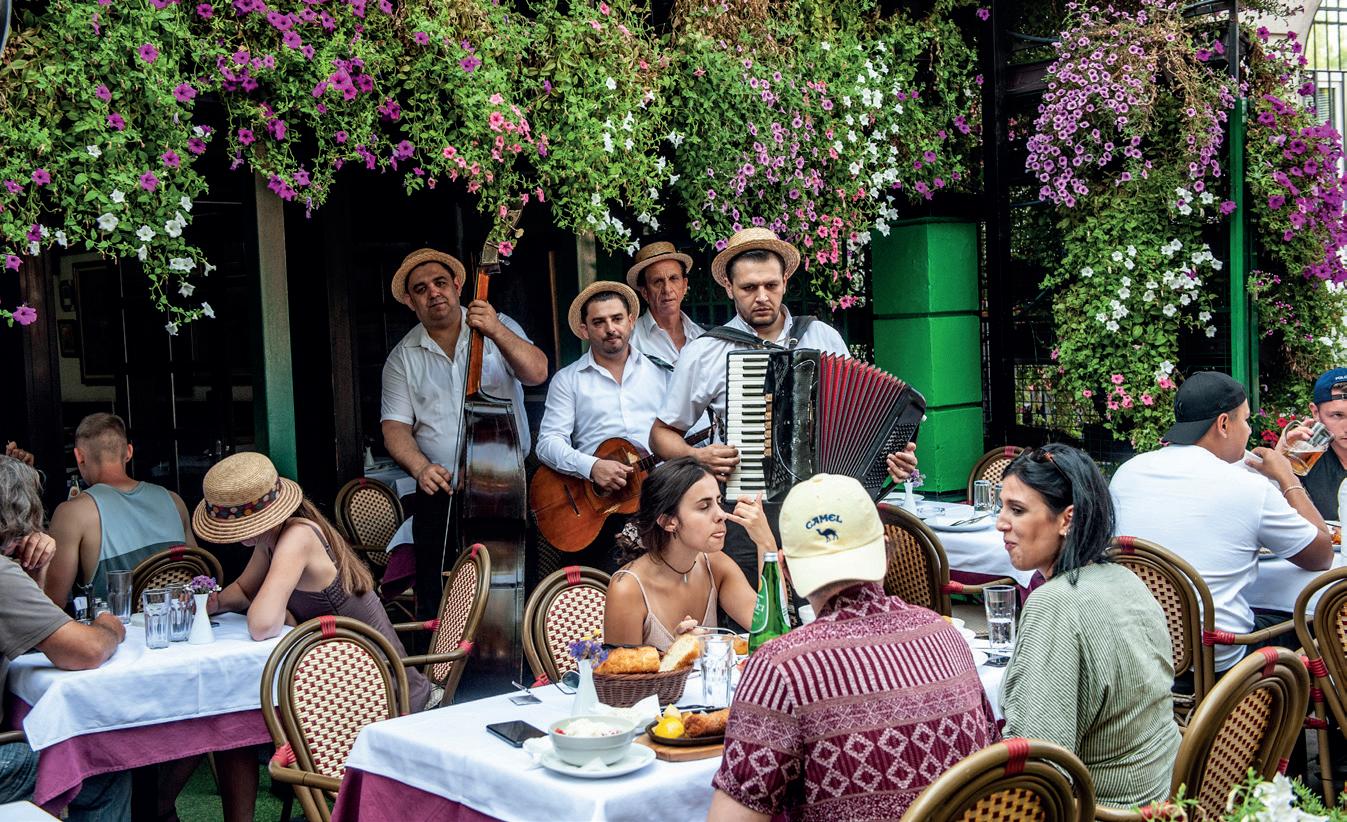
From Balkan grills to English breakfasts, Ambassadors reveal their favourite places to eat in Serbia’s capital.
In a city where politics and culture intertwine, Belgrade’s restaurant scene has become a quiet stage for diplomacy. We asked ambassadors and international representatives stationed in Serbia to share their favourite places to eat, and their answers reveal a rich tapestry of tastes, nostalgia, and culinary discovery.
British Ambassador Edward Ferguson admits he’s still exploring Belgrade’s food scene, but recently discovered Little Bay, a restaurant that serves a proper English breakfast. “I’m really glad you asked. I hadn’t really found anywhere until someone told me about Little Bay,” he shares. “I’m looking forward to checking it out!”
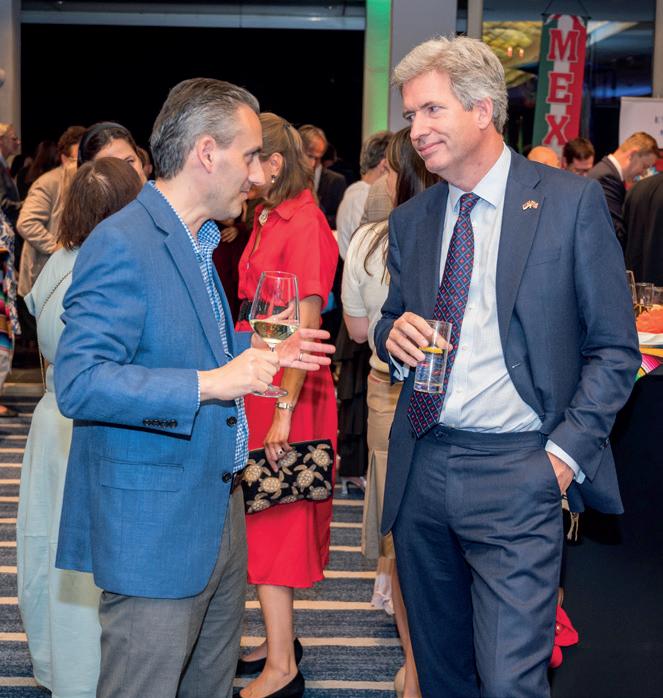
For drinks, Ferguson prefers Dogma Brewery, known for its craft beers. “The taste is about as close as you could get to an English pub,” he says.
Still, he’s on the hunt for classic British pub fare: “Fish and chips, sausage and mash, steak and kidney pie—if your readers know anywhere, please let me know!”
Ambassador Jan Bondy notes a culinary absence: “There is currently no restaurant in Belgrade that offers Czech cuisine,” he shares.
But when nostalgia strikes, just like the British Ambassador, he heads to DOGMA Brewery, located in the former Belgrade sugar factory near Ada Ciganlija. “DOGMA has a pleasant atmosphere of Czech beer halls, and their beers remind me of Czech beers in terms of quality,” he says.
He highlights their Švejk lager, brewed exclusively with Czech hops for the Czech Minister of
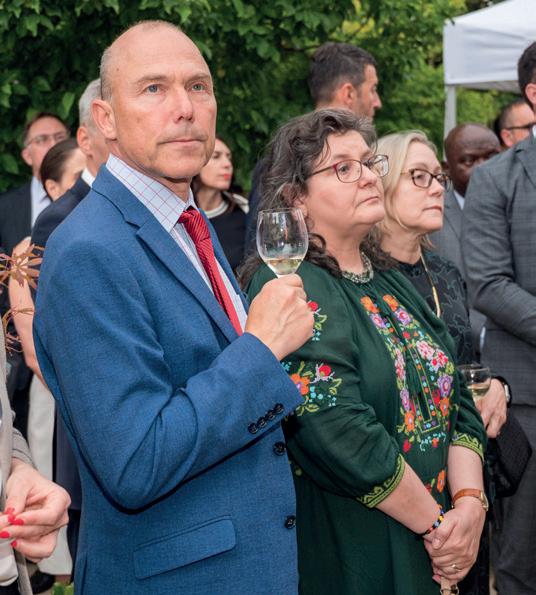
Agriculture’s visit in late 2024. “It was so well received by Serbian beer lovers that it became part of DOGMA’s permanent offer.”
For food, Bondy enjoys DOGMA’s hearty beer pairings: “I like their sausage with cheese or spicy sausage, it’s a nice reminder of sitting with friends over a good beer in Czech pubs.”
Ambassador Avivit Bar-Ilan finds comfort in the heart of Dorćol’s Jewish Quarter at Smokvica, a restaurant led by Israeli chef Re’em. “There, in a warm and homely atmosphere, you’ll find authentic Israeli cuisine, sizzling shakshuka, fresh
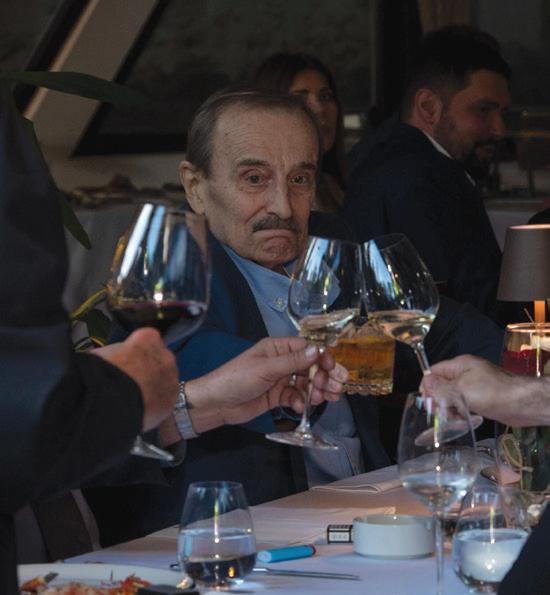
green salads, high-quality meat, hummus and falafel, and wonderful pastries that instantly bring me back to the flavours and scents of home.”
For Shabbat, she recommends La BoULANGeRie bakery: “Their challah is soft, meltin-your-mouth, and full of the taste of home.”
For Ambassador Aleksandar Vranješ, the answer is simple: “One of my favourite restaurants in Belgrade is Merak Balkan Cuisine in Senjak,” he says. His go-to dish? “Boki’s pljeskavica,” a Balkan-style burger that blends tradition with flavour.
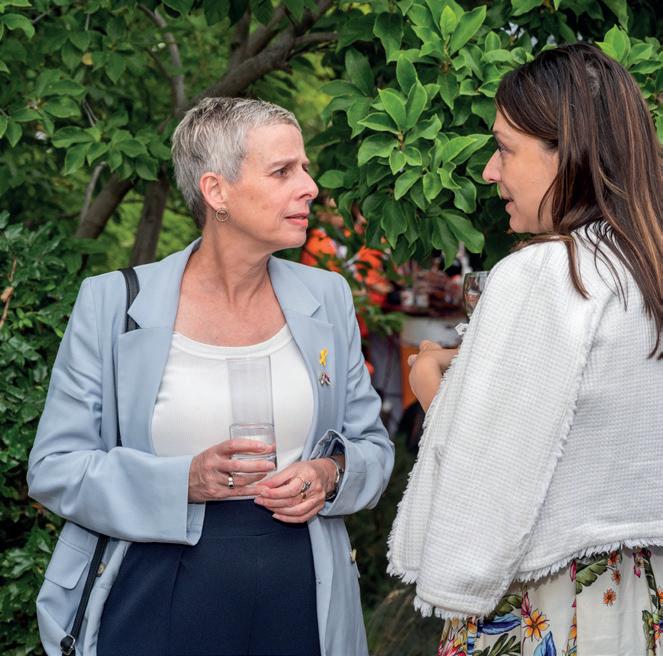
Croatian Ambassador Hidajet Biščević finds a taste of home at Šaran, a seafood restaurant in Zemun. His favourites?
“Crabs, octopus, and seafood in general,” he says, highlighting the restaurant’s Mediterranean flair.
When asked about Mexican cuisine in Belgrade, representatives from the Mexican mission responded candidly: “There’s no restaurant that serves good Mexican food here,” they said, suggesting a culinary gap yet to be filled.
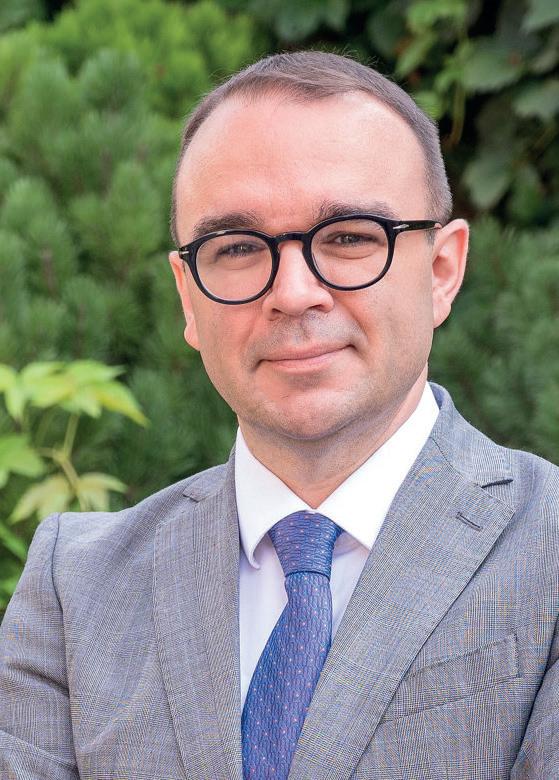
From Balkan grills to Israeli shakshuka, Czech lagers to English ales, Belgrade’s ambassadors are crafting their own culinary maps of the city. Whether chasing nostalgia or discovering new flavours, their choices reflect not just personal taste but the quiet diplomacy of shared meals. In these moments, over a plate of pljeskavica, a pint of Švejk lager, or a slice of warm challah, diplomacy becomes something more intimate. It’s the comfort of familiar spices, the laughter between bites and the stories exchanged across cultures. These dining choices are not just about food, they’re about belonging, memory, and the subtle art of connection.
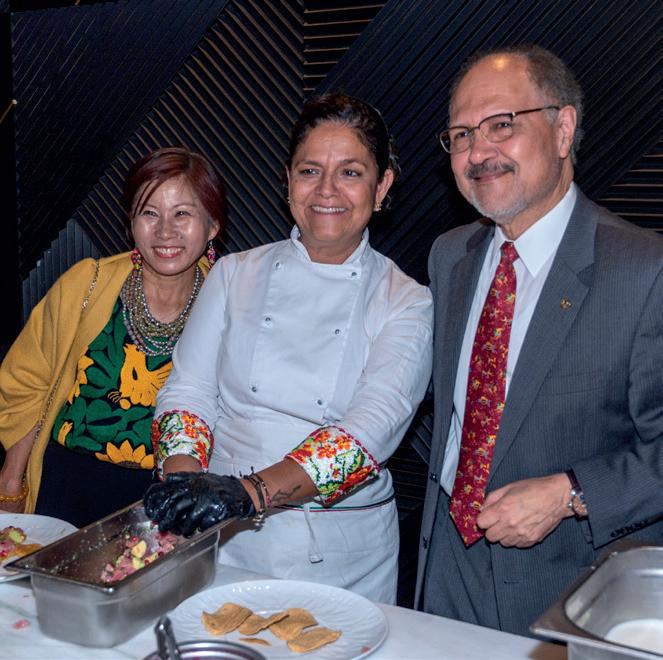
Speed, reliability and local relevance are the pillars of sustainable growth in c entral and Eastern
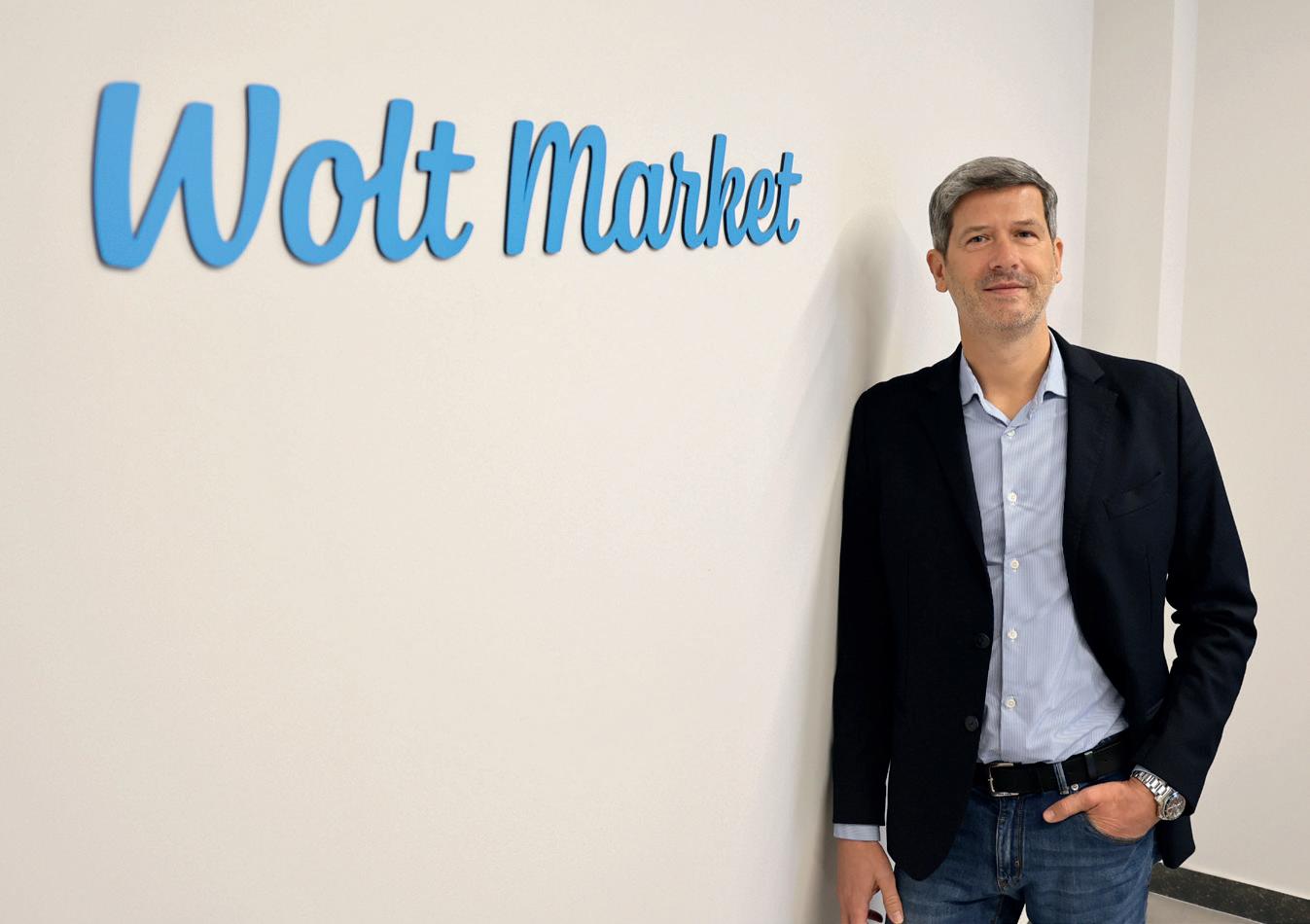
Regional GM for Wolt Market in the CEE Region
Kristijan Popović, Regional GM for Wolt Market in the CEE Region, shares insights on market trends, operational challenges and the company’s plans for further expansion.
You were recently appointed Regional Director of Wolt Market for Central and Eastern Europe. How do you see this opportunity, and what are your priorities in this new challenge?
It is a great honour and responsibility to take on the leadership of Wolt Market in the central region. I view this opportunity as a strong incentive to enhance everyday shopping by carefully listening to the needs of local communities and responding to the growing demand for fast and reliable delivery.
Customer experience is at the heart of everything we do – a rich assortment, constant availability, and delivery in under 30 minutes. We are focused on speed, reliability and personalisation, as we are, as
I often say, “obsessed with delivering the best shopping experience.” Operational efficiency is equally important to us. We are working on optimising supply and internal processes to reduce shortages and stock waste. Our goal is to cut the number of out-of-stock items by 20% over the next six months, while speeding up order processing and packing. Together with our suppliers, we strive for an even higher level of operational excellence.
freedom to adapt to local challenges, while standardising best practices and fully respecting the regulatory frameworks of each market to ensure consistent service quality.
I am confident that, through collaboration with our teams and partners, we will achieve sustainable growth and make Wolt Market recognised for speed, reliability and local relevance – to the satisfaction of our users and for the benefit of the communities in which we operate.
CUSTOMER EXPERIENCE IS AT THE HEART OF EVERYTHING WE DO
By the end of 2025, we plan to open at least 10 new Wolt Market locations in the region, including a launch in Romania. At the same time, we are strengthening cooperation with local suppliers to offer the perfect balance between globally popular products and local favourites. We are equally focused on people and organisational culture. We are building teams that share a common vision but have the
Your career in the FMCG industry spans many years. How would you describe the evolution of the FMCG sector throughout your professional journey, and what are the key moments that have shaped the industry today?
Three major shifts have marked the past decade in the FMCG sector. The first is the strong pressure on purchasing power and the decline in sales volumes, which led consumers
to switch to cheaper brands, fueling the growth of private labels and discounters. For example, in 2023, food inflation in Europe reached 12.8%, while retail growth stood at 8.6%, indicating that value growth primarily resulted from price increases rather than higher purchase volumes.
The second major shift was the transition from a model focused on physical (offline) shopping to an omnichannel approach, where consumers use multiple sales channels simultaneously. The pandemic further accelerated this transition and, although the market has stabilised, online shopping continues to be a strong driver of growth.
The third major shift relates to the professionalisation of retail media. An increasing share of marketing budgets is being redirected towards advertising platforms that use firstparty consumer data, as they enable transparent performance tracking and deliver high margins.
For FMCG manufacturers, 2023 and 2024 have been dominated by rising prices, with the focus shifting back to restoring volumes. At the same time, the sector is undergoing rapid digitalisation – from
data-driven assortment management and dynamic pricing to lastmile delivery optimisation. The line between retail and technology is blurring, which naturally led me to the quick-commerce model of dark stores designed exclusively for online orders, such as Wolt Market.
Wolt Market is increasingly positioning itself as an everyday destination for fast and reliable shopping. How does your experience managing different markets contribute to its further development in the CEE region and to building a team that can drive its strategic growth?
Working across multiple markets has taught me that the same result is never achieved in the same way. In Belgrade, Prague, and Bratislava, we combined different network densities, store locations, pick-and-pack processes, and local assortments – yet the goal was always the same: speed, accuracy, and availability. This is the essence of the delivery-only model, which clearly sets Wolt Market apart from traditional retail.
Based on our experience, we have developed a model that successfully combines operational efficiency with local relevance, and we are now applying this approach across the region. We rely on a unified operational model and advanced technological infrastructure, introducing changes gradually – store by store, city by city – to maintain a high service standard and consistent quality.
We understand that each market has its own specifics. That’s why we never apply our playbook as a copypaste solution. We localise our approach – from assortment and pricing strategy to regulatory compliance and adjustments to consumers’ purchasing power. We build strong relationships with local suppliers and closely monitor each country’s regulatory framework.
This combination of proven models and a deep understanding of the local context enables us to grow faster, remain relevant, and deliver the kind of shopping experience customers expect – simple, reliable, and close to home. This model has proven successful in Slovenia, the Czech Republic and Slovakia, and I believe the same principle can be effectively applied to other markets where Wolt Market operates.
Over the past three years, you have successfully integrated your knowledge and experience into Wolt Market’s operations. Can you explain how Wolt Market has developed and what makes it unique in the market?
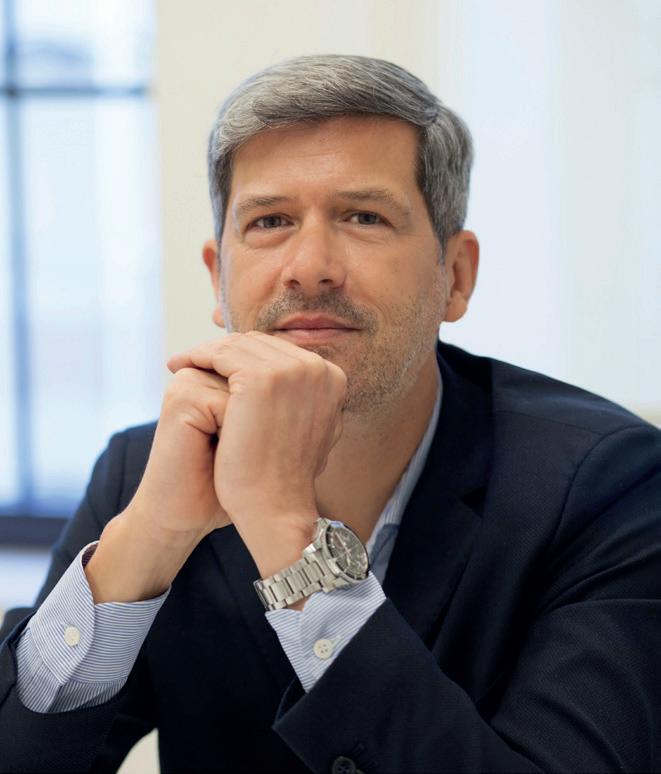
WE NEVER APPLY OUR PLAYBOOK AS A COPY-PASTE SOLUTION
Wolt Market was launched in 2020 in Helsinki as the first store designed exclusively for delivery, with a clear promise of delivery in around 30 minutes. Today, this concept operates in dozens of cities across the countries where Wolt is present. In our region, we are active in Belgrade, Zagreb, Prague, Bratislava, Ljubljana, Budapest, and Warsaw – everywhere with the same promise of speed and a clear focus on customer experience.
The strength of Wolt Market lies in complete control of the process –from order placement to inventory management and final delivery to the customer’s door. The stores are organised exclusively for delivery, which ensures maximum precision and efficiency.
Locality brings additional value: alongside thousands of essential items, we open the door to small producers – thousands of local products across the region already have visibility and distribution on our platform.
We have also established robust mechanisms that generate value for both customers and partners. With the introduction of the Wolt+ subscription, we enabled loyal users to benefit from free deliveries and discounts, thereby
we continue to strengthen communities and partnerships. In 2024, we, together with our suppliers, presented joint plans and awarded the best among them, as it is precisely through shared growth that we can most quickly transform the customer experience for the better.
When you reflect on your professional journey and the challenges ahead, what inspires you most in your work and keeps you motivated in such a diverse market?
I am inspired by the fact that what we do has a direct impact on people’s everyday lives. When delivery works flawlessly and customers can complete their shopping in less time than they would spend in a store, we help them save precious time for family, work and other commitments. That time saving – and the feeling that we are making cities better places to live – gives our work special meaning.
increasing their order frequency. So far, over €200 million has been saved, and these benefits have been further expanded through partnership programmes. In collaboration with Finnish fintech company Revolut, we have provided premium bank users in 17 European countries with a complimentary Wolt+ membership. Similarly, we have partnered with Deutsche Telekom, which now offers its customers up to 12 months of free Wolt+ membership in seven countries through its Magenta Moments loyalty programme.
We also developed the Wolt Ads platform, enabling merchants and brands to increase their visibility and sales within the Wolt app through sponsored placements. This solution is already active in over thirty markets, delivering measurable sales growth and a clear ROI.
A key part of Wolt Market’s identity is our responsibility towards the communities in which we operate. Instead of generic carbon offsets, we direct funds towards concrete reductions of environmental impact, cofinancing electric bicycles and mopeds for courier partners through the Better Cities fund. At the local level,
I am also motivated by the fact that local partners grow with us – small manufacturers and family farms are reaching a wider customer base for the first time through Wolt Market, which demonstrates how technology can empower the local economy and provide visibility to those who previously lacked it. Another great source of strength lies in the team – a multicultural, dynamic, and growth-oriented one. At Wolt, we are building a platform that generates billions of euros in sales for local merchants across our markets, and this “flywheel” effect creates a strong sense of purpose and responsibility.
Looking at the wider industry, I believe in a return to healthy volume growth, with an ever-increasing role for data and deeper integration between the online and offline worlds. Wolt Market’s success is based on staying true to its core mission: to make everyday life easier for people while building a sustainable and adaptable business model. We have standardised what is universally important – speed, availability, simplicity – while respecting the specificities of each community in which we operate.
Looking ahead, we will continue to grow sustainably and responsibly, relying on local teams and partnerships – whether through strategic alliances with fintech and telecom companies that bring added value to users, or through cooperation with city initiatives aimed at promoting greener transportation. Everything we have achieved represents a solid foundation for further expansion – one that is responsible, built on trust, and driven by the passion of local teams who turn this vision into reality.
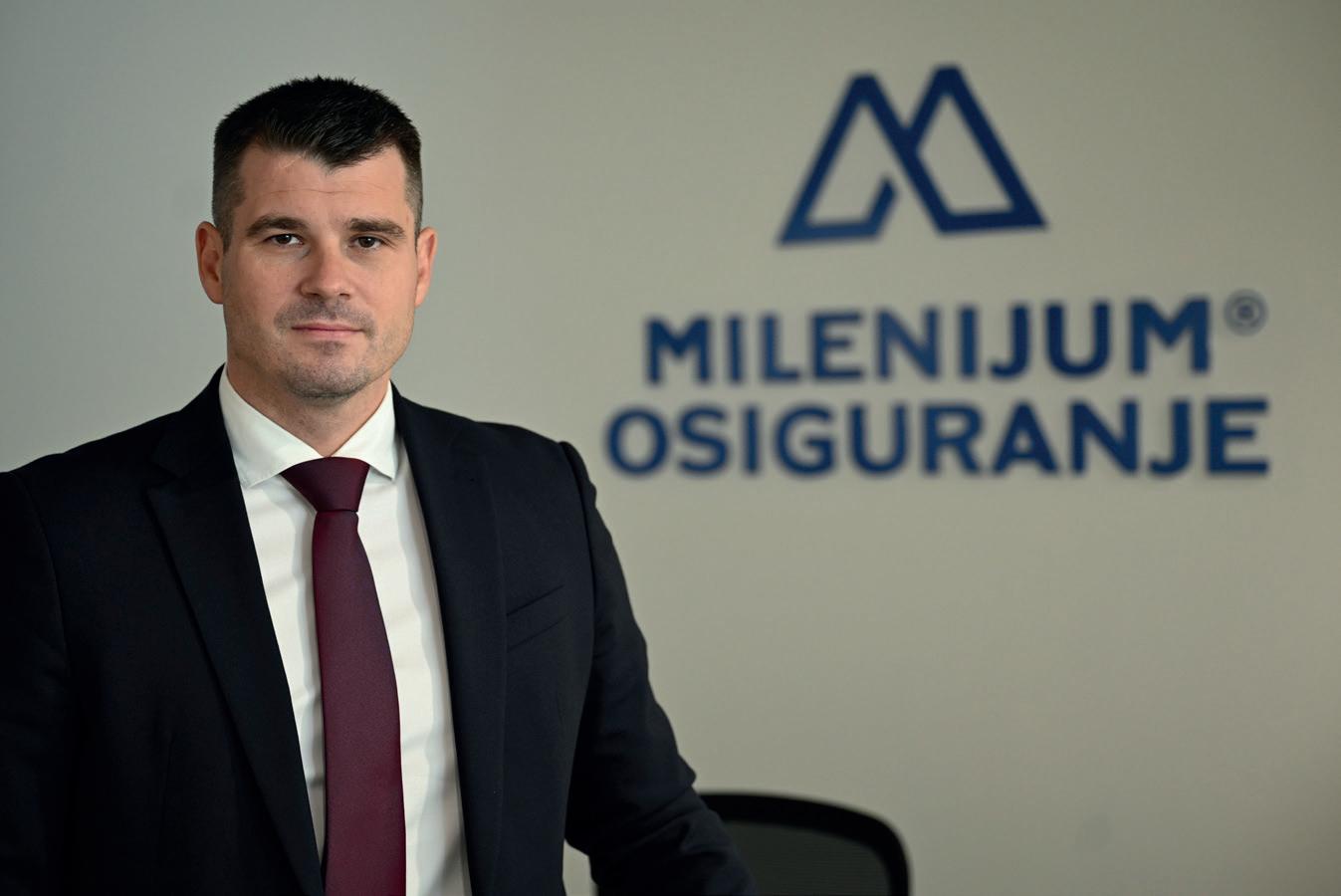
trust, simplicity, and innovation as the pillars of modern insurance
MARIO BATARILO
Chief Executive Officer
at Milenijum Osiguranje
Mario Batarilo, Chief Executive Officer at Milenijum Osiguranje, shares how trust, innovation, and simplicity shape the company’s approach to modern insurance.
Milenijum Osiguranje began its journey in 1992 as Stankom Osiguranje, with a clear focus on listening to customer needs and expanding its portfolio. Looking back, how has that founding ethos shaped your approach to innovation and client engagement today?
From the very beginning, Milenijum Osiguranje has been built around the idea that insurance must be simple, understandable, and in the service of everyday life. We have
not abandoned those basic ideas today, more than three decades later. Listening to clients and their wishes is perhaps the most important thing in insurance. Monitoring habits, reacting in time with offers, and anticipating customer needs. That is why innovation in insurance is not something instantaneous, but a constant task of insurers. One of the most important things in insurance, something we work on every day, is to create trust with our clients. Insurance is basically trust. It is not just about numbers, risks, but primarily about supporting clients when they need that most and trusting us to provide them with that support.
That is why we at Milenijum Osiguranje listen to the needs of our clients every day. Through analyses, conversations, praises, but also complaints, so that we can keep up with their needs and the time in which we live.
In a competitive insurance landscape, what differentiates The St. Regis Hotel and Residences Belgrade in terms of product innovation, customer experience, or civic engagement?
The insurance market is one of the most competitive, not only in Serbia, but also globally. What sets us apart, in addition to the aforementioned daily listening to the needs of clients, is relevant products, top user experience, and commitment to the community. We focus on what really matters to people - health, safety, property,
WE DON’T WAIT FOR CRISES — WE THINK AHEAD AND STAY PREPARED
and mobility. Growth in the segments of voluntary health insurance, comprehensive insurance, and property insurance shows that we know how to recognize trends and respond to them in a timely manner. This is something that we at Milenijum Osiguranje are extremely proud of. We are constantly working to ensure that every contact with the customer is fast, clear, and includes a human touch. We speed up work processes, digitize what can be digitalized, but with an emphasis on the fact that the client must not be left without support when
needing it most. In addition, it is necessary to have a socially responsible role, to be in close contact with the community, because we are also part of that community. By supporting sports, education or health, we want to leave a mark that goes beyond numbers and balances.
Our goal is simple, to be an insurance that does not stop when it achieves a good result, but that asks a question – what else can we do better for our clients, partners and employees.
From floods to cyber risks, how has MIOS adapted its offerings to meet the evolving needs of Serbian citizens in times of crisis?
If there were no crises and unforeseen circumstances, there would be no need for insurance. That is why we at Milenijum Osiguranje are constantly a little ahead of the events, in order to timely recognize dangers, to react and provide the best service for our clients. This is imperative in our business. Crises remind us how important insurance is and how fast and relevant it must be. Whether natural disasters, or cyber risks, or something else is concerned. Our response to these dangers is always the same –quick adaptation and concrete solutions.
Over the last two years, we have significantly improved our offer in the segment of property insurance and introduced coverage that corresponds to new types of damage, including those caused by climate change. Also, we plan to develop a cyber protection package for legal and natural persons, because we know that personal data and digital security are a matter of basic security today. We have given ourselves the task not to wait for the crisis to come, but to think ahead and be prepared. This is how we gain the trust of our customers.
Natural disasters and cyberattacks are the two biggest types of risks we see in the future. It is important to understand that digital security has become almost as important as physical security. That is why insurance companies are introducing new products, from data theft, through ransomware attacks, to business interruption due to cyberattacks. In addition, we are all aware that natural disasters are becoming increasingly common in today’s world, and we, as insurance companies, must respond to this by creating policies related to these risks. Certainly, in both cases, it is important to emphasize that insurance is not only about the payment of damage, but primarily about active prevention, i.e. counseling and partnership with customers, so that, in the above cases, primarily in case of cyber-attacks and the resulting problems, we could prevent their occurence, timely and with adequate measures. For these reasons, it is important to talk to clients, consult and create partnerships, in order to work together to avoid the aforementioned risks and challenges.
MIOS emphasizes simplicity and online access. How are you tailoring services to younger demographics, especially first-time policyholders?
As we all know, digitalization has brought enormous changes in all aspects of business and everyday life, and this is of course also visible in the insurance business. Digitalization affects the automation of business, processing of applications, issuing policies, risk assessment, all
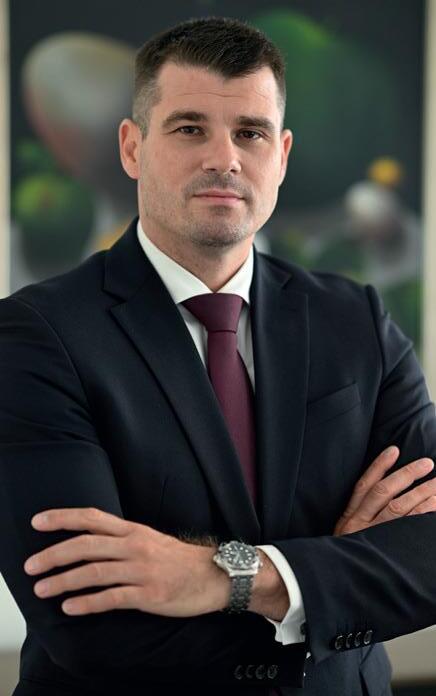
DIGITAL DOESN’T MEAN DISTANT — PEOPLE MUST ALWAYS COME FIRST
of which together reduce human error, but also significantly simplify business. The process is optimized, resulting in a better user experience. Through the Web-shop that we have created at Milenijum Osiguranje, it is much easier and faster for our users to get insurance policies, such as travel health insurance, roadside assistance and home assistance, etc. All this simplifies the user experience and shortens the time needed to secure the necessary policy, without unnecessary trips to branches.
This is especially important for young people, who have grown up in the digital age. Young people today are looking for speed, accessibility and clarity, and they are absolutely right about that. Today, they have completely different habits than previous generations - they go to branches less and less; they do not wait in lines and want everything immediately, simply and online. And we fully understand them in this, because they make us think faster and better. We try to simplify what can be simplified.
At Milenijum Osiguranje, we do not see this generation only as potential customers, but as those who are already shaping the insurance market. Our strategy towards younger users includes fully digital products, from contracting to reporting damage, communication without professional jargon, and our focus is on what is most important to them – travel, health and technology. That is why we have recently been developing products and experiences tailored to them, insurance products that are quickly arranged through digital platforms, paperless and that cover what is most important to them.
In order to attract younger customers, we need to be present where they are. And that is to be online, on mobile platforms, with a tone of communication that is human, not bureaucratic, with an understanding of their lifestyle. Because if we do not speak their language today, tomorrow they will not listen to us anymore. And we want them to hear us.
What’s next for MIOS? Are there upcoming products, technologies, or strategic shifts you are excited to unveil?
If we look ahead, our focus is threefold – smart growth, digital transformation and even greater closeness to customers, but also to partner companies. Our key strategic goals are growth in the voluntary insurance segments, such as voluntary health insurance, property insurance, casualty insurance and comprehensive insurance, as well as digital transformation and customer experience through the modernization of digital channels, such as mobile application and web platform. Also, our focus will be on strengthening the sales network and partner channels with specialized partners, then improving operational efficiency through the aforementioned digitalization and process optimization, through the application of analytics for smarter risk management. What continues to be extremely important in insurance is the development of employees and our teams, through investment in education, leadership development and talent retention. We are building a culture where results matter, but people are at the center of everything we do.
Milenijum Osiguranje is certainly recognized as a quality and reliable partner. That is why, in addition to investing in services that enable a high standard of customer service, we will also focus our energy on expanding our internal sales network, in order to increase the availability of our services on the Serbian market. We work with partners on a daily basis to develop new mass products in the retail segment, which offer affordable prices, digital accessibility and clear benefits.
From the moment I was appointed Chief Executive Officer of Milenijum Osiguranje, I am aware that my primary task and greatest challenge was to preserve the stability of the company and ensure business continuity. In challenging times, this is the key to keeping the company reliable and stable, both for customers and employees.
When I imagine Milenijum Osiguranje in five years, I honestly see a company that is still close to people, modern and safe. As a modern, efficient and close to customers insurance company, which has retained the most important thing, which is the trust of clients and commitment to its people. That is why I see us as a team that has preserved everything that makes us special in the insurance market, and that is the aforementioned trust of clients and mutual respect within the company, which at the same time will not be afraid to change, adapt to the market and grow. To achieve this, we do not want to be just “another insurance”, but a partner to people in everyday things, in order to restore their sense of security. That is why I want every one of our customers to be able to say “I know where I stand here. I know they will help me when I really need it.” It’s a goal worth fighting for.
On challenges, milestones, and the road towards a circular economy
General Director of Sekopak
Violeta Belanović, General Director of Sekopak, speaks about the key challenges, benefits, and the future of packaging waste management in Serbia. This interview was conducted for Diplomacy & Commerce magazine, with Sekopak as our partner and one of the sponsors of our well-known Serbia Goes Green conference.
What are the biggest challenges in packaging waste management and recycling in Serbia?
The packaging waste management system in Serbia has made significant progress since 2010, when only 5% of packaging waste was recycled, to today’s 67%.
More than one million tonnes of recycled packaging waste is the result of our long-term systemic approach and cooperation with industry, local authorities, and citizens across Serbia. However, serious challenges remain, particularly in the area of municipal packaging waste. While the collection of commercial and industrial waste is well developed, there is still no primary separation in most of the country’s municipal sector. This remains the biggest challenge at present.
We hope that the new legislative framework and the targets set by the Ministry through the Decree on Packaging Waste Reduction Plan 2025–2029 will contribute to improving this segment. In addition, 2027 will be a pivotal turning point. That is when the deposit return system should be introduced, bringing a range of new obligations for industry, operators, local authorities, and public utility companies. Without a clear division of responsibilities and proper synchronisation of all system participants, we will not be able to achieve the targets ahead of us. Legislative changes and stronger cross-sector cooperation are essential if we are to improve the entire system.
What role do the state, local authorities, producers, and citizens play in creating an efficient packaging waste management system?
An efficient system can only be established if every stakeholder assumes their share of responsibility. Industry and operators, through the concept of extended producer responsibility, already have clearly defined legal obligations – collecting the prescribed quantity of packaging waste, setting up the necessary infrastructure, and educating citizens. Citizens are key partners, as proper sorting within households is the first step towards successful recycling of municipal packaging waste.
CLEAR RESPONSIBILITIES ARE KEY TO REACHING OUR GOALS
On the other hand, local authorities currently have no legal obligation in this process – their involvement depends on their goodwill. This is where one of the biggest challenges lies. Since 2010, Sekopak has been actively cooperating with local governments, installing containers, educating citizens, and supporting public utility companies. Our partners are very interested in recycling, and we help them to establish an efficient system at the local level. When citizens see that a system exists and functions, their environmental awareness is triggered. More and more often, they ask, “Why don’t we have this in our municipality?” This is a clear sign that both interest and willingness are present.
What are the economic and environmental benefits of a sustainable packaging management system?
The environmental benefits are the most important. By properly
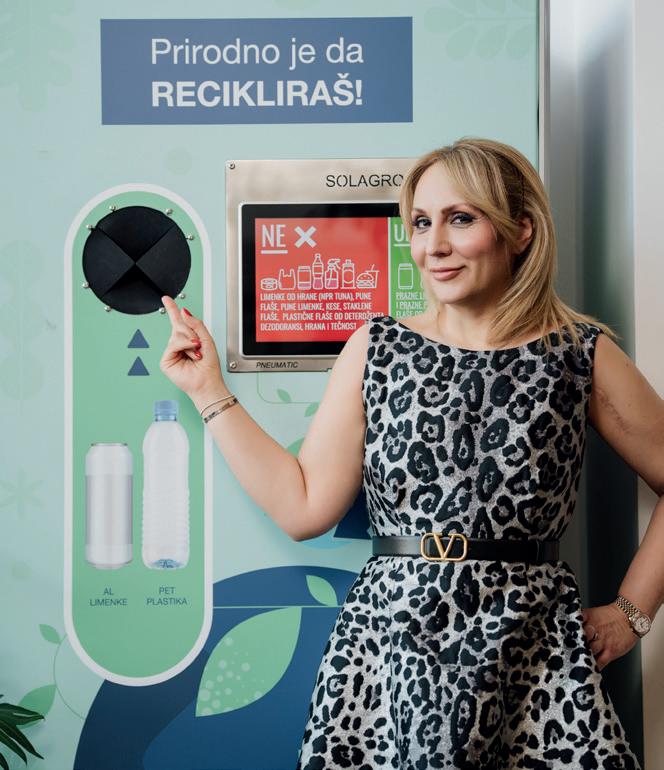
collecting and recycling packaging, we directly contribute to reducing CO2 emissions, preserving natural resources, and decreasing pollution of water, air, and soil. This approach protects the environment and builds a sustainable future.
The economic benefits are also significant. Waste that was once a cost has now become a secondary raw material. Recycled materials are returned to the production cycle and used to create new products, contributing to the development of the circular economy, creating new jobs, and stimulating innovation.
How can education and raising public awareness contribute to increased sorting and recycling? Education is the foundation of every successful system. From the very beginning, Sekopak has invested in educational programmes and campaigns – from working with children in schools
to training sessions in companies and digital campaigns. Through our mobile educational platform, the Sekopak Caravan, we have toured cities across Serbia, speaking with thousands of citizens, especially children, and teaching them why recycling matters. When people understand why proper separation is important and have access to the necessary infrastructure (bins, containers, and reverse vending machines), they are ready to participate. Our reverse vending machines, as a digital innovation, further motivate citizens with rewards and engage those who previously lacked the habit of recycling.
Public trust grows when citizens see concrete results because they then know that their efforts have meaning and deliver visible effects. This is why raising awareness is crucial and must be accompanied by infrastructure development.
DDOR Insurance, one of Serbia’s leading insurance companies, proudly marked its 80 th anniversary
The 80th anniversary of the DDOR marks a milestone that stands as a testament to the company’s continuity, trust, and dedication to its clients, partners, and employees since 1945.
The grand celebration, held on September 10 at the White Palace in Belgrade, gathered a distinguished audience of business partners, government representatives, members of the diplomatic corps, Italian business associations, media professionals, and company employees. In a magnificent setting, guests enjoyed a festive programme featuring, among other highlights, the screening of a film on DDOR’s 80year journey and performances by renowned musical artists.
Over the course of eight decades, DDOR has undergone an extraordinary transformation – from a state-owned insurance institute to a modern insurance company, and today, a proud member of the leading Italian Unipol Group. This anniversary is a testament to the vision, resilience, and commitment of all those who have contributed to the company’s growth.
“DDOR’s journey began long ago, and since then, the company has travelled far beyond a thousand miles. It has endured the moments that shaped this country, overcoming challenges that demanded perseverance, adaptability, and collective effort, always striving to contribute to positive change in the region. I believe we have come a long way, successfully adapting to change and laying solid foundations for the company’s future, thanks to the support of our Group and the values and principles we share,” said Francesco Masci, Chairman of the Executive Board of DDOR Insurance, addressing the guests.
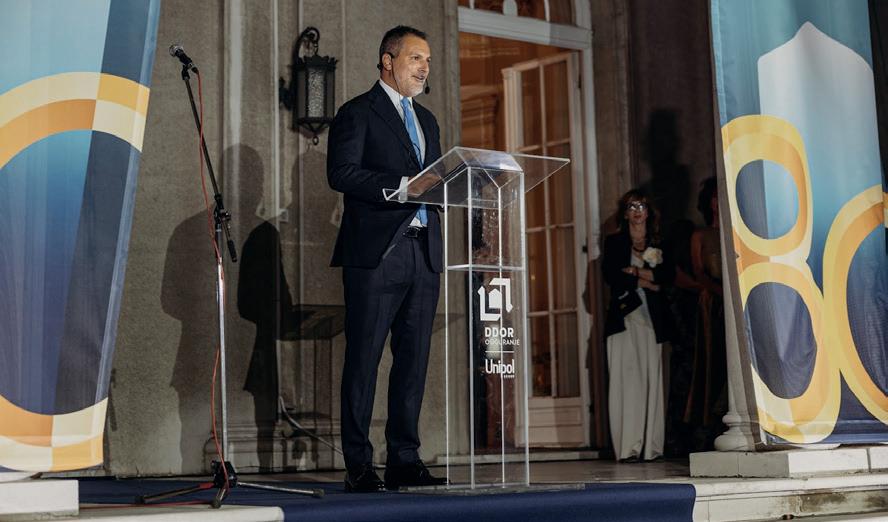
THIS ANNIVERSARY IS A TESTAMENT TO THE VISION, RESILIENCE, AND COMMITMENT OF ALL THOSE WHO HAVE CONTRIBUTED TO THE COMPANY’S GROWTH.
DDOR Insurance remains committed to its long-term business strategy, rooted in its core values – trust, responsibility and dedication –and stands ready to provide even greater security to its clients in the decades ahead.
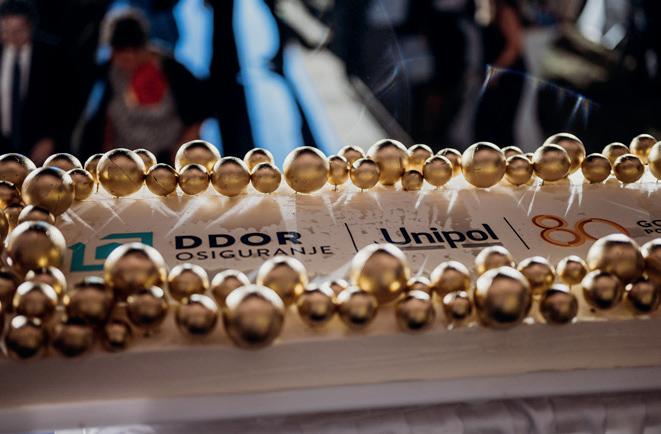
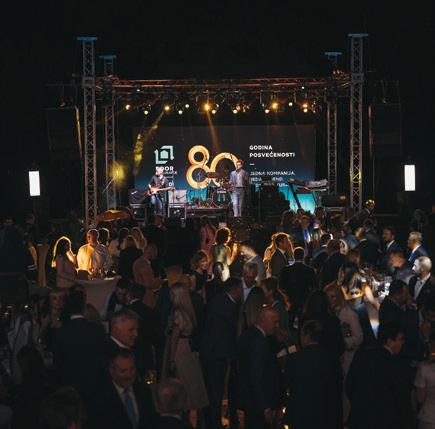
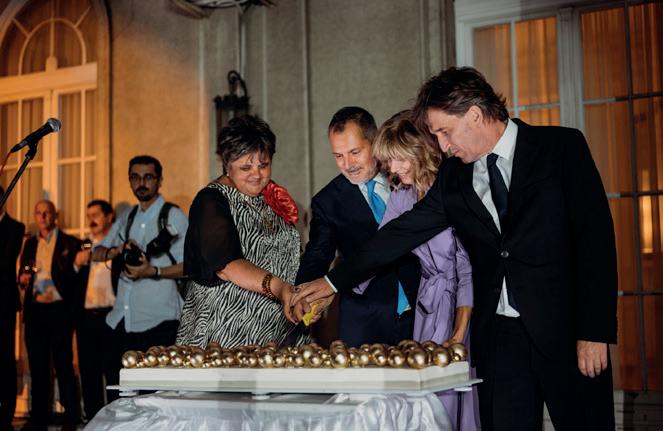
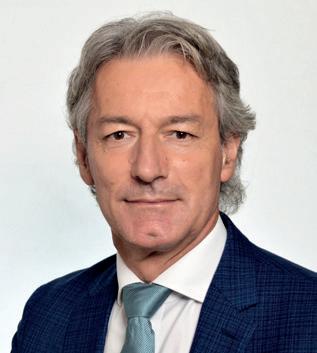
MIROSLAV GLIGORIJEVIĆ CEO of Titan Cementara Kosjerić
n this interview, Miroslav Gligorijević, CEO of Titan Cementara Kosjerić, reveals how the company combines growth, sustainability, and community engagement to secure its future and inspire the next generation of professionals.
Titan Group has recently expanded its footprint in the region through a new acquisition. How does this strengthen Titan Cementara Kosjerić and what are your current business results?
The acquisition confirms Titan Group’s longterm commitment to Southeast Europe and to Serbia in particular. It positions us even more strongly as a regional leader in building materials and sustainable construction solutions.
For Titan Cementara Kosjerić, this is a major vote of confidence, because it integrates our operations more deeply into a growing network of expertise, technology, and investment.
In terms of business results, our Kosjerić plant has maintained a stable position in the Serbian market, consistently delivering high-quality cement that supports the country’s infrastructure and housing needs. Over the past years, we have increased efficiency and reduced our carbon footprint while also maintaining profitability despite challenging energy and market conditions. This stability allows us to invest further in modernization and in our people, which is the foundation of our long - term strategy.
You often emphasize the role of employees. With about 200 people working at the plant, and one third of them being young professionals, how do you nurture this human potential?
People are at the heart of everything we do. Titan Cementara Kosjerić employs around 200 dedicated employees, and what we are especially proud of is that about one third are young people under 35. This gives us both continuity and fresh energy.
We invest heavily in safety, trainings, and professional development. Every employee has access to continuous learning opportunities, whether in technical upskilling, leadership development, or exposure to international best practices within Titan Group. Our people strategy has always been to combine long - standing expertise with new talent, ensuring that knowledge is transferred across generations.
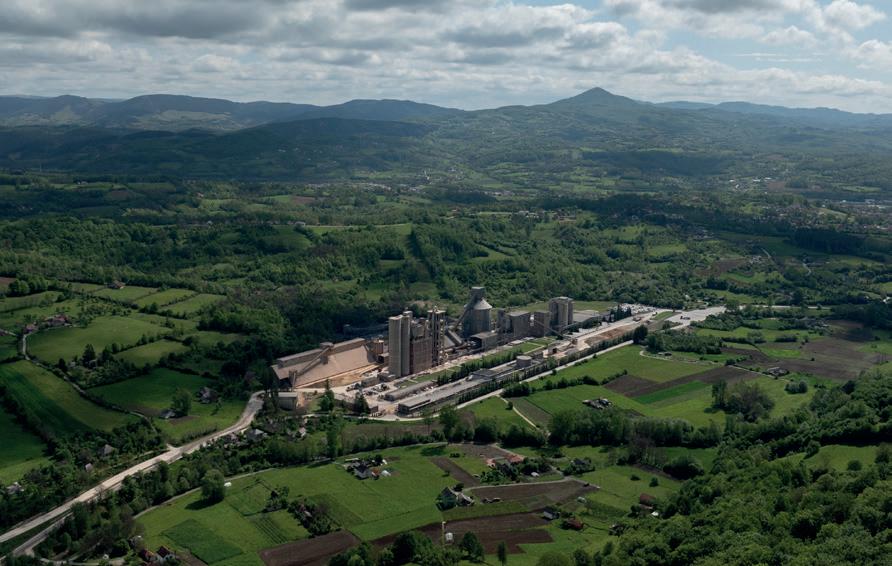
Beyond training, we focus on creating a safe, inclusive, and motivating work environment. This is why Cementara has achieved over 1,500 days without a workplace injury - a milestone that reflects the culture of responsibility we cultivate. We want our people to feel proud, valued, and inspired to stay and build their future here in Kosjerić.
Cementara is not just an industrial player; it is a member of the local community. How do you balance business objectives with social responsibility and community engagement? We firmly believe that our success is tied to the wellbeing of the community around us. For more than four decades, Cementara has been part of Kosjerić, and we see ourselves not only as an employer but also as a partner in development.
Each year we implement programs that support education, culture, environment, and local infrastructure. Our signature initiative, the competition “Za moj Kosjerić” (ForMyKosjerić), has financed more than 100 community projects over the years, ranging from school improvements to cultural events. We also support the local health center, sports clubs, and ecological projects, because we want Kosjerić to be a healthy and vibrant place to live.
Just last year, we invested more than €360,000 in various community support projects, ensuring, as well, that our local Health Center acquired a vehicle for transporting dialysis patients. In addition, we enabled the Health Center, elementary and secondary
school, to be connected to the city’s district heating system.
This balance between business and community is not charity - it is a core part of our business model. A strong, resilient, and satisfied community means a stable environment for our operations and a better future for all.
Looking ahead, what are Titan Cementara Kosjerić’s priorities and how do you see the company’s role in Serbia’s sustainable development?
Our future priorities align with Titan Group’s global vision: to build sustainable cities and resilient societies. In Kosjerić, that translates into further investment in clean technologies, alternative fuels, and digitalization of our processes. We are working to reduce CO₂ emissions, improve energy efficiency, and adopt practices that are fully in line with EU environmental standards.
At the same time, we will continue to invest in our people and in the community. We want to retain young talent in Kosjerić and show that industry and sustainability can go hand in hand. For Serbia, Titan Cementara Kosjerić can be a model of how global standards are applied locally: how a company can deliver strong business results, provide high-quality jobs, and contribute to the wellbeing of the society.
Our ambition is not only to remain a successful cement producer, but also to be recognized as a responsible corporate citizen - one that future generations in Kosjerić will look at with pride.
ARMODIOS YANNIDIS CEO of Vitex S.A.
In this interview, Armodios Yannidis, CEO of Vitex S.A., reflects on the company’s 25-year journey in Serbia, its transformation into a regional hub, and why innovation and trust remain at the heart of Vitex’s strategy.
Vitex is celebrating 25 years in Serbia, which is a remarkable milestone. How do you look back at this journey and what does this anniversary mean to you? For our entire team, the 25th anniversary in Serbia is not only a business milestone but also a deeply emotional one. The beginning of Vitex’s journey was also a personal beginning for one of our colleagues, Mr. Prodromos Eftychidis, General Manager of Vitex-Hermes Doo.
When Vitex opened its Serbian subsidiary back in 2001, we recognized Serbia as a country full of opportunities, but even more importantly, as a place with dedicated professionals and a community that values quality. Over the past two and a half decades, Vitex has become a trusted name across Serbia and the wider Balkans.
What makes me most proud is the trust we have earned—not only from our clients and partners, but also from employees and families who see Vitex as part of their daily lives.
Another important milestone came in 2025, when Vitex launched its own production of dry mortars for construction. This expansion broadens our field of activity and allows us to support the building sector in an even more comprehensive and holistic way.
Serbia has become an important regional hub for Vitex, and you just opened a new logistics center in Stara Pazova. Could you tell us more about this strategic development?
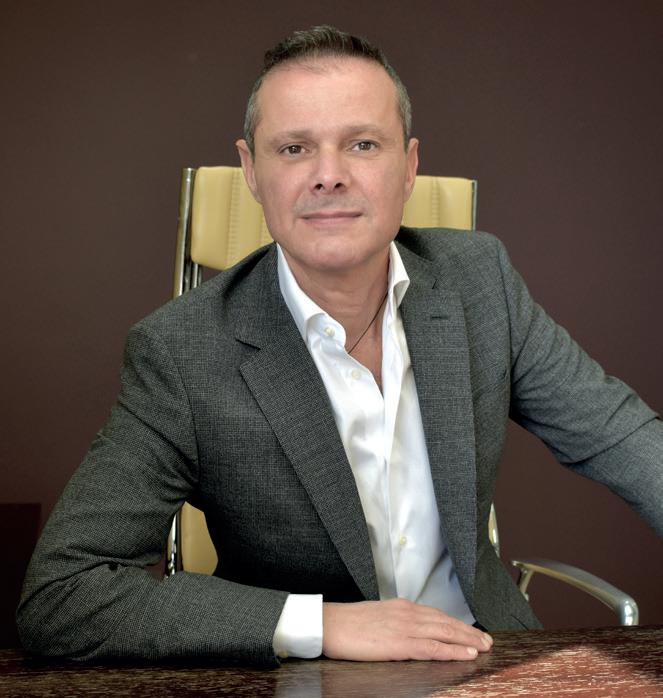
WE TAKE TOXICS OUT OF PRODUCTS AND OUT OF HUMAN RELATIONS
Serbia has an important role in our international strategy because of its geographic position, skilled workforce, and solid logistics infrastructure. From here, Vitex not only supplies the Serbian market but also coordinates exports to Montenegro and Bosnia and Herzegovina. This makes Serbia a true regional hub, and we are committed to strengthening that role even further. With the modern storage and distribution facilities, we will be able to deliver faster, manage inventory more effectively, and support future growth in the entire region. For our partners, this means improved service and reliability.
For us, it is also a message that Vitex is here to stay: we are investing not just in products but in infrastructure, people, and
long-term partnerships. I see the logistics center as both a practical tool for efficiency and a symbol of our deep commitment to Serbia as a base for regional excellence.
Vitex is a company with a long tradition - founded in 1932 in Greece - yet it is also recognized for innovation and modernity. How do you manage to balance these two dimensions? This balance is essential to our success. Tradition provides us with values such as integrity, trust, and responsibility—principles that reassure stakeholders and encourage them to co-create with us, while also helping them grow their own businesses alongside Vitex. This trust, combined with our deep understanding of market dynamics and the
fact that talented professionals choose Vitex as their employer, forms the foundation of our unique business model, F2F – Family-to-Family.
This model is currently being studied by Harvard and Cranfield University for its distinctive approach to value creation. It goes beyond analyzing family businesses internally, by focusing on the values that enable collaboration between family-owned suppliers and customers, and exploring how such partnerships can generate greater value for the final consumer.
At the same time, modernity enables us to innovate, anticipate change, and deliver solutions that address the needs of both today’s and tomorrow’s customers..
Vitex has received many recognitions for its achievements. How important are these recognitions for you, and what is your vision for the future in Serbia?
Awards are never our final goal, but they do matter. What we value even more are the academic publications authored by our scientists, our ESG initiatives and reports, as well as our HR best practices that are independently monitored in all countries where we operate by KPMG.
Our deep commitment to sustainability and to people is so deeply embedded in our culture that we have adopted the motto: ‘We take toxics out of products and out of human relations.’ This reflects that we are not only producing paints and construction chemicals, but also cultivating an environment of trust, responsibility, and excellence.
Looking specifically at Serbia, our vision is to continue growing as a reliable partner and a responsible employer, while actively exploring more dynamic expansion through acquisitions of relevant local producers. With our new logistics center, our regional role will become even stronger.
The Museum of Contemporary Art in Belgrade celebrates its 60th anniversary with the opening of three new exhibitions from its collection, along with programmes at the Salon and the Milica Zorić and Rodoljub Čolaković Gallery-Legacy. With nearly 9,000 works by national and international artists, the Museum’s collection is one of the most valuable art collections in the region. The new exhibitions further highlight its role in preserving and interpreting artistic heritage. Over six decades, the Museum has been a meeting place for art and audiences, as well as a centre for exploring and interpreting the cultural history of the 20th and 21st centuries. To mark the anniversary, the new exhibitions will offer the public diverse perspectives on art and its evolution.
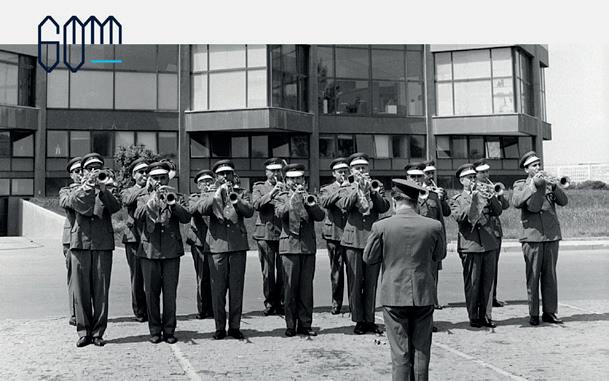
TURNING POINTS TOWARDS MODERNITY: ART OF SOCIETY 1900–1945
The exhibition will remain open until 1 March 2027
The exhibition TurningPointsTowardsModernity:ArtofSociety 1900–1945 will open on Saturday, 18 October at 5 p.m. at the Museum of Contemporary Art in Belgrade. The curators are Mišela Blanuša (Painting Collection 1900–1950), Dr Rajka Bošković (Sculpture and Installation Collection), and Žaklina Ratković (Paper Collection – prints, drawings, watercolours, etc.).
This exhibition represents the first part of a new multi-year cycle through which the Museum will re-evaluate the significance of its collection across three major displays. Featuring more than 400 works by 150 artists, it explores the development of art in Serbia and Yugoslavia during the first half of the 20th century, in dialogue with social, political, and cultural transformations. The audience will have the opportunity to observe key processes of artistic modernisation in both regional and international contexts.
Focusing on the period from the beginning of the 20th century to World War II, TurningPointsTowardsModernity:ArtofSociety 1900–1945 encompasses an era of intense social, political, and cultural change that shaped modern art in Serbia and the former Yugoslavia. The exhibition re-examines the Museum’s collection through the question of how art responded to modernisation, urbanisation, nation-building, and social crises at the dawn of the century, exploring visual and conceptual shifts on the path towards modernity in society.
Through several thematic and chronological sections, the exhibition traces stylistic movements from Symbolism, Impressionism, and post-Cubist expressions, through avant-garde experiments and Constructivist practices, to various forms of Realism and socially
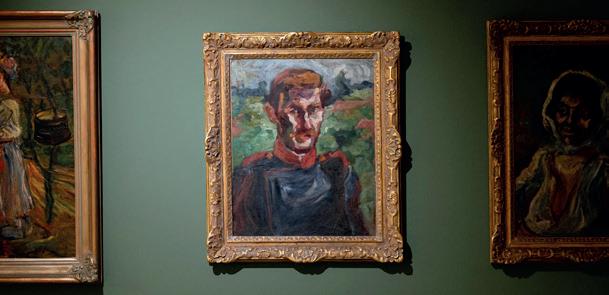
engaged art. Special emphasis is placed on the connection between art and society — on how art reflects or comments on social reality, while also actively participating in shaping it.
The display combines chronological and thematic approaches – from the “Birth of Modernity” to the “Divisions and Crises” of the 1930s – while also exploring phenomena such as urban life, civic identity, the role of the artist in society, the development of media and new forms of visual expression, as well as the emergence of the first avant-garde articulations.
The exhibition will be open until 2 March 2026.
The exhibition ClaraSipprellandPaulStrand:ImagesofAnother World will open on Thursday, 6 November at the Museum of Contemporary Art. The curator is Una Popović, Curator of the Photography, Film, Video and Digital Media Collection.
For the first time, the Museum of Contemporary Art will present the portfolios of Clara Sipprell and Paul Strand from its collection in their entirety, acquired through diplomatic exchange in the 1980s. Sixty photographs by Sipprell, taken during her travels through Yugoslavia in the 1920s, and twenty by Strand, a pioneer of straight photography, created in America, France, and Egypt, will be exhibited. Their artistic approaches developed in parallel — Sipprell’s pictorialist, poetic, and atmospheric photography, and Strand’s modernist, rigorously composed works — offering a unique insight into the evolution of photography during that era.
The exhibition will remain open until 2 March 2026
On Thursday, 6 November, the Museum of Contemporary Art will open the exhibition Olga Jevrić: Musicality and Sculpturality, curated by Dr Rajka Bošković. As part of the series “ART AND PERSONALITY – Women Sculptors from the MSUB Collection (6)”, the exhibition presents a retrospective of one of the most impor tant female sculptors in 20th-century Serbian art. Olga Jevrić’s work is characterised by the musicality of form and the drama of opposing forces — between line and mass, light and shadow, suf fering and defiance. The exhibition will showcase sculptures from the collections of the Museum of Contemporary Art, the Serbian Academy of Sciences and Arts, and the House of Legacies in Belgrade, offering insight into an oeuvre that has become part of the global history of sculpture.



